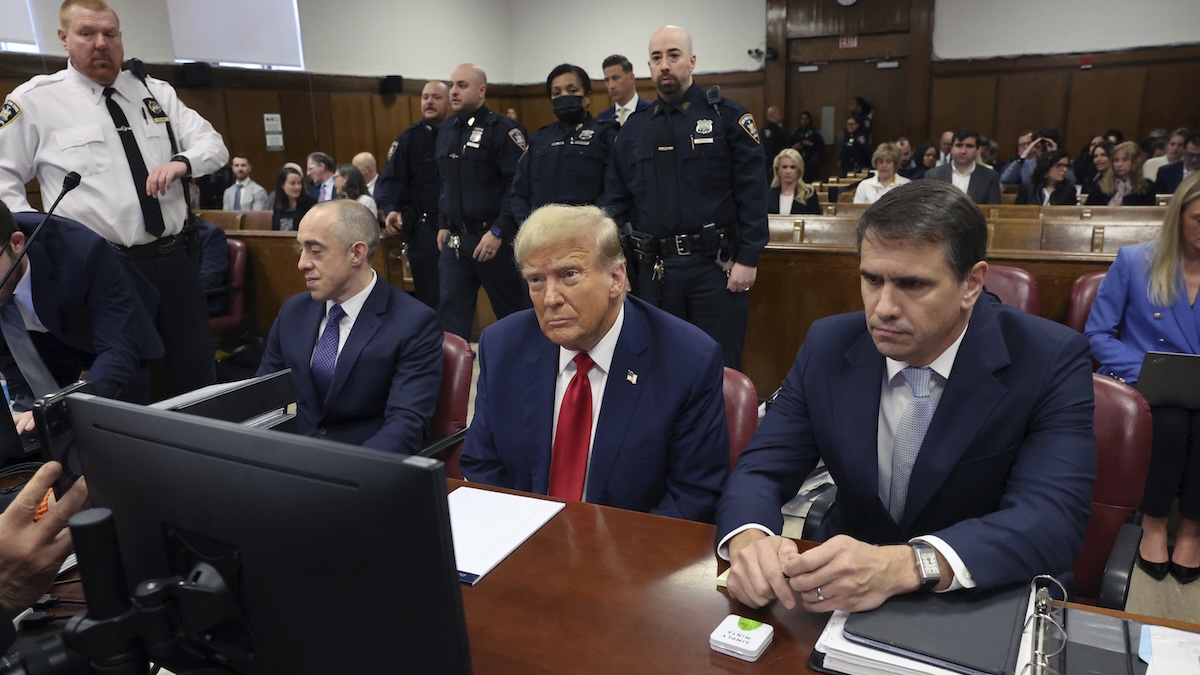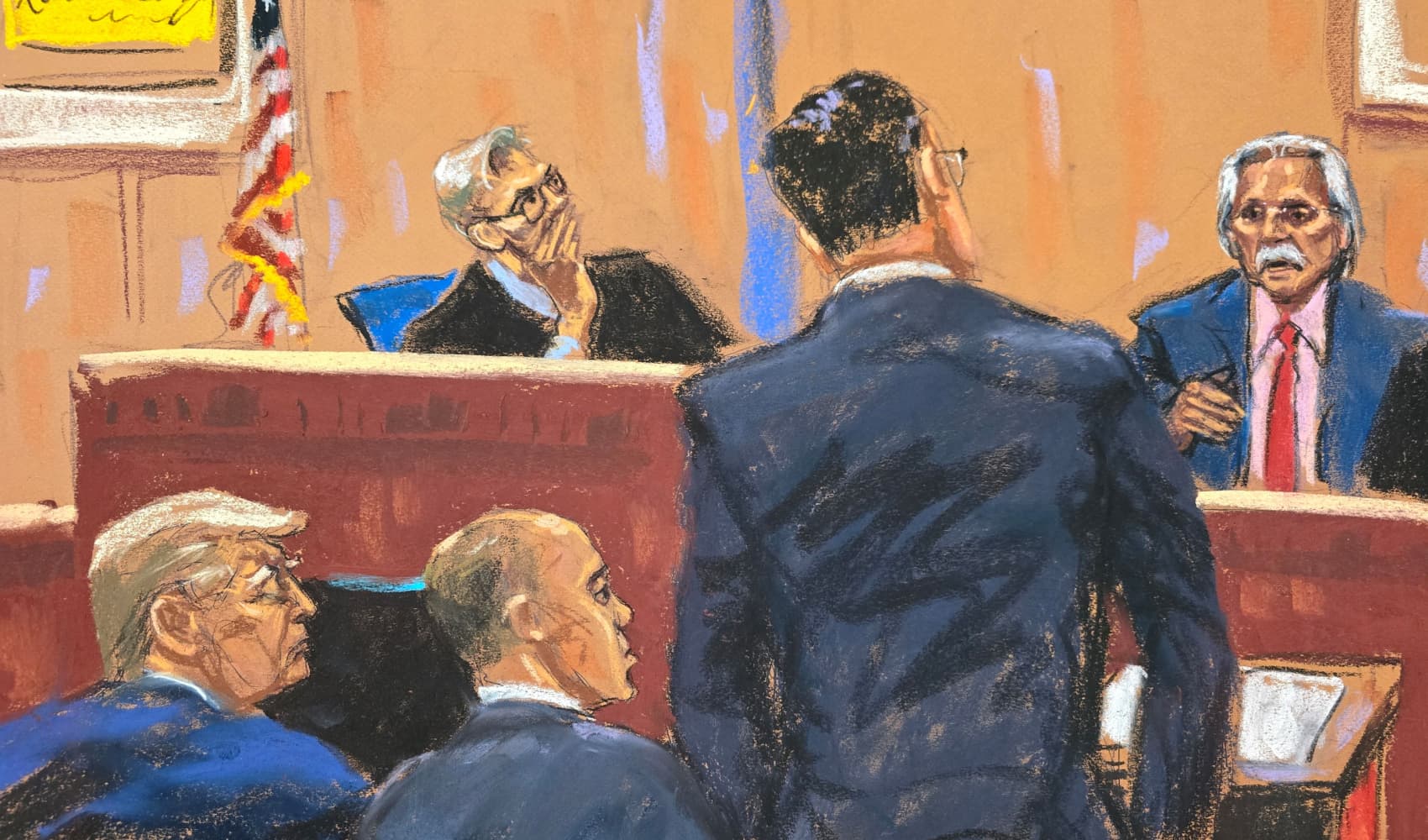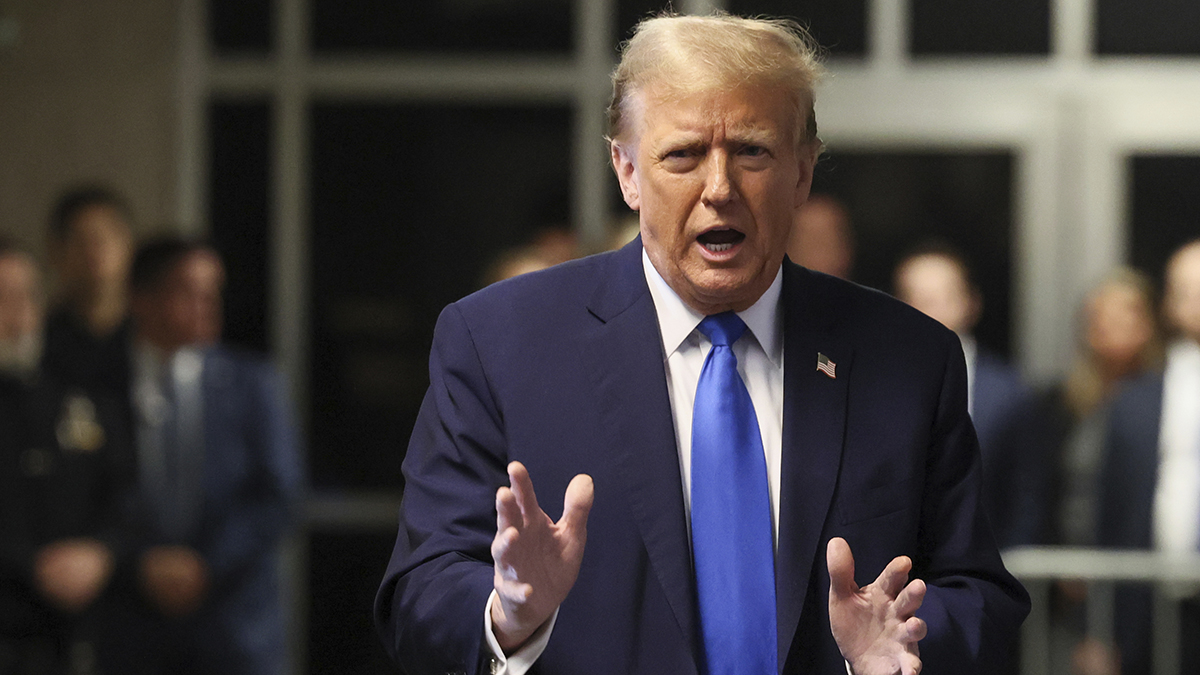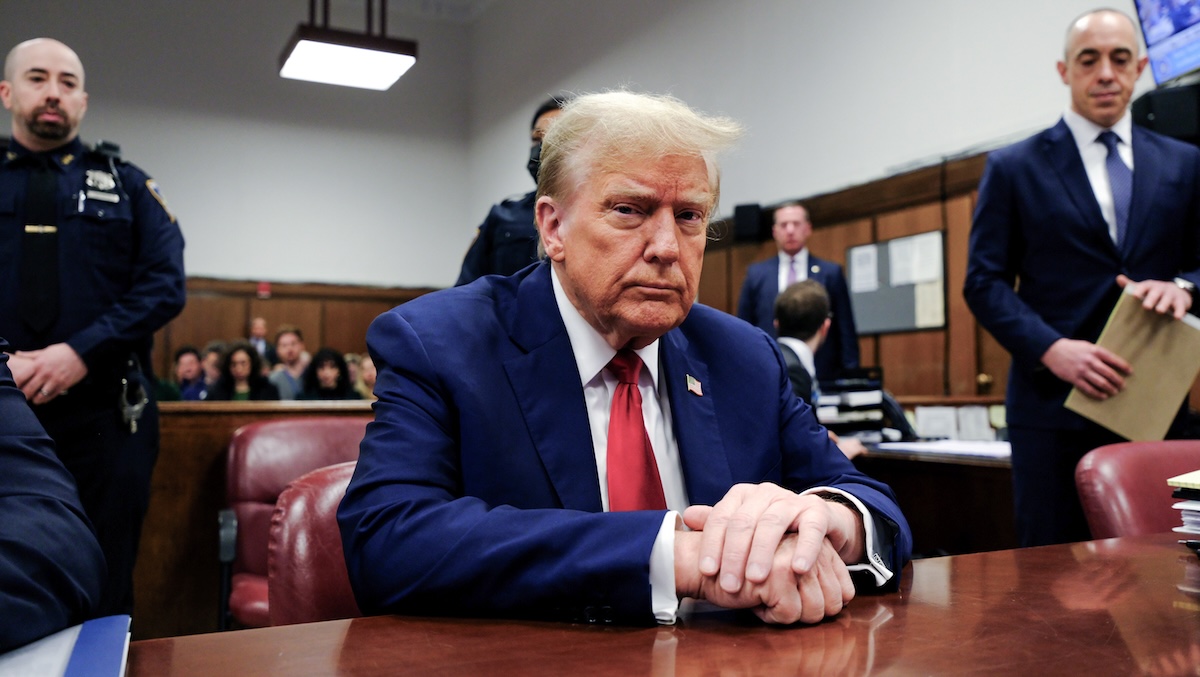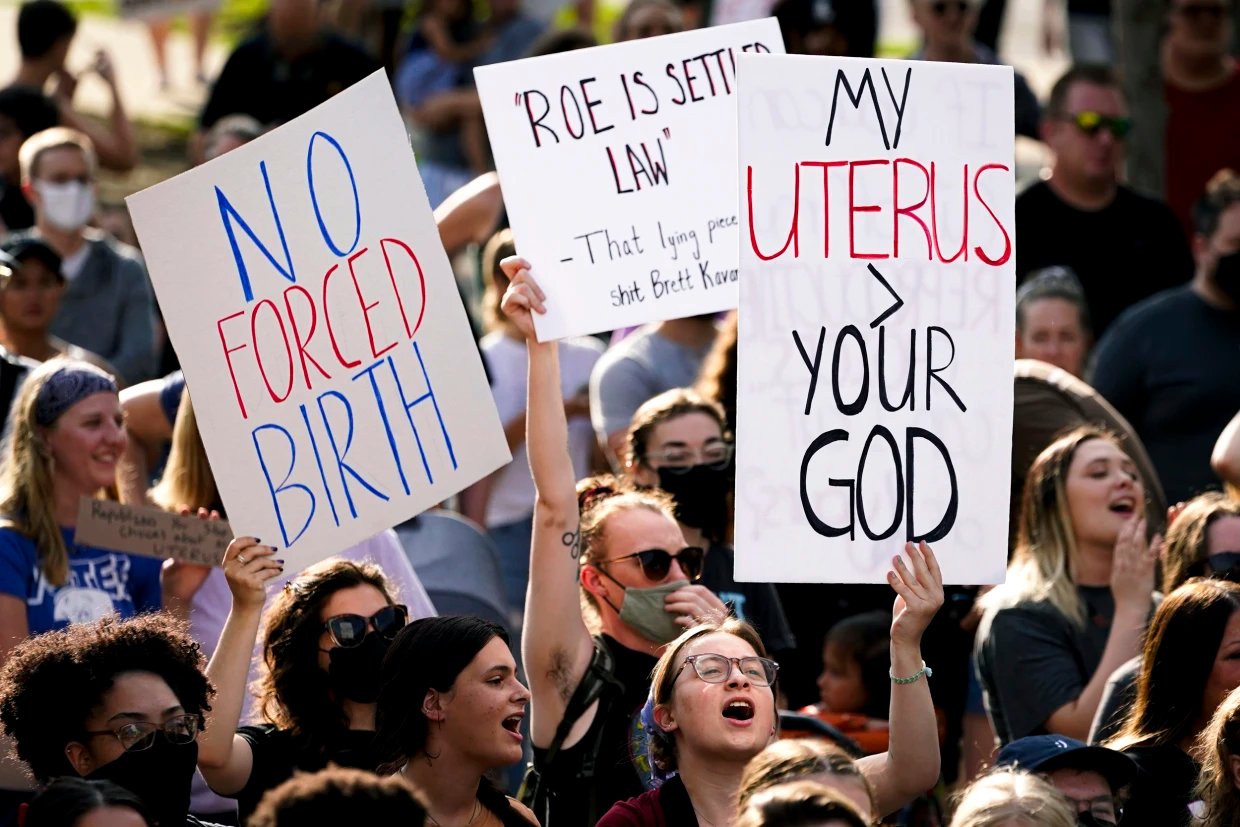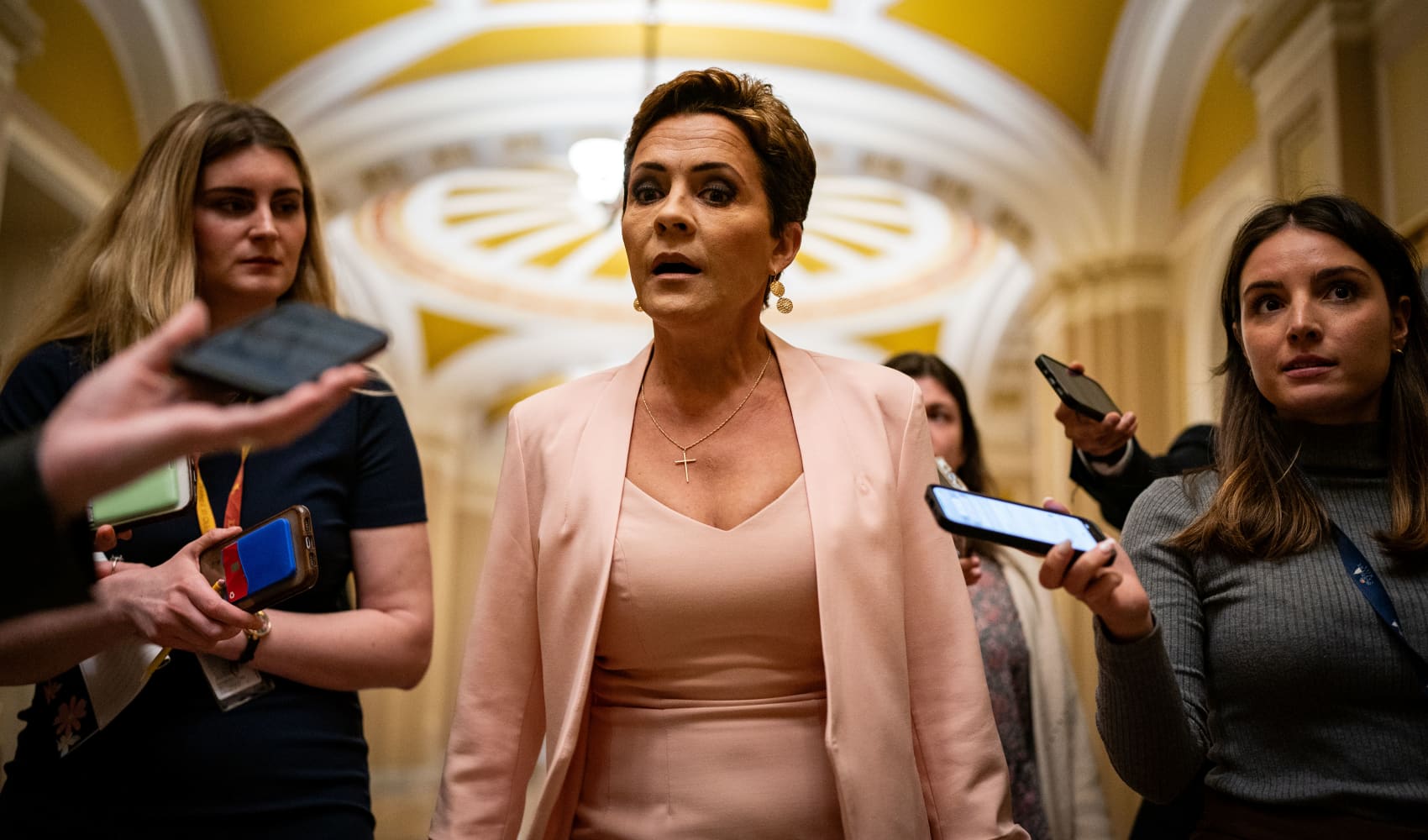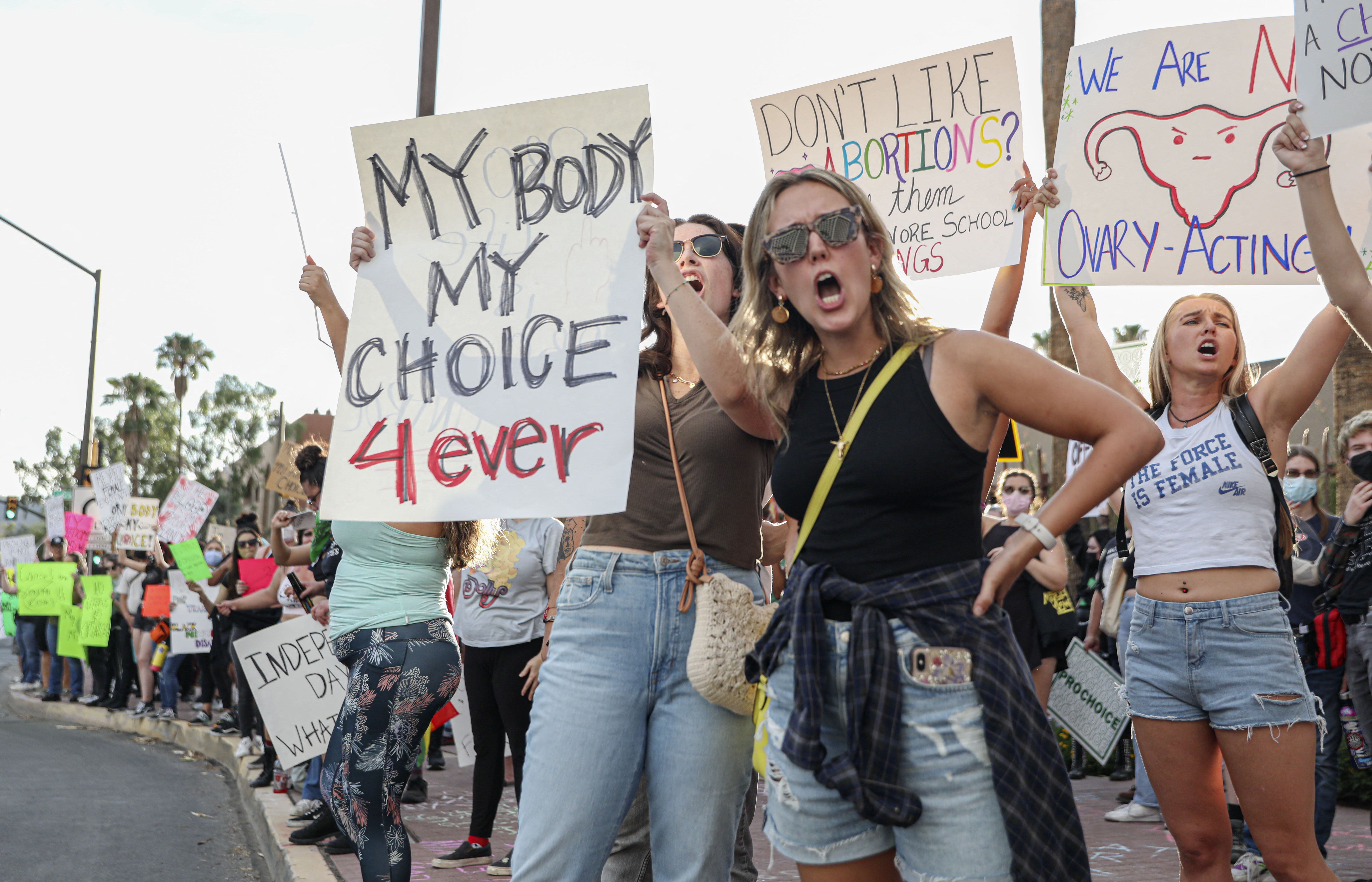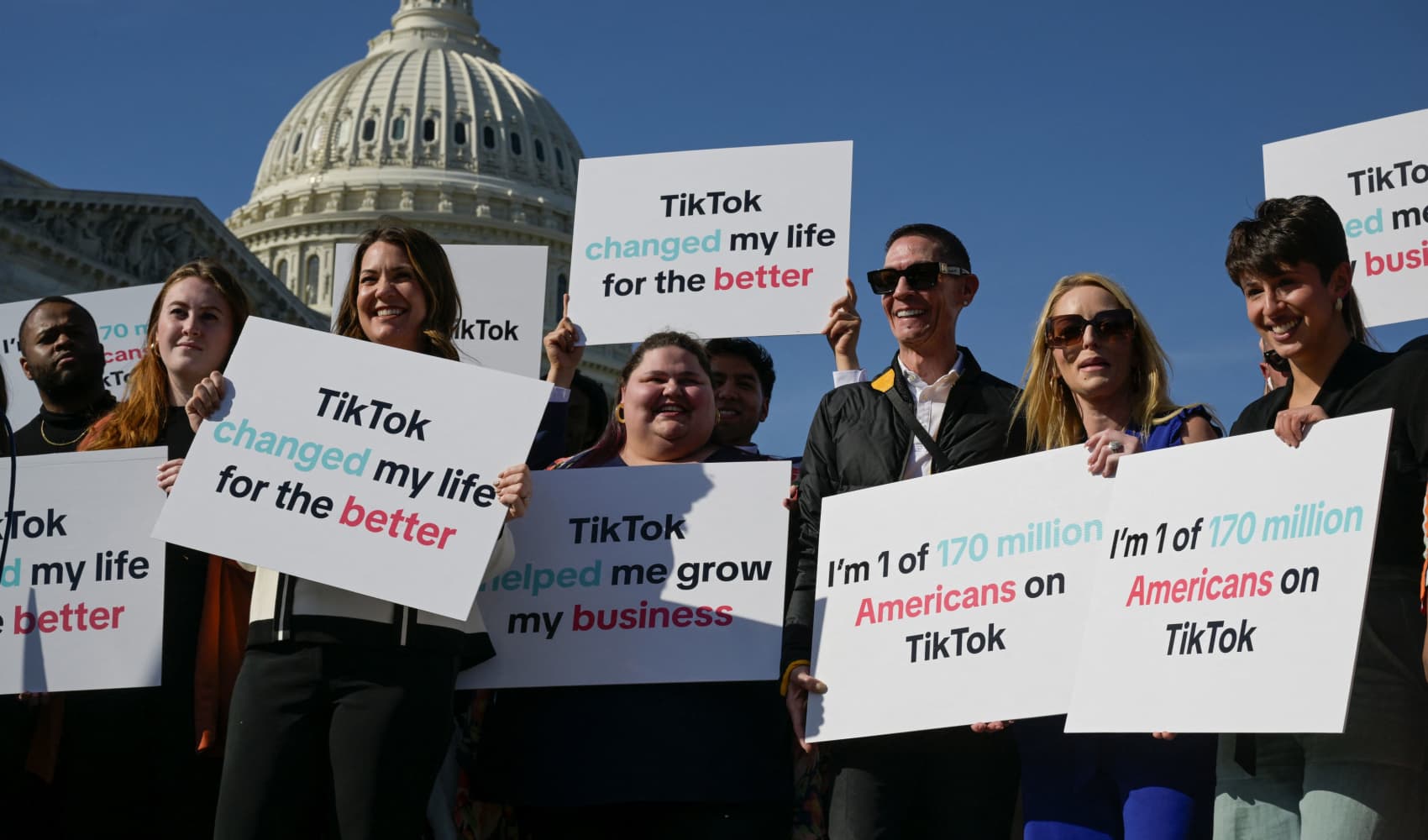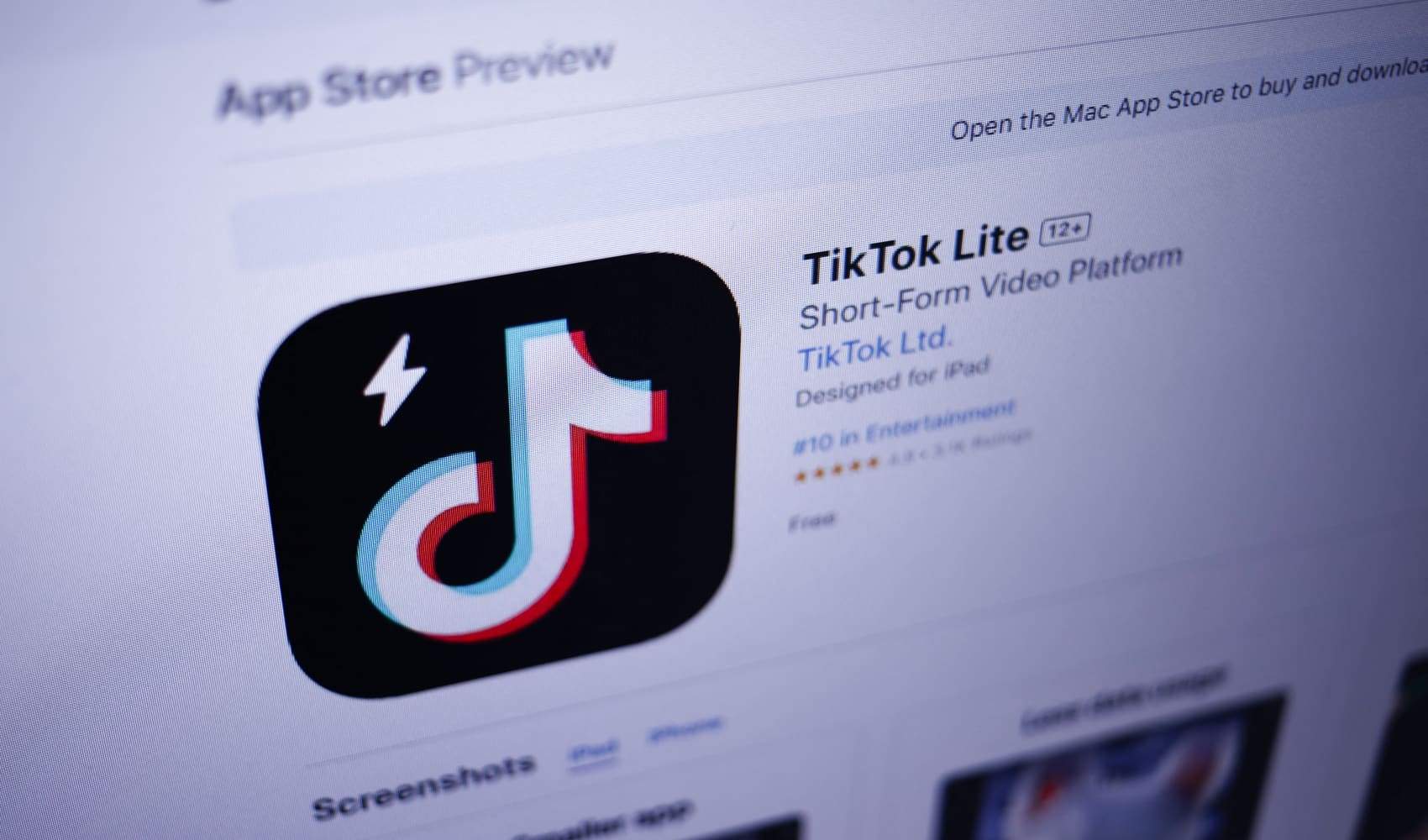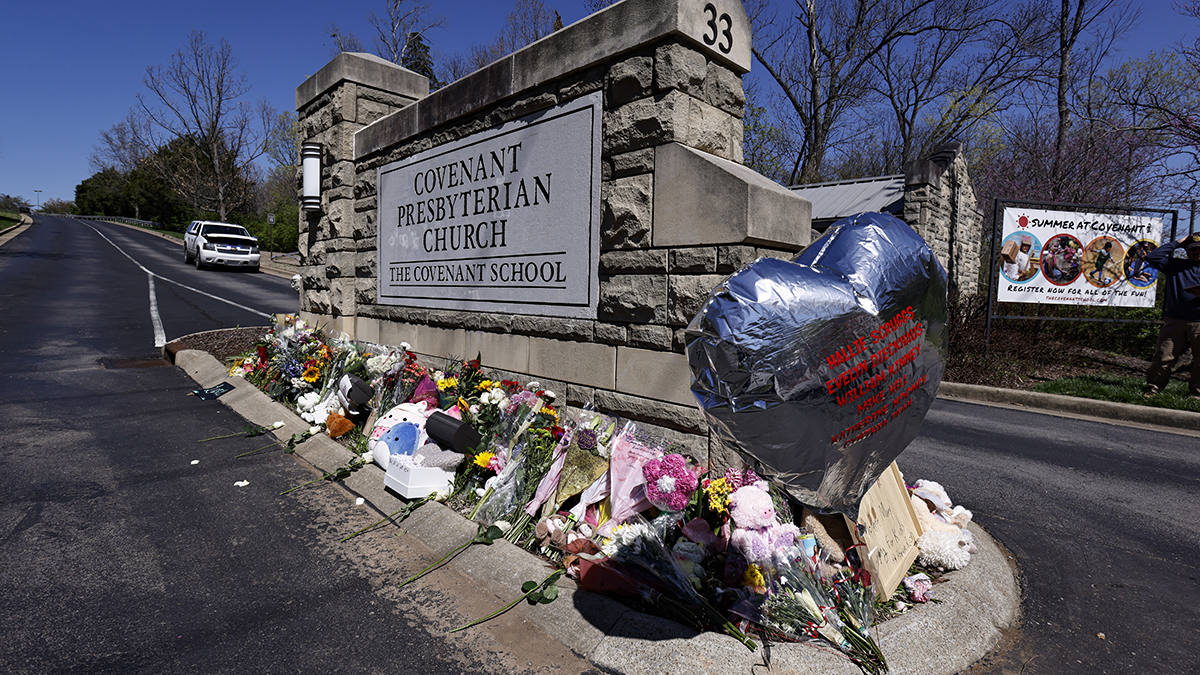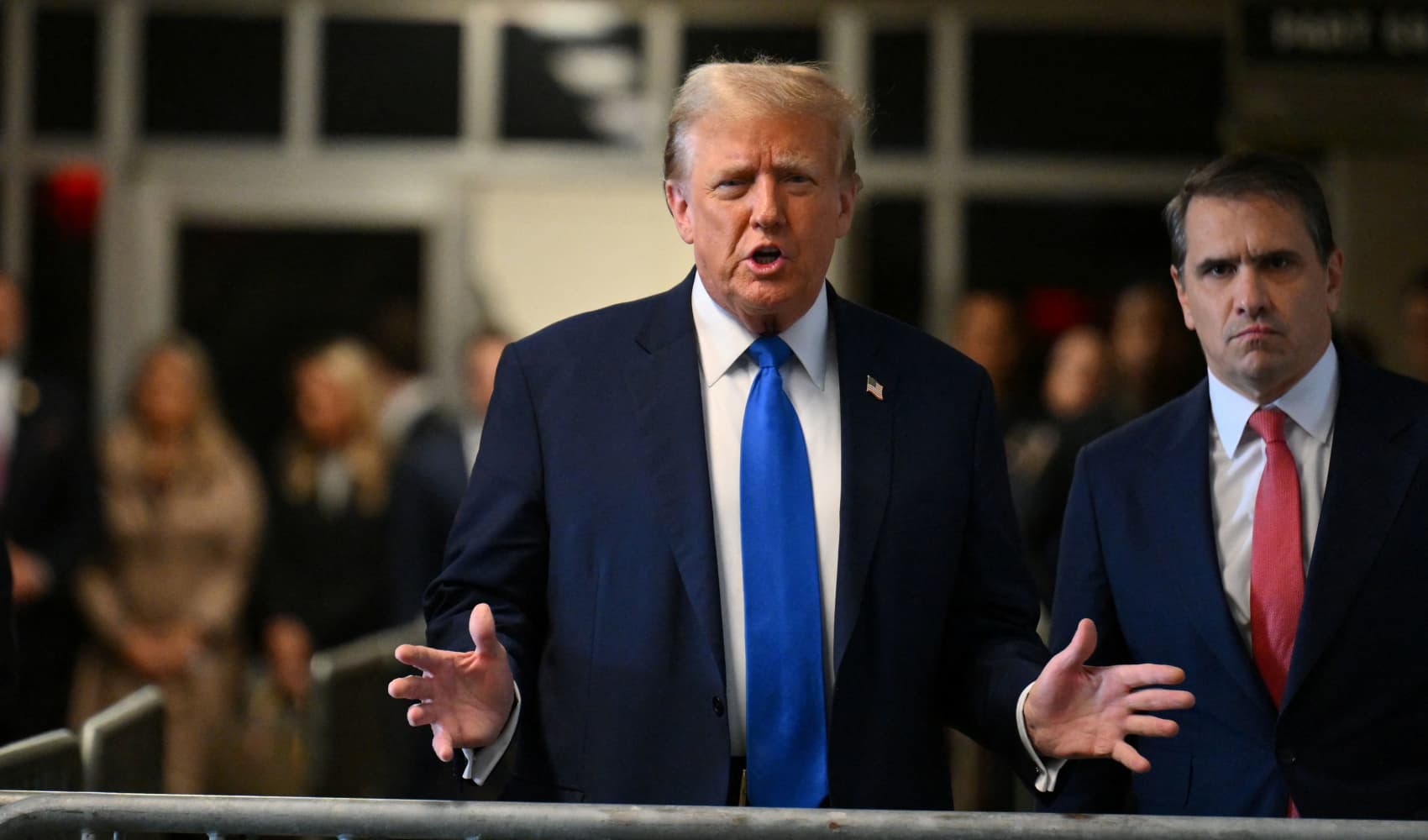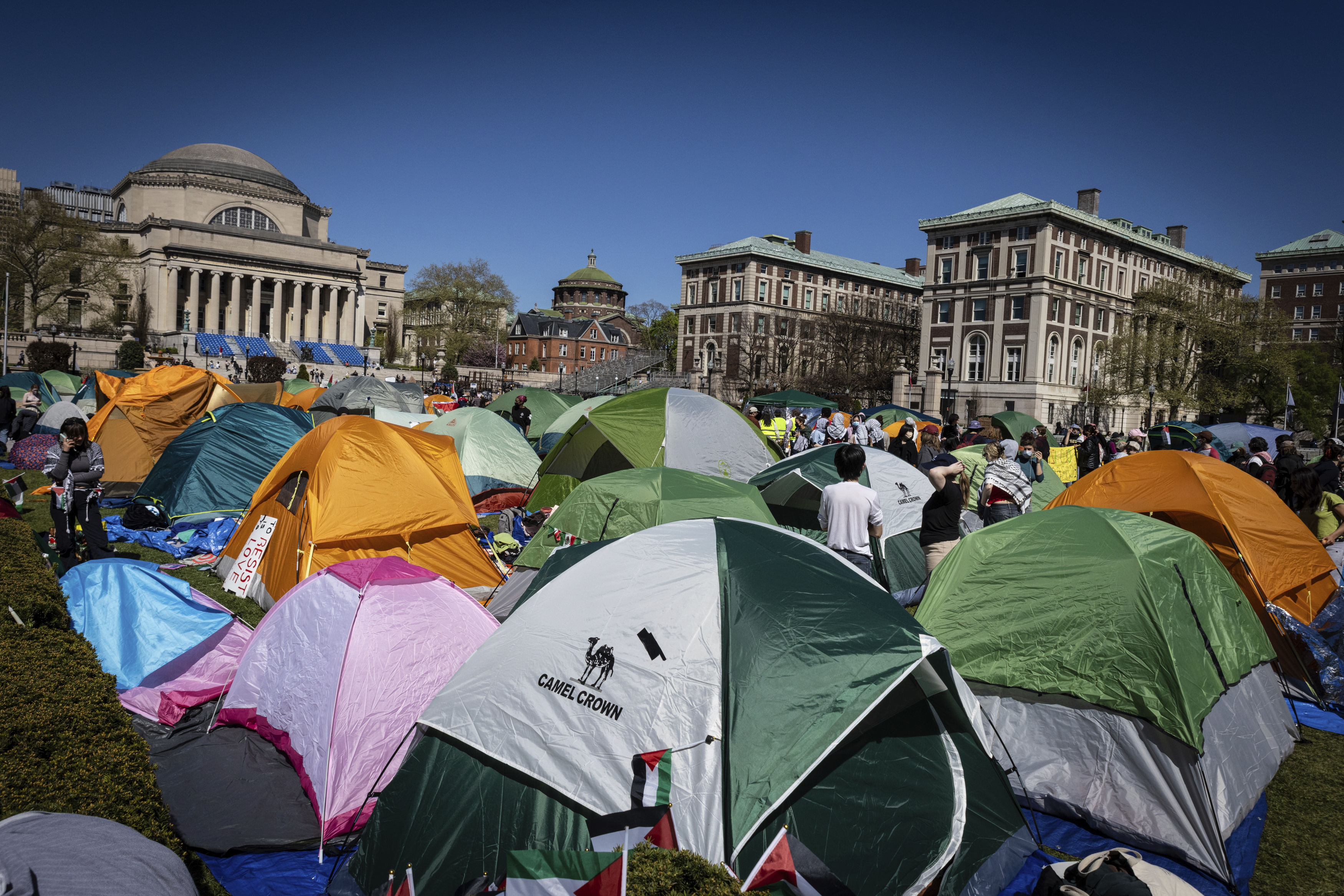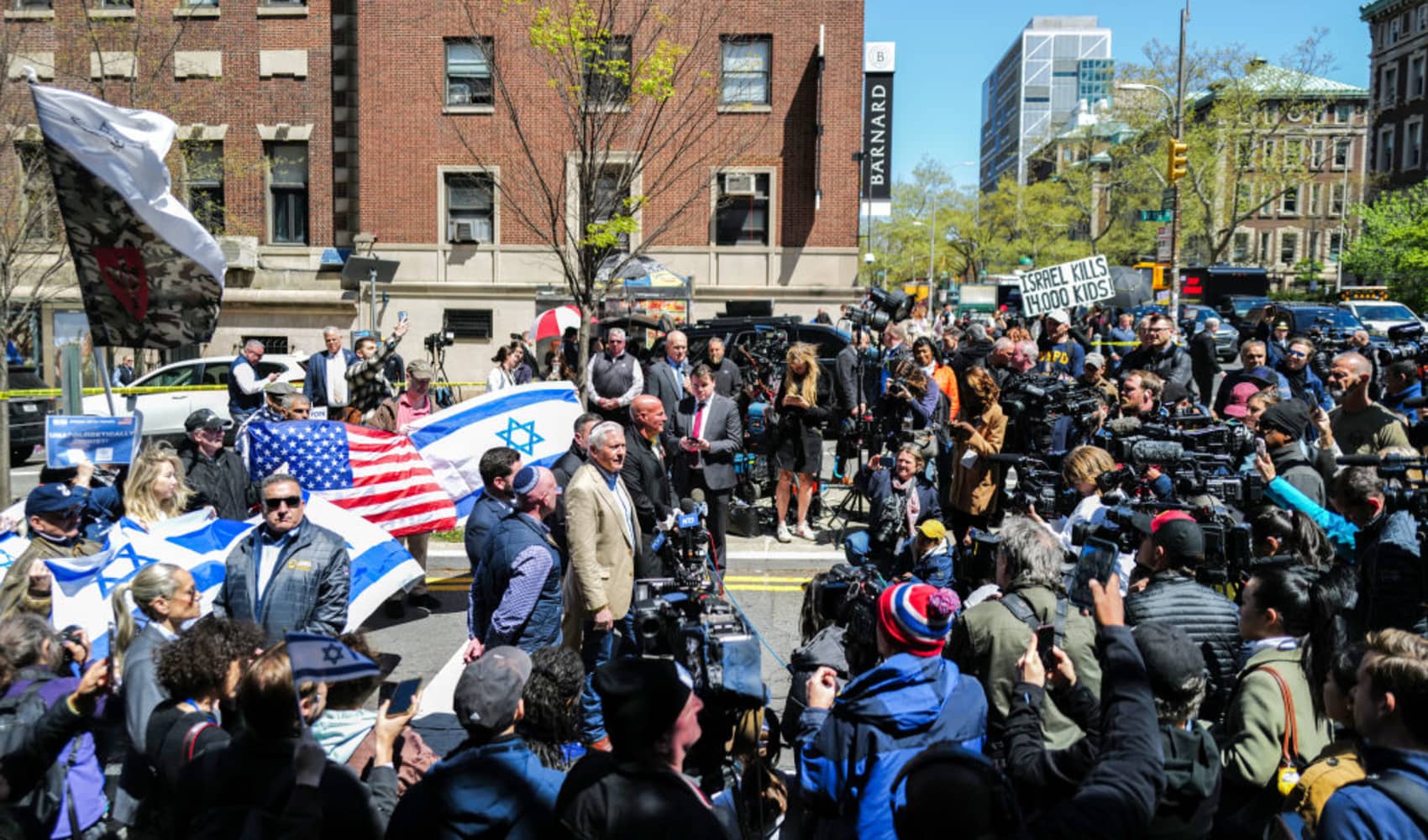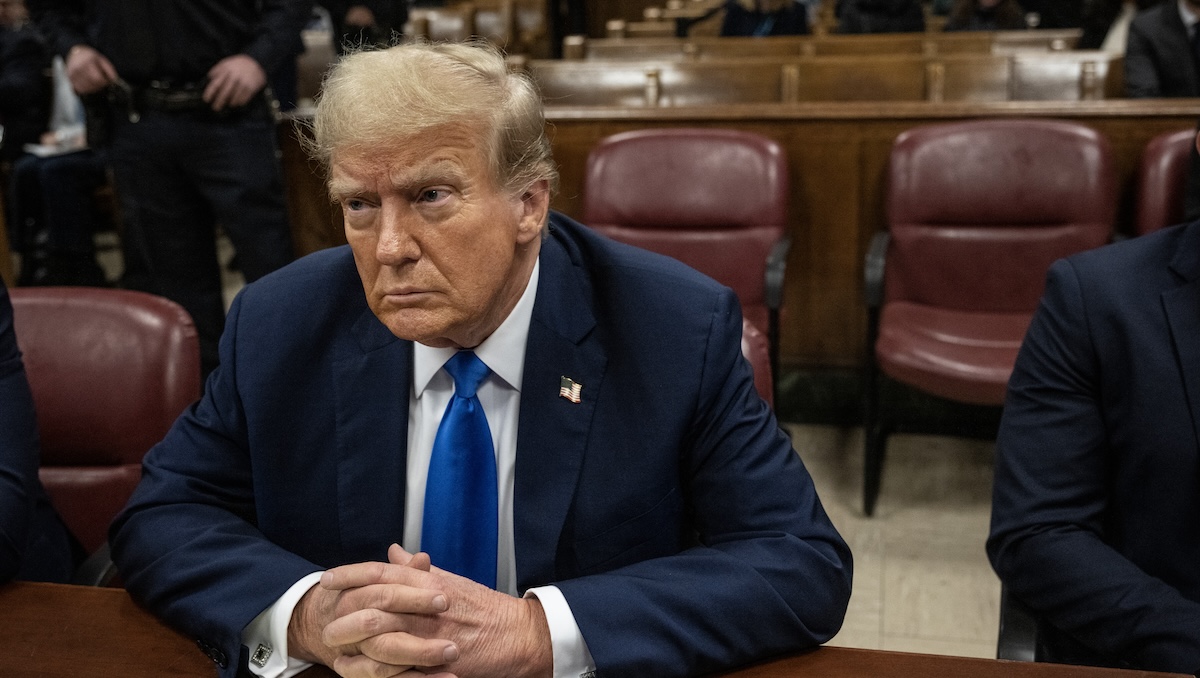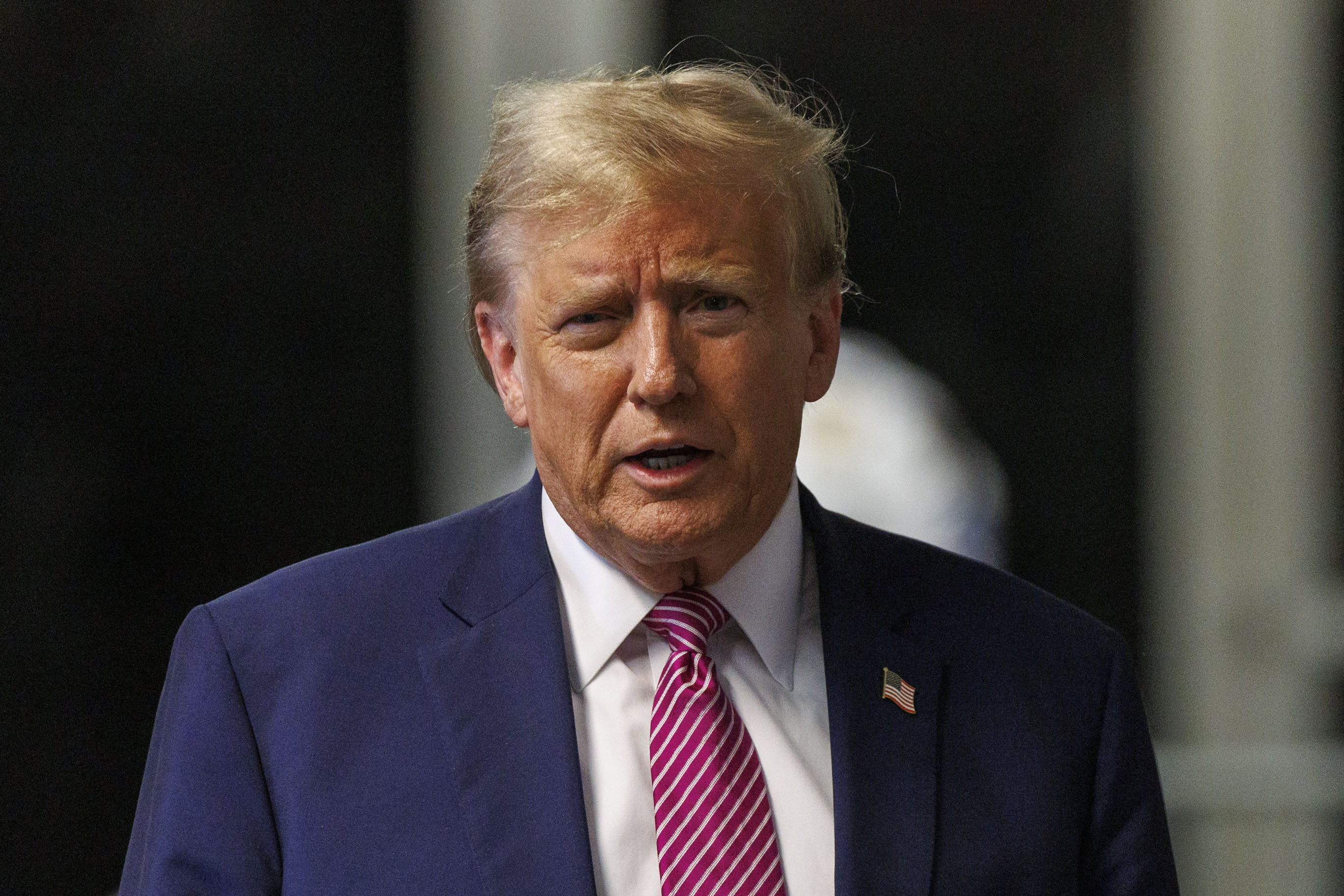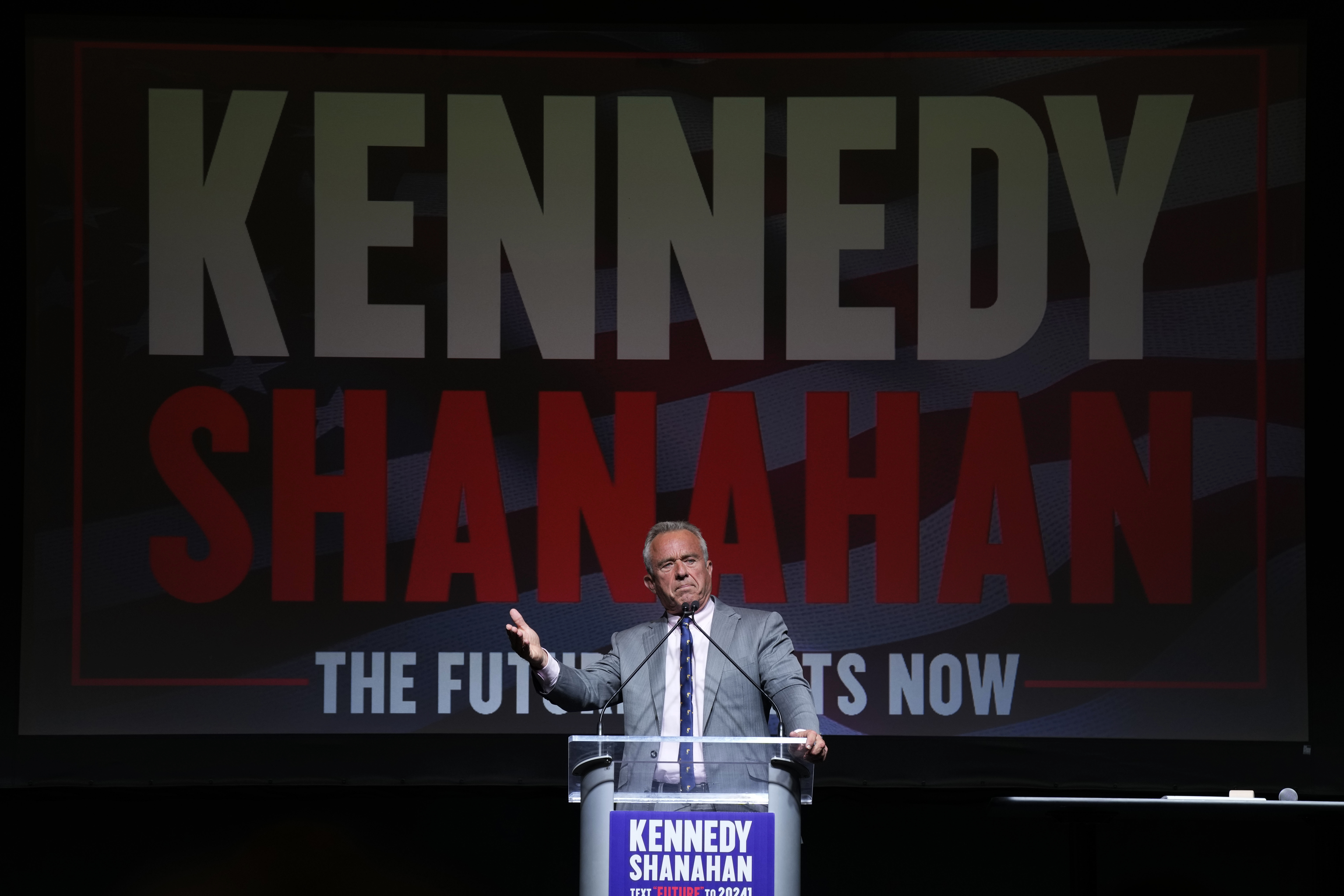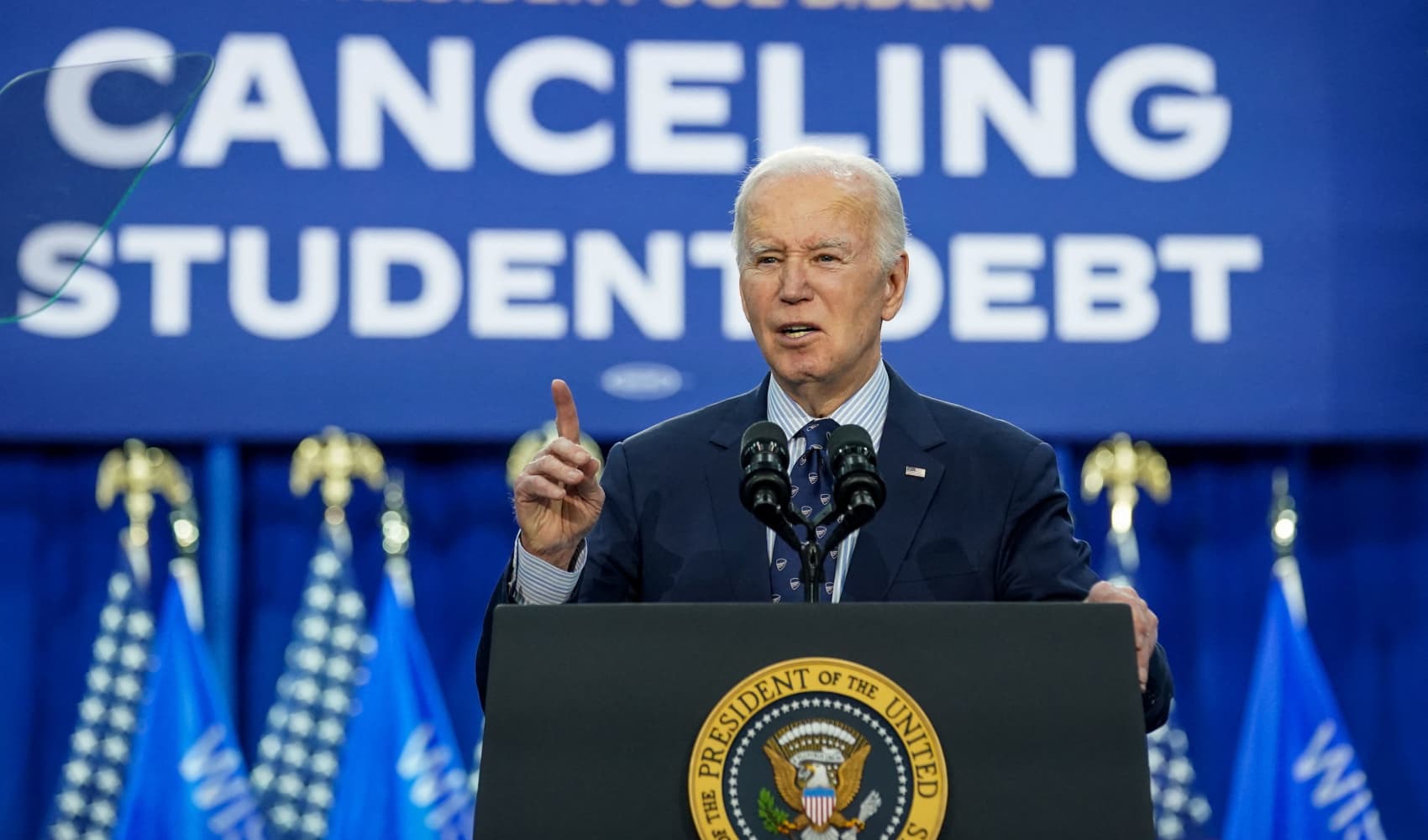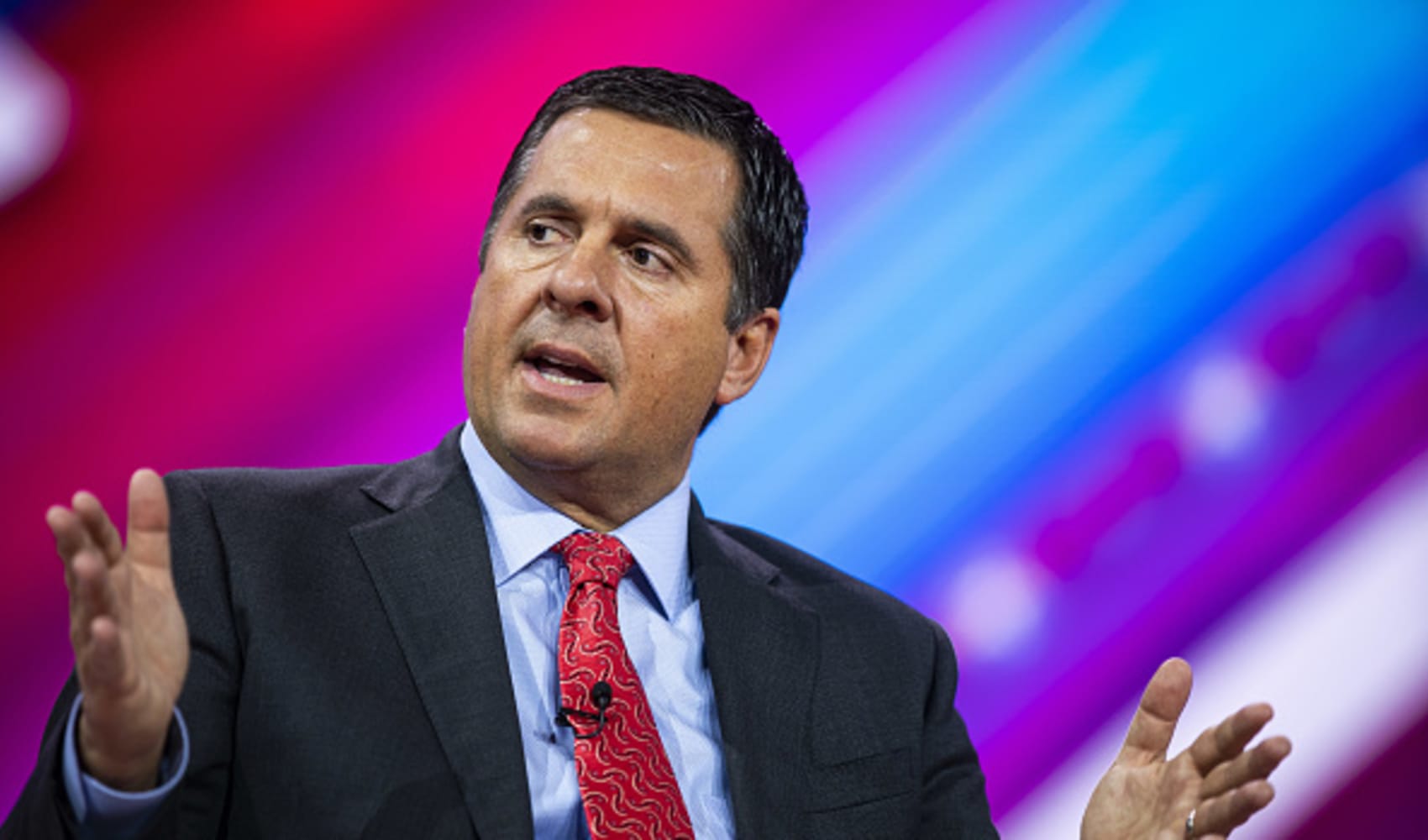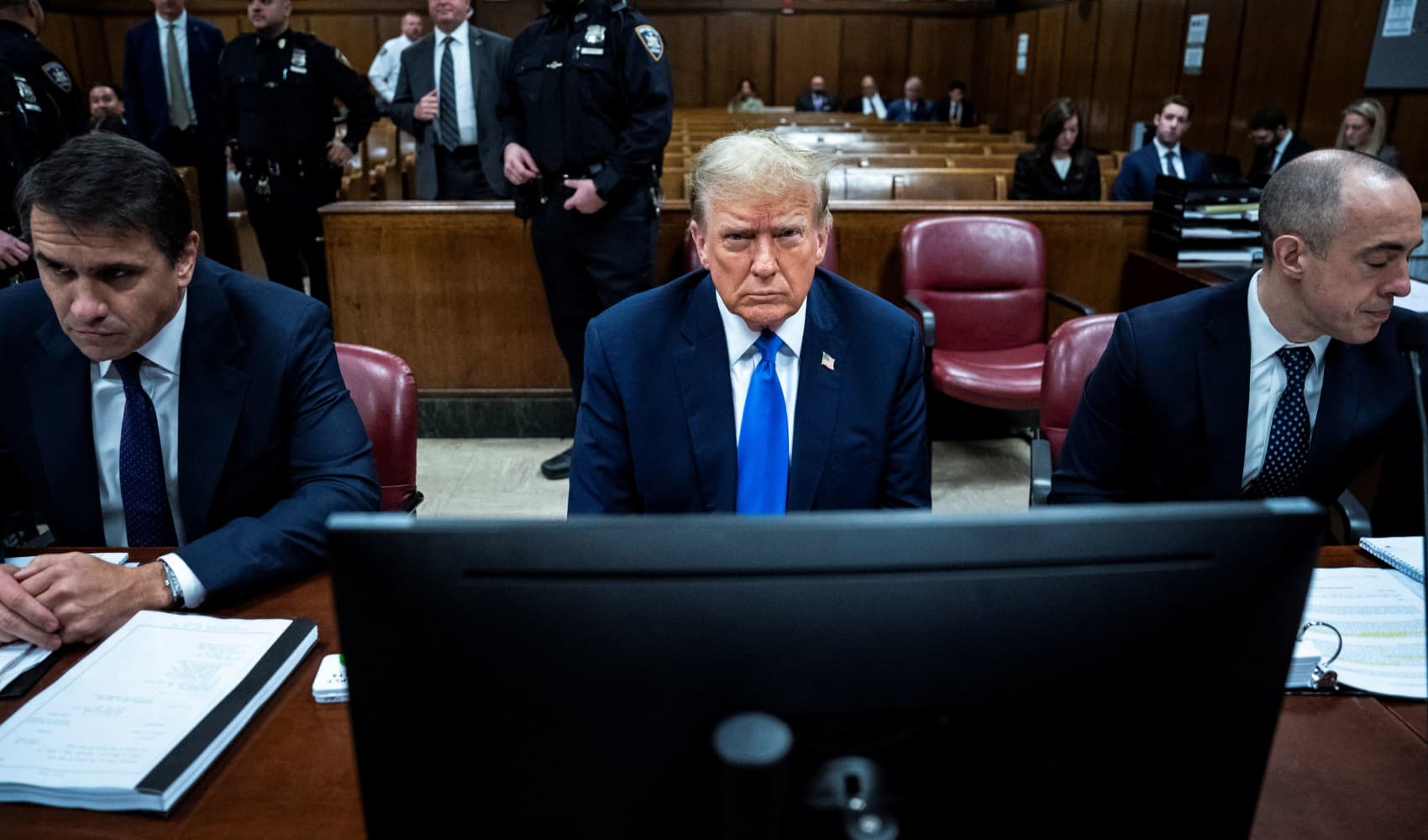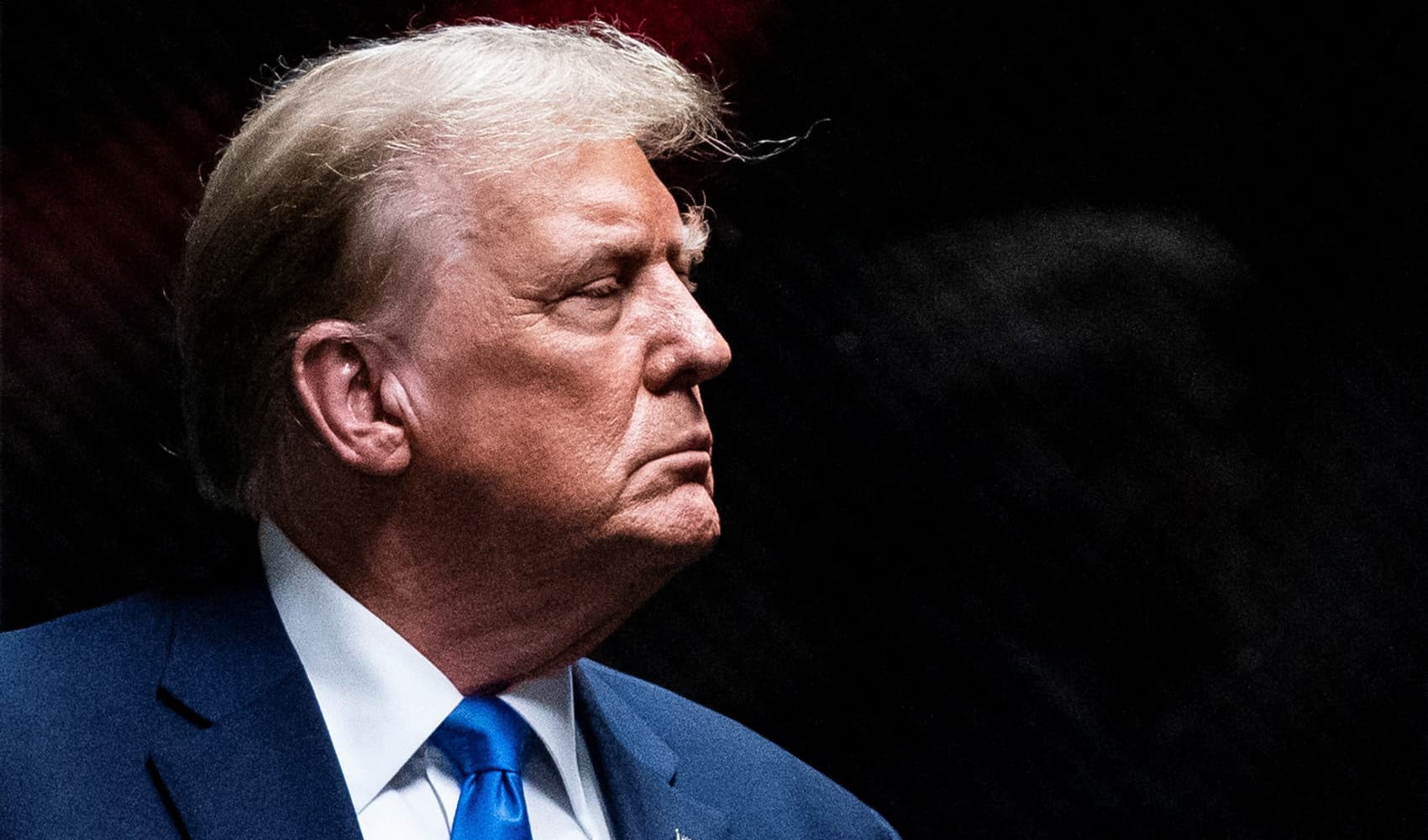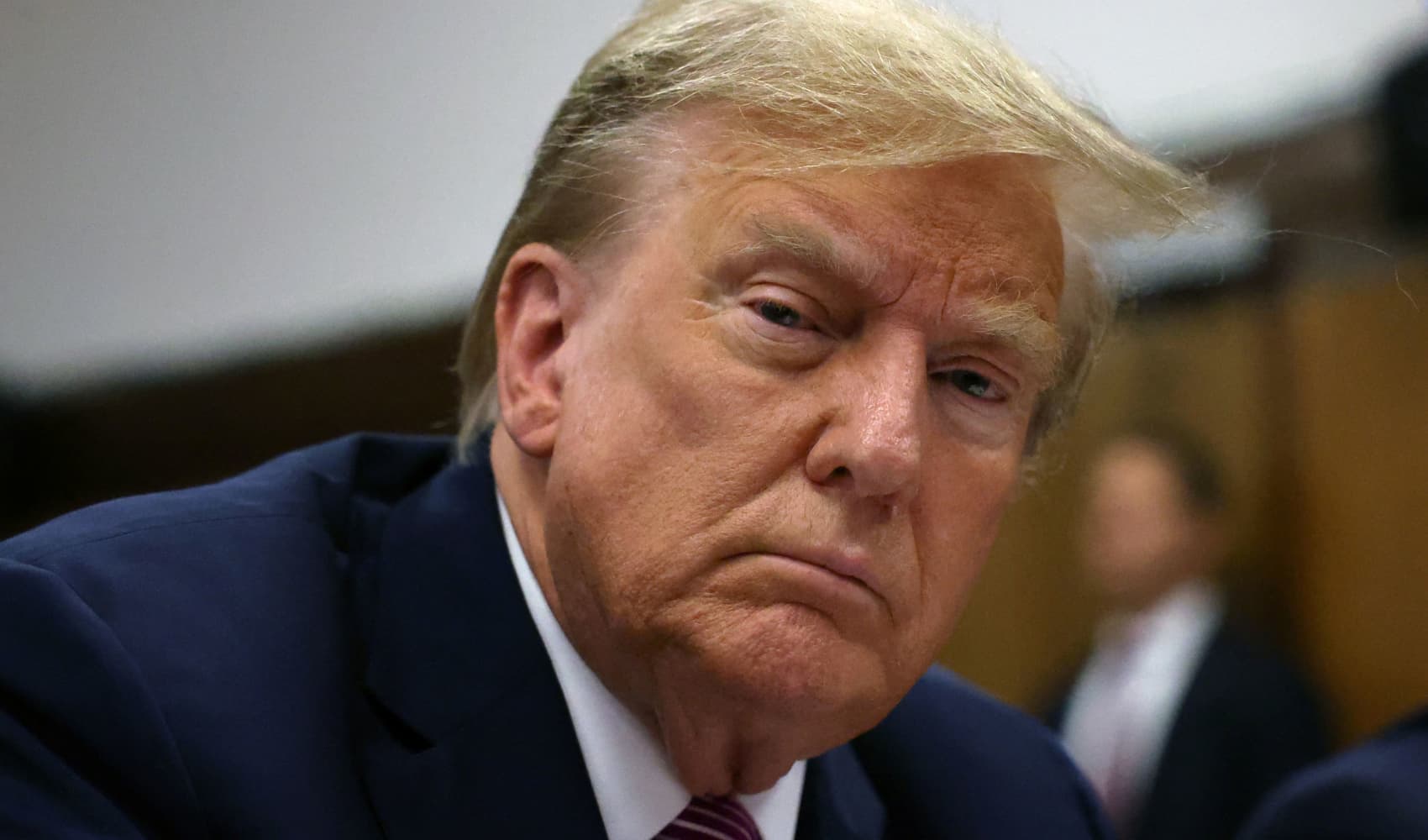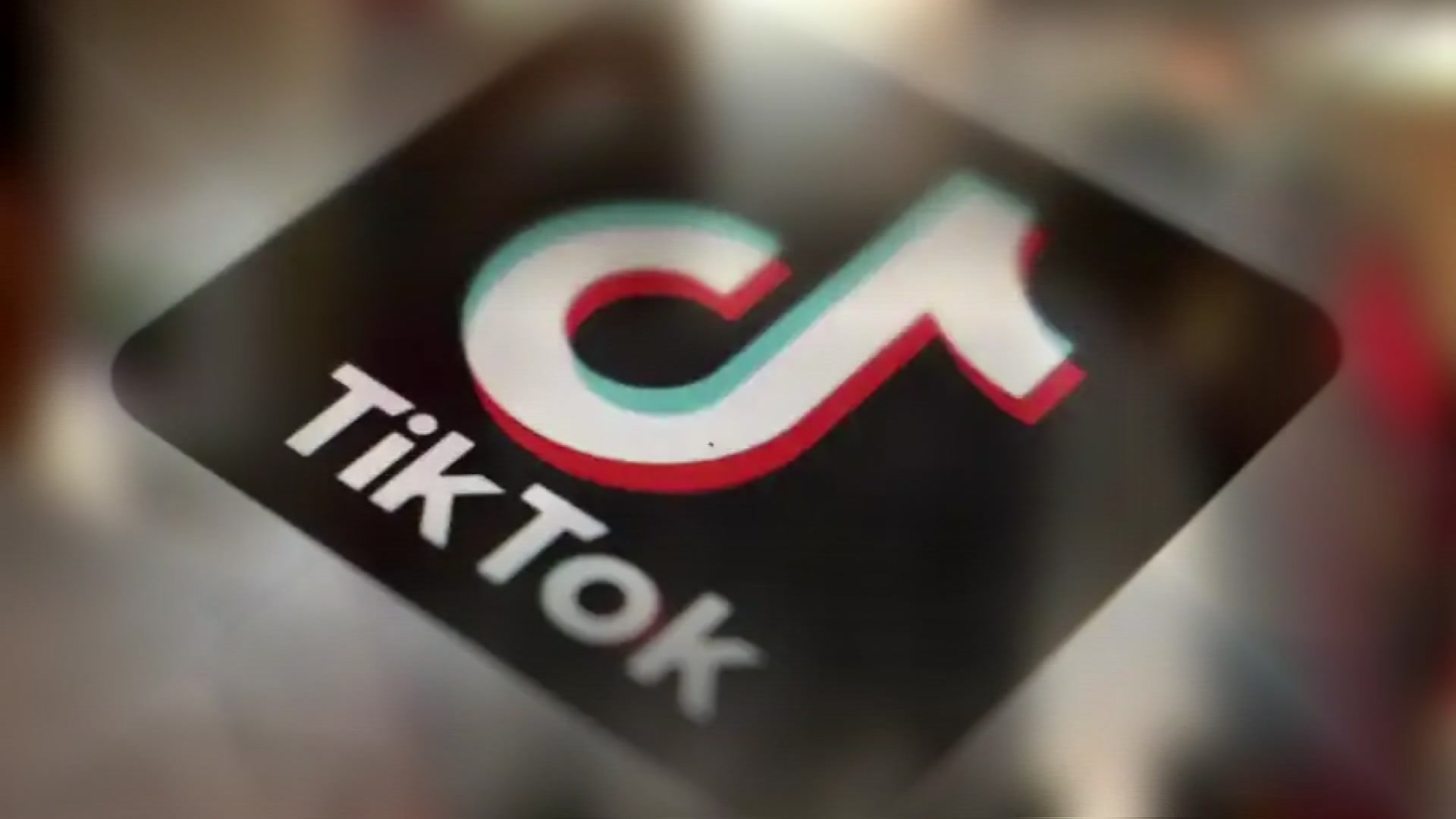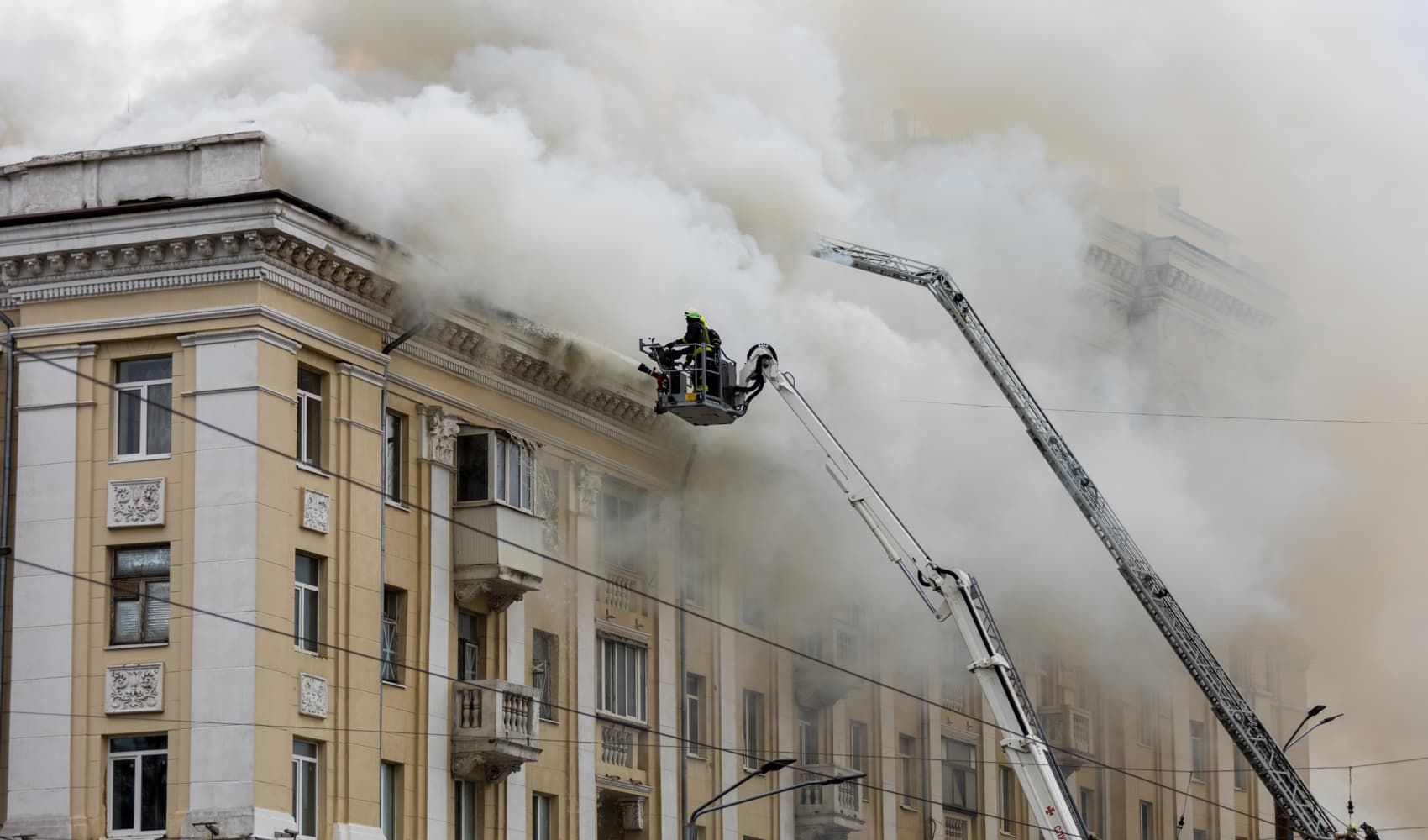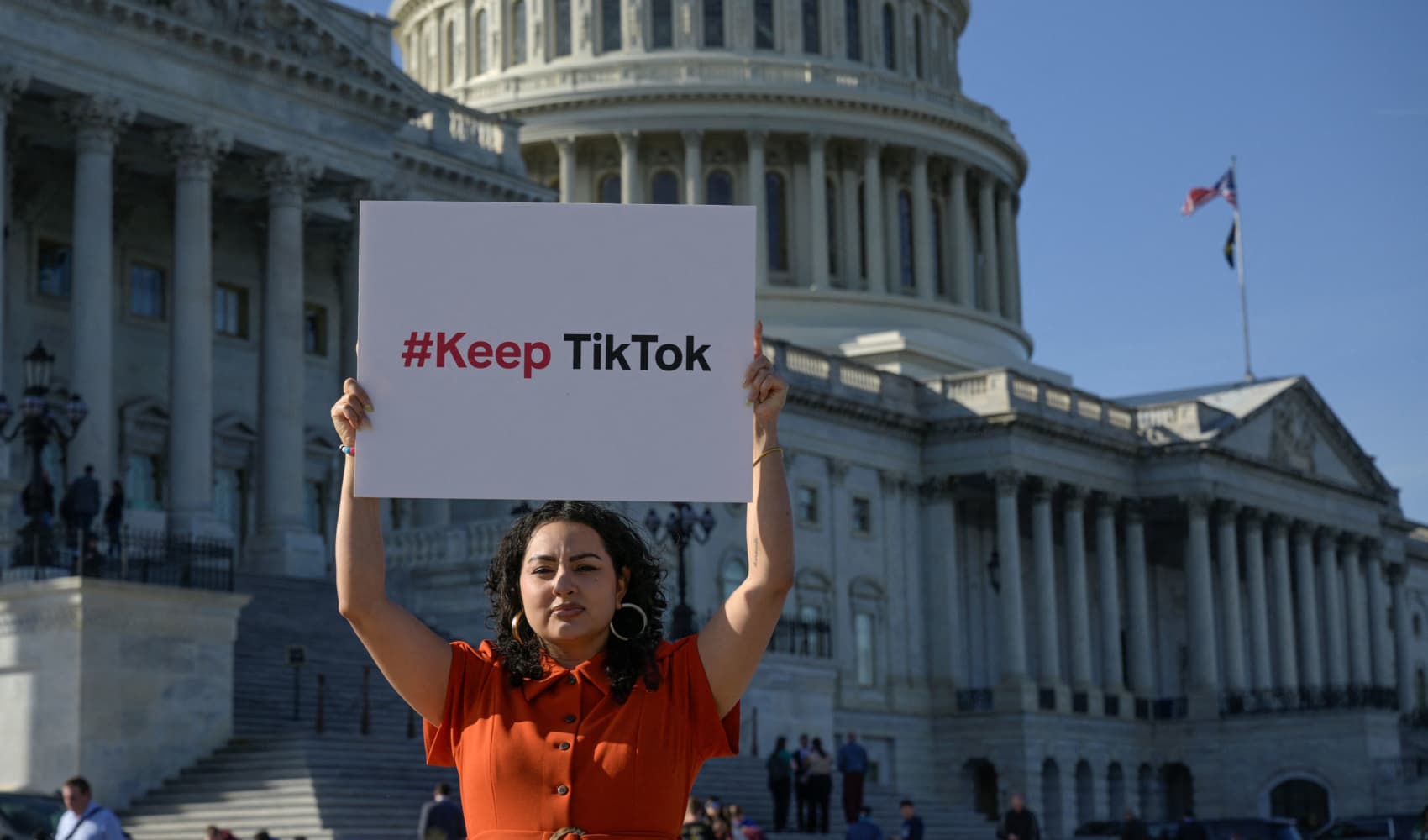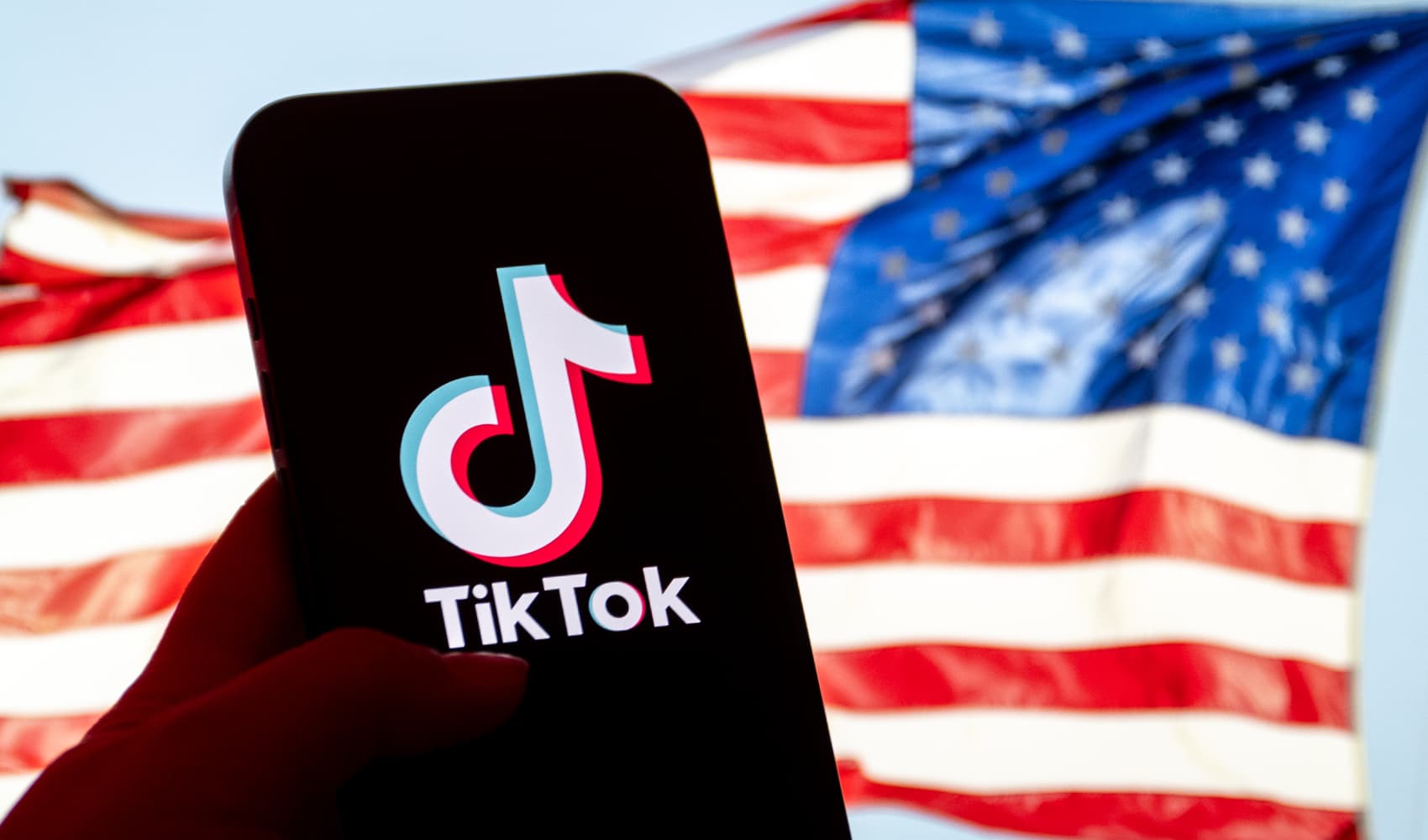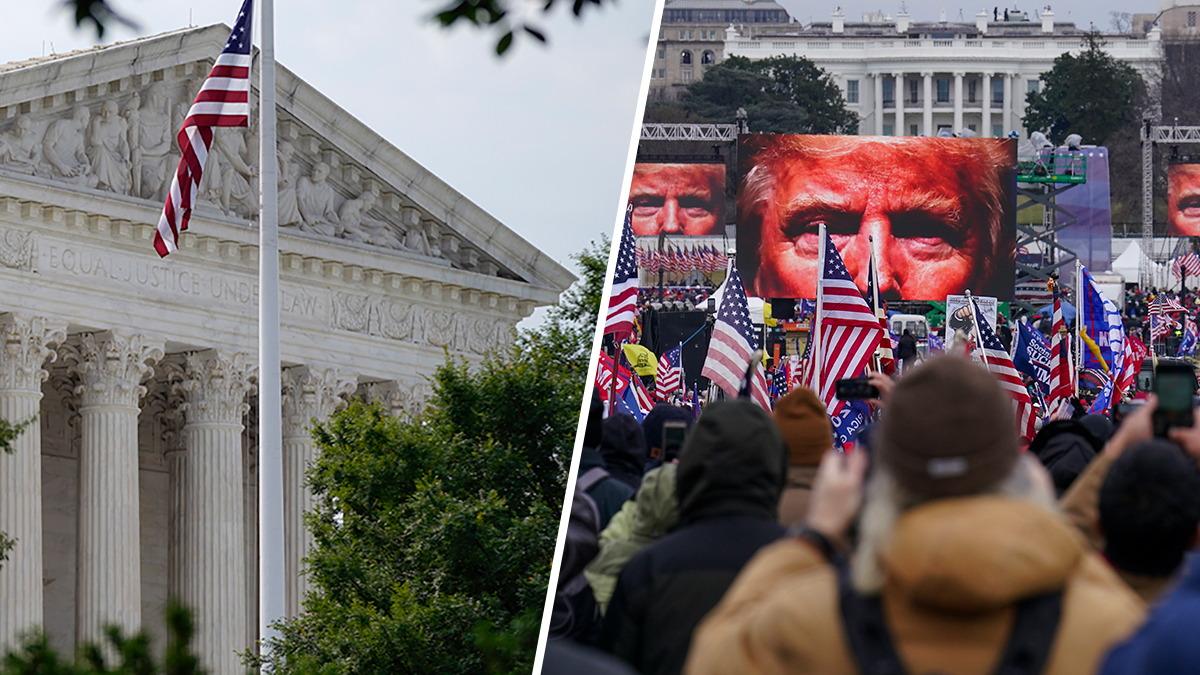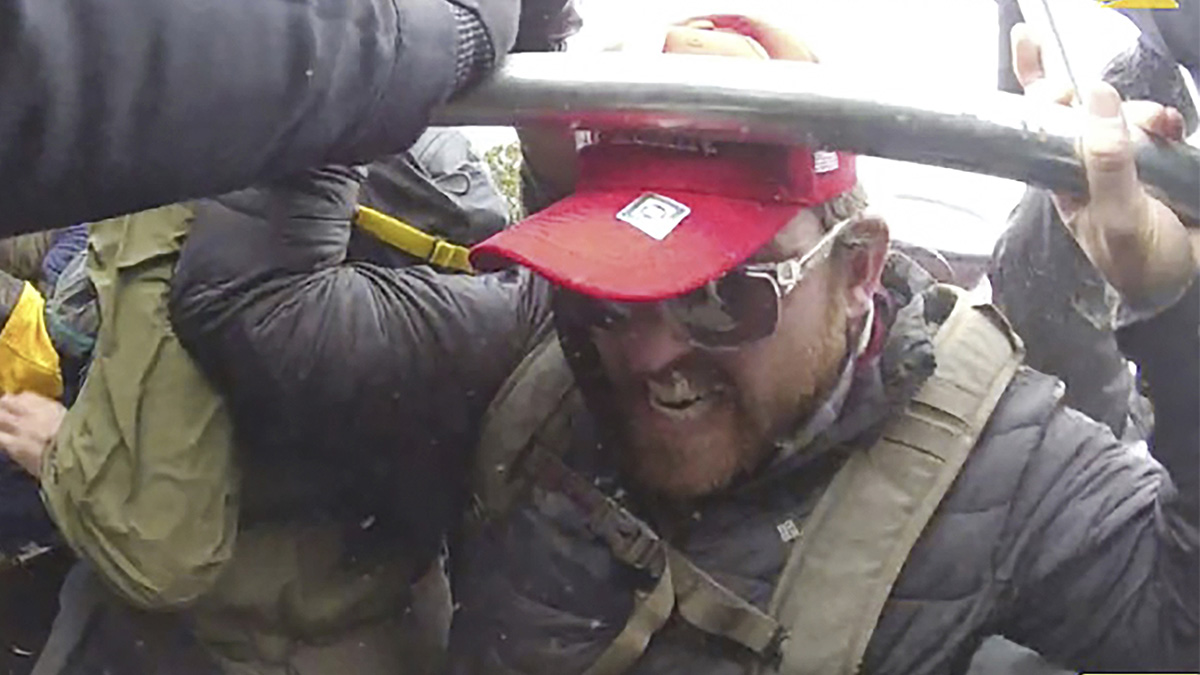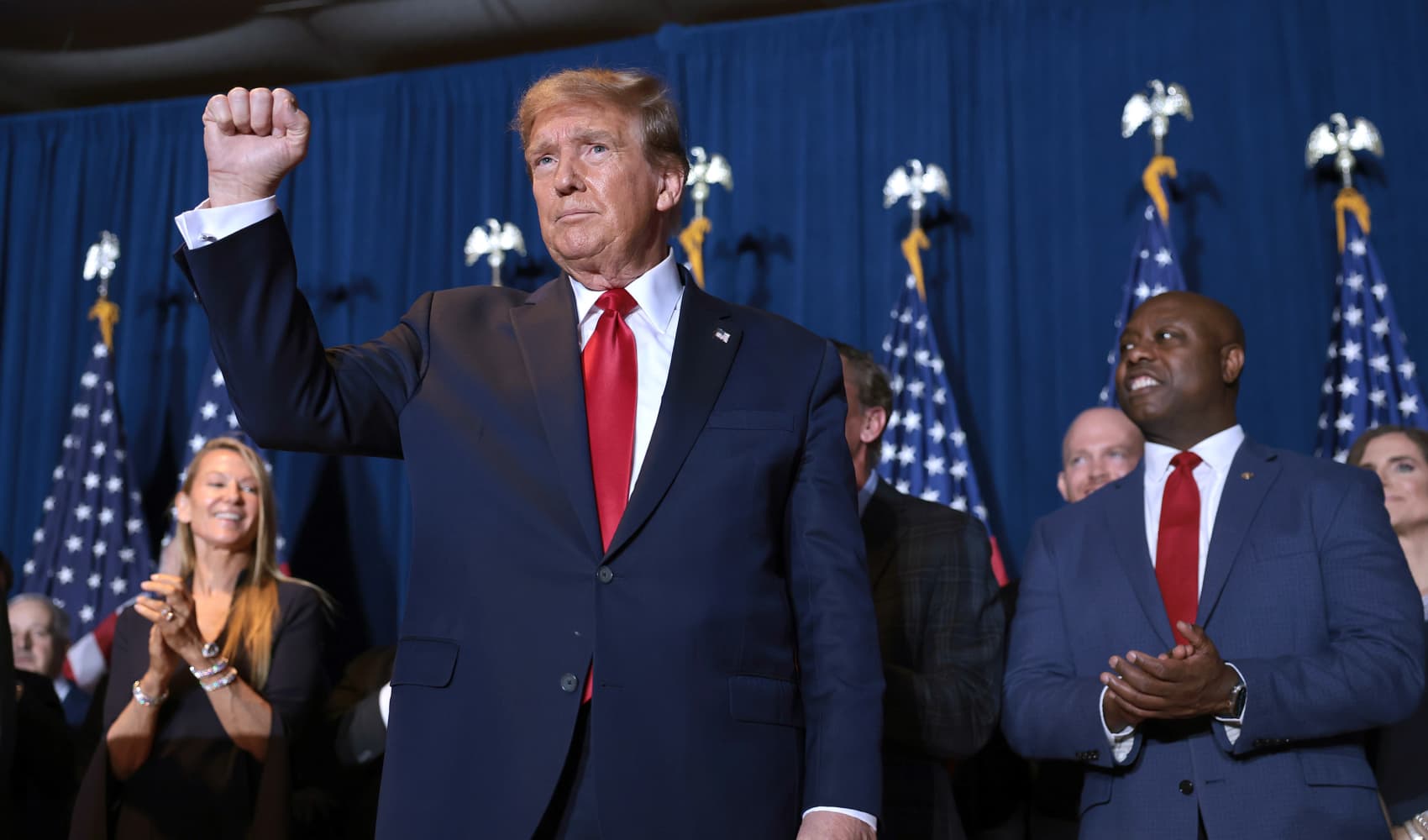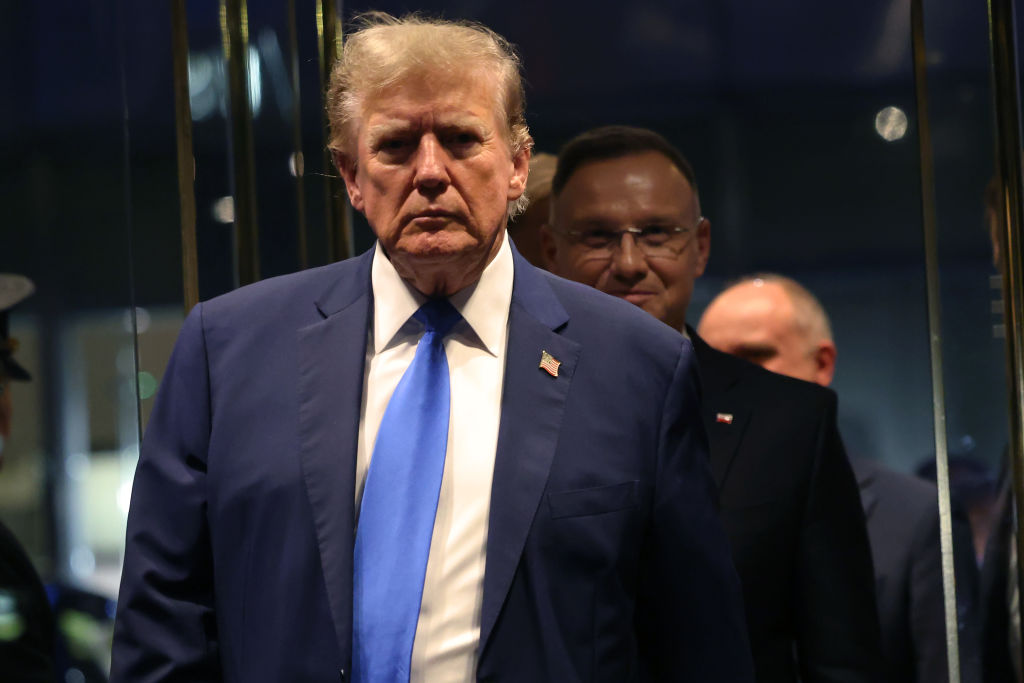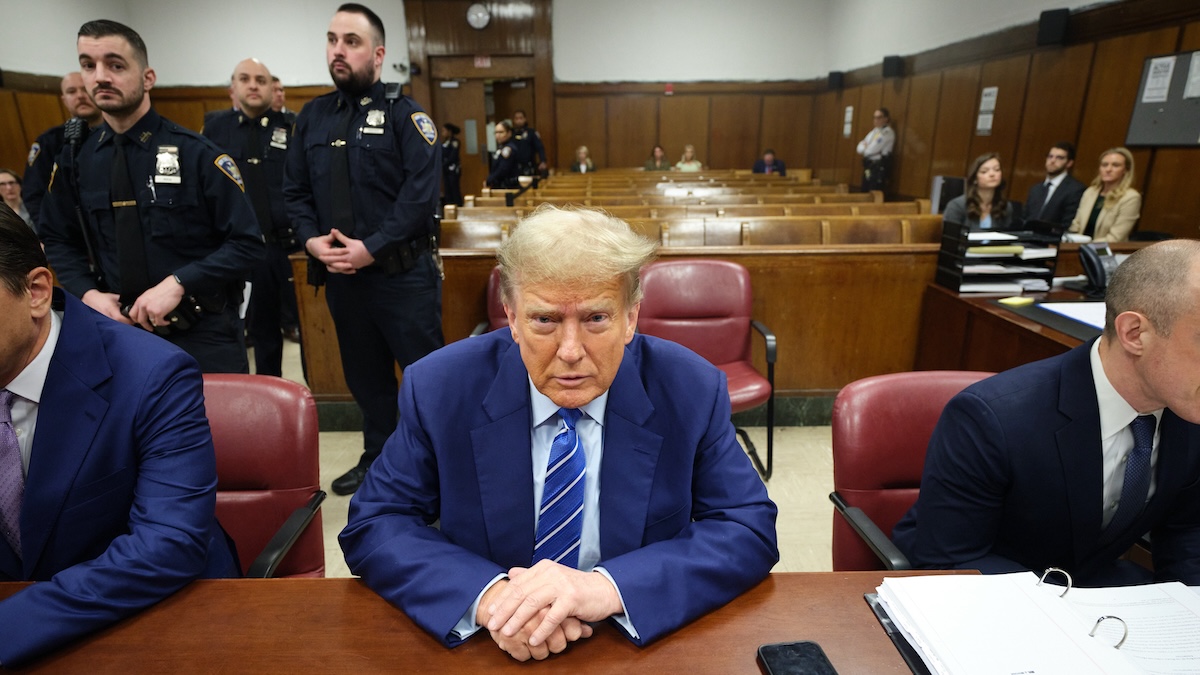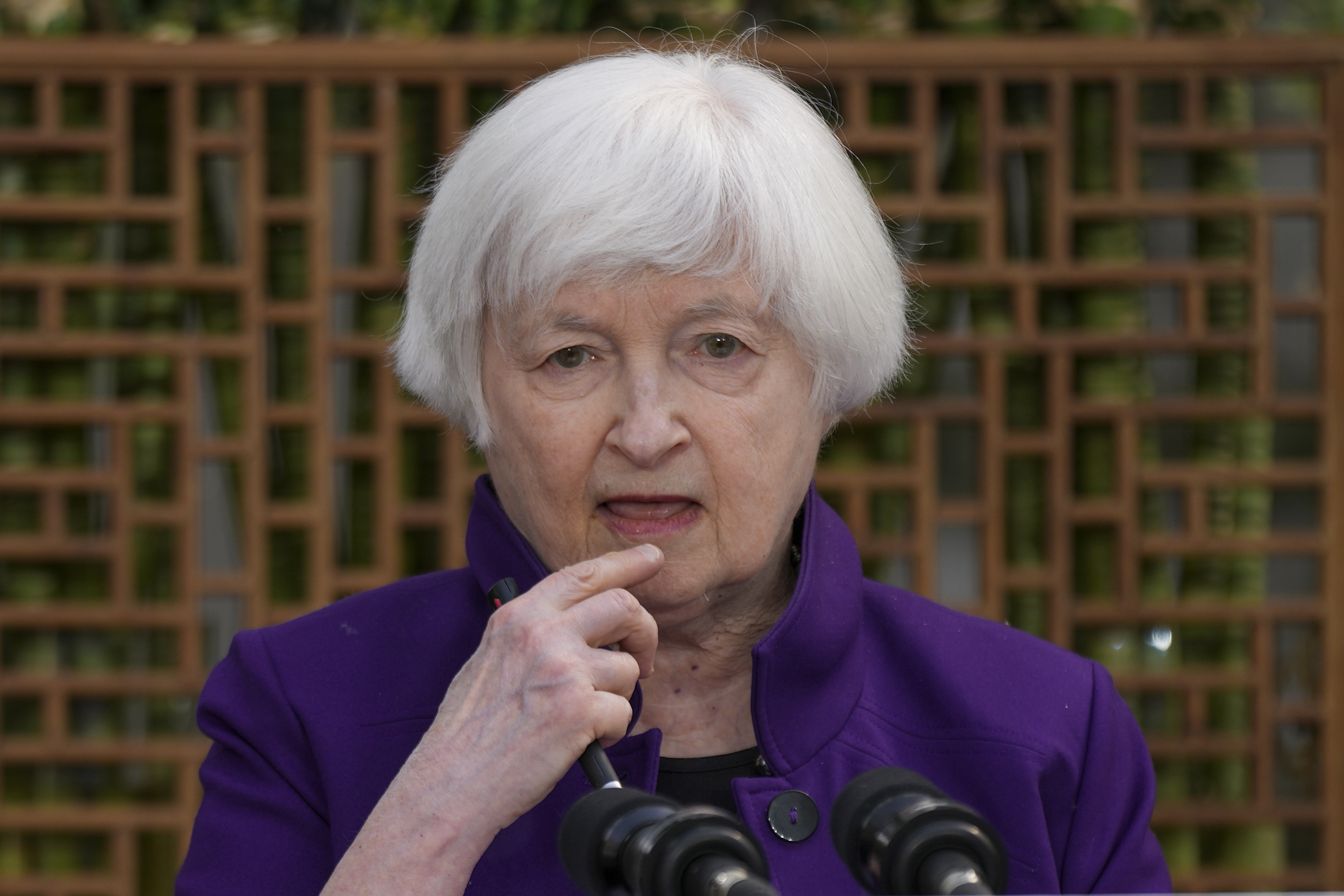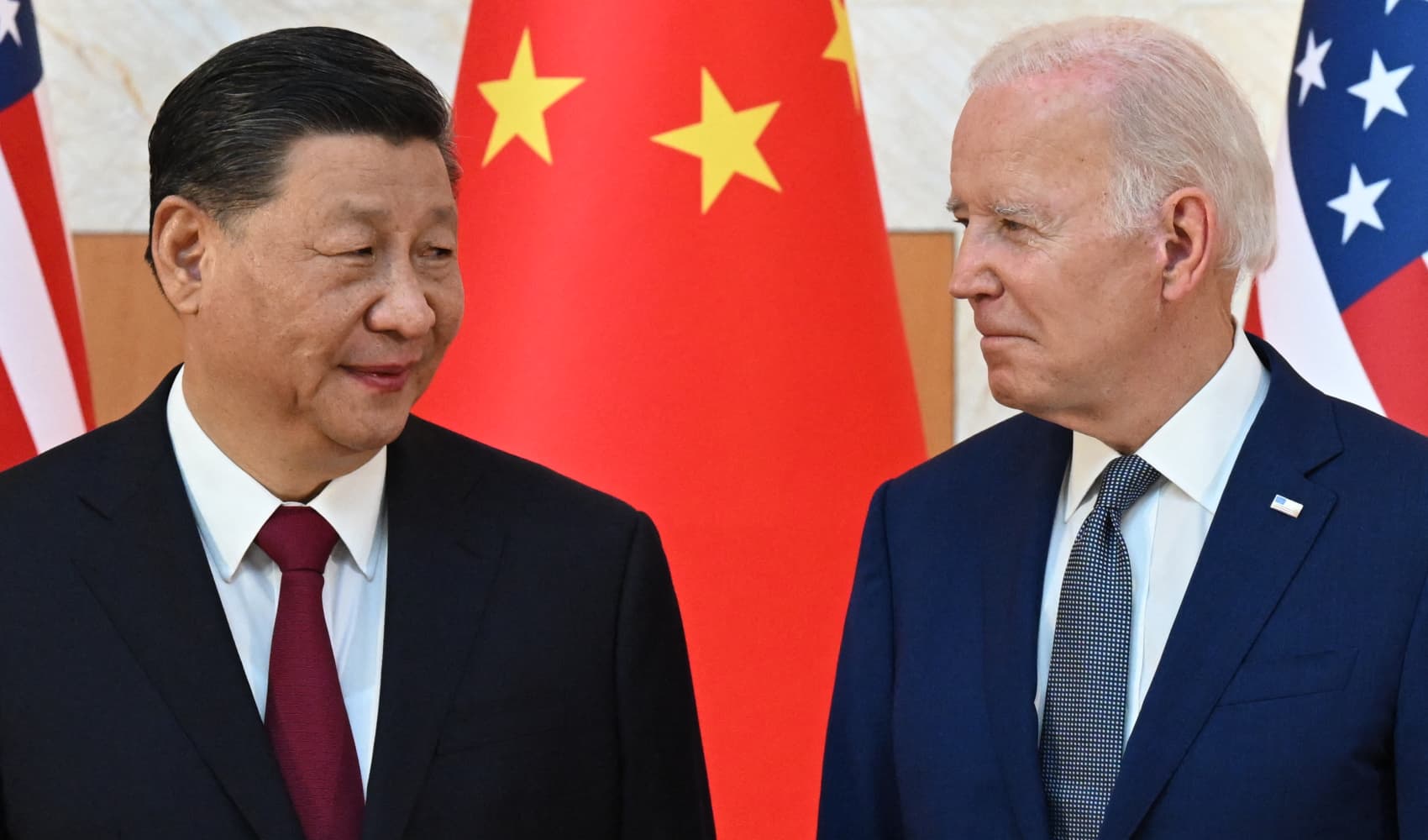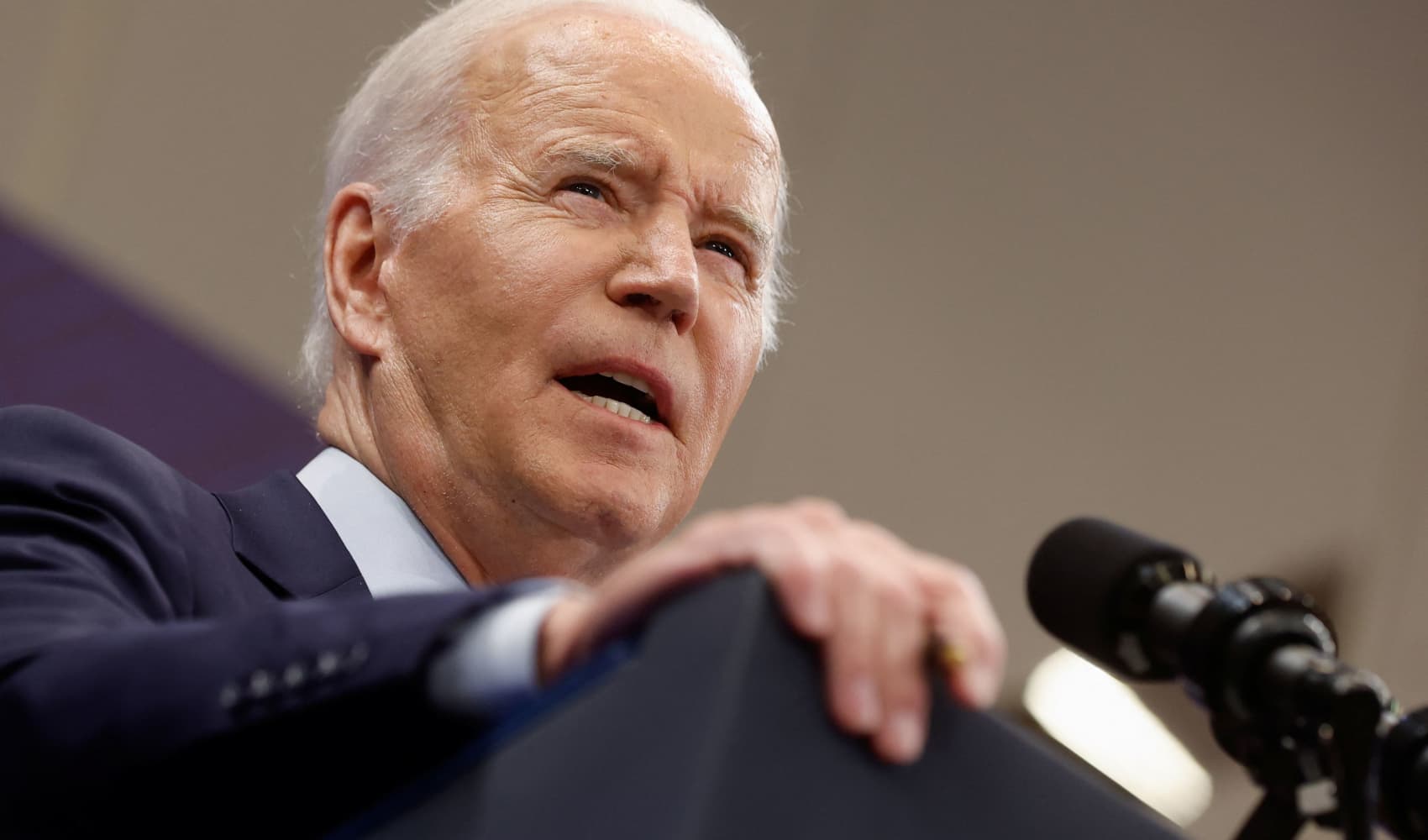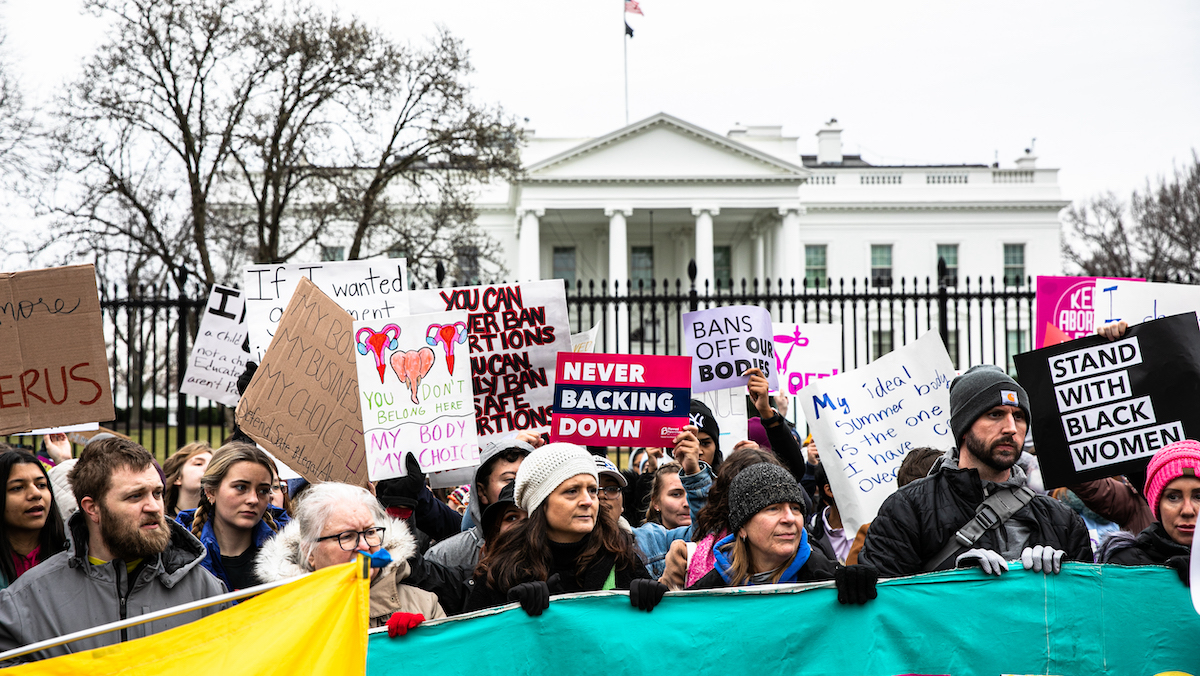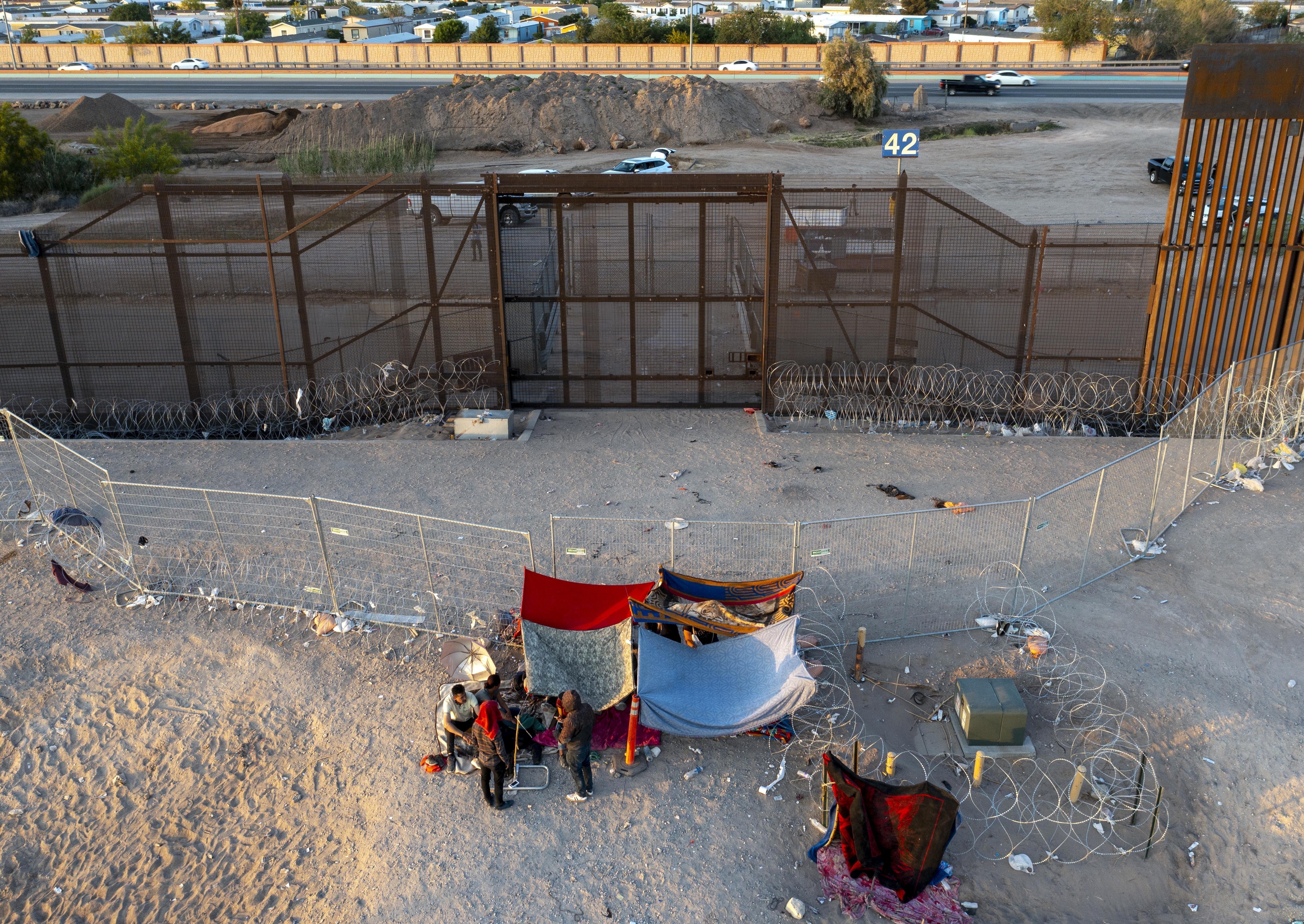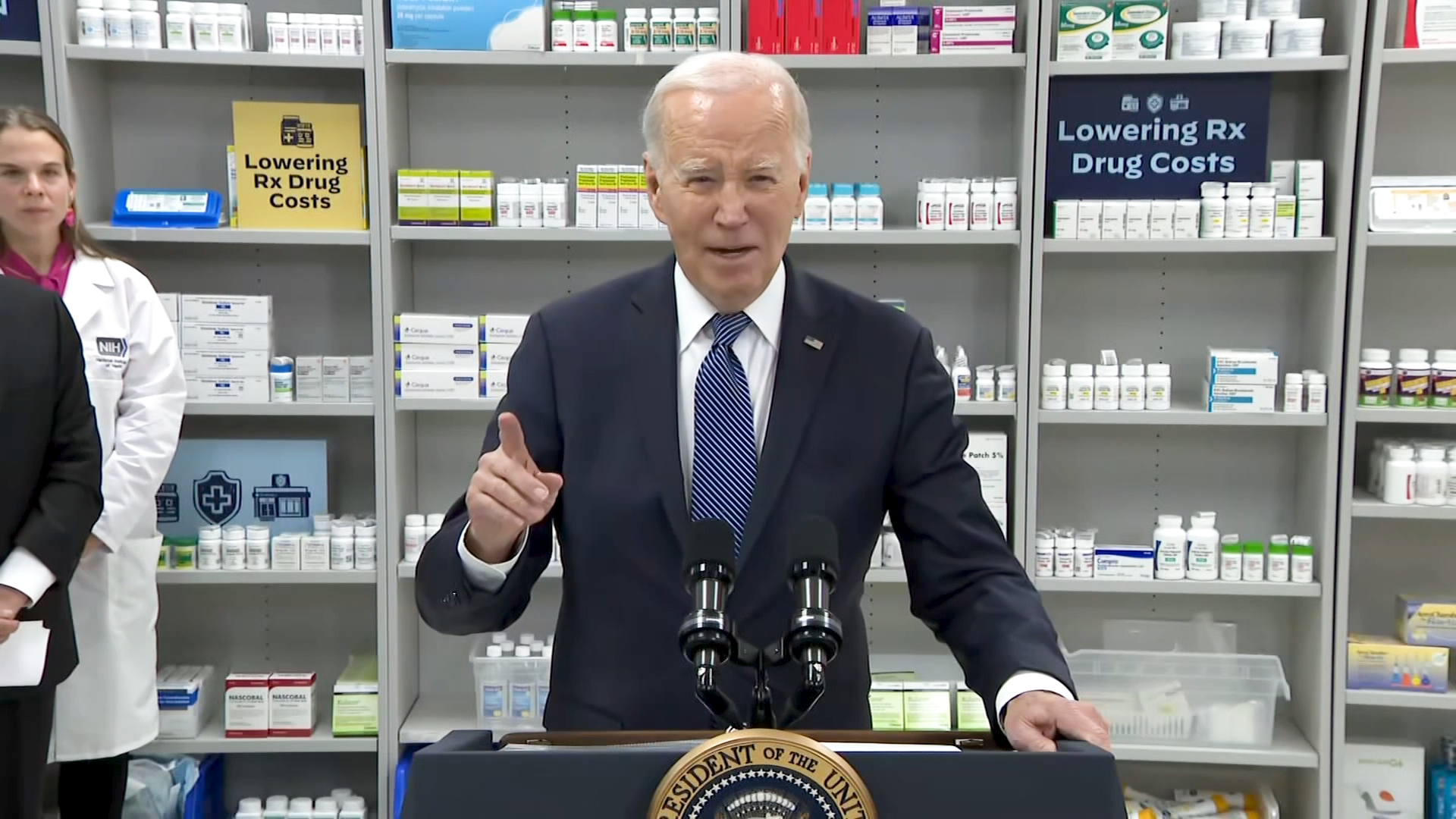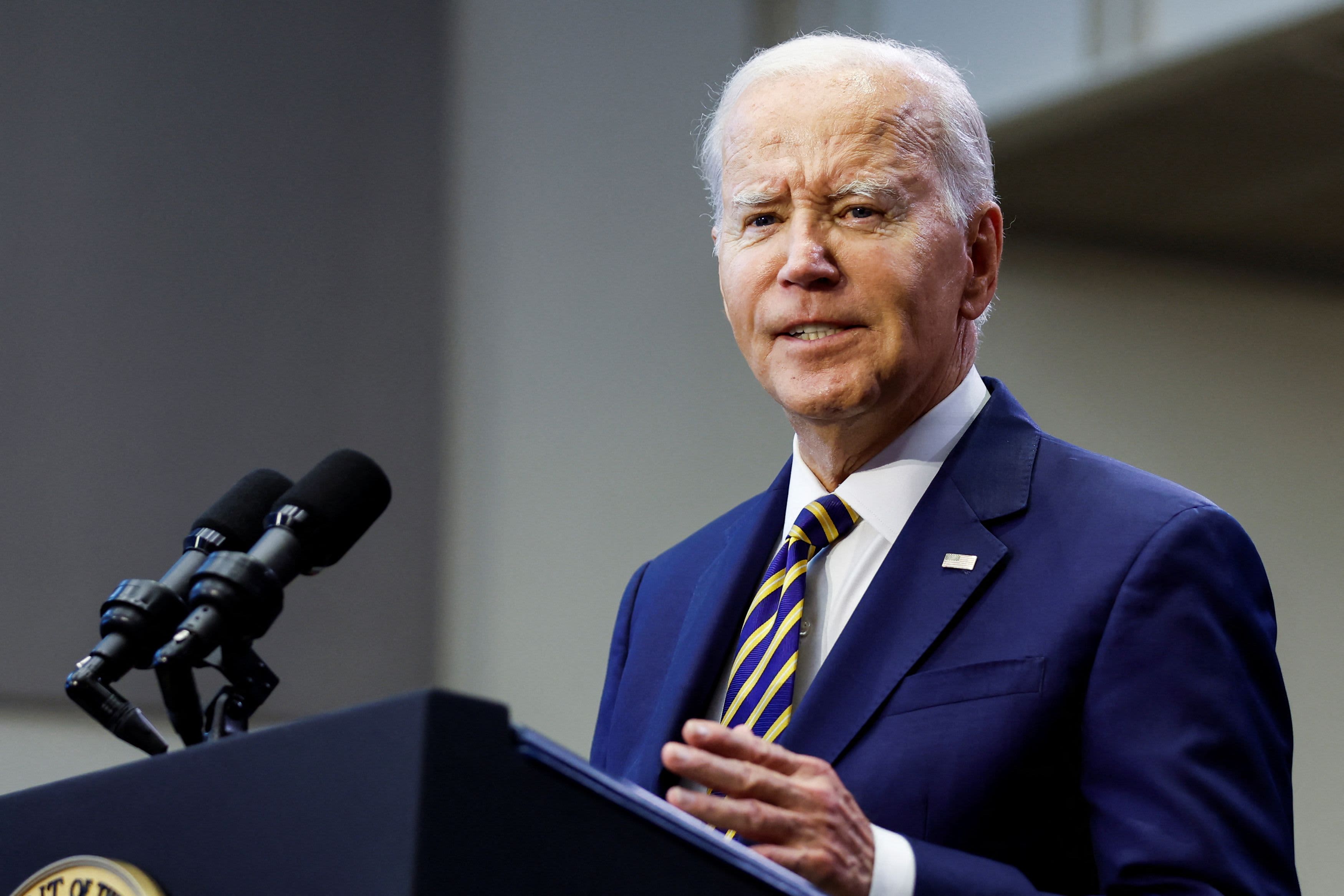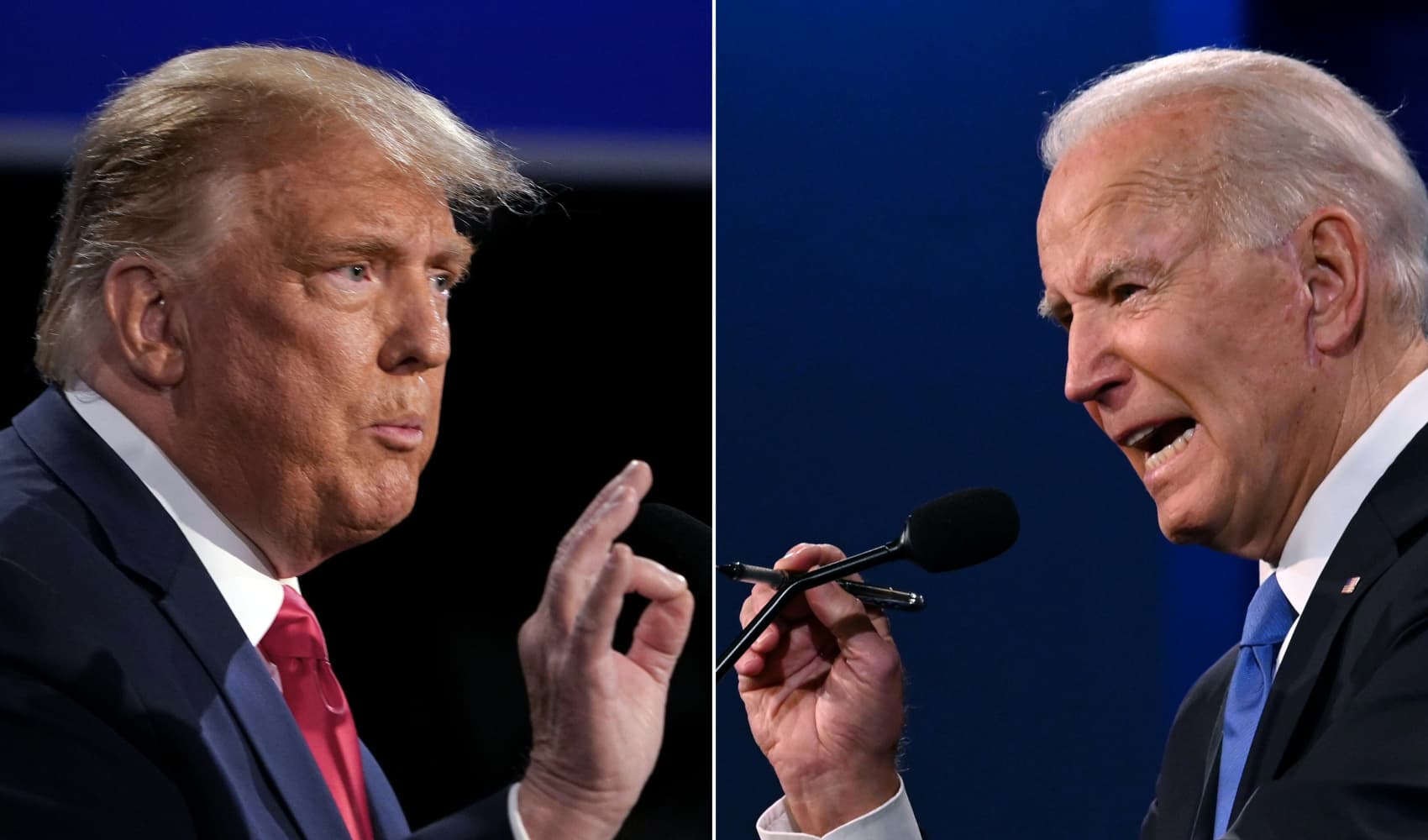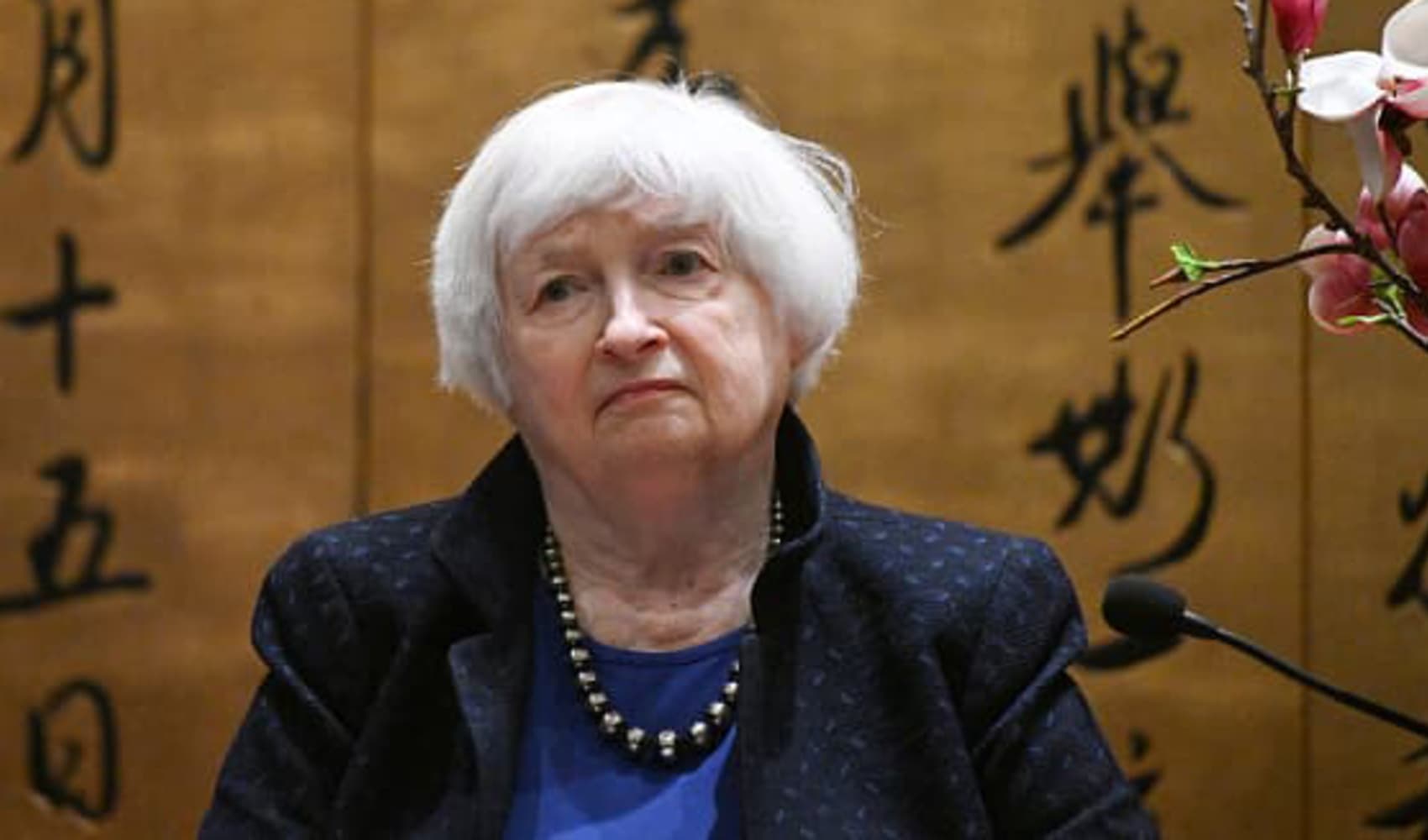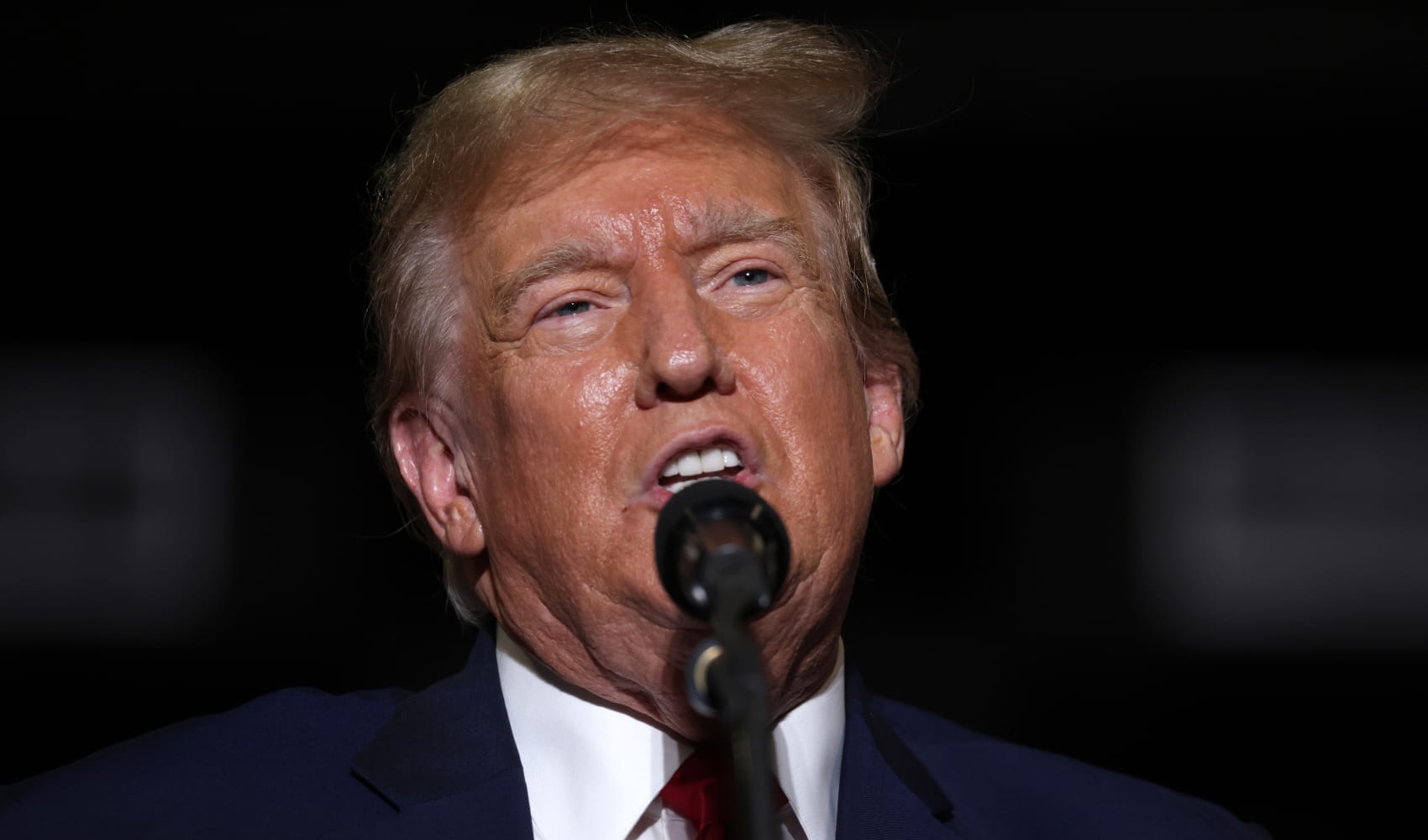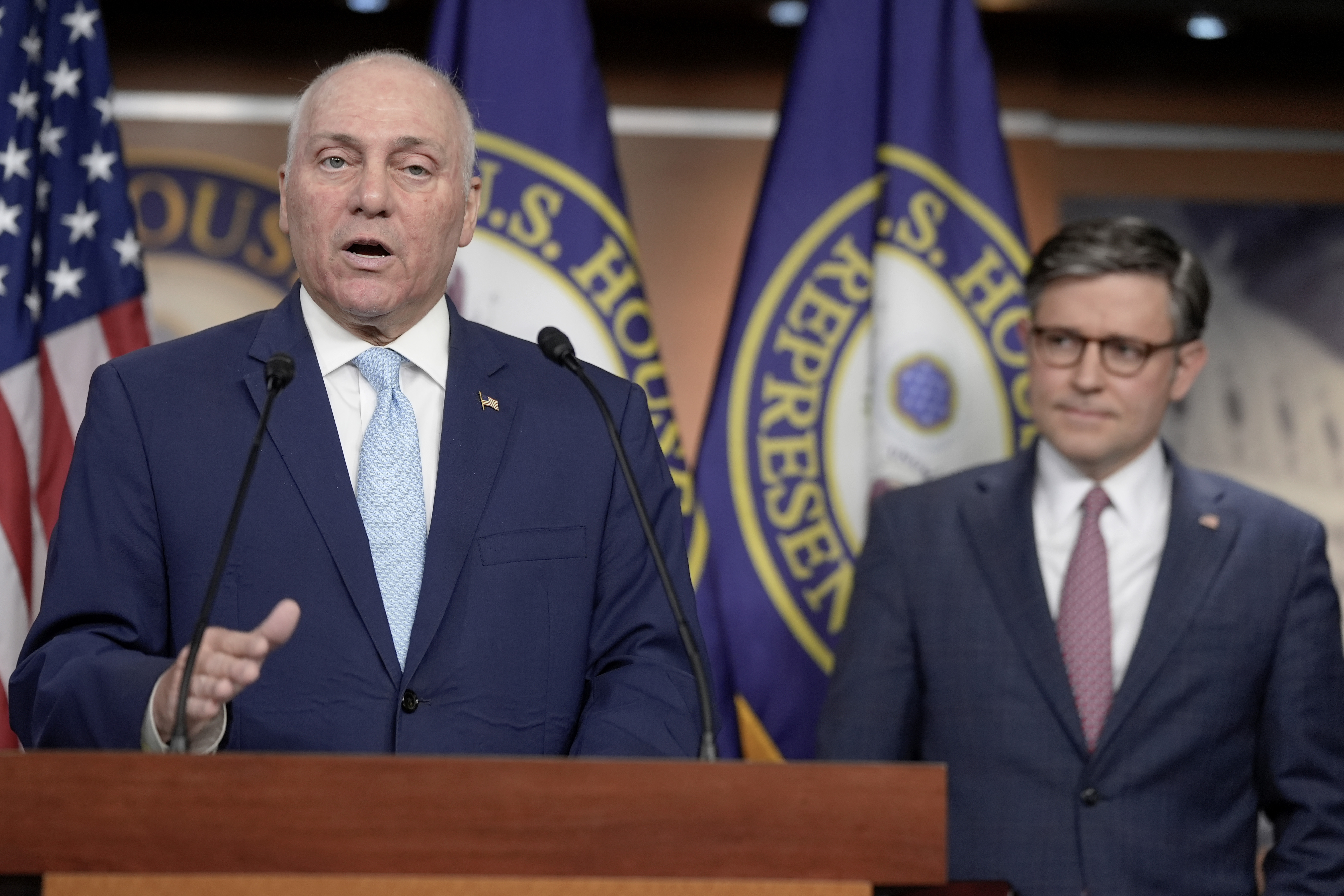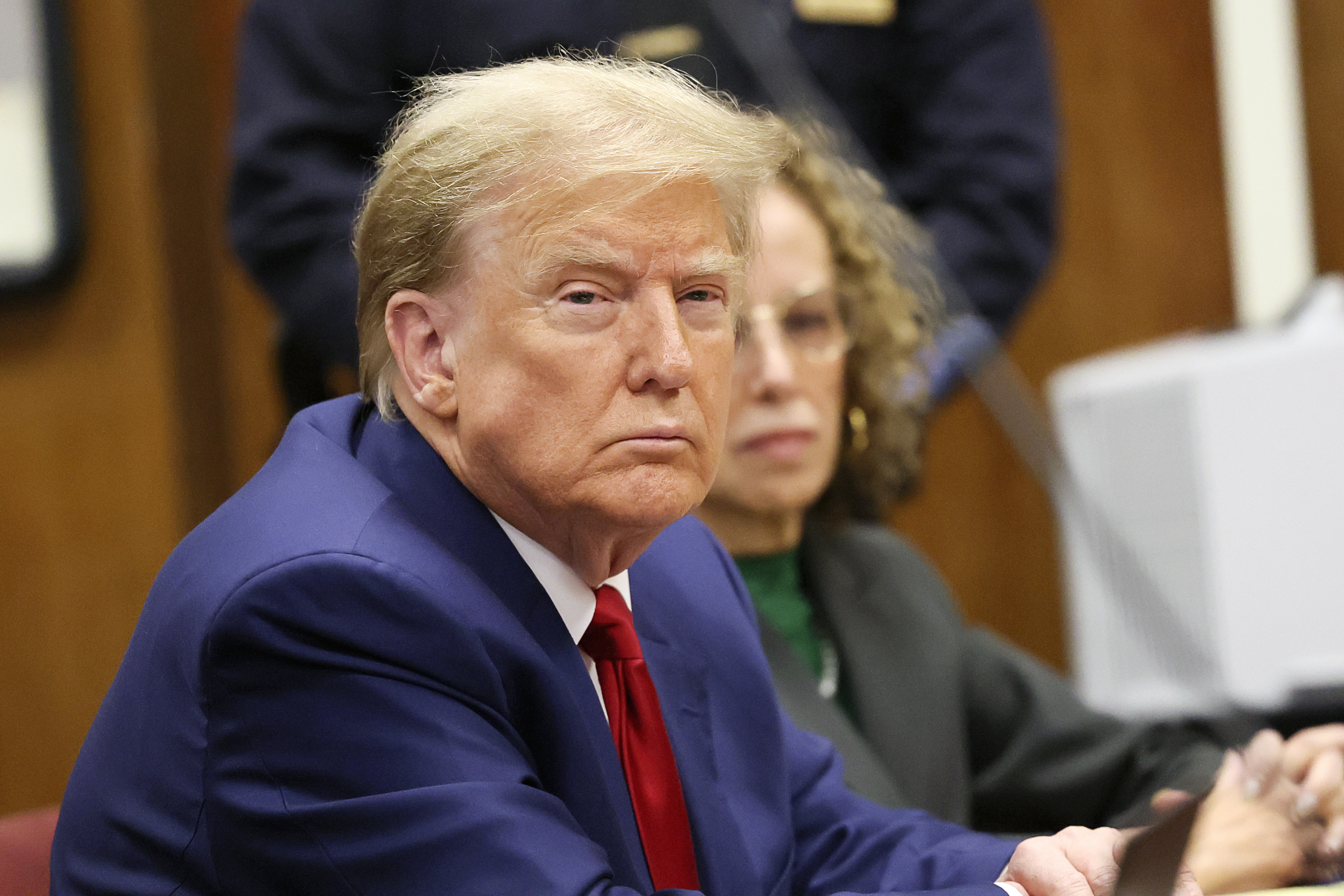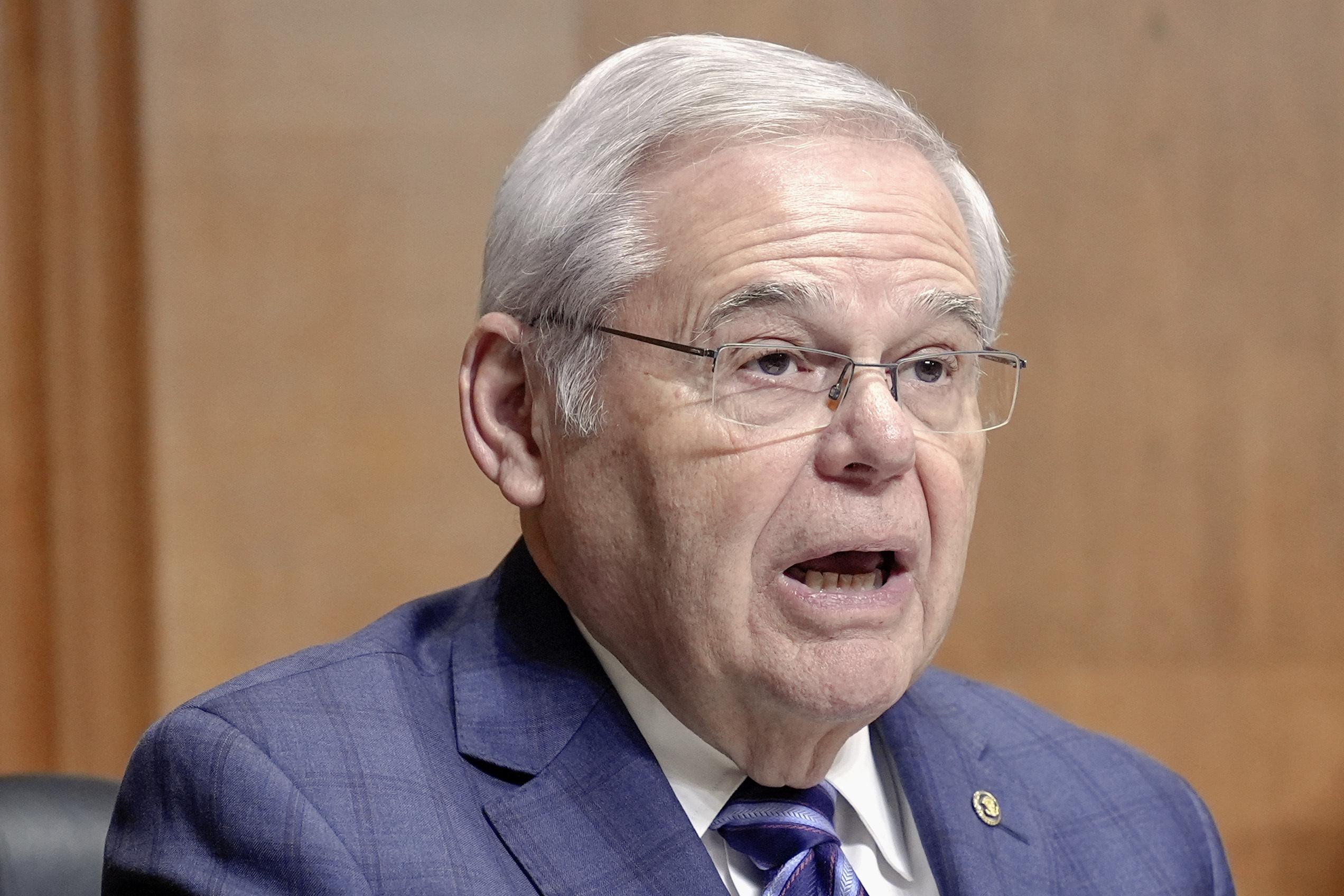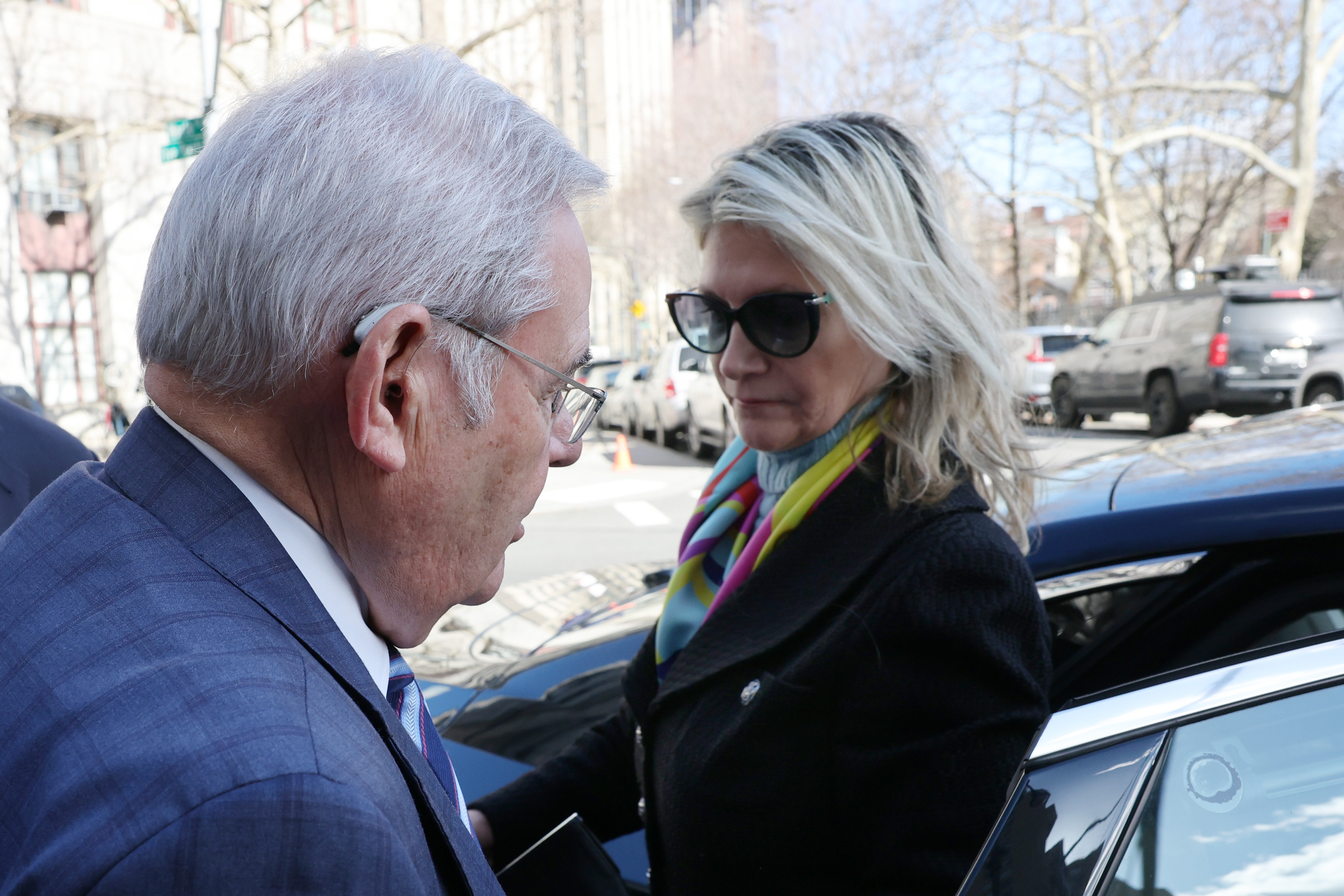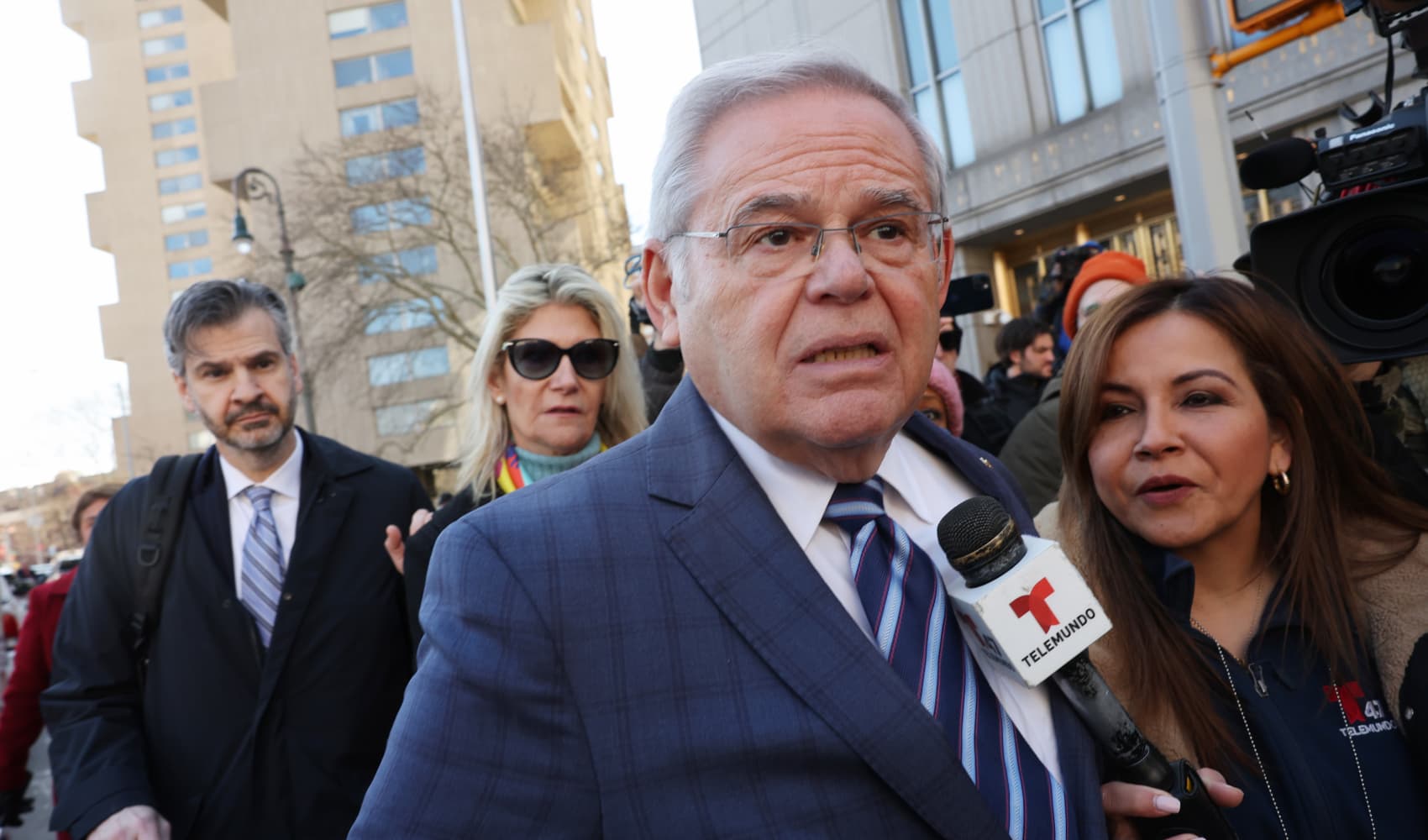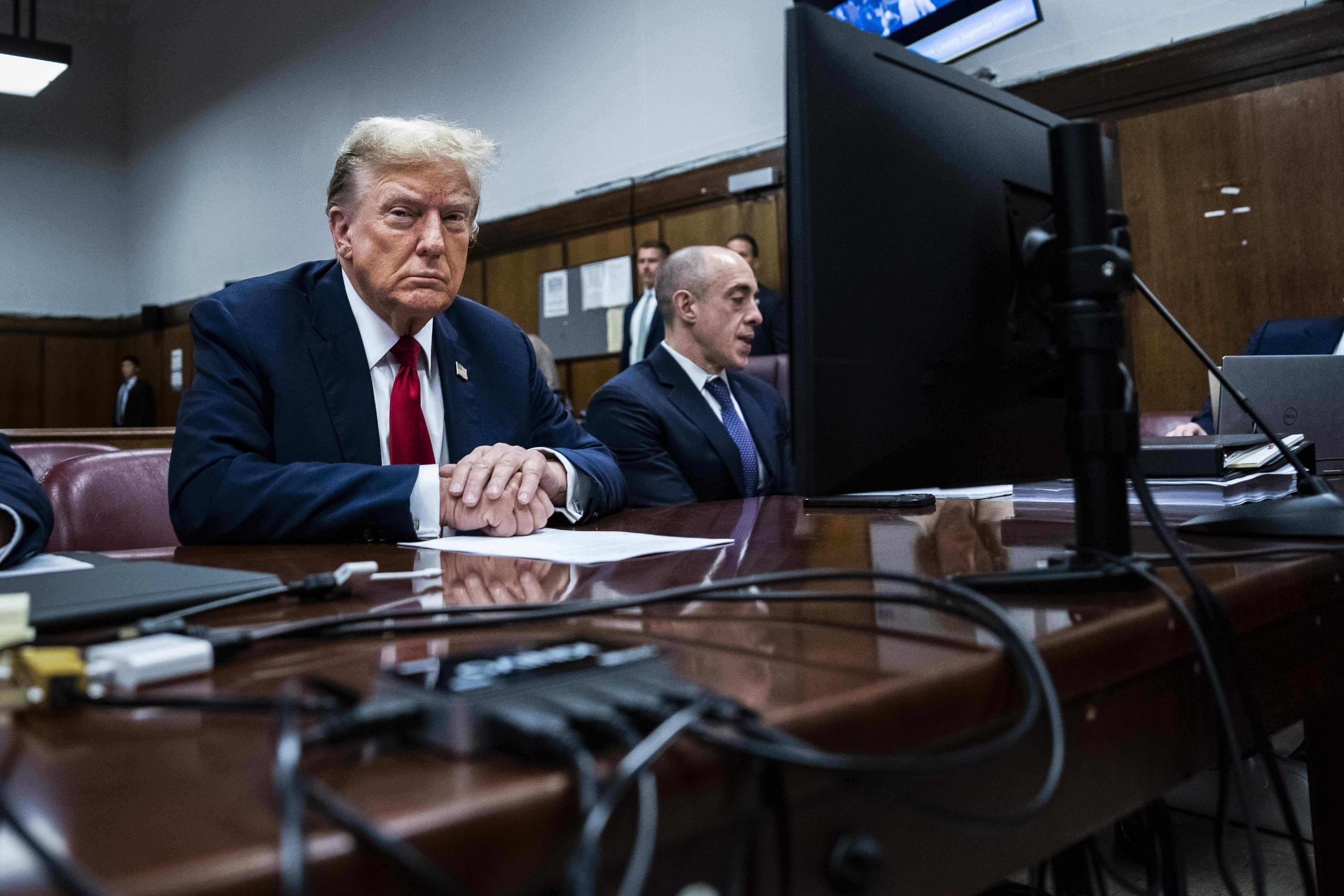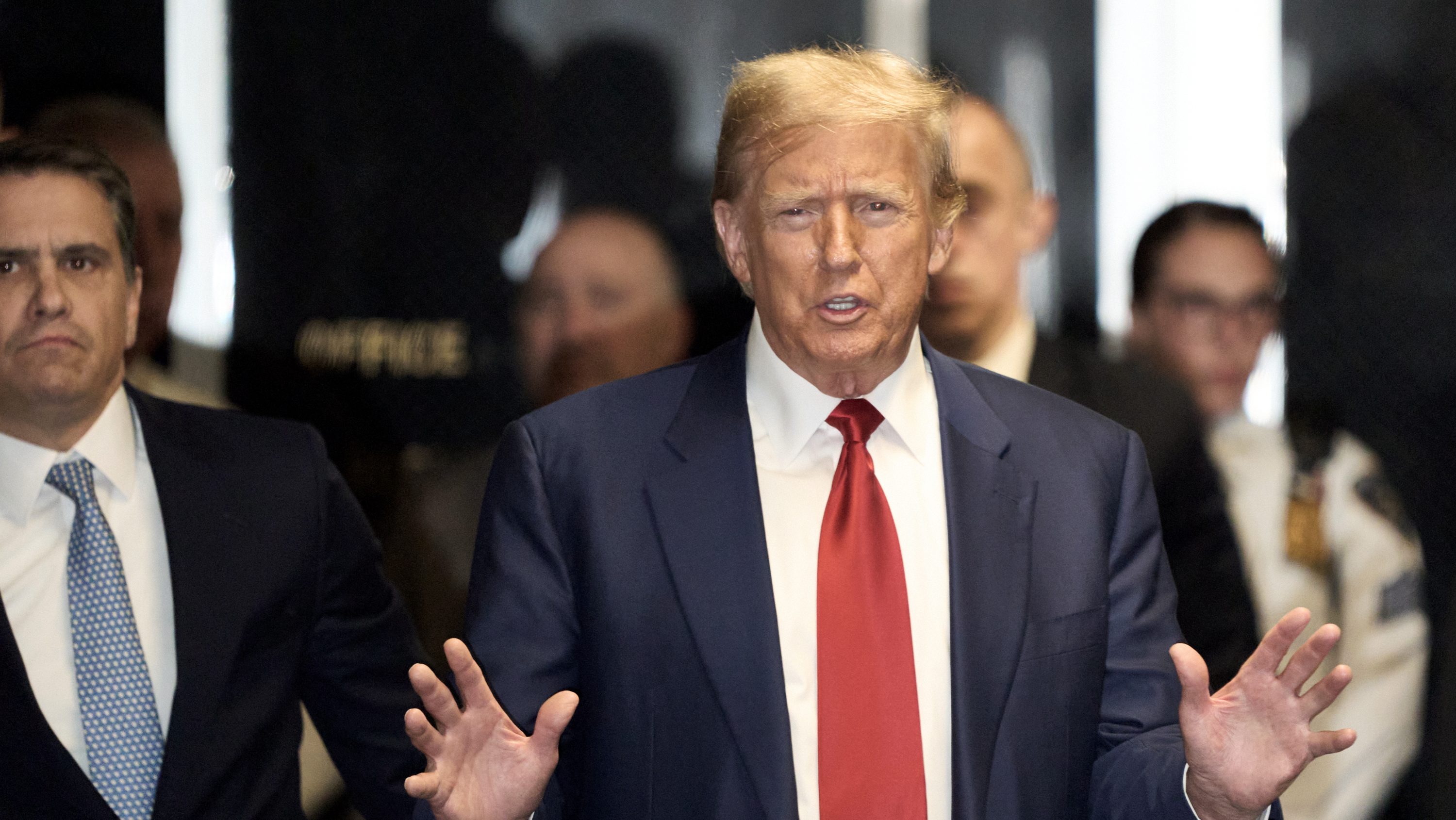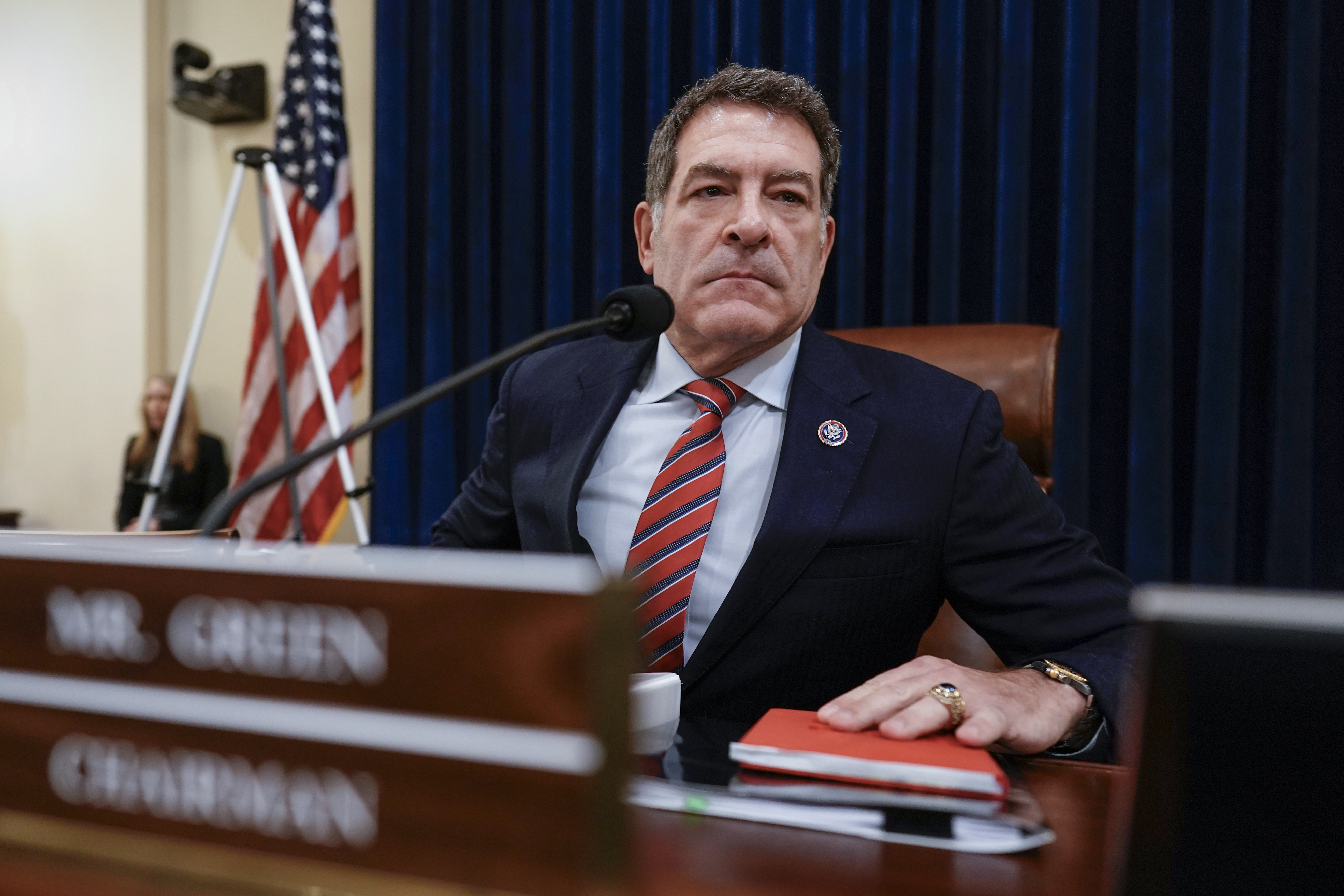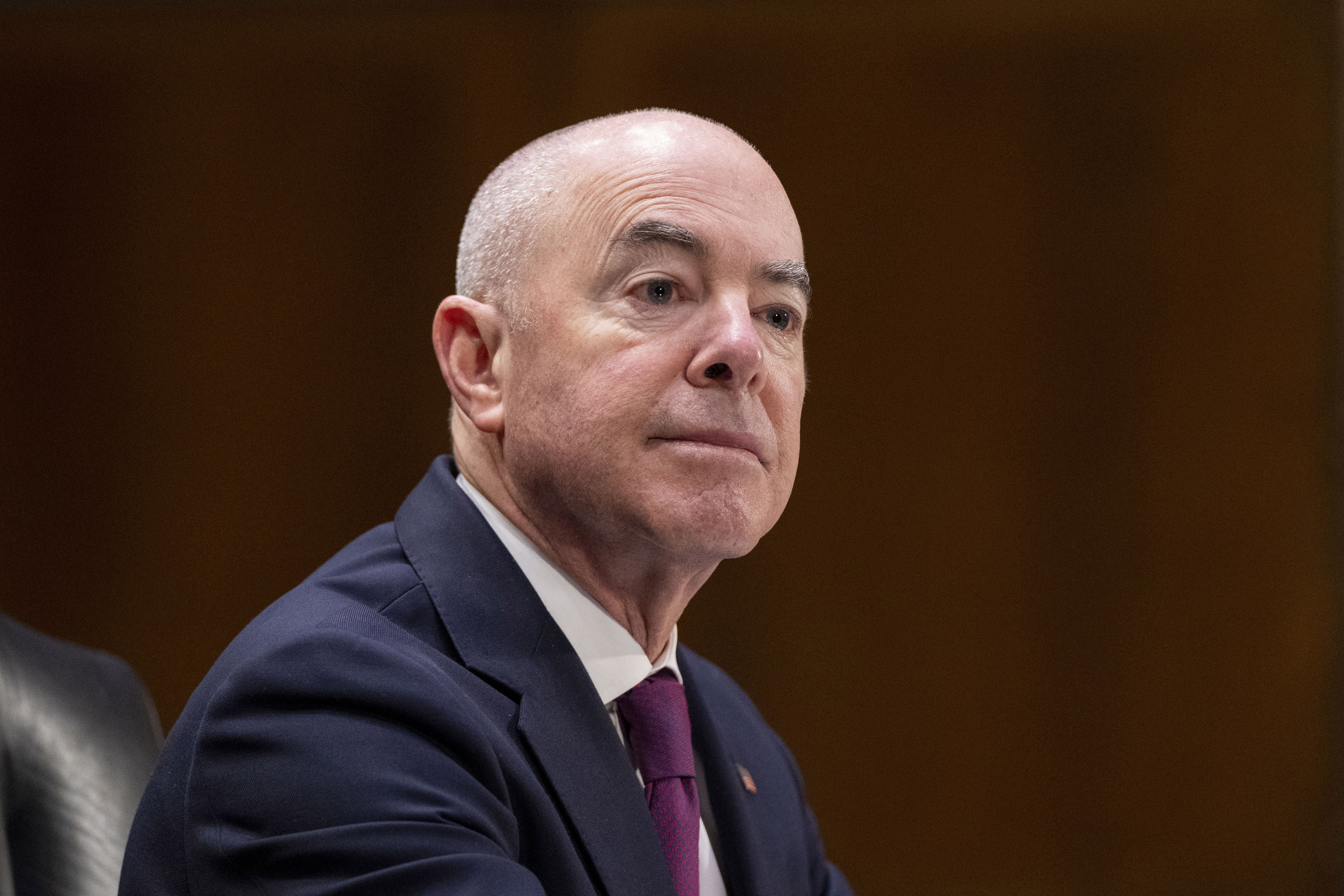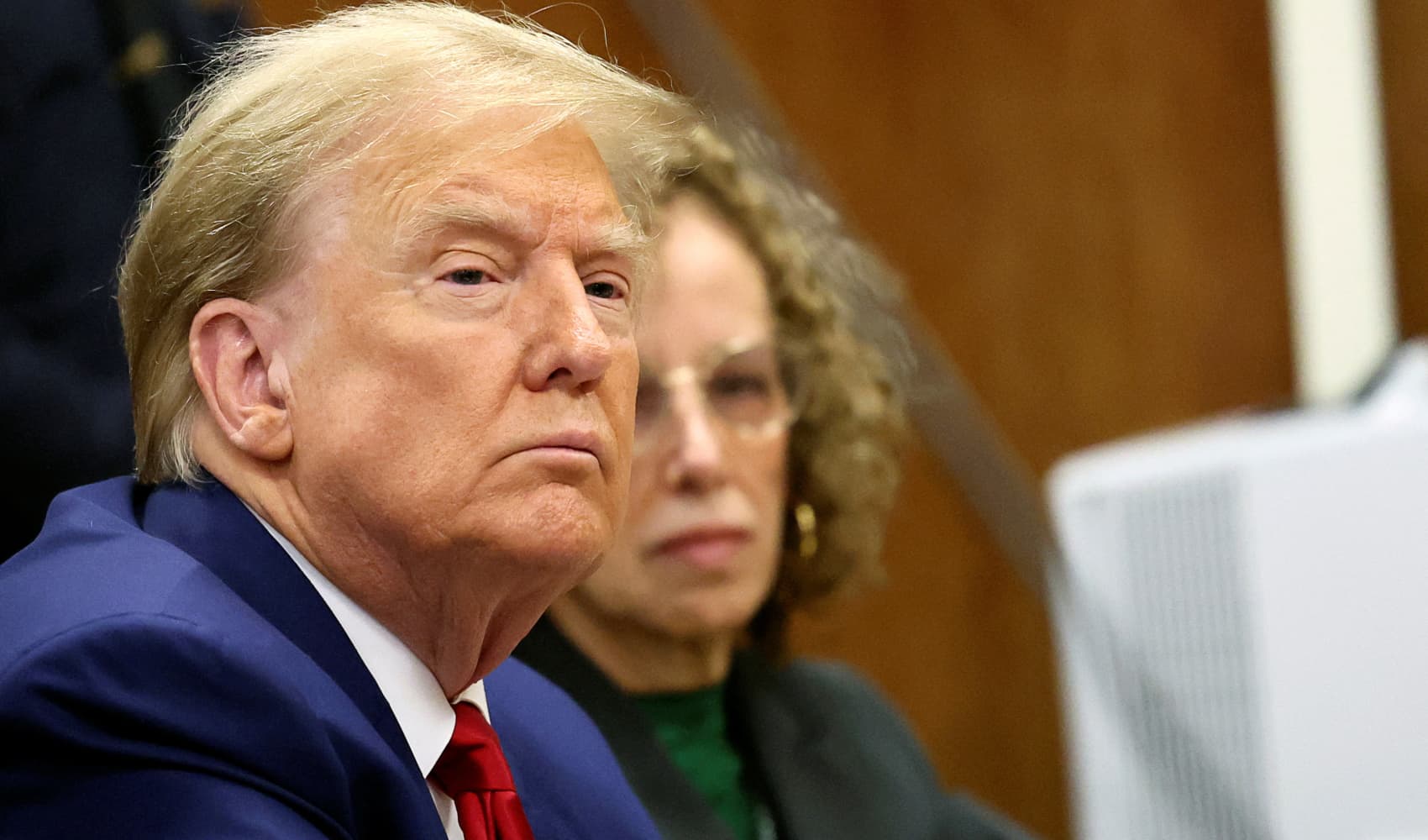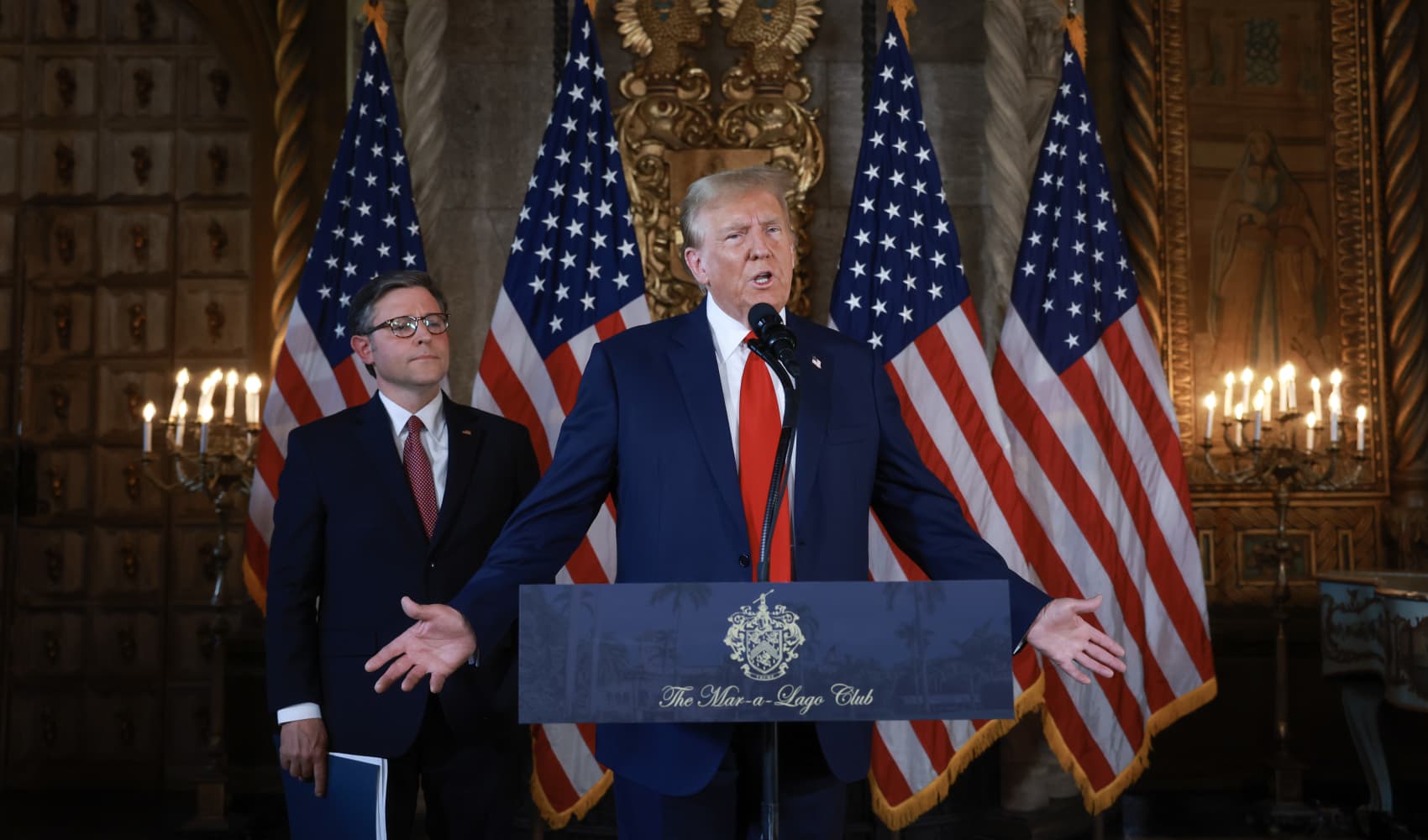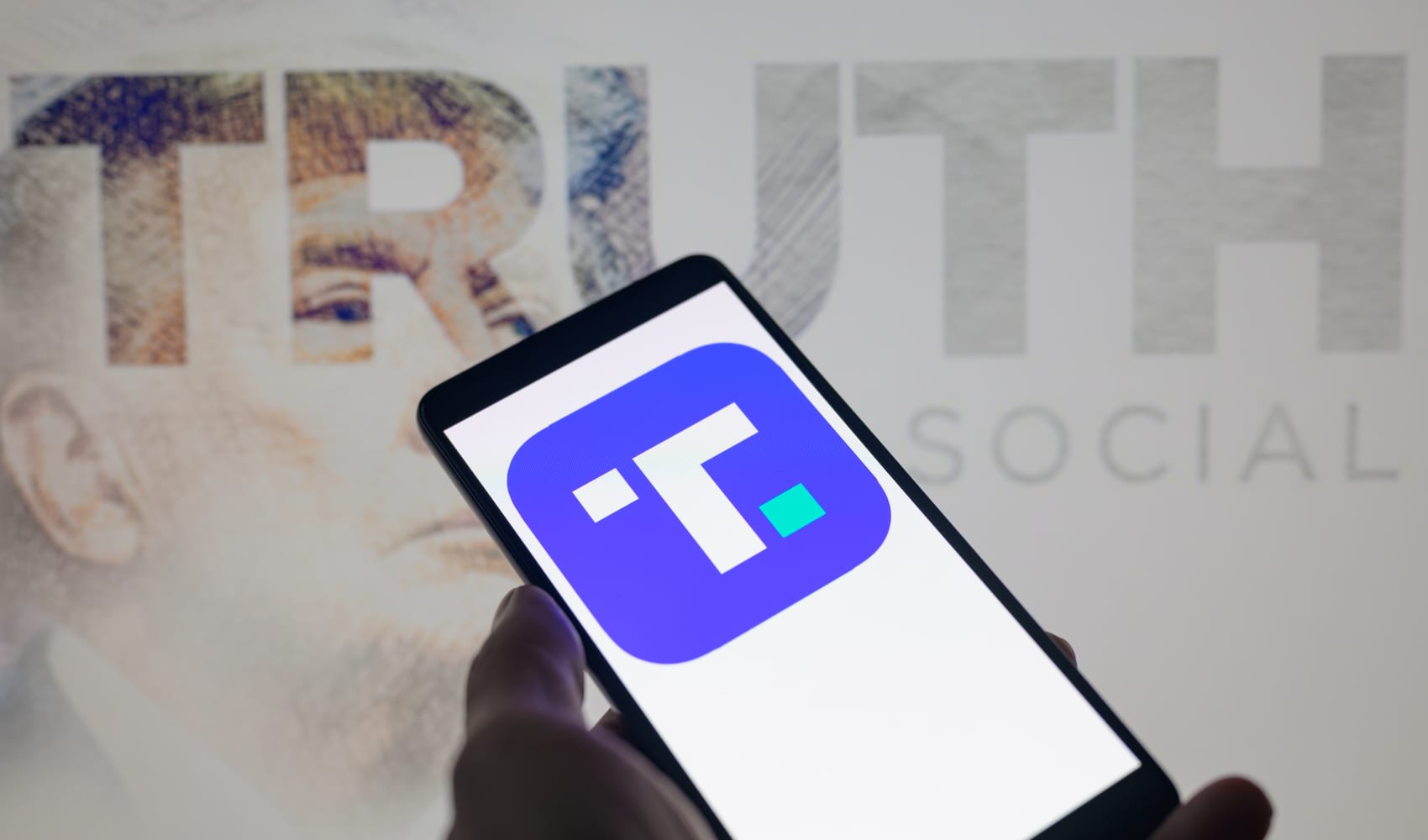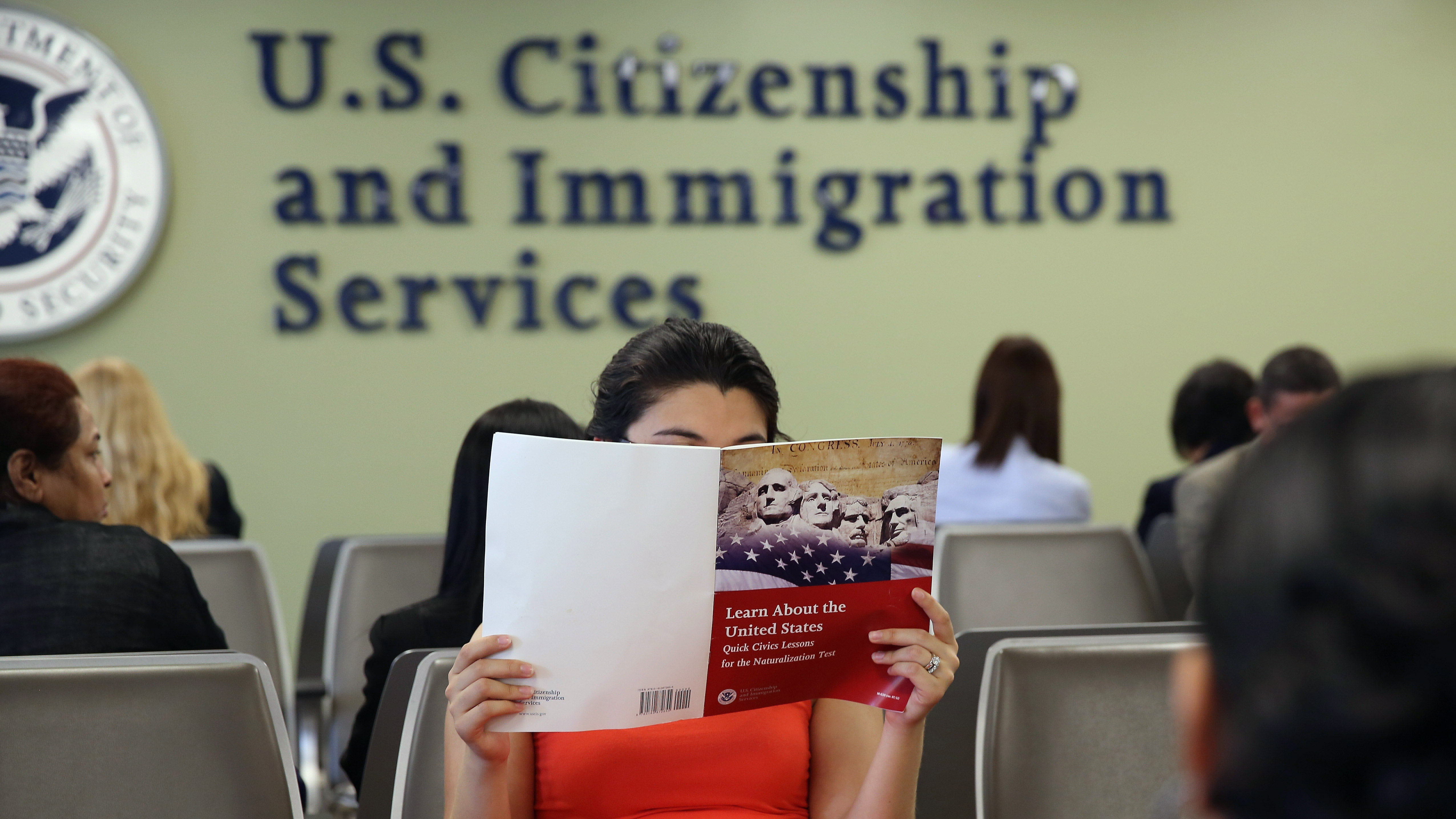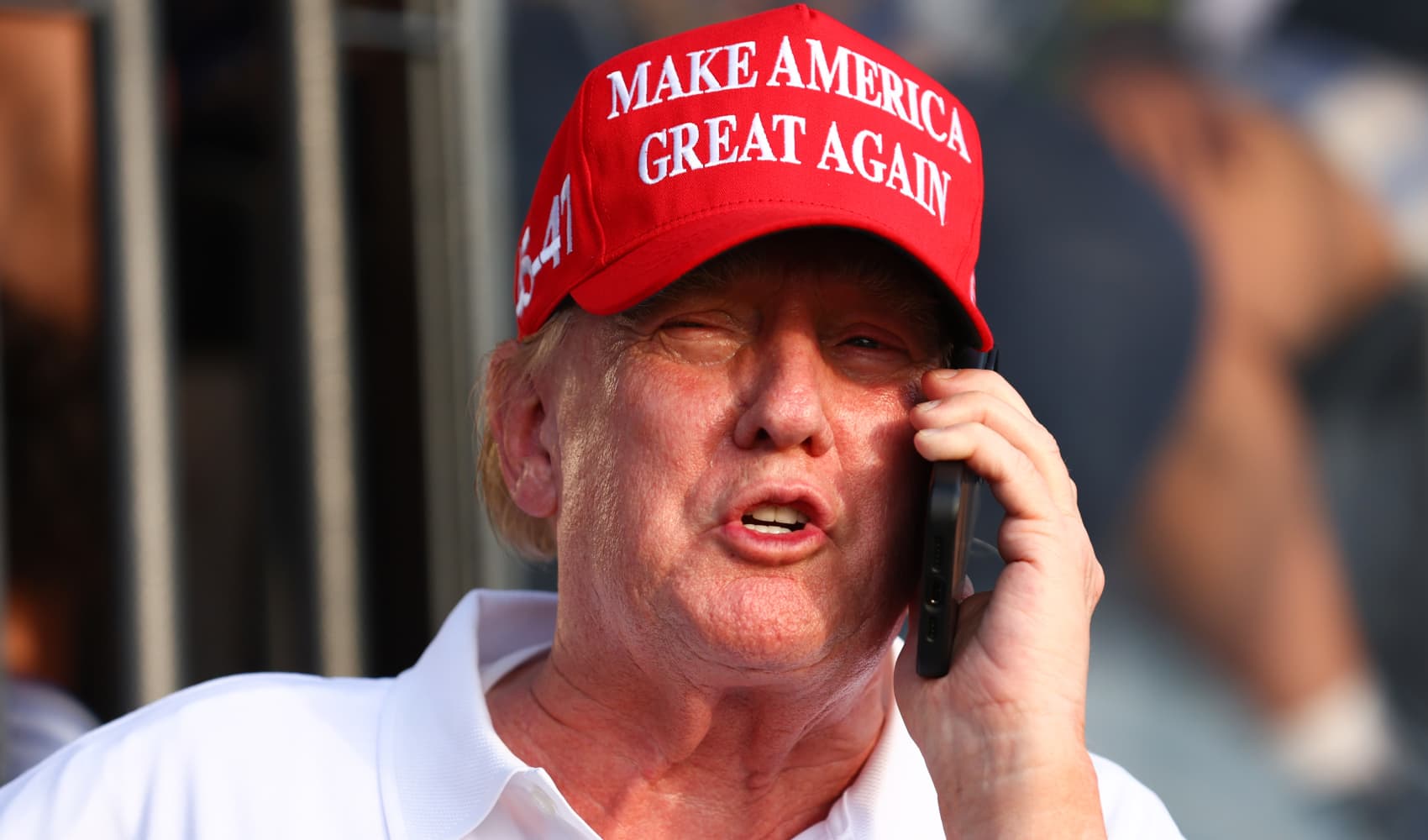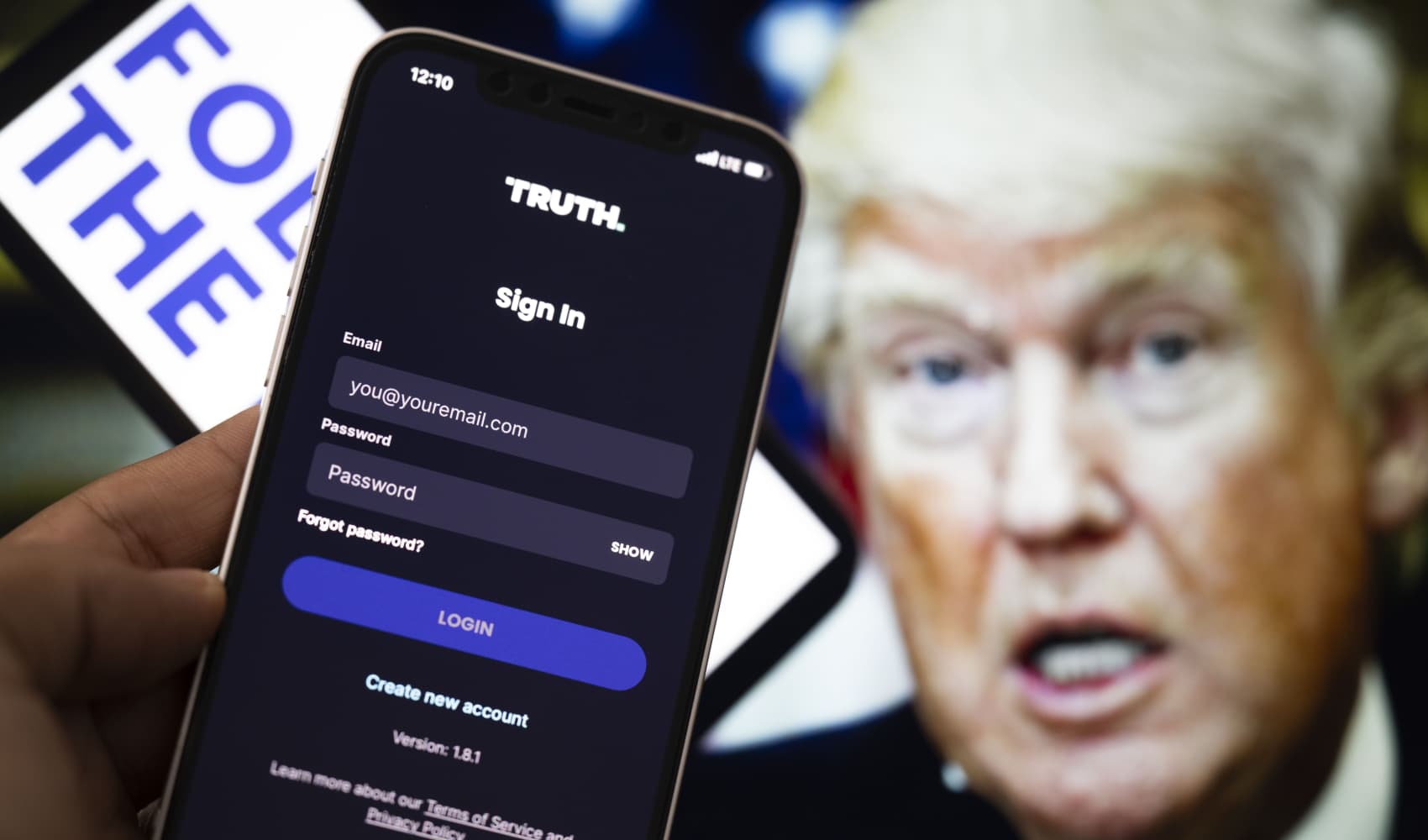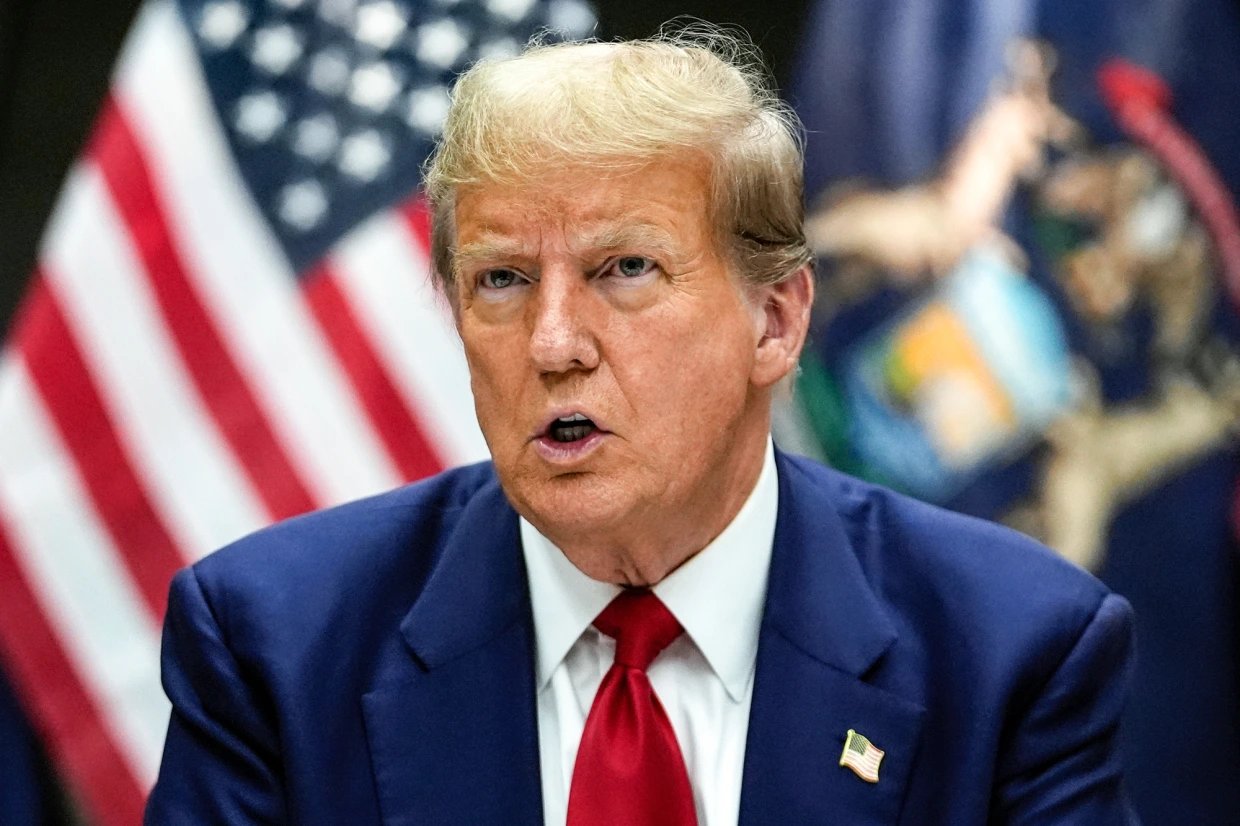News
|
News From NBC News Trump's lawyers will grill ex-tabloid publisher as 1st week of hush money trial testimony wrapsFriday April 26th, 2024 05:26:07 AM Michael R. Sisak, Jennifer Peltz, Jake Offenhartz and Alanna Durkin Richer | Associated PressAfter prosecutors’ lead witness painted a tawdry portrait of “catch and kill” tabloid schemes, defense lawyers in Donald Trump’s hush money trial are poised Friday to dig into an account of the former publisher of the National Enquirer and his efforts to protect Trump from negative stories during the 2016 election. David Pecker will return to the witness stand for the fourth day as defense attorneys try to poke holes in the testimony of the former National Enquirer publisher, who has described helping bury embarrassing stories Trump feared could hurt his campaign. It will cap a consequential week in the criminal cases the former president is facing as he vies to reclaim the White House in November. At the same time jurors listened to testimony in Manhattan, the Supreme Court on Thursday signaled it was likely to reject Trump’s sweeping claims that he is immune from prosecution in his 2020 election interference case in Washington. But the conservative-majority high court seemed inclined to limit when former presidents could be prosecuted — a ruling that could benefit Trump by delaying that trial, potentially until after the November election. In New York — the first of Trump’s four criminal cases to go to trial — the presumptive Republican presidential nominee faces 34 felony counts of falsifying business records in connection with hush money payments meant to stifle negative stories from surfacing in the final days of the 2016 campaign. Prosecutors allege that Trump sought to illegally influence the 2016 race through a practice known in the tabloid industry as “catch-and-kill” — catching a potentially damaging story by buying the rights to it and then killing it through agreements that prevent the paid person from telling the story to anyone else. Over several days on the witness stand, Pecker has described how he and the tabloid parlayed rumor-mongering into splashy stories that smeared Trump’s opponents and, just as crucially, leveraged his connections to suppress seamy stories about Trump. The charges center on $130,000 in payments that Trump’s company made to his then-lawyer, Michael Cohen. He paid that sum on Trump’s behalf to keep porn actor Stormy Daniels from going public with her claims of a sexual encounter with Trump a decade earlier. Trump has denied the encounter ever happened. During the cross-examination that began Thursday, defense attorney Emil Bove grilled Pecker on his recollection of specific dates and meanings. He appeared to be laying further groundwork for the defense’s argument that any dealings Trump had Pecker were intended to protect himself, his reputation and his family — not his campaign. Pecker recalled how an editor told him that Daniels’ representative was trying to sell her story and that the tabloid could acquire it for $120,000. Pecker said he put his foot down, noting that the tabloid was already $180,000 in the hole for Trump-related catch-and-kill transactions. But, Pecker said, he told Cohen to buy the story himself to prevent Daniels from going public with her claim. “I said to Michael, ‘My suggestion to you is that you should buy the story, and you should take it off the market because if you don’t and it gets out, I believe the boss will be very angry with you.’” _____ Richer reported from Washington. Tennessee governor plans to sign bill that would let teachers carry guns in schoolsFriday April 26th, 2024 12:38:08 AM Zoë Richards | NBC NewsTennessee Gov. Bill Lee said Thursday that he planned to sign a bill state legislators sent to his desk this week that would allow school staff members to carry concealed handguns on school grounds. “What’s important to me is that we give districts tools and the option to use a tool that will keep their children safe in their schools,” Lee said at a news conference Thursday after he shared his plans to sign the legislation. Under state law, Lee, a Republican, has the option to sign the bill, veto it or allow it to become law without his signature. The Republican-controlled state House passed the measure Tuesday largely along party lines roughly a year after a shooter opened fire and killed six people at The Covenant School in Nashville. The state Senate, which is also controlled by the GOP, passed the measure this month. Lee on Thursday highlighted the legislation’s requirements that faculty and staff members wishing to carry concealed handguns on school grounds complete a minimum of 40 hours of approved training specific to school policing every year. They also must obtain written authorization from law enforcement, he noted. “There are folks across the state who disagree on the way forward,” Lee said Thursday, adding that he thought the legislation would allow school districts the opportunity to decide “at the local level what is best for the schools and the children in that district.” But the measure drew criticism from Democrats like state Rep. Bo Mitchell, who referred to the Covenant shooting in remarks on the House floor. “This is what we’re going to do. This is our reaction to teachers and children being murdered in a school. Our reaction is to throw more guns at it. What’s wrong with us?” Mitchell said. Tennessee isn’t the only state to have approved legislation allowing teachers to carry guns. At least 26 states have laws permitting teachers or other school employees to possess guns on school grounds, with some exceptions, according to the Giffords Law Center, a gun violence prevention group. This article first appeared on NBCNews.com. Read more from NBC News here: Ex-National Enquirer publisher testifies he scooped up possibly damaging tales to shield TrumpThursday April 25th, 2024 05:08:05 AM Jennifer Peltz, Michael R. Sisak, Colleen Long and Jake Offenhartz | Associated PressAs Donald Trump was running for president in 2016, his old friend at the National Enquirer was scooping up potentially damaging stories about the candidate and paying out tens of thousands of dollars to keep them from the public eye. But when it came to the seamy claims by porn performer Stormy Daniels, David Pecker, the tabloid’s longtime publisher, said he put his foot down. “I am not paying for this story,” he told jurors Thursday at Trump’s hush money trial, recounting his version of a conversation with Trump’s former lawyer Michael Cohen about the catch-and-kill scheme that prosecutors alleged amounted to interference in the race. Pecker was already $180,000 in the hole on other Trump-related stories by the time Daniels came along. “I didn’t want to be involved in this from the beginning.” Pecker’s testimony was a critical building block for the prosecution’s theory that their partnership was a way to illegally influence the 2016 presidential election. Prosecutors are seeking to elevate the gravity of the history-making first trial of a former American president and the first of four criminal cases against Trump to reach a jury. Trump’s lawyers also began their cross-examination of Pecker, using the time to question his memory of years-old events and to suggest his account had evolved over time. But the hush money trial was just one of the consequential legal matters facing the Republican presidential candidate on Thursday. The U.S. Supreme Court also heard arguments over whether Trump should be immune from prosecution in a federal case over his efforts to reverse his 2020 election loss to Joe Biden. The high court justices appeared likely to reject his immunity claim. Trump’s many legal problems were colliding this week. The hush money case includes a looming decision on whether he violated a gag order and should be held in contempt. His former lawyers and associates were indicted in a 2020 election-related scheme in Arizona. And a New York judge rejected a request for a new trial in a defamation case that found Trump liable for $83.3 million in damages. But Trump has a long history of emerging unscathed from sticky situations — if not becoming even more popular. The high court arguments made it seem possible that he could benefit from a lengthy trial delay, possibly beyond November’s election. The high court’s decision will have lasting implications for future presidents, because the justices were seeking to answer the never-before-asked question of whether and to what extent does a former president enjoy immunity from prosecution for conduct during his time in office. Trump had asked to skip his New York criminal proceedings for the day so he could sit in on the Supreme Court’s special session, but that request was denied by Judge Juan M. Merchan, who is overseeing Trump’s trial on 34 felony counts of falsifying business records in connection with the hush money payments, which involved buying the rights to someone’s story but never publishing it. “I think the Supreme Court has a very important argument before it today,” Trump said outside the courtroom. “I should be there.” Instead, he sat at the defense table in a Manhattan courtroom with his lawyers, listening intently to Pecker testify how he and his publication parlayed rumor-mongering into splashy stories that smeared Trump’s opponents and, just as crucially, leveraged his connections to suppress unflattering coverage. Trump has maintained he is not guilty of any of the charges, and says the stories that were bought and squelched were false. “There is no case here. This is just a political witch hunt,” he said before court in brief comments to reporters. As Pecker testified in a calm, cooperative tone about risque tales and secret dealings, the atmosphere in the utilitarian 1940s courtroom was one of quiet attentiveness. Two Secret Service agents were stationed in the first row of the courtroom gallery directly behind Trump. Ten court officers stood around the room. Jurors intently listened, and some took notes. Pecker recalled that the publication bought a sordid tale from a New York City doorman and purchased accusations of an extramarital affair with former Playboy model Karen McDougal to prevent the claims from getting out. There was some talk of reimbursement from Trump’s orbit, but Pecker was ultimately never paid. The breaking point came with Daniels, who was eventually paid by Cohen to keep quiet over her claim of a 2006 sexual encounter with Trump. The ex-president denies it happened. Pecker recalled to the jury that he was dining with his wife the night after the public learned of the infamous 2005 “Access Hollywood” tape in which Trump discussed grabbing women sexually without permission, when then-editor Dylan Howard called with an urgent matter. Howard said he heard from Daniels’ representatives that she was trying to sell her story and that the tabloid could acquire it for $120,000, Pecker told jurors. Pecker was tapped out; he told Cohen as much. At the same time, Pecker advised that someone — just not him — should do something to prevent the story from going public. “I said to Michael, ‘My suggestion to you is that you should buy the story, and you should take it off the market because if you don’t and it gets out, I believe the boss will be very angry with you.’” Cohen followed his advice. Pecker testified that Trump later invited him to a White House dinner in July 2017 to thank him for helping the campaign. The ex-publisher said Trump encouraged him to bring anyone he wanted, recounting that the then-president told him, “It’s your dinner.” Pecker said that he and Howard, as well as some of his other business associates, posed for photos with Trump in the Oval Office. Pecker said others at the dinner included Trump son-in-law Jared Kushner and press adviser Sean Spicer. At one point during the evening, Pecker said Trump asked him for an update on Karen McDougal. “How’s Karen doing?” he recalled Trump saying as they walked past the Rose Garden from the Oval Office to the dining room. “I said she’s doing well, she’s quiet, everything’s going good,” Pecker testified. But months later, in March 2018, the president became furious when McDougal gave an interview to CNN’s Anderson Cooper, Pecker testified. “I thought you had and we had an agreement with Karen McDougal that she can’t give any interviews or be on any TV channels,” Trump told Pecker by phone, the former National Enquirer publisher said. He said he explained to the then-president that the agreement had been changed to allow her to speak to the press after a November 2016 Wall Street Journal article about the tabloid’s $150,000 payout to McDougal. “Mr. Trump got very aggravated when he heard that I amended it, and he couldn’t understand why,” Pecker told jurors. Later, Trump defense attorney Emil Bove opened his cross-examination by grilling Pecker on his recollection of specific dates and meanings. He appeared to be laying further groundwork for the defense’s argument that any dealings Trump had with the National Enquirer publisher were intended to protect himself, his reputation and his family — not his campaign. In other developments, prosecutors argued Trump again violated a gag order, all while waiting to hear whether he would be held in contempt on other suspected violations. Merchan has barred the GOP leader from making public statements about witnesses, jurors and others connected to the case. He set a hearing for next Thursday on the new claims. Trump was dismissive about the looming decision. When asked by reporters if he would pay fines if ordered, he replied, “Oh, I have no idea.” He then said, “They’ve taken my constitutional right away with a gag order.” A conviction by the jury would not preclude Trump from becoming president again, but because it is a state case, he would not be able to pardon himself if found guilty. The charge is punishable by up to four years in prison — though it’s not clear if the judge would seek to put him behind bars. ___ Long reported from Washington. Associated Press writer Michelle L. Price contributed to this report. Arizona state House passes bill to repeal 1864 abortion banWednesday April 24th, 2024 07:42:13 PM Adam Edelman and Alex Tabet | NBC NewsOn their third attempt in three weeks, Arizona state House lawmakers voted Wednesday to pass a bill that would repeal the near-total ban on abortion from 1864 that was upheld by the battleground state’s Supreme Court earlier this month. After a dizzying course of votes throughout the afternoon, three state House Republicans joined Democrats in approving a repeal of the Civil War-era law that made abortion a felony punishable by two to five years in prison for anyone who performs one or helps a woman obtain one. Members of the state Senate, where Republicans also hold a narrow majority, voted last week in favor of a motion to introduce a bill that would repeal the abortion ban. Two Republicans joined every Democrat in the chamber on that vote. The state Senate could vote on the repeal as early as next Wednesday, after the bill comes on the floor for a “third reading,” as is required under chamber rules. The state Senate is likely to pass a repeal of the law, a source in Arizona familiar with the situation told NBC News. Once that happens, Democratic Gov. Katie Hobbs is certain to sign the repeal quickly. Abortion rights supporters and Democrats — all the way up to the White House — praised Arizona lawmakers for their passage of the repeal. “That’s a good thing,” White House Press Secretary Karine Jean-Pierre said of the vote. “We’re moving forward in the right direction.” The Biden campaign blamed Donald Trump for the turmoil, saying that the former president “is responsible for Arizona’s abortion ban” after appointing three of the U.S. Supreme Court justices who overturned Roe v. Wade. “If he retakes power, the chaos and cruelty he has created will only get worse in all 50 states,” Biden 2024 campaign manager Julie Chavez Rodriguez said in a statement. The state House’s vote to repeal came on the chamber’s third attempt since the state Supreme Court ruled earlier this month to uphold the 160-year-old near-total ban. Following that ruling, Republicans across the U.S. — including Trump, who has said he wants to let states make their own decisions on abortion policies — called on legislators in the state to repeal the ban amid a broader political blowback against the GOP on the issue of reproductive rights in the nearly two years since the U.S. Supreme Court struck down Roe v. Wade. But Republicans in the Arizona state House, where the party holds a narrow majority, had remained steadfast in not allowing a repeal bill to advance. But on Wednesday, amid mounting pressure, Republicans in the chamber appeared to finally relent, with three GOP lawmakers — state Reps. Matt Gress, Tim Dunn and Justin Wilmeth — joining the 29 Democrats in the chamber to pass the repeal. Republican opponents of the repeal pleaded with their colleagues to reject the bill for a third time during remarks they were allowed to make while voting. “We should not have rushed this bill through the legislative process,” Republican state House Speaker Ben Toma said. “Instead today we are rushing to judgment.” “It breaks my heart that you’re here to witness this,” said House Speaker Pro Tempore Travis Grantham, before casting a “no” vote. “I’m proud of my Republican caucus that has fought this off as long as it has,” added Grantham, who accused Democrats of having used the issue as a political cudgel. “To see how this has been turned against one party and used as a weaponization of the issue is disgusting,” he said. At the end of Wednesday’s hearing, Grantham said the vote was an “awful, disgusting situation” and stripped Gress, as well as Democratic Assistant Minority Leader Oscar De Los Santos, of their committee assignments. Just last week, during the state House’s prior session, Democrats in the chamber introduced a bill to repeal the 160-year-old abortion ban and filed a motion to Republican House leaders requesting an immediate vote. The vote failed, prompting Democrats to move again to force a vote, which also fell short. Republicans were more easily able to kill that vote because it came under a procedural vote to suspend state House rules. Under Arizona House rules, a majority of the chamber that includes the speaker is required to vote to suspend the rules to hold an immediate vote. Such obstacles didn’t exist on Wednesday because the vote came amid normal House order. Wednesday’s proceedings marked the latest chapter in the fight over abortion rights in the crucial battleground following the Arizona Supreme Court’s bombshell ruling earlier this month. The law the conservative-leaning court ruled was enforceable makes abortion a felony punishable by two to five years in prison for anyone who performs one or helps a woman obtain one. The law was codified in 1901 — and again in 1913, after Arizona gained statehood — and outlaws abortion from the moment of conception but includes an exception to save the woman’s life. The law is set to go into effect as early as June 8, though Democratic Attorney General Kris Mayes has said her office is working to find ways to delay that date. The ban is likely to go into effect for a short period of time — even if the Senate passes it next week and Hobbs signs it shortly thereafter — because under Arizona law, repeals don’t go into effect until 90 days after a legislative session concludes. Last year’s session ended in late July. “We may still be looking at a period of time when the 1864 [ban] could potentially take effect,” Mayes said in a statement. A successful repeal of the 1864 ban would likely result in state policy reverting to a 15-week ban on abortions that makes exceptions for medical emergencies but not for rape or incest. Some prominent anti-abortion groups called on Republicans to unite behind that law, which was enacted in 2022, following Wednesday’s vote. “After months of confusion, the people of Arizona will soon have clarity on the state’s abortion laws: a 15-week protection for the unborn,” Susan B. Anthony Pro-Life America President Marjorie Dannenfelser said in a statement. “Kari Lake and all GOP candidates and elected officials must bring clarity to Arizona voters by campaigning vigorously in support of Arizona’s 15-week protection with exceptions.” Despite the continued repeal efforts, voters are likely to have the power this November to decide on the future of abortion rights in the state themselves. Organizers in the state are likely to succeed in placing a proposed constitutional amendment on the November ballot that would create a “fundamental right” to receive abortion care up until fetal viability, or about the 24th week of pregnancy. If voters approve the ballot measure, it would effectively undo the 1864 ban, which now remains law in the state. It would also bar the state from restricting abortion care in situations in which the health or life of the pregnant person is at risk after the point of viability, according to the treating health care professional. But the state Supreme Court decision prompted Republicans to also discuss a series of possible contingencies to upend that effort, including pushing alternative ballot measures to compete with the pro-abortion rights proposed amendment, according to a leaked strategy document circulated among Arizona Republicans. During a brief state House Rules committee hearing Wednesday, Republicans voted to advance three resolutions — without explaining what they were — that Democrats and abortion rights supporters said were likely the GOP-backed ballot measures. “I can’t tell you what the subject matter will be,” Grantham, the House Speaker Pro Tempore who led the hearing, said. Chris Love, a spokesperson for Arizona for Abortion Access, called the resolutions “three dishonest placeholder bills” that served as “the first step toward referring up to three anti-abortion measures to the November ballot aimed at confusing and deceiving voters in hopes of pulling votes from the Arizona Abortion Access Act.” This story first appeared on NBCNews.com. More from NBC News: Arizona indicts 18 in case over 2020 election in Arizona, including Giuliani and MeadowsWednesday April 24th, 2024 07:32:04 PM Jacques Billeaud and Josh KeletyAn Arizona grand jury has indicted former President Donald Trump‘s chief of staff Mark Meadows, lawyer Rudy Giuliani and 16 others for their roles in an attempt to overturn Trump’s loss to Joe Biden in the 2020 election. The indictment released Wednesday names 11 Republicans who submitted a document to Congress falsely declaring that Trump won Arizona in 2020. They include the former state party chair, a 2022 U.S. Senate candidate and two sitting state lawmakers, who are charged with nine counts each of conspiracy, fraud and forgery. The identities of seven other defendants, including Giuliani and Meadows, were not immediately released because they had not yet been served with the documents. They were readily identifiable based on descriptions of the defendants, however. Trump himself was not charged but was referred to as an unindicted co-conspirator. With the indictments, Arizona becomes the fourth state where allies of the former president have been charged with using false or unproven claims about voter fraud related to the election. Heading into a likely November rematch with Biden, Trump continues to spread lies about the last election that are echoed by many of his supporters. “I will not allow American democracy to be undermined,” Democratic state Attorney General Kris Mayes said in a video released by her office. “It’s too important.” The indictment alludes to Giuliani as an attorney “who was often identified as the Mayor” and spread false allegations of election fraud. Another defendant is referred to as Trump’s “ chief of staff in 2020,” which describes Meadows. Descriptions of other unnamed defendants point to Mike Roman, who was Trump’s director of Election Day operations; John Eastman, a lawyer who devised a strategy to try to persuade Congress not to certify the election; and Christina Bobb, a lawyer who worked with Giuliani. A lawyer for Eastman, Charles Burnham, said his client is innocent. Bobb did not respond to a text message seeking comment, nor did a lawyer who is representing Roman in a case in Georgia. George Terwilliger, a lawyer representing Meadows, said he had not yet seen the indictment but if Meadows is named, “it is a blatantly political and politicized accusation and will be contested and defeated.” Giuliani’s political adviser, Ted Goodman, decried what he called “the continued weaponization of our justice system.” The 11 people who had been nominated to be Arizona’s Republican electors met in Phoenix on Dec. 14, 2020, to sign a certificate saying they were “duly elected and qualified” electors and claiming that Trump carried the state. A one-minute video of the signing ceremony was posted on social media by the Arizona Republican Party at the time. The document was later sent to Congress and the National Archives, where it was ignored. Biden won Arizona by more than 10,000 votes. Of the eight lawsuits that unsuccessfully challenged Biden’s victory in the state, one was filed by the 11 Republicans who would later sign the certificate declaring Trump as the winner. Their lawsuit asked a judge to de-certify the results that gave Biden his victory in Arizona and block the state from sending them to the Electoral College. In dismissing the case, U.S. District Judge Diane Humetewa said the Republicans lacked legal standing, waited too long to bring their case and “failed to provide the court with factual support for their extraordinary claims.” Days after that lawsuit was dismissed, the 11 Republicans participated in the certificate signing. The Arizona charges come after a string of indictments against fake electors in other states. In December, a Nevada grand jury indicted six Republicans on felony charges of offering a false instrument for filing and uttering a forged instrument in connection with false election certificates. They have pleaded not guilty. Michigan’s Attorney General in July filed felony charges that included forgery and conspiracy to commit election forgery against 16 Republican fake electors. One had charges dropped after reaching a cooperation deal, and the 15 remaining defendants have pleaded not guilty. Three fake electors also have been charged in Georgia alongside Trump and others in a sweeping indictment accusing them of participating in a wide-ranging scheme to illegally overturn the results. They have pleaded not guilty. In Wisconsin, 10 Republicans who posed as electors settled a civil lawsuit, admitting their actions were part of an effort to overturn Biden’s victory. There is no known criminal investigation in Wisconsin. Trump also was indicted in August in federal court over the fake electors scheme. The indictment states that when Trump was unable to persuade state officials to illegally swing the election, he and his Republican allies began recruiting a slate of fake electors in battleground states — Arizona, Georgia, Michigan, New Mexico, Nevada, Pennsylvania and Wisconsin — to sign certificates falsely stating he, not Biden, had won their states. In early January, New Mexico Attorney General Raúl Torrez said that state’s five Republican electors cannot be prosecuted under the current law. In New Mexico and Pennsylvania, fake electors added a caveat saying the election certificate was submitted in case they were later recognized as duly elected, qualified electors. No charges have been filed in Pennsylvania. In Arizona, Mayes’ predecessor, Republican Mark Brnovich, conducted an investigation of the 2020 election, but the fake elector allegations were not part of that examination, according to Mayes’ office. In another election-related case brought by Mayes’ office, two Republican officials in a rural Arizona county who delayed canvassing the 2022 general election results face felony charges. A grand jury indicted Cochise County Supervisors Peggy Judd and Tom Crosby in November on one count each of conspiracy and interference with an election officer. Both pleaded not guilty. The Republicans facing charges are Kelli Ward, the state GOP’s chair from 2019 until early 2023; state Sen. Jake Hoffman; Tyler Bowyer, an executive of the conservative youth organization Turning Point USA who serves on the Republican National Committee; state Sen. Anthony Kern, who was photographed in restricted areas outside the U.S. Capitol during the Jan. 6 attack and is now a candidate in Arizona’s 8th Congressional District; Greg Safsten, a former executive director of the Arizona Republican Party; energy industry executive James Lamon, who lost a 2022 Republican primary for a U.S. Senate seat; Robert Montgomery, chairman of the Cochise County Republican Committee in 2020; Samuel Moorhead, a Republican precinct committee member in Gila County; Nancy Cottle, who in 2020 was the first vice president of the Arizona Federation of Republican Women; Loraine Pellegrino, past president of the Ahwatukee Republican Women; and Michael Ward, an osteopathic physician who is married to Kelli Ward. In a statement, Hoffman accused Mayes of weaponizing the attorney general’s office in bringing the case but didn’t directly comment on the indictment’s allegations. “Let me be unequivocal, I am innocent of any crime, I will vigorously defend myself, and I look forward to the day when I am vindicated of this naked political persecution by the judicial process,” Hoffman said. None of the others responded to either phone, email or social media messages from The Associated Press seeking comment. ___ Associated Press writers Gabe Stern and Scott Sonner in Las Vegas, Kate Brumback in Atlanta and Marc Levy in Harrisburg, Pennsylvania, contributed to this report. Here's what a TikTok ban in the US could mean for youWednesday April 24th, 2024 02:36:12 PM The Associated PressNo, TikTok will not suddenly disappear from your phone. Nor will you go to jail if you continue using it after it is banned. After years of attempts to ban the Chinese-owned app, including by former President Donald Trump, a measure to outlaw the popular video-sharing app has won congressional approval and been signed by President Biden. The measure gives Beijing-based parent company ByteDance nine months to sell the company, with a possible additional three months if a sale is in progress. If it doesn’t, TikTok will be banned. So what does this mean for you, a TikTok user, or perhaps the parent of a TikTok user? Here are some key questions and answers. When does the ban go into effect?The original proposal gave ByteDance just six months to divest from its U.S. subsidiary, negotiations lengthened it to nine. Then, if the sale is already in progress, the company will get another three months to complete it. So it would be at least a year before a ban goes into effect — but with likely court challenges, this could stretch even longer, perhaps years. TikTok has seen some success with court challenges in the past, but it has never sought to prevent federal legislation from going into effect. What if I already downloaded it?TikTok, which is used by more than 170 million Americans, most likely won’t disappear from your phone even if an eventual ban does take effect. But it would disappear from Apple and Google’s app stores, which means users won’t be able to download it. This would also mean that TikTok wouldn’t be able to send updates, security patches and bug fixes, and over time the app would likely become unusable — not to mention a security risk. But surely there are workarounds?Teenagers are known for circumventing parental controls and bans when it comes to social media, so dodging the U.S. government’s ban is certainly not outside the realm of possibilities. For instance, users could try to mask their location using a VPN, or virtual private network, use alternative app stores or even install a foreign SIM card into their phone. But some tech savvy is required, and it’s not clear what will and won’t work. More likely, users will migrate to another platform — such as Instagram, which has a TikTok-like feature called Reels, or YouTube, which has incorporated vertical short videos in its feed to try to compete with TikTok. Often, such videos are taken directly from TikTok itself. And popular creators are likely to be found on other platforms as well, so you’ll probably be able to see the same stuff. “The TikTok bill relies heavily on the control that Apple and Google maintain over their smartphone platforms because the bill’s primary mechanism is to direct Apple and Google to stop allowing the TikTok app on their respective app stores,” said Dean Ball, a research fellow with the Mercatus Center at George Mason University. “Such a mechanism might be much less effective in the world envisioned by many advocates of antitrust and aggressive regulation against the large tech firms.” Should I be worried about using TikTok?Lawmakers from both parties — as well as law enforcement and intelligence officials — have long expressed concerns that Chinese authorities could force ByteDance to hand over data on the 170 million Americans who use TikTok. The worry stems from a set of Chinese national security laws that compel organizations to assist with intelligence gathering – which ByteDance would likely be subject to – and other far-reaching ways the country’s authoritarian government exercises control. Data privacy experts say, though, that the Chinese government could easily get information on Americans in other ways, including through commercial data brokers that sell or rent personal information. Lawmakers and some administration officials have also expressed concerns that China could – potentially – direct or influence ByteDance to suppress or boost TikTok content that are favorable to its interests. TikTok, for its part, has denied assertions that it could be used as a tool of the Chinese government. The company has also said it has never shared U.S. user data with Chinese authorities and won’t do so if it’s asked. Biden signs a $95 billion war aid measure with assistance for Ukraine, Israel and TaiwanWednesday April 24th, 2024 12:47:17 PM Aamer Madhani, Seung Min Kim | Associated PressPresident Joe Biden signed into law on Wednesday a $95 billion war aid measure that includes aid for Ukraine, Israel and Taiwan and that also has a provision that would force social media site TikTok to be sold or be banned in the U.S. The announcement marks an end to the long, painful battle with Republicans in Congress over urgently needed assistance for Ukraine. “We rose to the moment, we came together, and we got it done,” Biden said at White House event to announce the signing. “Now we need to move fast, and we are.” But significant damage has been done to the Biden administration’s effort to help Ukraine repel Russia’s invasion during the funding impasse that dates back to August, when the Democratic president made his first emergency spending request for Ukraine aid. Even with a burst of new weapons and ammunition, it’s unlikely Ukraine will immediately recover after months of setbacks. Biden approved immediately sending Ukraine $1 billion in military assistance and said the shipment would begin arriving in the “next few hours” — the first tranche from about $61 billion allocated for Ukraine. The package includes air defense capabilities, artillery rounds, armored vehicles and other weapons to shore up Ukrainian forces who have seen morale sink as Russian President Vladimir Putin has racked up win after win. But longer term, it remains uncertain if Ukraine — after months of losses in Eastern Ukraine and sustaining massive damage to its infrastructure — can make enough progress to sustain American political support before burning through the latest influx of money. “It’s not going in the Ukrainians’ favor in the Donbas, certainly not elsewhere in the country,” said White House national security spokesman John Kirby, referring to the eastern industrial heartland where Ukraine has suffered setbacks. “Mr. Putin thinks he can play for time. So we’ve got to try to make up some of that time.” Tucked into the measure is a provision that gives TikTok’s Beijing-based parent company, ByteDance, nine months to sell it or face a nationwide prohibition in the United States. The president can grant a one-time extension of 90 days, bringing the timeline to sell to one year, if he certifies that there’s a path to divestiture and “significant progress” toward executing it. The administration and a bipartisan group of lawmakers have called the social media site a growing national security concern. TikTok said it will wage a legal challenge against what it called an “unconstitutional” effort by Congress. “We believe the facts and the law are clearly on our side, and we will ultimately prevail,” the company said in a statement. The bill also includes about $26 billion in aid for Israel and a surge of about $1 billion in humanitarian relief for Palestinians in Gaza suffering as the Israel-Hamas war continues. Biden said Israel must ensure the humanitarian aid for Palestinians in bill reaches Gaza “without delay.” House Speaker Mike Johnson delayed a vote on the supplemental aid package for months as members of his party’s far right wing, including Reps. Marjorie Taylor Greene of Georgia and Thomas Massie of Kentucky, threatened to move to oust him if he allowed a vote to send more assistance to Ukraine. Those threats persist. Former President Donald Trump, the presumptive 2024 presidential GOP nominee, has complained that European allies have not done enough for Ukraine. While he stopped short of endorsing the supplemental funding package, his tone has shifted in recent days, acknowledging that Ukraine’s survival is important to the United States. Indeed, many European leaders have long been nervous that a second Trump presidency would mean decreased U.S. support for Ukraine and for the NATO military alliance. The European anxiety was heightened in February when Trump in a campaign speech warned NATO allies that he “would encourage” Russia “to do whatever the hell they want” to countries that don’t meet defense spending goals if he returns to the White House. It was a key moment in the debate over Ukraine spending. NATO Secretary-General Jens Stoltenberg quickly called out Trump for putting “American and European soldiers at increased risk.” Biden days later called Trump’s comments “dangerous” and “un-American” and accused Trump of playing into Putin’s hands. But in reality, the White House maneuvering to win additional funding for Ukraine started months earlier. Biden, the day after returning from a whirlwind trip to Tel Aviv following Hamas militants’ stunning Oct. 7 attack on Israel, used a rare prime time address to make his pitch for the supplemental funding. At the time, the House was in chaos because the Republican majority had been unable to select a speaker to replace Rep. Kevin McCarthy, R-Calif., who had been ousted more than two weeks earlier. McCarthy’s reckoning with the GOP’s far right came after he agreed earlier in the year to allow federal spending levels that many in his right flank disagreed with and wanted undone. Far-right Republicans have also adamantly opposed sending more money for Ukraine, with the war appearing to have no end in sight. Biden in August requested more than $20 billion to keep aid flowing into Ukraine, but the money was stripped out of a must-pass spending bill even as Ukrainian President Volodymyr Zelenskyy traveled to Washington to make a personal plea for continued U.S. backing. By late October, Republicans finally settled on Johnson, a low-profile Louisiana Republican whose thinking on Ukraine was opaque, to serve as the next speaker. Biden during his congratulatory call with Johnson urged him to quickly pass Ukraine aid and began a months-long, largely behind-the-scenes effort to bring the matter to a vote. In private conversations with Johnson, Biden and White House officials leaned into the stakes for Europe if Ukraine were to fall to Russia. Five days after Johnson was formally elected speaker, national security adviser Jake Sullivan outlined to him the administration’s strategy on Ukraine and assured him that accountability measures were in place in Ukraine to track where the aid was going — an effort to address a common complaint from conservatives. On explicit orders from Biden, White House officials also avoided directly attacking Johnson over the stalled aid. Johnson came off to White House officials as direct and an honest actor throughout the negotiations, according to a senior administration official. Biden had success finding common ground with Republicans earlier in his term to win the passage of a $1 trillion infrastructure deal, legislation to boost the U.S. semiconductor industry, and an expansion of federal health care services for veterans exposed to toxic smoke from burn pits. And he knew there was plenty of Republican support for further Ukraine funding. Biden praised Johnson and Senate Minority Leader Mitch McConnell, R-Ky., saying in the end they “stepped up and did the right thing.” “History will remember this moment,” Biden said. “For all the talk about how dysfunctional things are in Washington, when you look over the past three years, we’ve seen it time and again on the critical issues. We’ve actually come together.” At frustrating moments during the negotiations, Biden urged his aides to “just keep talking, keep working,” according to the official, who requested anonymity to discuss internal discussions. So they did. In a daily meeting convened by White House chief of staff Jeff Zients, the president’s top aides — seated around a big oval table in Zients’ office — would brainstorm possible ways to better make the case about Ukraine’s dire situation in the absence of aid. Steve Ricchetti, counselor to the president, and legislative affairs director Shuwanza Goff were in regular contact with Johnson. Goff and Johnson’s senior staff also spoke frequently as a deal came into focus. The White House also sought to accommodate Johnson and his various asks. For instance, administration officials at the speaker’s request briefed Reps. Chip Roy, R-Texas, and Ralph Norman, R-S.C., two conservatives who were persistent antagonists of Johnson. All the while, senior Biden officials frequently updated McConnell as well as key Republican committee leaders, including Reps. Michael McCaul and Mike Turner. In public, the administration deployed a strategy of downgrading intelligence that demonstrated Russia’s efforts to tighten its ties with U.S. adversaries China, North Korea and Iran to fortify Moscow’s defense industrial complex and get around U.S. and European sanctions. The $61 billion can help triage Ukrainian forces, but Kyiv will need much more for a fight that could last years, military experts say. Realistic goals for the months ahead for Ukraine — and its allies — include avoiding the loss of major cities, slowing Russia’s momentum and getting additional weaponry to Kyiv that could help them go on the offensive in 2025, said Bradley Bowman, a defense strategy and policy analyst at the Foundation for the Defense of Democracies in Washington. “In our microwave culture, we tend to want immediate results,” Bowman said. “And sometimes things are just hard and you can’t get immediate results. I think Ukrainian success is not guaranteed, but Russian success is if we stop supporting Ukraine.” Biden lamented that the package did not include money to bolster U.S. border security. The White House had proposed including in the package provisions that it said would have helped stem the tide of migrants and asylum seekers coming to the U.S. Republicans, however, rejected the proposal at the urging of Trump, who did not want to give Biden the win on an issue that’s been an albatross for the Democratic administration. “It should have been included in this bill,” Biden said. “I’m determined to get it done for the American people.” ___ Associated Press writers Lolita C. Baldor, Haleluya Hadero, Mary Clare Jalonick and Darlene Superville contributed to this report. NJ congressman Donald Payne Jr. dies following hospitalization earlier in AprilWednesday April 24th, 2024 12:41:20 PM NBC New York StaffU.S. Rep. Donald Payne Jr., a Democratic congressman representing New Jersey’s 10th District, died Wednesday following a hospitalization earlier in April for a “cardiac episode,” Gov. Phil Murphy announced Wednesday. Payne was 65. “Tammy and I are deeply saddened by the tragic passing of our friend, and a steadfast champion for the people of New Jersey, Congressman Donald Payne, Jr. Our heartfelt prayers are with his family during this difficult time,” Murphy said in an X post. “With his signature bowtie, big heart, and tenacious spirit, Donald embodied the very best of public service,” Murphy said. “As a former union worker and toll collector, he deeply understood the struggles our working families face, and he fought valiantly to serve their needs, every single day.” On April 17, Payne’s office said that the congressman had been hospitalized earlier in the month after suffering a “cardiac episode based on complications from his diabetes.” Prior to that, his staff had said he had a “good” prognosis and the expectation of a “full recovery.” Further information was not immediately available. Payne represented the heavily Democratic and majority district which covers portions of Essex, Hudson, and Union counties. A Newark native, Payne was elected to represent the 10th District in 2012, filling the seat his father, Donald Milford Payne, had held for more than two decades. Payne drew strong marks from liberal organizations for his voting record. The Congressional Black Caucus said Payne would be remembered for his kindness and generosity and called him an advocate for progressive causes including making college tuition free, expanding voting rights and fighting climate change. Other members of New Jersey’s congressional delegation remembered Payne on Wednesday. “New Jersey has lost a truly great public servant far too soon. Congressman Donald Payne, Jr. was more than a Member of New Jersey’s Congressional delegation – he was a part of our family,” said Rep. Frank Pallone. “His fight to raise awareness for diabetes and colorectal cancer prevention as well as his advocacy for replacing lead pipes in Newark epitomized the very definition of public service.” “The advice, encouragement, and support Donald offered me when I first entered politics sticks with me to this day,” said Rep. Mikie Sherrill. “Donald was someone who went out of his way to make others feel welcomed and heard. He was one of a kind. I will miss him dearly. It was an honor, for many years, to call him my congressman.” “When I was first elected, Donald was there for me, showing me the ropes and sharing his wisdom — not to mention a good Jersey ribbing. Don had a great sense of humor to go with his meaningful experience,” said Rep. Josh Gottheimer, describing Payne as “a tireless champion for real people.” As a member of the Committee on Homeland Security, Payne made school security a priority, helping to establish a School Safety Task Force at the Department of Homeland Security and pressing for federal agencies to take extra precautions for children and schools during emergencies, said fellow Democratic U.S. Rep. Bennie Thompson, of Mississippi. Payne, who lived in Newark, began his public service journey by founding the Newark South Ward Junior Democrats, becoming its first president. He also served as an adviser to the YMCA Youth in Government program. Payne had previously served as City Council president in Newark, New Jersey’s largest city, and on the Essex County Board of Commissioners. Murphy’s office declined to comment Wednesday on the governor’s plans to order a special election to fill the rest of Payne’s current term, which ends Jan. 3, 2025. Payne already filed paperwork by the March deadline to run for reelection and is to appear uncontested on the June 4 primary ballot. Should he remain on the primary ballot and win the nomination, Democratic Party committee members in his district could choose a replacement candidate to run in the November general election. The district is likely to remain in Democratic hands, with registered Democrats outnumbering Republicans there more than 6 to 1. Payne’s survivors include his wife, Beatrice, and their three children, Murphy said. The Associated Press contributed to this report. This story uses functionality that may not work in our app. Click here to open the story in your web browser. Tennessee lawmakers pass bill to allow armed teachers, a year after deadly Nashville shootingTuesday April 23rd, 2024 05:56:09 PM Jonathan Mattise | Associated PressProtesters chanted “Blood on your hands” at Tennessee House Republicans on Tuesday after they passed a bill that would allow some teachers and staff to carry concealed handguns on public school grounds, and bar parents and other teachers from knowing who was armed. The 68-28 vote in favor of the bill sent it to Republican Gov. Bill Lee for consideration. If he signs it into law, it would be the biggest expansion of gun access in the state since last year’s deadly shooting at a private elementary school in Nashville. Members of the public who oppose the bill harangued Republicans lawmakers after the vote, leading House Speaker Cameron Sexton to order the galleries cleared. Four House Republicans and all Democrats opposed the bill, which the state Senate previously passed. The measure would bar disclosing which employees are carrying guns beyond school administrators and police, including to students’ parents and even other teachers. A principal, school district and law enforcement agency would have to agree to let staff carry guns. The proposal presents a starkly different response to The Covenant School shooting than what Lee proposed last year. Republican legislators quickly cast aside his push to keep guns away from people deemed a danger to themselves or others. A veto by Lee appears unlikely, since it would be a first for him and lawmakers would only need a simple majority of each chamber’s members to override it. “What you’re doing is you’re creating a deterrent,” the bill’s sponsor, Republican state Rep. Ryan Williams, said before the vote. “Across our state, we have had challenges as it relates to shootings.” Republicans rejected a series of Democratic amendments, including parental consent requirements, notification when someone is armed and the school district assuming civil liability for any injury, damage or death due to staff carrying guns. Democratic state Rep. Justin Jones tried to amend the name of the bill to be the “Refusal to Protect Kids in Schools Act.” “My Republican colleagues continue to hold our state hostage, hold our state at gunpoint to appeal to their donors in the gun industry,” Jones said. “It is morally insane.” It’s unclear if any school districts would take advantage of the law should it pass. For example, a spokesperson for Metro Nashville Public Schools, Sean Braisted, said the district believes “it is best and safest for only approved active-duty law enforcement to carry weapons on campus.” More:About half of the U.S. states in some form allow teachers or other employees with concealed carry permits to carry guns on school property, according to the Giffords Law Center, a gun control advocacy group. Iowa’s governor signed a bill that the Legislature passed last week creating a professional permit for trained school employees to carry at schools that protects them from criminal or civil liability for use of reasonable force. In Tennessee, a shooter indiscriminately opened fire in March 2023 at The Covenant School — a Christian school in Nashville — and killed three children and three adults before police killed him. Despite coordinated campaigns after the shooting to persuade the Republican-led Statehouse to enact significant gun control measures, lawmakers have largely refused. They dismissed gun control proposals put forth by Democrats and even by Lee during regular annual sessions and a special session, even as parents of Covenant students shared accounts of the shooting and its lasting effects. Under the bill passed Tuesday, a worker who wants to carry a handgun would need to have a handgun carry permit and written authorization from the school’s principal and local law enforcement. They would also need to clear a background check and undergo 40 hours of handgun training. They couldn’t carry guns at school events at stadiums, gymnasiums or auditoriums. Tennessee passed a 2016 law allowing school workers in two rural counties to come armed to campus, but it wasn’t implemented, according to WPLN-FM. Tennessee Republicans have pushed to loosen gun laws over the years, including approving permit-less carry for handguns in 2021. Lee backed the change. The original law allowed residents 21 and older to carry handguns in public without a permit. Two years later, Attorney General Jonathan Skrmetti struck a deal amid an ongoing lawsuit that then allowed 18- to 20-year-olds to carry handguns publicly. Meanwhile, shortly after the shooting last year, Tennessee Republicans passed a law bolstering protections against lawsuits involving gun and ammunition dealers, manufacturers and sellers. Lawmakers and the governor this year have signed off on allowing private schools with pre-kindergarten classes to have guns on campus. Private schools without pre-K already were allowed to decide whether to let people bring guns on their grounds. They have advanced some narrowly tailored gun limitations. One awaiting the governor’s signature would involuntarily commit certain criminal defendants for inpatient treatment and temporarily remove their gun rights if they are ruled incompetent to stand trial due to intellectual disability or mental illness. Another bill that still needs Senate approval would remove the gun rights of juveniles deemed delinquent due to certain offenses, ranging from aggravated assault to threats of mass violence, until the age of 25. National Enquirer made up the story about Ted Cruz's father and Lee Harvey Oswald, former publisher saysTuesday April 23rd, 2024 04:19:05 PM Rebecca Shabad | NBC NewsDavid Pecker, the former publisher of the National Enquirer, testified at Donald Trump’s trial Tuesday that the tabloid completely manufactured a negative story in 2016 about the father of Sen. Ted Cruz, of Texas, who was then Trump’s rival for the GOP presidential nomination. The paper had published a photo allegedly showing Cruz’s father, Rafael Cruz, with Lee Harvey Oswald handing out pro-Fidel Castro pamphlets in New Orleans in 1963, not long before Oswald assassinated President John F. Kennedy. Trump repeatedly referred to the story on the campaign trail and in interviews. “I mean, what was he doing — what was he doing with Lee Harvey Oswald shortly before the death? Before the shooting?” Trump said in an interview with Fox News in May 2016. “It’s horrible.” Manhattan prosecutor Joshua Steinglass asked Pecker about the story’s origins during the trial Tuesday in Manhattan. Pecker said that then-National Enquirer editor-in-chief Dylan Howard and the tabloid’s research department got involved, and Pecker indicated that they faked the photo that was the foundation for the story. “We mashed the photos and the different picture with Lee Harvey Oswald. And mashed the two together. And that’s how that story was prepared — created I would say,” Pecker said on the witness stand. Asked by Steinglass whether Cruz had gained popularity in the presidential race at the time, Pecker said, “I believe so.” The revelation came up as the prosecution focused on negative articles that were published by the tabloid about Trump’s Republican opponents at the time. Pecker explained that it was Michael Cohen, Trump’s personal lawyer, who would orchestrate the planting of these stories. Pecker said Cohen would call and say they’d like his publication to run an article on a certain candidate, adding that Cohen would then send him a piece about Cruz, for example, and the National Enquirer “would embellish it from there.” Pecker suggested that Trump was directly involved in the process, too. He said that the negative stories about Trump’s opponents were published as part of an arrangement that was struck in 2015 at a Trump Tower meeting that also included a directive to write positive stories about the real estate mogul. Steinglass also entered into evidence National Enquirer headlines published during the 2016 race about Sen. Marco Rubio, R-Fla., who was also running for president. They suggested that he had a love child and had a connection to cocaine. Asked why the tabloid ran stories about the senators and candidate Ben Carson, Pecker said, “After the Republican debates, and based on the success that some of the other candidates had, I would receive a call from Michael Cohen, and he would direct me and direct Dylan Howard which candidate and which direction we should go.” When asked for his response Tuesday, Cruz told NBC News he’s “not interested in revisiting ancient history.” Rubio’s office did not immediately return a request for comment. When the story about Cruz’s dad was published, the senator told reporters that Trump was a “pathological liar” after he promoted the story. “He doesn’t know the difference between truth and lies,” he said. “He lies practically every word that comes out of his mouth. And in a pattern that I think is straight out of a psychology textbook, his response is to accuse everyone else of lying.” This story first appeared on NBCNews.com. More from NBC News: What to watch for in Tuesday's Pennsylvania primariesTuesday April 23rd, 2024 03:14:10 PM Allan Smith and Bridget Bowman | NBC NewsPennsylvania primary voters will cast ballots Tuesday in a series of critical races in the key battleground state, even as both the presidential and Senate primaries are mere formalities. They include a bitterly fought Democratic primary around Pittsburgh and a primary in eastern Pennsylvania that features a moderate Republican seeking to fend off a right-wing challenger. What’s more, activists upset with President Joe Biden’s handling of the Israel-Hamas war are urging Democrats to write “uncommitted” on the state’s primary ballot. And in the GOP primary, Republicans looking to cast protest votes against former President Donald Trump can still find former U.N. Ambassador Nikki Haley, who ended her campaign last month, on their ballots. Pennsylvania is one of the most evenly divided states in the country, so both parties will be searching for any clues the primary may offer about the November election. With polls closing at 8 p.m. ET., here’s what to watch for Tuesday. A House district where the war in Gaza is front and centerIn the 12th Congressional District, Democratic Rep. Summer Lee faces a challenge from Edgewood Borough Council member Bhavini Patel in a race that has put the Israel-Hamas war front and center. Lee, a member of the progressive “squad” in Congress and one of the first lawmakers to call for a cease-fire, has accused the Israeli government of committing “war crimes” and called for an end to unconditional military aid to the country, and on Saturday she joined 36 Democrats and 21 Republicans in voting against an aid package to the country, which passed overwhelmingly. She and Republican Rep. Scott Perry were the only Pennsylvania members to vote against it. Patel, who launched her campaign days before Hamas’ Oct. 7 attack, has sought to cut into Lee’s support by saying her refusal to distance herself from groups and activists calling for an “uncommitted” primary vote will hurt Biden this fall. Lee, who won her first primary race in 2022 after she overcame a raft of spending from groups aligned with the American Israel Public Affairs Committee, is looking stronger this time around. She’s well-defined in the district and has framed her bid around taking on Trump-aligned Republicans and bringing federal dollars to the district. The same AIPAC-aligned groups that fought her last time aren’t spending on the race this time around. The district includes Squirrel Hill, one of the country’s most prominent historically Jewish neighborhoods and site of the massacre at the Tree of Life synagogue, where a white supremacist killed 11 worshippers in 2018. It was the deadliest antisemitic attack in U.S. history. Lee has called on Hamas to release hostages it still holds and has repeatedly spoken out against antisemitism. “We have communities that are hurting. The Jewish community is one of them. And there are people who are … not going to agree 100% on everything that you say,” Lee said in an interview, adding she has been “very clear and very upfront” about her cease-fire position. “I have condemned Hamas. We’ve worked with the families of hostages; we’ve done everything that I think is necessary to do that. And at the end of the day, we disagree.” The race will be an early test of whether sentiment about the war in Gaza will play a significant role in races this year. Setting up a critical Senate raceDemocratic Sen. Bob Casey and Republican challenger Dave McCormick are poised to cruise to victories Tuesday, setting up a key contest in the fight for control of the Senate. McCormick, who lost the GOP primary in 2022 to Trump-backed celebrity doctor Mehmet Oz, managed to clear the field ahead of this bid and rallied a Pennsylvania Republican establishment behind him that was tired of the infighting that contributed to defeats up and down the ballot in the midterms. It’s a dynamic that has allowed him to focus on the general election battle against Casey from the get-go. The two will soon be fighting in what will be one of the most expensive Senate races of the cycle. Casey, a three-term senator whose father was governor of Pennsylvania, regularly out-polls Biden in the state, where Democrats have enjoyed victory after victory since Trump’s stunning upset over Hillary Clinton in 2016. The race could determine which party holds the majority in the Senate, where Democrats hold a 51-49 advantage. A moderate Republican on defenseRep. Brian Fitzpatrick has built a brand as a moderate Republican, so he has often attracted primary challengers from the right. This year, Fitzpatrick isn’t taking any chances in his primary race against anti-abortion-rights activist Mark Houck. Fitzpatrick’s campaign has spent nearly $2 million so far, according to recent campaign finance reports, far outspending Houck, who has dropped $145,000 and had just $11,000 left in his account as of April 3. Fitzpatrick’s campaign had nearly $3.7 million on hand. Houck grabbed headlines for his arrest after an altercation with a Planned Parenthood volunteer, and he was acquitted last year. Fitzpatrick’s campaign has launched multiple negative TV ads against Houck, as well as spots bolstering his own conservative credentials. In one ad, Fitzpatrick says, “The far left is attacking the very ideals that brought so many to our shores, indoctrinating our kids with anti-American hate and leaving our borders wide open.” The primary race has drawn attention from outside groups, with two super PACs spending in the race to bolster Fitzpatrick: the Defending America PAC and the Congressional Leadership Fund, which is aligned with House GOP leadership. A group tied to Democrats has also meddled in the primary, Politico reported. Fitzpatrick, a former FBI agent, has been an elusive target for Democrats looking to flip the competitive 1st District in the Philadelphia suburbs. If he wins the primary, Fitzpatrick will once again face Democrat Ashley Ehasz, an Army veteran whom he defeated by 10 points in 2022 even after Biden won the district by 5 points two years previously, according to calculations from Daily Kos Elections. The Cook Political Report with Amy Walter rates the 1st District race as likely Republican. Setting up battleground House matchupsTuesday’s primaries will also solidify the matchups in four other competitive House districts. Two of them are already set, with businessman Rob Bresnahan the only Republican in the race to take on Democratic Rep. Matt Cartwright in the 8th District and state Rep. Rob Mercuri the only Republican taking on Democratic Rep. Chris Deluzio in the 17th District. But there are competitive primaries to take on two other Pennsylvania lawmakers in battleground districts: Democratic Rep. Susan Wild and GOP Rep. Scott Perry. In Wild’s 7th District north of Philadelphia, the top Republicans include state Rep. Ryan Mackenzie and Kevin Dellicker, who owns a technology company. Mackenzie has support from the Koch-backed Americans for Prosperity Action, while Dellicker has slightly outspent Mackenzie in the primary. Wild won a third term in 2022 by just 2 points, and Biden won her district by less than 1 point in 2020. The Cook Political Report rates the race a toss-up. In the 10th District, which includes Harrisburg, six Democrats are competing to take on Perry, the former chairman of the hard-right House Freedom Caucus. The top contenders include Marine veteran Mike O’Brien, who was a TOPGUN pilot, and former local TV news anchor Janelle Stelson, who has support from EMILY’s List, a group that backs female candidates who support abortion rights. While Democrats believe Perry is vulnerable, especially given his clashes with the Justice Department’s investigation into efforts to overturn the 2020 election results, Democrats would face an uphill climb in a district Trump won by 4 points in 2020. The Cook Political Report rates the race as lean Republican. Biden protest voteBiden is his party’s presumptive presidential nominee, but activists opposed to the war in Gaza are once again calling on Democrats to cast votes to protest the administration’s support for Israel. A coalition of groups called “Uncommitted PA” is urging voters to write in “uncommitted” in the Democratic presidential primary, following similar efforts in other primary states. The group is looking for 40,000 write-in votes, about half of Biden’s margin of victory in Pennsylvania in 2020. Only registered Democrats can participate in Tuesday’s primary. CORRECTION (April 23, 2024, 1:30 p.m. ET): A previous version of this article misstated the first name of Rep. Brian Fitzpatrick’s Republican primary challenger. He is Mark Houck, not Matt. This story first appeared on NBCNews.com. More from NBC News: Senate overwhelmingly passes aid for Ukraine, Israel and Taiwan with big bipartisan voteTuesday April 23rd, 2024 02:58:13 PM Mary Clare Jalonick | Associated PressThe Senate has passed $95 billion in war aid to Ukraine, Israel and Taiwan, sending the legislation to President Joe Biden after months of delays and contentious debate over how involved the United States should be in foreign wars. The bill passed the Senate on an overwhelming 79-18 vote late Tuesday after the House had approved the package Saturday. Biden, who worked with congressional leaders to win support, said in a statement immediately after passage that he will sign it Wednesday and start the process of sending weapons to Ukraine, which has been struggling to hold its front lines against Russia. “Tonight, a bipartisan majority in the Senate joined the House to answer history’s call at this critical inflection point,” Biden said. The legislation would also send $26 billion in wartime assistance to Israel and humanitarian relief to citizens of Gaza, and $8 billion to counter Chinese threats in Taiwan and the Indo-Pacific. U.S. officials said about $1 billion of the aid could be on its way shortly, with the bulk following in coming weeks. In an interview with The Associated Press shortly before the vote, Senate Majority Leader Chuck Schumer, D-N.Y., said that if Congress hadn’t passed the aid, “America would have paid a price economically, politically, militarily.” “Very few things we have done have risen to this level of historic importance,” he said. On the Senate floor, Schumer said the Senate was sending a message to U.S. allies: “We will stand with you.” Schumer and Senate Republican Leader Mitch McConnell made passage of the legislation a top priority, agreeing to tie the Ukraine and Israel aid to help ensure passage and arguing there could be dire consequences for the United States and many of its global allies if Russian President Vladimir Putin’s aggression is left unchecked. They worked with House Speaker Mike Johnson, a Republican, to overcome seemingly intractable Republican opposition to the Ukraine aid, in particular — eventually winning large majorities in both chambers. McConnell said in a separate interview before the vote that it “is one of the biggest days in the time that I’ve been here.” “At least on this episode, I think we turned the tables on the isolationists,” McConnell said. The House approved the package in a series of four votes on Saturday, with the Ukraine portion passing 311-112. The $61 billion for Ukraine comes as the war-torn country desperately needs new firepower and as Russian President Vladimir Putin has stepped up his attacks. Ukrainian soldiers have struggled as Russia has seized the momentum on the battlefield and gained significant territory. Bidentold Ukrainian President Volodymyr Zelenskyy on Monday the U.S. will send badly needed air defense weaponry as soon as the legislation is passed. “The President has assured me that the package will be approved quickly and that it will be powerful, strengthening our air defense as well as long-range and artillery capabilities,” Zelenskyy said in a post on X on Monday. In an effort to gain more votes, Republicans in the House majority also added a bill to the foreign aid package that could ban the social media app TikTok in the U.S. if its Chinese owners do not sell their stake within a year. That legislation had wide bipartisan support in both chambers. The TikTok bill was one of several tweaks Johnson to the package the Senate passed in February as he tried to move the bill through the House despite significant opposition within his conference. Other additions include a stipulation that $9 billion of the economic assistance to Ukraine is in the form of “forgivable loans”; provisions that allow the U.S. to seize frozen Russian central bank assets to rebuild Ukraine; and bills to impose sanctions on Iran, Russia, China and criminal organizations that traffic fentanyl. South Carolina Sen. Lindsey Graham, a longtime hawk who voted against the foreign aid package in February because it wasn’t paired with legislation to stem migration at the border, was one of the Republicans who switched their votes. “If we don’t help Ukraine now, this war will spread, and Americans who are not involved will be involved,” Graham said. The package has had broad congressional support since Biden first requested the money last summer. But congressional leaders had to navigate strong opposition from a growing number of conservatives who question U.S. involvement in foreign wars and argue that Congress should be focused instead on the surge of migration at the U.S.-Mexico border. Ohio Sen. J.D. Vance, a Republican who is a close ally to Donald Trump, said that despite the strong showing of support for funding Ukraine’s defense, opposition is growing among Republicans. “The United States is spread too thin,” Vance said, “And that that argument I think, is winning the American people and it’s slowly winning the Senate, but it’s not going to happen overnight.” The growing fault line in the GOP between those conservatives who are skeptical of the aid and the more traditional, “Reagan Republicans” who strongly support it may prove to be career-defining for the two top Republican leaders. McConnell, who has made the Ukraine aid a top priority, said last month that he would step down from leadership after becoming increasingly distanced from many in his conference on the Ukraine aid and other issues. Johnson, who said he put the bills on the floor after praying for guidance, faces threats of an ouster after a majority of Republicans voted against the aid to Ukraine. Johnson said after House passage that “we did our work here, and I think history will judge it well.” Opponents in the Senate, like the House, included some left-wing senators who are opposed to aiding Israel as Prime Minister Benjamin Netanyahu has bombarded Gaza and killed thousands of civilians. Sens. Bernie Sanders, I-Vt., and Jeff Merkley, D-Oregon, voted against the package. “We must end our complicity in this terrible war,” Sanders said. This story uses functionality that may not work in our app. Click here to open the story in your web browser. David Pecker describes arrangement to use National Enquirer to help Trump during 2016 raceTuesday April 23rd, 2024 05:03:07 AM Michael R. Sisak, Jennifer Peltz, Eric Tucker and Jake Offenhartz | Associated PressA veteran tabloid publisher testified Tuesday that he pledged to be Donald Trump’s “eyes and ears” during his 2016 presidential campaign, recounting how he promised the then-candidate that he would help suppress harmful stories and even arranged to purchase a doorman’s silence. The testimony from David Pecker was designed to bolster prosecutors’ assertions of a decades-long friendship between Trump and the former publisher of the National Enquirer that culminated in an agreement to give the candidate’s lawyer a heads-up on negative tips and stories so they could be quashed. Pecker is the first witness in Trump’s history-making hush money trial in Manhattan, where he faces 34 felony counts of falsifying business records in connection with payments meant to prevent harmful stories from surfacing during the final days of the 2016 campaign. The effort to suppress unflattering information was designed to illegally influence the election, prosecutors have alleged in seeking to elevate the gravity of the first trial of a former American president and the first of four criminal cases against Trump to reach a jury. With Trump sitting just feet away in the courtroom, Pecker detailed his intimate, behind-the-scenes involvement in Trump’s rise from political novice to the Republican nomination and then the White House. He explained how he and the National Enquirer parlayed rumor-mongering into splashy tabloid stories that smeared Trump’s opponents and, just as crucially, leveraged his connections to suppress seamy stories about Trump, including a porn actor’s claim of an extramarital sexual encounter a decade earlier. Pecker traced the origins of their relationship to a 1980s meeting at Trump’s Mar-a-Lago estate in Palm Beach, Florida, and said the friendship bloomed alongside the success of the real estate developer’s TV show “The Apprentice” and the program’s subsequent celebrity version. Their ties were solidified during a pivotal August 2015 meeting at Trump Tower involving Trump, his lawyer and personal fixer Michael Cohen, and another aide, Hope Hicks, in which Pecker was asked what he and the magazines he led could do for the campaign. Pecker said he volunteered to publish positive stories about Trump and negative stories about his opponents. But that wasn’t all, he said, telling jurors how he told Trump: “I will be your eyes and ears.” “I said that anything I hear in the marketplace, if I hear anything negative about yourself, or if I hear about women selling stories, I would notify Michael Cohen,” so that the rights could be purchased and the stories could be killed. “So they would not get published?” asked prosecutor Joshua Steinglass asked. “So they would not get published,” Pecker replied. To illustrate their point, prosecutors displayed for the court a screenshot of various flattering headlines the National Enquirer published about Trump, including: “Donald Dominates!’ and “World Exclusive: The Donald Trump Nobody Knows.” The jury was also shown disparaging and outlandish stories about Trump’s opponents in the race, including the surgeon Ben Carson and Republican Sen. Marco Rubio. Pecker painted Cohen as a shadow editor of the National Enquirer’s pro-Trump coverage, directing the tabloid to go after whichever Republican candidates was gaining in momentum. “I would receive a call from Michael Cohen, and he would direct me and direct Dylan Howard which candidate and which direction we should go,” Pecker said, referring to the tabloid’s then-editor. Pecker said he underscored to Howard that the agreement he struck with the Trump operation was “highly, highly confidential.” He said he wanted the tabloid’s bureau chiefs to be on the lookout for any stories involving Trump and said he wanted them to verify the stories before alerting Cohen. “I did not want anyone else to know this agreement I had and what I wanted to do,” the ex-publisher added. Cohen pleaded guilty in 2018 to federal charges related to his role in the hush money payments. He was once a confidant of Trump’s, but their relationship has deteriorated in spectacular fashion. Cohen is expected to be a star government witness, and he routinely posts profane broadsides against Trump on social media. Trump’s lawyers are expected to make attacks on Cohen’s credibility a foundation of their defense, but in opening with Pecker, prosecutors hope to focus attention on a witness with a far less volatile backstory. Pecker’s resumption of testimony Tuesday followed a hearing earlier in the day in which prosecutors urged Judge Juan Merchan to hold Trump in contempt and fine him $1,000 for each of 10 social media posts that they say violated an earlier gag order barring attacks on witnesses, jurors and others involved in the case. Merchan did not immediately rule, but he seemed skeptical of a defense lawyer’s arguments that Trump was merely responding in his posts to others’ attacks and had been trying to comply with the order. Pecker’s testimony began Monday after opening statements that offered the 12-person jury — and, just as important, the voting public — radically divergent roadmaps for a case that will unfold against the backdrop of a closely contested White House race in which Trump is not only the presumptive Republican nominee but also a criminal defendant facing the prospect of a felony conviction and prison. Prosecutors allege that Trump sought to illegally influence the 2016 race through a practice known in the tabloid industry as “catch-and-kill” — catching a potentially damaging story by buying the rights to it and then killing it through agreements that prevent the paid person from telling the story to anyone else. In this case, that included a $130,000 payment to porn actor Stormy Daniels to silence her claims of an extramarital sexual encounter that Trump denies. Defense lawyers have said Trump is innocent and that Cohen cannot be trusted. Prosecutors also described other arrangements, including one that paid a former Playboy model $150,000 to suppress claims of a nearly yearlong affair with the married Trump, which Trump also denies. In another instance, Pecker recounted a $30,000 payment from the National Enquirer to a doorman for the rights to a rumor that Trump had fathered a child with an employee at Trump World Tower. The tabloid concluded the story was not true, and the woman and Trump have denied the allegations. As Pecker described receiving the tip in court, Trump shook his head. Pecker said upon hearing the rumor, he immediately called Cohen, who said it was “absolutely not true” but that he would look into whether the people involved had indeed worked for Trump’s company. “I made the decision to purchase the story because of the potential embarrassment it had to the campaign and to Mr. Trump,” Pecker said. In response to the prosecutor’s question about who he understood the boss to be, Pecker replied: “Donald Trump.” Explaining why he decided to have the National Enquirer foot the bill, Pecker testified: “This was going to be a very big story. I believe it was important that this story be removed from the marketplace.” If he published the story, Pecker said it would be “probably the biggest sale of the National Enquirer since the death of Elvis Presley.” Trump’ s 34 felony counts of falsifying business records arise from reimbursements that prosecutors say Trump’s company made to Cohen over the hush money payments. The charges punishable by up to four years in prison — though it’s unclear if Merchan would seek to put him behind bars. A conviction would not preclude Trump from becoming president again, but because it is a state case, he would not be able to pardon himself if found guilty. He has repeatedly denied any wrongdoing. ___ Biden to speak at Morehouse College commencement, sparking faculty concernsMonday April 22nd, 2024 11:42:17 PM Carol E. Lee, Nnamdi Egwuonwu and Aaron Gilchrist | NBC NewsMorehouse College is set to announce that President Joe Biden will deliver its commencement address on May 19, but some faculty members have raised concerns about the decision, according to two people familiar with the matter and an email to faculty members reviewed by NBC News. “This week, I received an inquiry from concerned faculty about rumors they were hearing about President Biden’s selection as the 2024 Commencement speaker,” Kendrick Brown, Morehouse College’s provost and senior vice president for academic affairs, wrote in the email to faculty members Friday. Brown said he would convene a virtual meeting Thursday “to extend an opportunity for faculty with different perspectives on the selection of our Commencement speaker to ask questions and make comments.” He said students would also engage with college President David Thomas. Brown did not respond to a request for further comment, and a spokesperson for Morehouse declined to offer more details. A Morehouse faculty member told NBC News administrators are believed to be concerned that faculty members will join students in protest of Biden during the ceremony. The pushback against leadership’s decision comes amid increasing protests on college campuses over Biden’s support for Israel in its war against Hamas in the Gaza Strip. The protests since the war began in October have already forced Biden, and other top administration officials, to dramatically scale back appearances at college campuses. Commencement season is typically a time when presidents reach young audiences, and it offers them opportunities to deliver keynote addresses highlighting their accomplishments and the future. In an election year, commencement speeches can carry particular significance. But Biden’s addresses this year are poised to be fraught, largely because of growing protests over his refusal to call for a permanent, immediate cease-fire in Gaza without conditions. Biden is struggling with younger voters, and recent polling also indicates many Black voters are not enthusiastic about supporting his candidacy. Speaking at a historically Black college would provide an “opportunity” for Biden, according to the person familiar with the controversy. The White House declined to comment.   Brown wrote in his email that Morehouse first extended its invitation to Biden in September and that the college would announce him as its speaker early this week. And, he wrote, “the College does not plan to rescind its accepted invitation to President Biden.” The meeting Thursday “is a forum for discussion and to respond to questions about the invitation that was extended and accepted,” he wrote. Morehouse, like other colleges, has faced students speaking out about the war in Gaza. In February, the Maroon Tiger — Morehouse’s student publication — reported that a student pulled an Israeli flag down from the chapel and was detained by campus police. “Students are not in favor of the way in which the United States has handled this situation, and are surely not in favor of the trauma and the pain and the genocide that the Palestinian people are going through — but also that innocent civilians and Israel are going through as well,” Calvin Bell, a Morehouse College student said in February, after the flag incident. A source familiar with the commencement planning told NBC News: “It’s not been a secret nationwide, if not globally, that there are a lot of concerns … about how the war has been handled and how America and the presidency has been in the war. We’ve heard conversations like that. There’s also plenty of people who are excited to have a sitting president as their commencement speaker.” This article first appeared on NBCNews.com. Read more from NBC News here: Key takeaways from the opening statements in Donald Trump's hush money trialMonday April 22nd, 2024 06:19:10 PM Alanna Durkin Richer, Jennifer Peltz and Michael R. Sisak | Associated PressMonday’s opening statements in the first criminal trial of a former American president provided a clear roadmap of how prosecutors will try to make the case that Donald Trump broke the law, and how the defense plans to fight the charges on multiple fronts. Lawyers presented dueling narratives as jurors got their first glimpse into the prosecution accusing Trump of falsifying business records as part of a scheme to squelch negative stories about him during his 2016 presidential campaign. Still to come are weeks of what’s likely to be dramatic and embarrassing testimony about the presumptive Republican presidential nominee’s personal life as he simultaneously campaigns to return to the White House in November. Here’s a look at some key takeaways from opening statements: Election fraud vs. ‘bookkeeping’ caseTrump is charged with 34 counts of falsifying internal Trump Organization business records. But prosecutors made clear they do not want jurors to view this as a routine paper case. Prosecutor Matthew Colangelo said the heart of the case is a scheme to “corrupt” the 2016 election by silencing people who were about to come forward with embarrassing stories Trump feared would hurt his campaign. “No politician wants bad press,” Colangelo said. “But the evidence at trial will show that this was not spin or communication strategy. This was a planned, coordinated, long-running conspiracy to influence the 2016 election, to help Donald Trump get elected through illegal expenditures to silence people who had something bad to say about his behavior.” He added: “It was election fraud, pure and simple.” The business records charges stem from things like invoices and checks that were deemed legal expenses in Trump Organization records when prosecutors say they were really reimbursements to former Trump lawyer Michael Cohen for a $130,000 hush money payment to porn actor Stormy Daniels. Daniels was threatening to go public with claims she had an extramarital sexual encounter with Trump. He says it never happened. Prosecutors’ characterizations appear designed to combat suggestions by some pundits that the case — perhaps the only one that will go to trial before the November election — isn’t as serious as the other three prosecutions he’s facing. Those cases accuse Trump of trying to overturn the 2020 election he lost to President Joe Biden and illegally retaining classified documents after he left the White House. Trump, meanwhile, sought to downplay the accusations while leaving the courtroom on Monday, calling it all a “bookkeeping” case and “a very minor thing.” But he, too, has said it’s all about an election — the one this November. Trump has repeatedly claimed that the case is part of a sweeping Democratic attempt to harm his chances at reclaiming the presidency. More:Trump’s defense comes into viewTrump’s attorney used his opening statement to attack the case as baseless, saying the former president did nothing illegal. The attorney, Todd Blanche, challenged prosecutors’ claim that Trump agreed to pay Daniels to aid his campaign, saying Trump was trying to “protect his family, his reputation and his brand.” Blanche indicated the defense will argue that after all the very point of a presidential campaign is to try to influence an election. “It’s called democracy,” Blanche told jurors. “They put something sinister on this idea, as if it was a crime. You’ll learn it’s not.” Blanche also portrayed the ledger entries at issue in the case as pro forma actions performed by a Trump Organization employee. Trump “had nothing to do with” the allegedly false business records, “except that he signed the checks, in the White House, while he was running the country,” Blanche said. And he argued that the records’ references to legal expenses weren’t false, since Cohen was Trump’s personal lawyer at the time. Prosecutors aim to put Trump at the centerThe 34 counts in the indictment are related to the payment to Daniels. But prosecutors plan to introduce evidence about a payoff to another woman — former Playboy model Karen McDougal — who claimed a sexual encounter with Trump, as well as to a Trump Tower doorman who claimed to have a story about Trump having a child out of wedlock. Trump says they were all lies. Prosecutors said they will show Trump was at the center of the scheme to silence the women, telling jurors they will hear Trump in his voice talking about the plan to pay McDougal. Cohen arranged for the publisher of the National Enquirer supermarket tabloid to pay McDougal $150,000 but not print the story in a practice known as “catch-and-kill.” Colangelo told jurors that prosecutors will play for them a recording Cohen secretly made during a meeting with Trump weeks before the 2016 election. In the recording, which first became public in 2018, Trump is heard saying: “What do we got to pay for this? One-fifty?” Trump “desperately did not want this information about Karen McDougal to become public because he was worried about its effect on the election,” Colangelo said. Cohen’s credibility in the spotlightThe defense’s opening statement previewed what will be a key strategy of the defense: trying to discredit Cohen, a Trump loyalist turned critic and expected star witness for the prosecution. Cohen pleaded guilty to federal charges related to the hush money payments in 2018 and and served prison time. Whether jurors believe Cohen, who says he arranged the payments to the women at Trump’s direction, could make or break the case for Manhattan District Attorney Alvin Bragg’s office. Trump’s lawyer highlighted Cohen’s criminal record, describing him as a serial liar who turned against Trump after he was not given a job in the administration and found himself in legal trouble. Blanche said Cohen’s “entire financial livelihood depends on President Trump’s destruction,” noting he hosts podcasts and has written books bashing his ex-boss. “He has a goal and an obsession with getting Trump,” Blanche said. “I submit to you that he cannot be trusted.” Anticipating the defense attacks on Cohen, the prosecution promised to be upfront about the “mistakes” the former Trump attorney has made. But Colangelo said “you can credit Michael Cohen’s testimony” despite his past. “I suspect the defense will go to great lengths to get you to reject his testimony precisely because it is so damning,” the prosecutor said. But up first: David PeckerFormer National Enquirer publisher David Pecker is the first witness for prosecutors, who say that Trump’s alleged scheme to conceal potentially damaging information from voters began with a 2015 Trump Tower meeting among the then-candidate, Pecker and Cohen. Pecker took the witness stand Monday before court broke for the day and his testimony is expected to continue Tuesday. At the meeting, Pecker — a longtime Trump friend — agreed to aid Trump’s campaign by running favorable pieces about him, smearing his opponents, scouting unflattering stories about him and flagging them to Cohen for “catch-and-kill” deals. Those included the claims made by Daniels, McDougal and the former Trump Tower doorman, Dino Sajudin, prosecutors say. Trump says all were false. Pecker will likely be asked about all the alleged efforts made by the Enquirer’s then-owner, American Media Inc., on Trump’s behalf. Federal prosecutors agreed in 2018 not to prosecute American Media in exchange for its cooperation in a campaign finance investigation that led to Cohen’s guilty plea, and the Federal Election Commission fined the company $187,500, calling the McDougal deal a “prohibited corporate in-kind contribution.” Pecker’s brief turn on the stand Monday was mainly just about his background and other basic facts, though he did say the Enquirer practiced “checkbook journalism” — paying for stories — and that he had the final say on any story about a famous person. ‘The defendant’ or ’President Trump’?The prosecutor referred to Trump during his opening statement as “the defendant.” Trump’s lawyer took a different tack, calling him “President Trump.” “We will call him President Trump, out of respect for the office that he held,” Blanche said. At the same time, Trump’s lawyer sought to portray Trump as an everyman, describing him as a husband, father and fellow New Yorker. “He’s, in some ways, larger than life. But he’s also here in this courtroom, doing what any of us would do: defending himself,” Blanche said. Trump sat quietly while listening to opening statements, occasionally passing notes to his lawyers and whispering in their ears. But outside of the courtroom, he continued his pattern of trying to capitalize politically on the case that will require him to spend his days in a courtroom rather than on the campaign trail. “This is what they’re trying to take me off the trail for. Checks being paid to a lawyer,” Trump said. Man who attacked police after storming US Capitol with Confederate flag gets over 2 years in prisonMonday April 22nd, 2024 05:21:14 PM Michael Kunzelman | Associated PressA Kentucky man who stormed the U.S. Capitol while carrying a Confederate battle flag was sentenced on Monday to more than two years in prison for pepper spraying two police officers in the face, partially blinding them for hours during the Jan. 6, 2021, riot. Isreal Easterday was 19 years old when he joined a mob of Donald Trump supporters in invading the Capitol. He used pepper spray to assault two Capitol police officers who were separately guarding the East Rotunda Doors. Chief Judge James Boasberg cited Easterday’s youth as a reason for handing down a prison term — two years and six months — that was over five times lower than the Justice Department’s initial sentencing recommendation. The judge said Easterday, who was homeschooled by his mother while living on a family farm, “may not have fully appreciated what was going on there” at the Capitol on Jan. 6 or recognized that the Confederate flag is a “symbol of rebellion.” “January 6th was no less than an intent and an effort to replace by force who our country had voted for,” Boasberg said. “The mob was there because it hadn’t achieved what it wanted to at the ballot box.” Easterday tearfully apologized to the officers whom he assaulted. He said he accepts responsibility for his actions on Jan. 6 and is “deeply ashamed” of himself. At the conclusion of the hearing, Boasberg ordered Easterday to be detained to immediately begin serving his sentence. Some of Easterday’s supporters embraced each other as he was led out of the courtroom. “I will not let you down,” Easterday told the judge after learning his sentence. Prosecutors initially recommended sentencing Easterday to 12 years and seven months in prison. During the hearing, a prosecutor advocated for a sentence of 11 years and three months to reflect the court’s lower calculation of sentencing guidelines. “With the 2024 presidential election approaching and many loud voices in the media and online continuing to sow discord and distrust, the potential for a repeat of January 6 looms ominously. The Court must sentence Easterday in a manner sufficient to deter him specifically, and others generally, from going down that road again,” prosecutors wrote in a court filing. A jury convicted Easterday last October of nine counts, including charges that he assaulted Capitol police officers Joshua Pollitt and Miguel Acevedo with pepper spray that he acquired from other rioters. Easterday traveled from his home in Bonnieville, Kentucky, to Washington, D.C., to attend then-President Donald Trump’s “Stop the Steal” rally near the White House on Jan. 6. A photograph captured Easterday holding a Confederate battle flag after he climbed a tree near the rally site. After marching to the Capitol, Easterday joined other rioters in storming the East Plaza. He waved his flag as he pushed his through the mob to reach the the East Rotunda Doors, where he separately attacked the two officers. Pollitt lost consciousness and collapsed in the mob after Easterday sprayed his unprotected face. “Once Officer Pollitt regained consciousness, he was terrified by how vulnerable he had been,” prosecutors wrote. “The intense pain and vision loss continued for hours.” A video shows Easterday smirking just before he sprayed Acevedo. “Easterday’s smirk before deploying the second cannister, having observed the effects of his first spray against Officer Pollitt, demonstrates both his callousness towards other human beings and the enjoyment he received from engaging in violence,” prosecutors wrote. Pollitt pulled other rioters into the Capitol as he entered the building. He spent roughly 13 minutes inside the Capitol. Easterday, now 23, was arrested in December 2022 in Miami, where his boat was docked for a missionary trip to provide free bibles to churches in the Bahamas. Prosecutors described the Confederate flag as a “symbol of treason, defiance of the law, and insurrection.” Easterday’s attorneys say he has led an “extremely sheltered life” at his Amish family’s farm in rural Kentucky and didn’t fully understand what the flag signifies. “Unlike other defendants who posted messages on various social media platforms voicing their support for former President Trump and otherwise encouraging violent rhetoric, Isreal used this trip as an excuse to leave his family farm, which he never did until he was about 16 or 17 years old,” his lawyers wrote in a court filing. More than 100 police officers were injured during the Jan. 6 attack. Over 1,350 people have been charged with Capitol riot-related federal crimes. More than 800 of them have been sentenced, with roughly two-third receiving terms of imprisonment ranging from a few days to 22 years. Biden sees a $35 price cap for insulin as a pivotal campaign issue. It's not that clear-cutSunday April 21st, 2024 01:34:18 PM Will Weissert | Associated PressRarely a day goes without President Joe Biden mentioning insulin prices. He promotes a $35 price cap for the medication for Americans on Medicare — in White House speeches, campaign stops and even at non-health care events around the country. His reelection team has flooded swing-state airwaves with ads mentioning it, in English and Spanish. All that would seemingly add up to a sweeping political and economic impact. The reality is more complicated. As his campaign tries to emphasize what it sees as an advantage over presumptive Republican nominee Donald Trump, Biden often overstates what those people who are eligible for the price cap once paid for insulin. It’s also not clear whether the number of Americans being helped will be enough to help sway November’s election, even in the most closely contested states that could come down to a few thousand votes. “It is about political signaling in a campaign much more than it is about demonstrating for people that they benefit from the insulin cap,” said Drew Altman, president and CEO of KFF, a nonprofit that researches health care issues. “It is a way to make concrete the fact that you are the health care candidate.” Many who are benefiting from the price cap were already getting insulin at reduced prices, were already Biden supporters, or both. Others who need reduced-price insulin, meanwhile, cannot get it because they do not have Medicare or private health insurance. Biden’s campaign is emphasizing the president’s successful efforts to reduce insulin prices and contrasting that with Trump, who first ran for president promising to lower drug prices but took limited action in office. “It’s a powerful and tangible contrast,” said Biden campaign spokesman Charles Lutvak. “And it’s one we are campaigning on early, aggressively, and across our coalition.” US & WorldRoughly 8.4 million people in the United States control their blood sugar levels with insulin, and more than 1 million have Type 1 diabetes and could die without regular access to it. The White House says nearly 4 million older people qualify for the new, lower price. The price cap for Medicare recipients was part of the Inflation Reduction Act, which originally sought to cap insulin at $35 for all those with health insurance. When it passed in 2022, it was scaled back by congressional Republicans to apply only to older adults. The Biden administration has also announced agreements with drugmakers Sanofi, Novo Nordisk and Eli Lilly, to cap insulin co-payments at $35 for those with private insurance. They account for more than 90% of the U.S. insulin market. But Biden says constantly that many people used to pay up to $400 monthly, which is an overstatement. A Department of Health and Human Services study released in December 2022 found that people with diabetes who were enrolled in Medicare or had private insurance paid an average of $452 annually, not monthly. The high prices the president cites mostly affected people without health insurance. But the rates of the uninsured have fallen to record lows because of the Obama administration’s signature health care law and the Biden White House’s aggressive efforts to ensure those eligible to enroll are doing so more frequently. So, in effect, one of the administration’s policy initiatives is undermining the economic argument for another. That effort has not reached everyone, though. Yanet Martinez who lives in Phoenix and supports Biden. She does not work or have health insurance, but gets insulin for around $16 per month thanks to steep discounts at her local clinic. The lower prices only apply if her husband, a landscaper, does not make enough to exceed the monthly income limit. If he does, her insulin can jump to $500-plus, she said. “I’ve heard people talk about the price of insulin going down. I’ve not seen it,” said Martinez, 42. “It should be uniform. There are a lot of people who don’t have any way to afford it and it makes things very difficult.” Sen. Raphael Warnock, D-Ga., is sponsoring bipartisan legislation to make the $35 insulin cap universal, even for people without health insurance. In the meantime, he said, what’s been accomplished with Medicare recipients and drugmakers agreeing to reduce their prices is “literally saving lives and saving people money.” “This is good policy because it centers the people rather than the politics,” Warnock said. He said that as he travels Georgia, a pivotal swing state in November, people say “thank you for doing this for me, or for someone in my family.” That includes people like Tommy Marshall, a 56-year-old financial services consultant in Atlanta, who has health insurance. He was diagnosed with Type 1 diabetes at age 45 and injects fast-acting insulin several times daily. He paid about $250 for four weeks to eight weeks worth of medication last November, but saw the price fall by half in February, after Novo Nordisk agreed to cut prices. “If I was his political consultant, I’d be telling (Biden) to talk about it constantly,” said Marshall, a lifelong Democrat and longtime public advocate for cutting insulin prices, including for the advocacy group Protect Our Care Georgia. Marshall said the price caps “have meaningful emotional resonance” and could sway a close election but also conceded, “You’re talking about 18- to 65-year-olds. I can just imagine there’s probably two or three other issues that are in front of this one.” “Maybe someone sort of on-the-fence, he added “this could maybe sway them.” Geoff Garin, a pollster for Biden’s reelection campaign, said the insulin cap is one of the president’s highest performing issues. He said the data was “clear, consistent and overwhelming.” Rich Fiesta, executive director of the Alliance for Retired Americans, which has endorsed Biden, called the insulin cap a strong issue for the president among older voters. “For the persuadables — and there are some still out there, believe it or not — drug costs are a very important factor,” said Fiesta, whose group has 4.4-million members and advocates for health and economic security for older people. In the NewsTrump’s campaign did not respond to questions. But Theo Merkel, senior fellow at the conservative Paragon Health Institute, countered that the insulin price cut an example of “policies written to fit the talking points other than the other way around.” Merkel, who was a Trump White House adviser on health policy, said manufacturers that have long made insulin prefer caps on how much the insured pay because it gives them more leverage to secure higher prices from insurance companies. The president’s approval ratings on health care are among his highest on a range of issues, but still only 42% of U.S. adults approve of Biden’s handling of health care while 55% disapprove, according to a February poll from The Associated Press and the NORC Center for Public Affairs Research. KFF found in its own poll in December that that 59% of U.S. adults trust the Democratic Party to do a better job addressing health care affordability issues compared to 39% for Republicans, even if only 26% of respondents in the same poll said they knew about the insulin price cap. “In political terms, the Democrats and Biden have an advantage on health care,” Altman said. “They’re pressing it.” RFK Jr. candidacy hurts Trump more than Biden, NBC News poll findsSunday April 21st, 2024 10:27:21 AM Mark Murray | NBC NewsThe latest national NBC News poll shows the third-party vote — and especially independent presidential candidate Robert F. Kennedy Jr. — cutting deeper into former President Donald Trump’s support than President Joe Biden’s, though the movement the other candidates create is within the poll’s margin of error. Trump leads Biden by 2 percentage points in a head-to-head matchup, 46% to 44%, in the new NBC News poll Yet when the ballot is expanded to five named candidates, Biden is the one with a 2-point advantage: Biden 39%, Trump 37%, Kennedy 13%, Jill Stein 3% and Cornel West 2%. 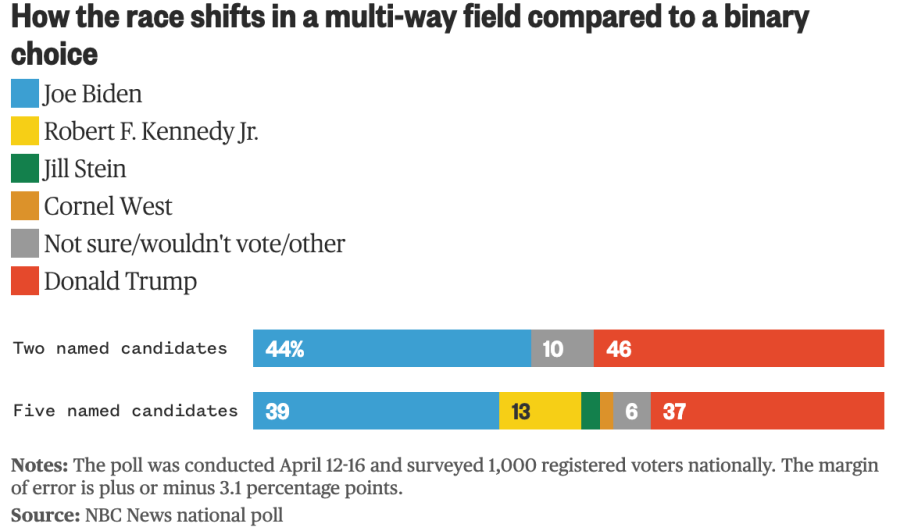  The big reason why is that the poll finds a greater share of Trump voters in the head-to-head matchup backing Kennedy in the expanded ballot. Fifteen percent of respondents who picked Trump the first time pick Kennedy in the five-way ballot, compared with 7% of those who initially picked Biden. 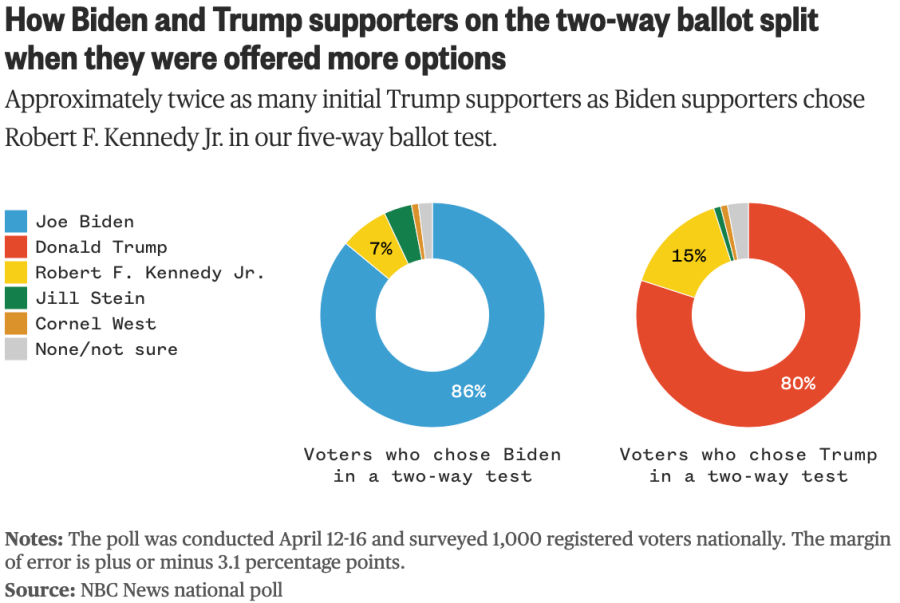  Also, Republican voters view Kennedy much more favorably (40% positive, 15% negative) than Democratic voters do (16% positive, 53% negative). “At this stage, [Kennedy’s] appeal looks to be more with Trump than Biden voters,” said Democratic pollster Jeff Horwitt, who conducted the NBC News poll with Republican pollster Bill McInturff. This finding, however, contrasts with the conventional political wisdom — as well as the results of other national polls — suggesting that a bigger third-party vote hurts Biden more. The NBC News poll results on Kennedy’s impact are “different than other surveys,” said McInturff, the GOP pollster. “So there’s always two possibilities: One, it’s an outlier. … Or two, we’re going to be seeing more of this, and our survey is a harbinger of what’s to come.” The Biden campaign has actively tried to peel support away from Kennedy. Most recently, Biden held an event Thursday with members of the Kennedy family who are endorsing the president over their relative. Overall, the party is paying much closer attention to Kennedy than it has to past third-party candidates, mobilizing new super PACs and an arm of the Democratic National Committee focused on reducing the pull of his candidacy. The NBC News poll was conducted April 12-16 of 1,000 registered voters nationwide — 891 contacted via cell phone — and the poll has an overall margin of error of plus-minus 3.1 percentage points. This story first appeared on NBCNews.com. More from NBC News: The House passes billions in aid for Ukraine and Israel after months of struggle. Next is the SenateSaturday April 20th, 2024 02:08:10 PM Stephen Groves, Lisa Mascaro | Associated PressThe House swiftly approved $95 billion in foreign aid for Ukraine, Israel and other U.S. allies in a rare Saturday session, Democrats and Republicans joining together after months of political turmoil over renewed American support for repelling Russia’s invasion. With overwhelming support, the $61 billion in aid for Ukraine delivered a strong showing of American backing as lawmakers race to deliver a fresh round of U.S. support to the war-torn ally. Some lawmakers cheered on the House floor and waved blue-and-yellow flags of Ukraine. The unusual process, with each bill having its own vote, allowed unique coalitions to form around the bills, pushing them forward. The whole package will go to the Senate, where passage in the coming days is nearly assured. President Joe Biden has promised to sign it immediately. “We did our work here, and I think history will judge it well,” said embattled Speaker Mike Johnson, R-La., who is risking his own job to marshal the package to passage. Biden, in a statement, thanked Johnson, Democratic leader Hakeem Jeffries and the bipartisan coalition of lawmakers “who voted to put our national security first.” “I urge the Senate to quickly send this package to my desk so that I can sign it into law and we can quickly send weapons and equipment to Ukraine to meet their urgent battlefield needs,” the president said. President Volodymyr Zelenskyy of Ukraine said he was “grateful” to both parties in the House and “personally Speaker Mike Johnson for the decision that keeps history on the right track,” he said on X. “Thank you, America!” he said on X, formerly Twitter. The weekend scene presented a striking display of congressional action after months of dysfunction and stalemate fueled by Republicans, who hold the majority but are deeply split over foreign aid, particularly for Ukraine as it fights Russia’s invasion. Johnson relied on Democratic support to ensure the military and humanitarian package won approval. The morning opened with a somber and serious debate and unusual sense of purpose as Republican and Democratic leaders united to urge quick approval, saying that would ensure the United States supported its allies and remained a leader on the world stage. The House’s visitor galleries crowded with onlookers. “The eyes of the world are upon us, and history will judge what we do here and now,” said Rep. Michael McCaul, R-Texas, chairman of the House Foreign Affairs Committee Passage through the House cleared away the biggest hurdle to Biden’s funding request, first made in October as Ukraine’s military supplies began to run low. The GOP-controlled House struggled for months over what to do, first demanding that any assistance be tied to policy changes at the U.S.-Mexico order, only to immediately reject a bipartisan Senate offer along those very lines. Reaching an endgame has been an excruciating lift for Johnson that has tested both his resolve and his support among Republicans, with a small but growing number now openly urging his removal from the speaker’s office. Yet congressional leaders cast the votes as a turning point in history — an urgent sacrifice as U.S. allies are beleaguered by wars and threats from continental Europe to the Middle East to the Indo-Pacific. “Sometimes when you are living history, as we are today, you don’t understand the significance of the actions of the votes that we make on this House floor, of the effect that it will have down the road,” said New York Rep. Gregory Meeks, the top Democrat on the House Foreign Affairs Committee. “This is a historic moment.” Opponents, particularly the hard-right Republicans from Johnson’s majority, argued that the U.S. should focus on the home front, addressing domestic border security and the nation’s rising debt load, and they warned against spending more money, which largely flows to American defense manufacturers, to produce weaponry used overseas. Still, Congress has seen a stream of world leaders visit in recent months, from Zelenskyy to Japanese Prime Minister Fumio Kishida, all but pleading with lawmakers to approve the aid. Globally, the delay left many questioning America’s commitment to its allies. At stake has also been one of Biden’s top foreign policy priorities — halting Russian President Vladimir Putin’s advance in Europe. After engaging in quiet talks with Johnson, the president quickly endorsed Johnson’s plan, paving the way for Democrats to give their rare support to clear the procedural hurdles needed for a final vote. “We have a responsibility, not as Democrats or Republicans, but as Americans to defend democracy wherever it is at risk,” Jeffries said during the debate. While aid for Ukraine will likely win a majority in both parties, a significant number of progressive Democrats are expected to vote against the bill aiding Israel as they demand an end to the bombardment of Gaza that has killed thousands of civilians. At the same time, Donald Trump, the presumptive Republican presidential nominee, has loomed large over the fight, weighing in from afar via social media statements and direct phone calls with lawmakers as he tilts the GOP to a more isolationist stance with his “America First” brand of politics. Ukraine’s defense once enjoyed robust, bipartisan support in Congress, but as the war enters its third year, a bulk of Republicans oppose further aid. Trump ally Rep. Marjorie Taylor Greene, R-Ga., offered an amendment to zero out the money, but it was rejected. At one point, Trump’s opposition essentially doomed the bipartisan Senate proposal on border security. This past week, Trump also issued a social media post that questioned why European nations were not giving more money to Ukraine, though he spared Johnson from criticism and said Ukraine’s survival was important. Still, the ultraconservative House Freedom Caucus has derided the legislation as the “America Last” foreign wars package and urged lawmakers to defy Republican leadership and oppose it because the bills do not include border security measures. Johnson’s hold on the speaker’s gavel has also grown more tenuous in recent days as three Republicans, led by Greene, supported a “motion to vacate” that can lead to a vote on removing the speaker. Egged on by far-right personalities, she is also being joined by a growing number of lawmakers including Reps. Thomas Massie, R-Ky., who is urging Johnson to voluntarily step aside, and Paul Gosar, R-Ariz. The package includes several Republican priorities that Democrats endorse, or at least are willing to accept. Those include proposals that allow the U.S. to seize frozen Russian central bank assets to rebuild Ukraine; impose sanctions on Iran, Russia, China and criminal organizations that traffic fentanyl; and legislation to require the China-based owner of the popular video app TikTok to sell its stake within a year or face a ban in the United States. Still, the all-out push to get the bills through Congress is a reflection not only of politics, but realities on the ground in Ukraine. Top lawmakers on national security committees, who are privy to classified briefings, have grown gravely concerned about the situation in recent weeks. Russia has increasingly used satellite-guided gliding bombs — which allow planes to drop them from a safe distance — to pummel Ukrainian forces beset by a shortage of troops and ammunition. The House votes for possible TikTok ban in the US, but don't expect the app to go away anytime soonSaturday April 20th, 2024 01:35:15 PM Mary Clare Jalonick, Haleluya Hadero | Associated PressThe House passed legislation Saturday that would ban TikTok in the United States if the popular social media platform’s China-based owner doesn’t sell its stake within a year, but don’t expect the app to go away anytime soon. The decision by House Republicans to include TikTok as part of a larger foreign aid package, a priority for President Joe Biden with broad congressional support for Ukraine and Israel, fast-tracked the ban after an earlier version had stalled in the Senate. A standalone bill with a shorter, six-month selling deadline passed the House in March by an overwhelming bipartisan vote as both Democrats and Republicans voiced national security concerns about the app’s owner, the Chinese technology firm ByteDance Ltd. The modified measure, passed by a 360-58 vote, now goes to the Senate after negotiations that lengthened the timeline for the company to sell to nine months, with a possible additional three months if a sale is in progress. Legal challenges could extend that timeline even further. The company has indicated that it would likely go to court to try and block the law if it passes, arguing it would deprive the app’s millions of users of their First Amendment rights. TikTok has lobbied hard against the legislation, pushing the app’s 170 million U.S. users — many of whom are young — to call Congress and voice opposition. But the ferocity of the pushback angered lawmakers on Capitol Hill, where there is broad concern about Chinese threats to the U.S. and where few members use the platform themselves. “We will not stop fighting and advocating for you,” TikTok CEO Shou Zi Chew said in a video that was posted on the platform last month and directed toward the app’s users. “We will continue to do all we can, including exercising our legal rights, to protect this amazing platform that we have built with you.” The bill’s quick path through Congress is extraordinary because it targets one company and because Congress has taken a hands-off approach to tech regulation for decades. Lawmakers had failed to act despite efforts to protect children online, safeguard users’ privacy and make companies more liable for content posted on their platforms, among other measures. But the TikTok ban reflects widespread concerns from lawmakers about China. Members of both parties, along with intelligence officials, have worried that Chinese authorities could force ByteDance to hand over American user data or direct the company to suppress or boost TikTok content favorable to its interests. TikTok has denied assertions that it could be used as a tool of the Chinese government and has said it has not shared U.S. user data with Chinese authorities. The U.S. government has not publicly provided evidence that shows TikTok shared U.S. user data with the Chinese government or tinkered with the company’s popular algorithm, which influences what Americans see. The company has good reason to think a legal challenge could be successful, having seen some success in previous legal fights over its operations in the U.S.. In November, a federal judge blocked a Montana law that would ban TikTok use across the state after the company and five content creators who use the platform sued. In 2020, federal courts blocked an executive order issued by then-President Donald Trump to ban TikTok after the company sued on the grounds that the order violated free speech and due process rights. His administration brokered a deal that would have had U.S. corporations Oracle and Walmart take a large stake in TikTok. The sale never went through for a number of reasons; one was China, which imposed stricter export controls on its technology providers. Dozens of states and the federal government have put in place TikTok bans on government devices. Texas’ ban was challenged last year by The Knight First Amendment Institute at Columbia University, which argued in a lawsuit that the policy was impeding academic freedom because it extended to public universities. In December, a federal judge ruled in favor of the state. Organizations such as the American Civil Liberties Union have backed the app. “Congress cannot take away the rights of over 170 million Americans who use TikTok to express themselves, engage in political advocacy, and access information from around the world,” said Jenna Leventoff, a lawyer for the group. Since mid-March, TikTok has spent $5 million on TV ads opposing the legislation, according to AdImpact, an advertising tracking firm. The ads have included a range of content creators, including a nun, extolling the positive impacts of the platform on their lives and arguing a ban would trample on the First Amendment. The company has also encouraged its users to contact Congress, and some lawmakers have received profanity-laced calls. “It is unfortunate that the House of Representatives is using the cover of important foreign and humanitarian assistance to once again jam through a ban bill that would trample the free speech rights of 170 million Americans, devastate 7 million businesses, and shutter a platform that contributes $24 billion to the U.S. economy, annually,” said Alex Haurek, a spokesman for the company. California Rep. Ro Khanna, a Democrat, voted against the legislation. He said he thinks there could have been less restrictive ways to go after the company that wouldn’t result in a total ban or threaten free speech. “I think it’s not going to be well received,” Khanna said. “It’s a sign of the Beltway being out of touch with where voters are.” Nadya Okamoto, a content creator who has roughly 4 million followers on TikTok, said she has been having conversations with other creators who are experiencing “so much anger and anxiety” about the bill and how it’s going to impact their lives. The 26-year-old, whose company “August” sells menstrual products and is known for her advocacy around destigmatizing menstrual periods, makes most of her income from TikTok. “This is going to have real repercussions,” she said. ___ Senate passes bill renewing key FISA surveillance power moments after it expiresSaturday April 20th, 2024 01:15:04 AM Frank Thorp V, Sahil Kapur and Ryan Nobles | NBC NewsThe Senate voted to reauthorize a powerful surveillance tool the U.S. government describes as critical to combating terrorism, after defeating efforts by civil liberties advocates on the left and right to rein it in. The vote of 60-34 sends the bill to President Joe Biden, who has championed it. The legislation extends Section 702 of the Foreign Intelligence Surveillance Act, or FISA, for two more years, according to NBC News. The final vote came after the Senate defeated six amendments from progressive and conservative senators who said the spying powers are too broad and demanded protections for Americans’ civil liberties and privacy. The Biden administration and FISA supporters had warned that even a brief lapse could have a detrimental impact on the intelligence-gathering process. Senators just missed the midnight deadline to reauthorize the FISA Section 702 statute but voted to reauthorize it minutes later. Had any amendments been adopted, the bill would have been sent back to the House, potentially forcing a lengthy lapse of the law. “In the nick of time, bipartisanship has prevailed here in the Senate,” Senate Majority Leader Chuck Schumer, D-N.Y., said. “It wasn’t easy, people had many different views, but we all know one thing: letting FISA expire would have been dangerous. It’s an important part of our national security to stop acts of terror, drug trafficking, and violent extremism,” Schumer said on the Senate floor. “Thank you to all my Senate colleagues on both sides of the aisle for their good work in getting this done.” The House passed a two-year FISA renewal last week after defeating, by the slimmest of margins, an amendment to require a warrant to search through the communications of Americans as part of data collected while surveilling foreigners. Senators delayed a vote for days by pushing for amendments to make changes to the bill. The bill’s passage came on the heels of a pitched battle between the U.S. intelligence community and an unusual coalition of progressive and conservative civil liberties advocates, who argued that the powers are too expansive and impinge on the privacy of Americans. “It’s important that people understand how sweeping this bill is,” said Sen. Ron Wyden, D-Ore., a member of the Intelligence Committee and outspoken proponent of privacy protections. “Something was inserted at the last minute, which would basically compel somebody like a cable guy to spy for the government. They would force the person to do it and there would be no appeal.” In a rare break with Schumer and Biden, Sen. Patty Murray, D-Wash., the president pro tempore, opposed the bill, saying: “I have strong concerns that this expansion of FISA Section 702 authorities would allow for increased abuse and misuse of the law — infringing on the rights of Americans here at home.” Senate Intelligence Committee Chair Mark Warner, D-Va., pushed back on that and other criticisms of a House amendment added to the FISA reauthorization bill, arguing that it “is narrowly focused on a significant intelligence gap,” but some members like Wyden worry it could be abused. “Contrary to what some have been saying, it expressly excludes coffee shops, bars, restaurants, residences, hotels, libraries, recreational facilities and a whole litany of similar establishments,” Warner said on the Senate floor Wednesday. “It also absolutely would not, as some critics have maintained, allow the U.S. government to compel, for example, a janitor working in an office building in Northern Virginia to spy for the intelligence community.” Warner said that allowing FISA to expire would have put the U.S. in “uncharted territory” as companies who work with the government to provide intelligence might have stopped doing so without a reauthorization. Sen. John Cornyn, R-Texas, said that “60% of the president’s daily brief is composed of 702-derived materials, so this is absolutely critical.” This story first appeared on NBCNews.com. More from NBC News: Proud Boys group leader sentenced to over 5 years in prison for attacking police during Capitol riotFriday April 19th, 2024 06:00:09 PM Michael Kunzelman | Associated PressA far-right extremist group leader was sentenced on Friday to more than five years in prison for repeatedly assaulting police officers with makeshift weapons during a mob’s attack on the U.S. Capitol over three years ago. Scott Miller, who helped lead a Proud Boys chapter for Maryland and Washington, D.C., coordinated with other group members before they invaded the Capitol on Jan. 6, 2021, according to federal prosecutors. Miller, 33, attacked police seven different times with weapons, including a bottle, a stick and poles. Notes found on Miller’s cellphone indicate that his white supremacist ideology and antisemitic views influenced his decision to storm the Capitol, a prosecutor wrote in a court filing. He expressed his intent to “fight” in order to protect “White America,” the filing says. U.S. District Judge Tanya Chutkan, who is overseeing former President Donald Trump’s election interference case in Washington, said an attack like the Jan. 6 insurrection “can happen again” in the U.S. “Extremism is alive and well in this country,” she said before sentencing Miller to five years and six months behind bars. More:Miller apologized for assaulting police at the Capitol. He acknowledged that he embraced extremist ideologies before the Capitol riot, but told the judge that he is “reforming” himself. “I am not a violent or hateful person despite some of the things you’ve seen,” he told Chutkan. Investigators found Nazi paraphernalia and memes promoting racially motivated violence when they searched Miller’s Millersville, Maryland, home and his phone. A photo found on Miller’s phone shows him posing and smiling next to a news story describing the drowning of migrants, prosecutors said. Authorities also found a shirt that Miller wore for Halloween to dress up as Derek Chauvin, the white Minneapolis police officer convicted of murdering George Floyd, a Black man, in the summer of 2020. Miller posed for a photo wearing the costume while kneeling on the floor. Chauvin pressed a knee on Floyd’s neck for over nine minutes. Chutkan said the extent of Miller’s violent ideology and the racist, antisemitic material stored on his phone left her questioning whether Miller is genuinely remorseful or capable of such a rapid transformation. “They don’t just arrive there by some random algorithm,” said the judge, who read aloud some of the most hateful messages. Chutkan has been one of the toughest punishers of Jan. 6 defendants. Miller’s prison sentence is the longest that she has handed down so far in 45 cases, according to an Associated Press review of court records. Prosecutors recommended a prison sentence of five years and 11 months for Miller, who was arrested in December 2022. He pleaded guilty in January to assaulting a police officer with a dangerous weapon. “Miller’s participation in the riot – a riot that disrupted the peaceful transfer of power – was particularly egregious, given his multiple and repeated violent attacks on police officers and his coordination and planning with other members of the Proud Boys,” Justice Department prosecutor Kaitlin Klamann wrote. In 2019, Miller was arrested on charges of disrupting a “Drag Queen Story Time” for children at a library in his Maryland hometown, The Baltimore Sun reported. Miller was accused of shouting at a performer and shoving a library board member who tried to intervene. “While these charges were ultimately dropped, Miller’s actions on this occasion serve as further proof that Miller is willing to use violence to enforce his personal beliefs,” Klamann wrote. In the days leading up to the Jan. 6 riot, Miller and other Proud Boys members discussed their plans for that day and the possibility of violence, prosecutors said. Miller arrived at the Capitol after the riot erupted, wearing gloves with plastic knuckles, ski goggles and a military-style backpack. He joined the mob attacking police officers guarding a tunnel leading to an entrance on the Capitol’s Lower West Terrace, where some of the most brutal violence occurred. Picking up a pole, he charged at police and repeatedly struck an officer with it. After throwing several objects at police, Miller picked up another pole and struck at least two officers several times. He also grabbed a shield from police officers and handed it to other rioters in the crowd outside the Capitol. Miller is ashamed of his conduct on Jan. 6 and cut ties with the Proud Boys about a month after the riot, defense attorney Elizabeth Mullin said in a court filing. “He disavows the group and the principles it stands for,” she wrote. Mullin said there is no evidence that Miller planned to attack police. “Regrettably, like so many others there that day, he became carried away by the frenzy of the crowd, which had been whipped into a fervor by Mr. Trump and the other rally speakers,” she wrote. Man dies after setting himself on fire outside Manhattan courthouse where Trump faces hush money caseFriday April 19th, 2024 01:59:03 PM Tom Shea, Marc Santia and Chris GloriosoA man who set himself on fire outside the courtroom where former President Donald Trump is facing charges in a hush money case has died, the NYPD said early Saturday. The person, identified as Maxwell Azzarello, set himself aflame after walking into Collect Pond Park around 1:30 p.m. Friday, in the designated protest area across the street from the courthouse in lower Manhattan where Trump’s trial is taking place, according to NYPD Chief of Department Jeffrey Maddrey. He started shuffling around his clothes and opened a backpack, taking out pamphlets and throwing them around the small park. Azzarello then took out a cannister, poured a liquid accelerant on himself, and lit himself on fire, Maddrey said. Police believe the accelerant was a type of alcohol-based substance used for cleaning. He was able to take a few steps while on fire and walked into a police barrier, then fell down, according to Maddrey. Video appeared to show the moments after the self-immolation, as Azzarello laid on the ground burning, at times seemingly seizing. There was already a heavy NYPD presence already outside the building due to the high-profile nature of the trial, and officers rushed to get what appeared to be a fire extinguisher to douse the flames, while others tried to use jackets to cover the fire. Their first attempt to put out the blaze was unsuccessful, and video appeared to show the man trying to sit up as onlookers shrieked in shock. The fire was ultimately put out minutes later after police and FDNY brought a larger extinguisher, leaving a smoky scene outside court as a gaggle of reporters and horrified witnesses looked on. The man was taken away by EMS to a burn unit at NewYork-Presbyterian Cornell Medical Center in critical condition, the FDNY said. He was later declared deceased by hospital staff, the NYPD said. No time of death was given by police. Six other first responders, including at least three NYPD officers and a court officer, also suffered minor injuries while responding to the incident, according to the fire department. The bomb squad swept the park after the incident looking for any possible devices. Nothing was found, police said. It came as a full jury of 12 people and six alternates had been seated in the case against Trump, the first criminal trial of a former U.S. president. Trump has pleaded not guilty to the charges. The trial will place Trump in a Manhattan courtroom for weeks, forcing him to juggle his dual role as criminal defendant and political candidate against the backdrop of his tightly contested race against President Joe Biden. For more coverage of the Trump trial, click here. Who is the man who set himself on fire?Maxwell Azzarello, a 37-year-old from St. Augustine, Florida, came to New York City earlier in the week, NYPD Chief of Detectives Joseph Kenny said at a press conference. While it wasn’t clear when exactly he arrived in the city, police said he was in Florida as recently as April 13. His family was unaware he had traveled to NYC, Kenny said. Azzarello is originally from Long Island. Police said it is believed he walked over from Leonard Street, adjacent to Collect Pond Park, and set himself on fire soon after. It was not immediately clear if he drove to the area of lower Manhattan or had taken some form of public transit. “This gentleman did not breach security protocols. The park was opened to the public. But, of course, we’re going to take a look at everything and with the magnitude of what’s going on around right here, we’ll reassess our security with our federal partners,” said Maddrey. Azzarello was said to have thrown pamphlets around before self-immolating. According to Kenny, the pamphlets were “propaganda-based” and involved a conspiracy theory “in regards to Ponzi schemes.” They also contained theories that about local educational institutes and the Mafia. Police said it did not appear Azzarello carried out the incident with any intention of targeting Trump supporters or protesters, and didn’t seemingly have any intentions beyond promoting the conspiracy theories detailed in the pamphlets. It was not clear whether Azzarello said anything before lighting himself on fire, but police didn’t have any information leading them to believe he did. The department did comb through his social media and found he posted something online in advance that was connected to the incident, which shared more information about the conspiracy theories the pamphlets touted. The vast conspiracy theory he described online involved the American government, a university, political figures and major financial players. His actions did not appear to be a clear direct response to what the Trump trial going on inside inside the courtroom, but rather were done at that particular place and time in order to draw media attention to his conspiracy claims. Kenny said it did not appear Azzarello had any criminal history in New York. Police records show he was arrested on four misdemeanor charges including criminal mischief, property damage, disturbing the peace in Florida in Aug. 2023 Kennedy family makes ‘crystal clear' its Biden endorsement in attempt to deflate RFK Jr.'s candidacyThursday April 18th, 2024 08:33:43 AM Zeke Miller, Will Weissert and Chris Megerian | Associated PressPresident Joe Biden scooped up endorsements from at least 15 members of the Kennedy political family during a campaign stop Thursday as he aims to undermine Donald Trump and marginalize the candidacy of independent Robert F. Kennedy Jr. Kerry Kennedy, a daughter of former Attorney General Robert F. Kennedy, niece of former President John F. Kennedy and sister of the current presidential candidate, delivered the endorsements in Philadelphia by calling Biden “my hero.” “We want to make crystal clear our feelings that the best way forward for America is to reelect Joe Biden and Kamala Harris for four more years,” she said. She never directly mentioned her brother, but insisted “there are only two candidates with any chance of winning the presidency” this year, framing the campaign as a choice between Biden and Trump, with no room for a third party contender. Biden, who keeps a bust of Robert F. Kennedy in the Oval Office, said the endorsements were “an incredible honor.” He said Trump, the former president who is the presumptive Republican nominee, was a threat to America’s democratic traditions and that “now it’s time to keep going and not slow down because there’s so much at stake.” The decision to highlight the Kennedy family’s support more than six months from Election Day is an indication of how seriously Biden’s team is taking a long shot candidate using his last name’s lingering Democratic magic to siphon support from the incumbent. Kennedy Jr. played down the endorsements, writing on social media that his family was “divided in our opinions but united in our love for each other.” He said his campaign was about “healing America.” Given Kennedy Jr.’s quixotic political positions and the expectation this year’s campaign will be decided by thin margins, both Democrats and Republicans worry that he could play the role of spoiler. Biden used the campaign event, which capped a three-day swing in a battleground state critical to his reelection effort, to keep up the pressure on Trump. “Donald Trump’s vision is one of anger, hate, revenge and retribution,” Biden said, adding, “I have a very different view of America, one of hope and optimism.” After the event, Biden thanked about three dozen supporters and volunteers who were gearing up to call voters or knock on doors for his campaign. “What you’re doing here is bigger than me, bigger than you, bigger than all of us combined. It’s about what kind of country our kids are going to live in,” Biden said. He protrayed the election as less about keeping himself in office than keeping Trump out, saying the race was important “not because I’m running” but because of “what happens if we lose this election.” The Kennedy family endorsements are hardly a surprise. Members of the prominent Democratic family have been vocal that they don’t see eye to eye politically with Kennedy Jr., who started as a protest primary challenger to Biden in the Democratic Party and now is running as an independent. Biden last month hosted more than 30 members of Kennedy’s extended family at the White House for St. Patrick’s Day, when family members posed with the president in the Rose Garden and Oval Office. Later, Biden and members of the Kennedy family were to meet with supporters at a campaign event, and some Kennedy were planning to make calls to voters and knock on doors on Biden’s behalf. Several notable members of the family were not endorsing, including Caroline Kennedy, the U.S. ambassador to Australia, and nonprofit leader Maria Shriver, which the Biden campaign said was due to their nonpolitical professional roles. Shriver, however, has been a conspicuous White House guest recently, attending the State of the Union and speaking at a women’s history month reception last month. Bernard Tamas of Valdosta State University, an expert on third parties, said it was unclear whether Kennedy Jr. would pull more votes from Democrats or Republicans. “He is pro-science when it comes to the environment, but a conspiracy theorist when it comes to vaccines,” Tamas said. Kennedy Jr.’s lack of a clear political lane limits his potential impact on the election, Tamas said, but Democrats appear to be more concerned because his last name could lead some voters to believe that he is carrying on his family’s political legacy. Other than that, Tamas said, “I don’t know what else he has to attract progressive voters.” Kennedy Jr. has spoken publicly in the past about disagreeing with his family on many issues, but maintains it can be done in “friendly” ways. After a super political action committee supporting his campaign produced a TV ad during the Super Bowl that relied heavily on imagery from John F. Kennedy’s 1960 presidential run, Kennedy Jr. apologized to his relatives on the X social media platform, saying he was sorry if the spot “caused anyone in my family pain.” The Democratic National Committee has hired a communications team to combat the appeal of third-party candidates, Kennedy Jr. first among them. The DNC also filed a recent Federal Election Commission complaint against Kennedy Jr.’s campaign, charging that it coordinated too closely with an affiliated super PAC to get his name on the presidential ballot in some states. Kennedy Jr. is also viewed warily by the Trump campaign. While Trump has released a recent video saying, “If I were a Democrat, I’d vote for RFK Jr. every single time over Biden,” he has sometimes criticized Kennedy Jr. as being more “radical left” than Biden. Biden’s travels across Pennsylvania this week were an opportunity to reconnect with his roots, starting on Tuesday in Scranton, where he lived until age 10. He swung by his childhood home, a three-story colonial that his family rented, and reminisced about attending Mass at St. Paul’s. In Pittsburgh, he called for higher tariffs on steel and aluminum from China to protect U.S. industry from what he called unfair competition. But even that event involved some nostalgia, as Biden recalled an endorsement from the steelworkers when he was “a 29-year-old kid” from Delaware running for U.S. Senate. “It changed everything,” he said. 12 jurors have been picked for Donald Trump's hush money trial; selection of alternates ongoingThursday April 18th, 2024 05:32:19 AM Michael R. Sisak, Jennifer Peltz, Eric Tucker and Jake Offenhartz | Associated PressA jury of 12 people was seated Thursday in former President Donald Trump’s history-making hush money trial, propelling the proceedings closer to opening statements and the start of weeks of dramatic testimony. The court quickly turned to selecting alternate jurors, with the process on track to wrap up by the end of the week. Prosecutors could begin presenting their case early next week. The jury of seven men and five women includes a sales professional, a software engineer, a security engineer, a teacher, a speech therapist, multiple lawyers, an investment banker and a retired wealth manager. The first-ever trial of a former American president is unfolding in New York during this year’s race for the White House, meaning the presumptive Republican nominee will spend his days in court confronted by salacious and unflattering testimony about his personal life while simultaneously campaigning to reclaim the office he held for four years. He’s made clear his determination to use his legal jeopardy, already a central issue in the race against Democratic incumbent Joe Biden, to his advantage. After a full day of jury selection, he complained to reporters that he should have been out campaigning but was in court instead for what he said was a “very unfair trial.” “Everybody’s outraged by it,” he said. “You know the whole world’s watching this New York scam.” Jury selection proceeded at a plodding pace earlier Thursday when two jurors were dismissed, one after expressing doubt about her ability to be fair following disclosure of details about her identity and the other over concerns that some of his answers in court may have been inaccurate. But lawyers who began the day with only five jurors settled on the remaining seven in quick succession, along with one alternate. Judge Juan Merchan has said his goal is to have six alternates. The process of picking a jury is a critical phase in any criminal trial but especially so when the defendant is a former president and the presumptive Republican nominee. Prospective jurors have been grilled on their social media posts, personal lives and political views as the lawyers and judge search for any bias that would prevent them from being impartial. Inside the court, there’s broad acknowledgment of the futility in trying to find jurors without knowledge of Trump. A prosecutor this week said lawyers were not looking for people who had been “living under a rock for the past eight years.” To that end, multiple jurors chosen for the panel acknowledged having personal opinions of Trump or his presidency. One juror, a man who works in investment banking, earlier described himself as “ambivalent” about Trump, adding, “I might not like some of his policies, but there has been some good” for the country. A woman picked for the jury said she thought Trump seemed “very selfish and self serving,” adding, “I don’t really appreciate that from any public servant.” Defense lawyers were out of peremptory strikes, which would allow them to dismiss a juror without giving a reason. The trial centers on a $130,000 payment that Michael Cohen, Trump’s former lawyer and personal fixer, made to porn actor Stormy Daniels to prevent her claims of a sexual encounter with Trump from becoming public in the final days of the 2016 race. Prosecutors say Trump obscured the true nature of the payments in internal records when his company reimbursed Cohen, who pleaded guilty to federal charges in 2018 and is expected to be a star witness for the prosecution. Trump has denied having a sexual encounter with Daniels, and his lawyers argue that the payments to Cohen were legitimate legal expenses. Trump faces 34 felony counts of falsifying business records. He could get up to four years in prison if convicted, though it’s not clear that the judge would opt to put him behind bars. Trump would almost certainly appeal any conviction. Trump faces four criminal cases, but it’s not clear that any others will reach trial before the November election. Appeals and legal wrangling have caused delays in the other three cases charging Trump with plotting to overturn the 2020 election results and with illegally hoarding classified documents. The jury selection process picked up momentum Tuesday with the selection of seven jurors. But on Thursday, Merchan revealed in court that one of the seven, a cancer nurse, had “conveyed that after sleeping on it overnight she had concerns about her ability to be fair and impartial in this case.” And though jurors’ names are being kept confidential, the woman told the judge and the lawyers that she had doubts after she said aspects of her identity had been made public. “Yesterday alone I had friends, colleagues and family push things to my phone regarding questioning my identity as a juror,” she said. “I don’t believe at this point that I can be fair and unbiased and let the outside influences not affect my decision making in the courtroom.” A second seated juror was dismissed after prosecutors raised concerns that he may not have been honest in answering a jury selection question by saying that he had never been accused or convicted of a crime. The IT professional was summoned to court to answer questions after prosecutors said they found an article about a person with the same name who had been arrested in the 1990s for tearing down posters pertaining to the political right in suburban Westchester County. A prosecutor also disclosed that a relative of the man may have been involved in a deferred prosecution agreement in the 1990s with the Manhattan district attorney’s office, which is prosecuting Trump’s case. Because the juror was questioned Thursday at the judge’s bench, off-microphone and out of earshot of reporters, it was not known whether the man confirmed or denied that either instance was connected to him. After dismissing from the jury the nurse who had already been selected, Merchan ordered journalists in court not to report prospective jurors’ answers to questions about their current and former employers. “We just lost, probably, what probably would have been a very good juror for this case, and the first thing that she said was she was afraid and intimidated by the press, all the press, and everything that had happened,” Merchan said. In other developments, prosecutors asked for Trump to be held in contempt over a series of social media posts this week. The district attorney’s office on Monday sought a $3,000 fine for Trump for three Truth Social posts they said violated the judge’s gag order limiting what he can say publicly about witnesses. Since then, prosecutors said Trump made seven additional posts that they believe violate the order. Several of the posts involved an article that referred to former Trump lawyer Michael Cohen as a “serial perjurer,” and one from Wednesday repeated a claim by a Fox News host that liberal activists were lying to get on the jury, said prosecutor Christopher Conroy. Trump lawyer Emil Bove said Cohen “has been attacking President Trump in public statements,” and Trump was just replying. The judge already scheduled a hearing for next week on the prosecution’s request for contempt sanctions over Trump’s posts. Congress moving swiftly on bipartisan action to punish Iran after revenge attack on IsraelThursday April 18th, 2024 03:46:17 AM Farnoush Amiri | Associated PressIran’s attack against Israel over the weekend has spurred a flurry of bipartisan legislative action in Congress, uniting lawmakers against the country even as the risk of a larger regional war looms. Several measures introduced and passed in the House and Senate seek to both publicly condemn Iran and punish the Islamic Republic financially. Lawmakers have denounced Iran’s actions, which came in response to a suspected Israeli strike weeks earlier on an Iranian consular building in Syria that killed two Iranian generals. “The world is on fire, and history will judge us for our action,” said Rep. Mike McCaul, R-Texas, chairman of the House Foreign Relations Committee, during a news conference Tuesday. The swift, bipartisan condemnation of Iran has put on sharp display the durability of American support for Israel, even amid growing partisan division over how the country is handling its more than six-month war with Hamas. The House passed nearly a dozen bills by Wednesday that would, among other things, issue a slate of new sanctions and other financial restrictions against Iran and its leaders. Other legislation looks to prevent current Iranian officials sanctioned from evading those penalties and urge the European Union to “expeditiously” designate Iran’s Revolutionary Guard as a terrorist organization as the U.S. has already done. On the other side of the Capitol, the Senate Foreign Relations Committee on Tuesday advanced five bills, including ones that targeted Iran for its human rights record and would require sanctions on ports and refineries that receive and process Iranian oil. “Iran’s direct attack on Israel this week underscores the need to further cut off the Iranian regime’s key revenue streams,” Democratic Sen. Jeanne Shaheen of New Hampshire said in a statement. “I urge my colleagues in the Senate to support this bill — which has already passed the House — so that we can send it to President Biden’s desk immediately.” A number of the bills had passed the House weeks before Hamas’ deadly attack on Israel in October but have been stalled in the Senate committee. An Israeli offensive in Gaza has since caused widespread devastation and killed over 33,000 people, according to local health officials. Israel’s conduct of the war has revealed the depth of unease among U.S. lawmakers as concerns over the delivery of humanitarian aid to Gaza have caused even some of President Joe Biden’s closest allies to threaten conditioning future aid to Israel. Congressional Democrats have been reluctant to challenge Biden’s handling of the ongoing conflict and related regional tensions that have taken shape, mindful that criticism could further weaken Biden in his reelection campaign against former President Donald Trump. But the attack on Saturday has proven to consolidate public support for the Biden administration’s quick response as it ordered U.S. forces to help Israel down “nearly all” the 300 drones and missiles that were headed its way. It also comes as House Speaker Mike Johnson, R-La., released legislation Wednesday that would provide $95 billion in aid collectively to Israel, Ukraine and Taiwan. The aid package had been held up for months over Republican opposition to continuing wartime funding for Ukraine as it battles Russia. Iran’s attack on Israel added urgency to Johnson’s plans to bring the issue to the floor for a vote. While the measures targeting Iran have received overwhelming support — with the series of House bills mostly passing with at least 300 votes — there has been a quiet but growing dissent among progressive Democratic lawmakers in both chambers, who warn that legislative efforts could risk further escalation in the Middle East. “Following last weekend’s unprecedented response by Iran to Israel’s attack on its consulate, the Republican Majority is explicitly leveraging a series of bills to further escalate tensions in the Middle East,” Rep. Alexandria Ocasio-Cortez, D-N.Y., said in a statement Tuesday. “This is a blatant attempt to distract from their own incompetence.” The strike on Saturday marked the first time Iran has launched a direct military assault on Israel despite decades of enmity dating back to the country’s 1979 Islamic Revolution. Israel has vowed to retaliate against Iran, risking further expanding the shadow war between the two foes into a direct conflict. Sen. Bernie Sanders, a Vermont independent, condemned Iran’s attack in a statement but called on his colleagues to respond cautiously. He warned that further U.S. action against Iran could lead to a dangerous escalation that could drag America into a war in the Middle East. “Cooler heads must now prevail to ensure peace in the region and security for Israel,” Sanders said. Biden is off on details of his uncle's WWII death as he calls Trump unfit to lead the militaryThursday April 18th, 2024 12:25:10 AM Zeke Miller | Associated PressPresident Joe Biden on Wednesday misstated key details about his uncle’s death in World War II as he honored the man’s wartime service and said Donald Trump was unworthy of serving as commander in chief. While in Pittsburgh, Biden spoke about his uncle, 2nd Lt. Ambrose J. Finnegan Jr., aiming to draw a contrast with reports that Trump, while president, had called fallen service members “suckers” and “losers.” Finnegan, the brother of Biden’s mother, “got shot down in New Guinea,” Biden said. The president said Finnegan’s body was never recovered and “there used to be a lot of cannibals” in the area. Biden, who also relayed a version of the story earlier in the day after stopping by the memorial in Scranton, was off on the particulars. The U.S. government’s record of missing service members does not attribute Finnegan’s death to hostile action or indicate cannibals were any factor. “We have a tradition in my family my grandfather started,” said Biden, a toddler at the time of his uncle’s death in 1944. “When you visit a gravesite of a family member — it’s going to sound strange to you — but you say three Hail Marys. And that’s what I was doing at the site.” Referring to Trump, the presumptive GOP presidential nominee, Biden said, “That man doesn’t deserve to have been the commander in chief for my son, my uncle.” Biden’s elder son, Beau, died in 2015 of brain cancer, which the president has stated he believes was linked to his son’s yearlong deployment in Iraq, where the military used burn pits to dispose of waste. Some former Trump officials have claimed the then-president disparaged fallen service members as “suckers” and “losers” when, they said, he did not want to travel in 2018 to a cemetery for American war dead in France. Trump denied the allegation, saying, “What animal would say such a thing?” According to the Pentagon’s Defense POW/MIA Accounting Agency, Biden’s uncle, known by the family as “Bosie,” died on May 14, 1944, while a passenger on an Army Air Forces plane that, “for unknown reasons,” was forced to ditch in the Pacific Ocean off the northern coast of New Guinea. “Both engines failed at low altitude, and the aircraft’s nose hit the water hard,” the agency states in its listing of Finnegan. “Three men failed to emerge from the sinking wreck and were lost in the crash.” The agency said Finnegan was a passenger on the plane when it was lost. “He has not been associated with any remains recovered from the area after the war and is still unaccounted-for,” according to the agency. White House spokesman Andrew Bates did not address the discrepancy between the agency’s records and Biden’s account when he issued a statement on the matter. “President Biden is proud of his uncle’s service in uniform,“ Bates said, adding Finnegan ”lost his life when the military aircraft he was on crashed in the Pacific after taking off near New Guinea.” Biden “highlighted his uncle’s story as he made the case for honoring our ‘sacred commitment … to equip those we send to war and take care of them and their families when they come home,’ and as he reiterated that the last thing American veterans are is ‘suckers’ or ‘losers.’” The Democratic president also misstated when uncles enlisted in the military, saying they joined “when D-Day occurred, the next day,” in June 1944, when they actually joined weeks after the Dec. 7, 1941, attack on Pearl Harbor. After Finnegan’s death, a local newspaper published a telegram from Gen. Douglas MacArthur expressing condolences to Finnegan’s family: “Dear Mr. Finnegan: In the death of your son, Second Lieutenant Ambrose J. Finnegan Jr., while in service of his country, you have my profound sympathy. Your consolation may be that he died in the uniform of our beloved country, serving in a crusade from which a better world for all will come. Very faithfully, Douglas MacArthur.” Biden, in his 2008 book “Promises to Keep,” made only brief mention of his uncle, describing him as flyer who was killed in New Guinea. Rep. Donald Payne remains hospitalized after ‘cardiac episode' more than a week agoWednesday April 17th, 2024 09:59:48 PM Kyle Stewart and Zoë Richards | NBC NewsRep. Donald Payne Jr., D-N.J. remains hospitalized following a “cardiac episode” in early April stemming from complications tied to his diabetes, his office said in a statement Wednesday. The update comes more than a week after the lawmaker’s office referred to “his improvement,” a “good” prognosis and the expectation of a “full recovery.” “Congressman Donald M. Payne, Jr. suffered a cardiac episode based on complications from his diabetes last week,” his office said in a statement Wednesday. “Today, he is in stable condition at a local hospital and continues to be under doctor’s care. While we hope for a full recovery, we ask everyone to keep him in your prayers.” The new statement also follows a New Jersey Globe report that said Payne remains unconscious. Asked about that report, a spokesperson for Payne directed NBC News to the office’s recent statement. The latest characterization paints a more stark image of the severity of Payne’s condition than the first statement put out on April 9, days after the incident. “Currently, he is recovering in the hospital as doctors conduct routine exams to monitor and observe his improvement,” the earlier statement said. “The Congressman’s prognosis is good and he is expected to make a full recovery.” Payne, 65, is running unopposed in the state’s June 4 Democratic primary. He has represented New Jersey’s 10th Congressional District, which covers parts of Essex, Hudson, and Union counties, since 2012. His father was the first Black person to be elected to Congress in New Jersey; he died of cancer in 2012. With narrow margins in the House, Payne’s absence can have a significant impact on floor votes. The current party breakdown is 218 Republicans to 213 Democrats, but when Rep. Mike Gallagher, R-Wis., resigns this weekend that will change to 217-213. With Payne absent, the maximum number of Democrats voting would be lowered to 212. In a 217-213 scenario, Republicans can afford only one GOP defection. But if it’s a 217-212 breakdown, they can afford two defections and still pass legislation without help from Democrats. Kyle Stewart reported from Washington, Zoë Richards reported from New York. This story first appeared on NBCNews.com. More from NBC News: A lawyer, a banker and a speech therapist: Meet the 12 jury members of Trump's hush money trialWednesday April 17th, 2024 08:03:04 PM Rebecca Shabad | NBC NewsAll 12 jurors, plus an alternate, were selected this week to serve on the jury in former President Donald Trump’s hush money trial in New York on Tuesday after they made it clear to both sides that they could render a fair and impartial verdict. Prosecutors and the defense team whittled down a pool of nearly 200 people to 12 jurors and an alternate after grilling them on their personal history, political views, social media posts, and ability to remain impartial despite any opinions they might have about the polarizing former president. Seven people were sworn in Tuesday but two of them ended up being removed on Thursday for possible conflicts. Later Thursday, the remaining seven jurors were sworn in, plus one alternate. The trial is expected to last as long as eight weeks. The jurors in Trump’s New York criminal trialJuror 1 A man who lives in West Harlem and works in sales. He is married, likes to do “anything outdoorsy,” and gets news from The New York Times, Fox News and MSNBC. Juror 2 A man who works in investment banking, follows Twitter as well as Truth Social posts from Trump and said, “I don’t have any beliefs that might prevent me from being fair or impartial.” Juror 3 A young man who has lived in Chelsea for five years, works as an attorney in corporate law, and likes to hike and run. He gets news from The New York Times, The Wall Street Journal and Google. Juror 4 A man who’s a security engineer and likes woodworking and metalworking. Juror 5 A young woman who is a Harlem resident and works as a teacher. She lives with her boyfriend, loves writing, theater and traveling. She gets news from Google and TikTok and listens to podcasts on relationships and pop culture. Juror 6 A young woman who lives in Chelsea and works as a software engineer. She gets news from The New York Times, Google, Facebook and TikTok. Juror 7 A man who lives on the Upper East Side and works as attorney as a civil litigator. He enjoys spending time in the outdoors and gets his news from The New York Times, the Wall Street Journal, the New York Post and the Washington. Juror 8 A man who’s retired but worked for a major wealth manager. He said he enjoys skiing, fly fishing and yoga. Juror 9 A woman who is a speech therapist, gets news from CNN and likes reality TV podcasts. Juror 10 A man who works in commerce, reads The New York Times and listens to podcasts on behavioral psychology. Juror 11 A woman who works as a product development manager and watches late-night news and reads Google, business and fashion news. Juror 12 A woman who is a physical therapist who likes running and tennis and listening to podcasts on sports and faith. Alternate 1 A woman who works as an asset manager and likes to run, hang out with her friends and eat. This story first appeared on NBCNews.com. More from NBC News: What's inside the $95 billion House package focused on aiding Ukraine and IsraelWednesday April 17th, 2024 07:27:18 PM Kevin Freking | Associated PressSpeaker Mike Johnson has unveiled a long-awaited package of bills that will provide military aid to Ukraine and Israel, replenish U.S. weapons systems and give humanitarian assistance to civilians in Gaza. The package totals $95.3 billion in spending, which matches the total that the Senate passed in mid-February. But there are also a few differences with the Senate bill designed to win over some House conservatives. Here’s a look at what is in the bills that Johnson hopes to pass by this weekend. The aid to support Ukraine totals about $61 billion. Republicans on the House Appropriations Committee said that more than a third of that amount would be dedicated to replenishing weapons and ammunition systems for the U.S. military. The overall amount of money provided to Ukraine for the purchase of weapons from the U.S. is roughly the same in the House and Senate bills — $13.8 billion. The main difference between the two packages is that the House bill provides more than $9 billion in economic assistance to Ukraine in the form of “forgivable loans.” The Senate bill included no such provision seeking repayment. The president would be authorized to set the terms of the loan to Ukraine and also be given the power to cancel it. Congress could override the cancellation but would have to generate enough votes to override a veto, a high bar considering how the two chambers are so evenly divided. Johnson, as he seeks GOP support for the package, noted that former President Donald Trump has endorsed a “loan concept.” He also noted that the House package includes a requirement for the Biden administration to provide a plan and a strategy to Congress for what it seeks to achieve in Ukraine. The plan would be required within 45 days of the bill being signed into law. House Republicans frequently complain that they have yet to see a strategy from Biden for winning the war. The bill said the report from the administration must be a multiyear plan that spells out “specific and achievable objectives.” It also asked for an estimate of the resources required to achieve the U.S. objectives and a description of the national security implications if the objectives are not met. Aid in the legislation to support Israel and provide humanitarian relief to citizens of Gaza comes to more than $26 billion. The amount of money dedicated to replenishing Israel’s missile defense systems totals about $4 billion in the House and Senate bills. An additional $2.4 billion for current U.S. military operations in the regions is also the same in both bills. Some conservatives have been critical of the aid for Gaza. At the end of the day, though, Johnson risked losing critical Democratic support for the package if Republicans had excluded it. The humanitarian assistance comes to more than $9 billion for Gaza, where millions of Palestinians face starvation, lack of clean water and disease outbreaks. The investments to counter China and ensure a strong deterrence in the region come to about $8 billion. The overall amount of money and the investments in the two bills is about the same with a quarter of funds used to replenish weapons and ammunition systems that had been provided to Taiwan. Senate dismisses two articles of impeachment against Homeland Security secretary, ending trialWednesday April 17th, 2024 04:01:09 PM Mary Clare Jalonick | Associated PressThe Senate has dismissed all impeachment charges against Homeland Security Secretary Alejandro Mayorkas, ending the House Republican push to remove the Cabinet secretary from office over his handling of the U.S.-Mexico border and ending his trial before arguments even began. Senators voted to dismiss both articles of impeachment and end the trial, with Democrats arguing that the articles were unconstitutional. The first article charged Mayorkas with “willful and systemic refusal to comply” with immigration law. The second article charged Mayorkas with a “breach of trust” for saying the border was secure. The votes were 51-48 and 51-49, both along party lines. Senate Majority Leader Chuck Schumer said the House Republicans’ case failed to meet “the high standard of high crimes and misdemeanors” and could set a dangerous precedent. “For the sake of the Senate’s integrity and to protect impeachment for those rare cases we truly need it, senators should dismiss today’s charges,” said Schumer, D-N.Y., as he opened Wednesday’s session. Senate Republicans had argued for a full impeachment trial after the House narrowly voted in February to impeach Mayorkas for his handling of the border, arguing in the two articles that he “willfully and systematically” refused to enforce immigration laws. The House vote was the first time in nearly 150 years that a Cabinet secretary was impeached. An outright dismissal of House Republicans’ prosecution of Mayorkas, with no chance to argue the case, is an embarrassing defeat for House Republicans and embattled House Speaker Mike Johnson, R-La., who made the impeachment a priority. And it is likely to resonate politically for both Republicans and Democrats in a presidential election year when border security has been a top issue. Republicans argue that President Joe Biden has been weak on the border as arrests for illegal crossings skyrocketed to more than 2 million people during the last two years of his term, though they have fallen from a record-high of 250,000 in December amid heightened enforcement in Mexico. Democrats say that instead of impeaching Mayorkas, Republicans should have accepted a bipartisan Senate compromise aimed at reducing the number of migrants who come into the U.S. illegally. House impeachment managers delivered the charges to the Senate on Tuesday, standing in the well of the Senate and reading them aloud to a captive audience of senators. But they did not get a chance to present the case before the Senate dismissed it. Once the senators were sworn in on Wednesday, the chamber turned into the court of impeachment, with Democratic Sen. Patty Murray of Washington presiding. Murray is the president pro tempore of the Senate, or the senior-most member of the majority party who sits in for the vice president. Senators approached the front of the Senate in groups of four to sign an oath book that is stored in the National Archives. Schumer then called for the votes to dismiss the trial after Republicans rejected a proposed agreement for Senate debate time and several votes on GOP objections. Missouri Sen. Eric Schmitt said Democrats were “bulldozing 200 years of precedent” on impeachments by trying to dismiss the trial. Angry Republicans called for several votes to delay the inevitable final outcome, but none of them passed as all Democrats and three Independents held together. Senate Republican Leader Mitch McConnell, R-Ky., said “history will not judge this moment well.” “This process must not be abused,” McConnell said. “It must not be short-circuited.” Still, Republicans similarly moved to dismiss former President Donald Trump’s second impeachment trial in 2021, weeks after the Jan. 6, 2021, attack on the Capitol. All but five GOP senators — including McConnell — voted to end the trial, arguing it was unconstitutional because Trump had already left office. As Johnson signed the articles Monday in preparation for sending them across the Capitol, he said Schumer should convene a trial to “hold those who engineered this crisis to full account.” Schumer “is the only impediment to delivering accountability for the American people,” Johnson said. “Pursuant to the Constitution, the House demands a trial.” Even if the Senate held a trial, Republicans would not be able to win the support of the two-thirds of the Senate that is needed to convict and remove Mayorkas from office — Democrats control the Senate, 51-49, and they appear to be united against the impeachment effort. Not one House Democrat supported it, either. Mayorkas, who was in New York on Wednesday to launch a campaign for children’s online safety, reiterated that he’s focused on the work of his department. “The Senate is going to do what the Senate considers to be appropriate as that proceeds,” he said. “I am here in New York City on Wednesday morning fighting online sexual exploitation and abuse. I’m focused on our mission.” Johnson delayed sending the articles to the Senate for weeks while both chambers finished work on government funding legislation and took a two-week recess. Johnson had said he would send them to the Senate last week, but he punted again after Senate Republicans said they wanted more time to prepare. At a hearing with Mayorkas on Tuesday about President Joe Biden’s budget request for the department, some of the House impeachment managers previewed the arguments they would have made. Tennessee Rep. Mark Green, the chairman of the House Homeland Security panel, told the secretary that he has a duty under the law to control and guard U.S. borders, and “during your three years as secretary, you have failed to fulfill this oath. You have refused to comply with the laws passed by Congress, and you have breached the public trust.” Mayorkas defended the department’s efforts but said the nation’s immigration system is “fundamentally broken, and only Congress can fix it.” The impeachment trial is the third in five years. Democrats impeached President Donald Trump twice, once over his dealings with Ukraine and the second time in the days after the Capitol attack. Trump was acquitted by the Senate both times. If the Senate had moved to a trial on Mayorkas, senators would have been forced to sit in their seats for the duration, maybe weeks, while the House impeachment managers and lawyers representing Mayorkas made their cases. Associated Press writers Farnoush Amiri in Washington and Elliot Spagat in San Diego, California contributed to this report. 7 big issues at stake in the 2024 electionWednesday April 17th, 2024 02:38:12 PM Sahil Kapur | NBC NewsThe policy contrasts between President Joe Biden and former President Donald Trump are sharpening as the general election campaign gets fully underway. But what does the choice represent for ordinary voters and the economic and cultural issues they care about? A rematch between the Democratic incumbent and his Republican predecessor may feel uninspiring to many voters, but the policy stakes are enormous for tens of millions of Americans — and the world. Here are seven big issues at stake in the 2024 election. AbortionThe contrast: Biden favors federal abortion protections; Trump opposes them. Trump supported nationwide restrictions on abortion as president but now downplays the need for a federal ban, as Republicans are divided over the issue. Biden does not support federal limits. Biden has championed the Women’s Health Protection Act, a bill to protect abortion rights in all 50 states under federal law and prohibit medically unnecessary hurdles to accessing the procedure. He has asked voters to send him a Democratic Congress that supports legal abortion to achieve that. Trump has boasted that he “broke Roe v. Wade” by picking three of the five Supreme Court justices who overturned it, delivering on a four-decade goal of the GOP. More recently, Trump has openly fretted that the backlash may cost him and his party the election. Last week, Trump said the issue should be left to states, a shift from his support for nationwide restrictions when he was president. His new stance has drawn pushback from GOP allies, like Sen. Lindsey Graham, of South Carolina, and anti-abortion-rights advocates, who say that he is wrong and that Republicans should not be deterred from their long-standing goal of enacting some nationwide abortion limits. Some Republicans downplay the prospects of federal abortion restrictions’ passing Congress, even if they win full control. Biden and his allies are telling voters to look at the GOP’s long history of championing federal restrictions and not their recent rhetoric. ImmigrationThe contrast: Trump has promised a sweeping crackdown on illegal immigration and tougher executive actions; Biden is asking Congress to give him more tools to manage an overwhelmed border and create new legal pathways to immigrate to the U.S. Trump has called existing border laws an existential threat to the U.S., saying migrants are “poisoning the blood of our country” and bringing new “languages.” His campaign website says: “President Trump will shut down Biden’s border disaster. He will again end catch-and-release, restore Remain in Mexico, and eliminate asylum fraud. In cooperative states, President Trump will deputize the National Guard and local law enforcement to assist with rapidly removing illegal alien gang members and criminals.” After having rescinded some of Trump’s policies, Biden has recently shifted to support stricter immigration laws as the system remains overwhelmed. He championed a bipartisan bill to raise the bar for gaining asylum, grant more U.S. resources to process asylum claims and turn away migrants who do not qualify, and empower the president to temporarily shut down the border if migration levels hit certain triggers. (Republicans blocked the bill in the Senate amid lobbying by Trump, who wants to use the border as an election issue.) Biden has also endorsed the U.S. Citizenship Act, which would grant a pathway to citizenship for people in the U.S. illegally if they pass background checks and pay their taxes. Fundamentally, Trump has aligned with forces who want less immigration into the country, while Biden has embraced the belief that immigrants make the U.S. better. Health care and prescription drugsThe contrast: Biden wants to extend Affordable Care Act provisions and empower Medicare to negotiate more prescription drugs; Trump has aggressively criticized the ACA but not offered a health care plan. Biden, who was vice president when the Affordable Care Act passed in 2010, sees it as a cherished achievement to protect and strengthen. The law, also known as “Obamacare,” which has extended coverage to 45 million people through subsidies, insurance mandates and a Medicaid expansion, continues to face conservative opposition. Separately, Biden has touted a provision in his party-line Inflation Reduction Act that empowers Medicare to negotiate lower prices for 10 prescription drugs. He said he wants to boost that to 50 if he is re-elected, with the goal of $200 billion in savings. Trump spent his four years as president fighting unsuccessfully to repeal and unravel the law — through legislation and executive action and endorsing lawsuits to wipe it out. In November, Trump called for revisiting plans to “terminate” the ACA. He has recently sought to downplay that and insists he only wants to improve the law. But he has not offered a health care plan. Many of his GOP allies in Congress still favor repealing or undoing the ACA, including a budget by the Republican Study Committee, which boasts about 80% of the House GOP conference as members, including Speaker Mike Johnson, of Louisiana. TaxesThe contrast: Trump’s 2017 tax cuts expire at the end of next year, and he has called for extending them; Biden has called for raising taxes on families earning over $400,000 to fund various priorities. A series of Trump tax cuts, which Republicans passed on a party-line basis in 2017, expire at the end of 2025. Congress and the winner of the election will decide what happens to them. In a recent private speech to wealthy donors, Trump said his policies include “extending the Trump tax cuts” if he is elected, according to a Trump campaign official. That would preserve lower rates across the income spectrum, with the biggest benefits for top earners. Biden has attacked that law as a giveaway to the wealthiest Americans, vowing to make “big corporations and the very wealthy finally pay their fair share.” He has backed a corporate tax rate hike from 21% to 28% and said that “nobody earning less than $400,000 will pay an additional penny in federal taxes.” Biden is also calling for a $3,600-per-child tax cut for families, an $800 average tax break for “front-line workers” and a 25% minimum tax on billionaires, according to a newly released campaign plank. The expiration of the Trump tax cuts will restore the unlimited federal deduction for state and local taxes, which Republicans had capped at $10,000 in the 2017 law. Republicans broadly support preserving the cap, with some exceptions, while most Democrats want to lift it. Judges and the Supreme CourtThe contrast: Their track records tell a clear story. Trump has picked young conservative judges to serve on the federal bench, while Biden has picked liberals with a focus on professional and personal diversity. One of the clearest contrasts is what kinds of judges Trump and Biden would pick for lifetime appointments on the federal courts. A simple way for voters to think about it is whether they prefer new judges with the conservative views of Justice Neil Gorsuch, Trump’s first Supreme Court pick, or with the liberal views of Justice Ketanji Brown Jackson, Biden’s (so far only) high court pick. As president, Trump nominated young conservative judges who will serve for generations. Biden has focused on finding judges with diverse backgrounds and résumés, including more civil rights lawyers and public defenders. Perhaps the biggest question is whether a Supreme Court vacancy will open up in the next four years. The presidential election winner and the party that controls the Senate would fill it. TradeThe contrast: Trump is pushing a 10% across-the-board tariff on imports; Biden’s White House opposes that, saying it would raise inflation. Trump, long a skeptic of U.S. trade deals, has proposed to impose a 10% tariff on all imported goods if he returns to the White House. He recently told Fox News that it could be 60% — or potentially “more than that” — on imports of Chinese goods. Biden opposes that idea. In a memo over the weekend, the White House slammed the idea of “across-the-board tariffs that would raise taxes and prices by $1,500 per American family,” without naming Trump; it referred to an estimate by the Center for American Progress, a liberal think tank, that Trump’s 10% tax on imports could cost an average American household $1,500 per year. Biden, instead, has sought to boost domestic manufacturing with major federal investments in semiconductors and electric vehicles. Foreign policy and NATOThe contrast: Biden favors Ukraine aid, while Trump is skeptical of it; Biden supports NATO and a traditional view of American power, while Trump has criticized NATO and voiced some isolationist views. The clearest example of the foreign policy differences between the two concerns the fate of Ukraine, which is running low on ammunition and says it needs U.S. assistance to continue holding off Russia’s aggression. Biden is an ardent proponent of helping Ukraine, while Trump has poured cold water on U.S. aid to Ukraine and successfully pressured House Republicans to block it since they took the majority in January 2023. And that points to a deeper divide: Biden is an outspoken supporter of the NATO alliance as a bulwark against adversaries like Russia and China and of preserving the post-World War II order. Trump has dialed up his criticisms of NATO and aligned with a growing isolationist wing in the U.S. that wants to be less involved in global affairs. Trump recently said that as president, he “would encourage” Russia “to do whatever the hell they want” to member countries who are “delinquent” in their dues. This story first appeared on NBCNews.com. More from NBC News: Trump leaves court to campaign at Hamilton Heights deli where clerk killed attackerTuesday April 16th, 2024 09:15:00 PM Jill Colvin and Bill BarrowFresh from a Manhattan courtroom, Donald Trump visited a Hamilton Heights bodega where a man was stabbed to death in 2022, a stark pivot for the former president as he juggles being a criminal defendant and the Republican challenger intent on blaming President Joe Biden for crime. Trump stopped by Sanaa Convenient Store, a tiny bodega that sells chips, sodas and other snacks. Trump aides said the former president and presumptive GOP nominee chose the store because it was the site of a violent attack on an employee, a case that resulted in public criticism for the district attorney now prosecuting him. The visit was Trump’s first campaign appearance since his criminal hush money trial began, making the presumptive GOP nominee the first former president in U.S. history to stand criminal trial. Trump will be confined to the courtroom on most days, dramatically limiting his movements and his ability to campaign, fundraise and make calls, as opposed to Biden, who campaigned Tuesday in Pennsylvania, a key battleground state. Trump aides have answered by planning rallies and other political events on weekends and Wednesdays, the one weekday when court is not supposed to be in session. Plans also include more local appearances Trump can make after court recesses each day. For months, Trump has assailed Democratic-run cities as crime-ridden and overrun with migrants who have crossed the U.S.-Mexico border, even as violent crime has fallen in the U.S. With his local campaign stop in Harlem, Trump blended that familiar, if often exaggerated, message with his promise to make a serious play at winning his native state despite its heavily Democratic lean. “They want law and order … every week they’re being robbed,” Trump said of businesses in New York, as he tried to compare his prosecution with what happens on New York streets. “You know where the crime is? It’s in the bodegas.” Contrary to Trump’s rhetoric, FBI statistics show overall violent crime dropped nationally in 2023 after COVID-era spikes that began in 2020, when Trump was president. Crime also has fallen in New York City since the pandemic peaks. Still, in July 2022, Jose Alba, a clerk at the store Trump visited in Hamilton Heights, a heavily Hispanic section of Harlem, was attacked by 35-year-old Austin Simon. The resulting altercation, captured on surveillance video, ended with Alba fatally stabbing Simon. Alba, an immigrant from the Dominican Republic, was arrested and charged with murder but the Manhattan district attorney dropped the charges within weeks, saying they could not prove Alba had not acted in self-defense. Before his arrival, Trump’s campaign distributed materials to journalists criticizing Manhattan District Attorney Alvin Bragg for his handling of the stabbing case, including the weeks Alba spent jailed at Rikers Island. Bragg oversees the office now prosecuting Trump. Bragg’s office responded Tuesday after news of Trump’s plans emerged. Simon’s death and Alba’s case were “resolved nearly two years ago, and the charges were dismissed after a thorough investigation,” the statement said. “D.A. Bragg’s top priority remains combating violent crime and the office has worked hand in hand with the NYPD to drive down overall crime in Manhattan.” Bragg’s office cited statistics showing double-digit drops in homicides and shootings in Manhattan over the last two years. Trump’s campaign also billed the convenience store stop as a venue to highlight rising consumer prices during Biden’s presidency. Trump skipped over those talking points, though, focusing instead on his depictions of New York crime and asserting that the judicial system is letting criminals go free. “They don’t pick them up — they go after Trump,” he said. The former president’s effort in Harlem affirms his intentions to campaign in his home state, even though New York remains overwhelmingly Democratic. In 2020, Biden garnered more than 60% of the vote in the state and ran up even wider margins in New York City. Trump insists he can win New York in November anyway, and he has mused about holding rallies in the South Bronx and Queens, where the former president was born and grew up, and even Madison Square Garden. “I may rent Madison Square Garden,” he said in an interview with Breitbart News. “That’s the belly of the beast, right?” That would be a prohibitively expensive proposition, particularly as his campaign has worked to save cash as it confronts a fundraising gap with Biden. “We’re going to make a heavy play for New York,” Trump said Tuesday, part of his promise to put more states in play. At the least, Trump, long a famous figure for New Yorkers, showed that he can still turn heads in the city. Throughout the afternoon, the crowds around the bodega grew half a dozen deep as word of Trump’s impending visit spread. Barricades were set up along Broadway, between 139th and 140th Streets, in advance of Trump’s appearance. The patio of the Mexican restaurant next door was packed with onlookers, and staff from a hair salon on the other side gathered by their open door. “Papito Trump is coming. Yeah!” said one passerby ahead of the former president’s arrival. As Trump arrived, children climbed scaffolding around nearby buildings to get a better view. Trump shook hands with people standing behind police barricades before entering the bodega, where Plexiglas separates customers from the cash register. “I love this city,” Trump told reporters after emerging from the store. “We’re going to straighten New York out.” Trump has argued that the ongoing influx of migrants to the city, where he grew his real estate empire and became a tabloid fixture, has made New Yorkers more willing to vote for him since his 2020 loss to Biden. The city has struggled to house the new arrivals, putting many up in city hotels. “I think we have a chance. New York has changed a lot in the last two years,” he recently told Fox News host Maria Bartiromo. “The people of New York are angry. People that would have never voted for me because I’m a Republican … I think they’re going to vote for me.” He doubled down on that take Tuesday, claiming that migrants “are coming from jails and prisons and mental institutions,” even though there is no evidence to support that claim — reminiscent of his 2015 speech to launch his first presidential campaign. Trump’s prospects will depend on voters like Lesandra Carrion, a 47-year-old who lives in the neighborhood and came out to see the former president when she heard he might be visiting. She said she doesn’t agree with everything Trump says or does but declared that “he speaks the truth.” Carrion cited the rising migrant population and strained city resources. “I think that he will make a difference,” she said of Trump. As for his troubles at the courthouse at the south end of Manhattan, Carrion was dismissive. “He’s going to beat that,” she said. “We all make mistakes at the end of the day. But he’s the truth and light. I feel that God is in him.” Rep. Marjorie Taylor Greene of Georgia, a top Trump ally, predicted Monday that Trump will “make the best out of this” New York trial. “Democrats in New York and the judge and everyone,” she said, “they’re really going to regret it.” Not everyone was on board Tuesday, though. Steven Kopstein, a 63-year-old neighborhood resident, expressed disgust at Trump’s visit and occasionally jeered at Trump supporters as he walked through the crowd with his dog. “You’re not welcome here,” Kopstein said of Trump, calling it ironic for the former president to rail against crime immediately after spending all day at a defendant’s table. “He’s done so much to hurt immigrants and migrants and this neighborhood’s full of them. It’s crazy to me that these people would support him. I just don’t understand it.” Texas pastor resigns as head of civil rights organization Rainbow PUSH CoalitionTuesday April 16th, 2024 07:15:30 PM De'Anthony TaylorDr. Frederick Haynes III, the senior pastor of a church in North Texas and the president of Rainbow Push Coalition, has stepped down from leadership less than a year after being with the organization. NBC 5 obtained a letter of public resignation statement on Tuesday, April 16, in which Haynes announced his resignation as CEO and president of the civil rights movement organization effective immediately. “I remain committed to honoring the rich history of RPC and the legacy of its esteemed leader, the incomparable Reverend Jesse L. Jackson Sr., and most significantly, to the calling and pursuit of social justice. I extend my heartfelt gratitude to all who have expressed their support since my appointment in July of last year. Rest assured that my work in the fight for liberation and freedom continues.” – Dr. Frederick Haynes III Haynes, who has been senior pastor at Friendship-West Baptist Church in Dallas for over 40 years, stayed in Dallas while leading the coalition. The pastor stated that his work at Friendship-West would expand the work done by the Rainbow PUSH Coalition, which is still based in Chicago. Rev. Jesse Jackson, a protégé of Rev. Martin Luther King Jr., parted ways with the Southern Christian Leadership Conference in 1971 and established Operation PUSH, which initially stood for People United to Save Humanity. The organization was later renamed the Rainbow PUSH Coalition. The group’s initiatives include advocating for minority hiring in the corporate sector and conducting voter registration drives in communities of color. Haynes said he was inspired by Jackson’s presidential runs and was invited to speak at Rainbow PUSH after they connected in the 1990s. In July 2023, Jackson hand-picked Haynes to replace him in the Chicago civil rights organization. The renowned Dallas pastor was officially installed on Feb. 1 at The Black Academy of Arts and Letters. Rainbow PUSH then hosted the Inaugural Social Justice Conference at Paul Quinn College on Friday, Feb. 2. Haynes posted a Facebook reel announcing his resignation but pledging continued support for the Rainbow PUSH Coalition despite their parting ways. This is a developing story and will be updated as more information becomes available. Sen. Bob Menendez may blame alleged crimes on wife if he testifies: Court documentsTuesday April 16th, 2024 05:02:00 PM Jonathan Dienst, Courtney Copenhagen and Tom SheaSen. Robert Menendez may blame his wife if he takes the stand during his trial, possibly claiming she was the one getting the money and hiding the truth from him, according to court filings. The Democrat’s line of defense was filed in secret with a federal judge in January. The document were made public on Tuesday after the news media fought to make the documents public. In those documents, Menendez’s legal team wrote that if the senior senator from New Jersey were to take the stand, his story would clear him of the allegations he accepted any bribes — but that story could implicate his wife Nadine. The lawyers stated that she kept information from him and he was apparently unaware of what she had been doing, leading him to believe nothing illegal was occurring. “While these explanations, and the marital communications on which they rely, will tend to exonerate Senator Menendez by demonstrating the absence of any improper intent on Senator Menendez’s part, they may inculpate Nadine by demonstrating the ways in which she withheld information from Senator Menendez or otherwise led him to believe that nothing unlawful was taking place,” the documents state. Menendez’s lawyers said that if he were called to the stand, he could testify about communications with his wife that prove he was unaware of any wrongdoing. Menendez and his wife are accused of accepting tens of thousands in cash and gold bars from three businessmen in what prosecutors have said was a wide-ranging bribery scheme. In exchange, the senator stands accused of trying to help secure overseas business deals as well as interfere with separate criminal investigations related to two of the businessmen. The senator, his wife and two businessmen each pleaded not guilty. Earlier in April, a federal judge ordered separate trials for Bob and Nadine Menendez amid news she had fallen ill and would require surgery and weeks of recovery. The couple wanted separate trials so that he could tell the jury his wife was the one who accepted money – without that story putting her in jeopardy. After separate trials were granted, the senator was no longer at risk of violating privileged marital communications between him and his wife, because his defense at his trial will not be part of her later trial. This document was originally written and sealed in January, well before Nadine got sick and the trials were severed. NBC News legal analyst Danny Cevallos said that despite the move theoretically hurting Nadine’s case, it could actually be “protective” of her. “If the defense gets their way, Menendez can take the stand, point his finger at his wife and then none of that can be used against her at her subsequent trial,” Cevallos told NBC New York. “It may be this is really a preview of what Menendez plans to do at trial. Or it is possible the defense really wants a severance and they are coming up with theories to bolster their argument for a severance.” “The defense poses a hypothetical that Menendez may take the stand and point the finger at his wife as part of his own defense,” Cevallos continued. “The reason that is a hypothetical is statistically defendants usually don’t take the stand – especially when they might have credibility issues like Menendez does.” One of the businessmen, Jose Uribe, pleaded guilty and has been cooperating with prosecutors. He admitted he helped both the senator and his wife buy a Mercedes as part of a bribe scheme and later made up a cover story to try to fool federal investigators. First 7 jurors are chosen for Trump's hush money criminal trial; 11 more still neededTuesday April 16th, 2024 05:06:08 AM Michael R. Sisak, Jennifer Peltz, Jake Offenhartz and Alanna Durkin Richer | Associated PressThe first seven jurors for Donald Trump’s hush money trial were seated Tuesday after lawyers grilled the jury pool about their social media posts, political views and personal lives to decide who can sit in fair judgment of the former president. The panelists who were selected are an information technology worker, an English teacher, an oncology nurse, a sales professional, a software engineer and two lawyers. Eleven more people still must be sworn in before opening statements begin as early as next week in the first criminal trial of a former commander in chief. It’s a moment of reckoning for Trump, who has tried to put off his prosecutions until after the November election and casts himself as the victim of a politically motivated justice system. The trial puts Trump’s legal problems at the center of his closely contested race against President Joe Biden. It’s the first of Trump’s four criminal cases to reach trial, and it may be the only one to return a verdict before voters decide whether to elect the presumptive GOP presidential nominee. Jury selection was to resume Thursday. The methodical process unfolding in the Manhattan courtroom highlights the unprecedented challenge of finding people who can fairly judge the polarizing defendant in the city where he built his real estate empire before becoming president in 2016. On his way out of the courthouse, Trump stopped in the hallway to rail against the case to reporters, accusing the judge of “rushing” the trial. “We are going to continue our fight against this judge,” said Trump, who pushed unsuccessfully to have the judge removed from the case. Over two days, dozens of potential jurors have been excused after saying they could not be impartial or because they had other commitments. Trump’s lawyers challenged a handful of people over social media posts, and one person was dismissed over a 2017 post about Trump that said “Lock him up!” Several would-be jurors told the judge they believed they could decide the case fairly, no matter their feelings about Trump or his policies as president. Trump looked on in the courtroom as his lawyers urged the judge to remove one potential juror for a social media post she made after his 2020 election loss. The judge admonished Trump at one point after he spoke loudly and gestured while the judge questioned the woman about her post. “I don’t know what he was uttering, but it was audible and he was gesturing. And he was speaking in the direction of the juror,” Judge Juan Merchan said. “I won’t tolerate that. I will not tolerate any jurors being intimidated in this courtroom.” Prosecutor Joshua Steinglass took Trump’s notoriety head-on, telling would-be jurors that attorneys were not looking for people who had been “living under a rock for the past eight years.” They just needed to keep an open mind. “This case has nothing to do with your personal politics … it’s not a referendum on the Trump presidency or a popularity contest or who you’re going to vote for in November. We don’t care. This case is about whether this man broke the law,” he said. Trump has pleaded not guilty to 34 felony counts of falsifying business records as part of an alleged effort to keep salacious — and, he says, bogus — stories about his sex life from emerging during his 2016 campaign. With the trial expected to last for six weeks or more, several jury pool members brought up plans they have for Memorial Day and beyond. One man was excused after saying he feared his ability to be impartial could be compromised by “unconscious bias” from growing up in Texas and working in finance with people who “intellectually tend to slant Republican.” “I’m not sure that I can say beyond a reasonable doubt that I can be fair,” another potential juror told the judge. “I can try. But I’m not 100% sure I can be fair.” She was also dismissed. One woman said she disagrees with Trump’s policies and sometimes finds herself frustrated by him. But she pledged to be fair and impartial, telling defense lawyer Todd Blanche that she would give her “level-headed best” if she were picked for the jury. “I didn’t sleep last night thinking about could I do that,” she said. Trump broke into a grin, nodding his head in an exaggerated manner, when another person said he had read two of the former president’s books, “The Art of the Deal” and “How to Get Rich.” The man, who said some of his wife’s family members are lobbyists for the Republican Party, said he didn’t think there was anything that would prevent him from looking at the case fairly. “I feel that no one’s above the law,” he said. The charges center on $130,000 in payments that Trump’s company made to his then-lawyer, Michael Cohen. He paid that sum on Trump’s behalf to keep porn actor Stormy Daniels from going public with her claims of a sexual encounter with Trump a decade earlier. Trump has denied the encounter ever happened. Prosecutors say the payments to Cohen were falsely logged as legal fees. The prosecution has described the money as being part of a scheme to bury damaging stories Trump feared could help his opponent in the 2016 race, particularly as Trump’s reputation was suffering at the time from comments he made about women. Trump has acknowledged reimbursing Cohen for the payment and that it was designed to stop Daniels from going public about the alleged encounter. But Trump has said it had nothing to do with the campaign. In court papers filed Tuesday, prosecutors urged the judge to fine Trump $3,000 over social media posts they say violated a gag order limiting what he can say publicly about witnesses. In the posts, Trump called Cohen and Daniels “two sleaze bags who have, with their lies and misrepresentations, cost our Country dearly!” Prosecutors wrote that the judge should admonish Trump to comply with the gag order and warn him that further violations could be punished not only with additional fines but also jail time. If convicted of falsifying business records, Trump faces up to four years in prison, though there’s no guarantee he will get time behind bars. House Republicans send Mayorkas impeachment articles to the Senate, forcing a trialTuesday April 16th, 2024 01:52:09 AM Mary Clare Jalonick and Stephen Groves | Associated PressThe House sent two articles of impeachment against Homeland Security Secretary Alejandro Mayorkas to the Senate on Tuesday, forcing a trial on allegations that he has “willfully and systematically” refused to enforce immigration laws. While the Senate is obligated to hold a trial under the rules of impeachment once the charges are walked across the Capitol, the proceedings may not last long. Democrats are expected to try to dismiss or table the charges later this week before the full arguments get underway. After delivering the articles, the Republican prosecutors appointed by House Speaker Mike Johnson stood in the well of the Senate. The Senate sergeant-at-arms, the chamber’s top security official, called the session to order with a “hear ye! hear ye!” and a notice that “all persons are commanded to keep silence, on pain of imprisonment.” The House Homeland Security Committee chairman, Mark Green, a Tennessee Republican who is one of the impeachment managers, read the articles aloud as most senators sat in their seats, following along with their own paper copies. Republicans have argued there should be a full trial. As Johnson signed the articles Monday in preparation for sending them across the Capitol, he said Senate Majority Leader Chuck Schumer should convene a trial to “hold those who engineered this crisis to full account.” Schumer “is the only impediment to delivering accountability for the American people,” Johnson said. “Pursuant to the Constitution, the House demands a trial.” After Tuesday’s ceremonial procession and presentation of the articles, the proceedings will not begin until Wednesday. Senators will be sworn in as jurors, turning the chamber into the court of impeachment. The Senate will then issue a summons to Mayorkas to inform him of the charges and ask for a written answer. He will not have to appear. The entire process could be done within hours on Wednesday. Majority Democrats have said the GOP case against Mayorkas doesn’t rise to the “high crimes and misdemeanors” laid out as a bar for impeachment in the Constitution, and Schumer probably has enough votes to end the trial immediately if he decides to do so. Schumer has said he wants to “address this issue as expeditiously as possible.” “Impeachment should never be used to settle a policy disagreement,” Schumer said. “That would set a horrible precedent for the Congress.” The House narrowly voted in February to impeach Mayorkas for his handling of the U.S.-Mexico border. House Republicans charged in two articles of impeachment that Mayorkas has not only refused to enforce existing law but also breached the public trust by lying to Congress and saying the border was secure. It was the first time in nearly 150 years a Cabinet secretary was impeached. Since then, Johnson has delayed sending the articles to the Senate for weeks while both chambers finished work on government funding legislation and took a two-week recess. Johnson had said he would send them to the Senate last week, but he punted again after Senate Republicans said they wanted more time to prepare. South Dakota Sen. John Thune, the Senate’s No. 2 Republican, has said the Senate needs to hold a full trial at which it can examine the evidence against Mayorkas and come to a conclusion. “This is an absolute debacle at the southern border,” Thune said. “It is a national security crisis. There needs to be accountability.” House impeachment managers previewed some of their arguments at a hearing with Mayorkas on Tuesday morning on President Joe Biden’s budget request for the department. Green, the chairman of the House Homeland Security panel, told the secretary that he has a duty under the law to control and guard U.S. borders, and “during your three years as secretary, you have failed to fulfill this oath. You have refused to comply with the laws passed by Congress, and you have breached the public trust.” Mayorkas defended the department’s efforts but said the nation’s immigration system is “fundamentally broken, and only Congress can fix it.” Other impeachment managers are Michael McCaul of Texas, Andy Biggs of Arizona, Ben Cline of Virginia, Andrew Garbarino of New York, Michael Guest of Mississippi, Harriet Hageman of Wyoming, Clay Higgins of Louisiana, Laurel Lee of Florida, August Plfuger of Texas and Marjorie Taylor Greene of Georgia. At a press conference with a group of Republican senators after the articles were delivered, the impeachment managers demanded that Schumer move forward with their case. “The voice of the people is very clear,” said Texas Rep. Michael McCaul, chairman of the House Foreign Affairs Committee. “Secure the border and impeach this man, this criminal.” Exactly how Democrats will proceed on Wednesday is still unclear. Impeachment rules generally allow the Senate majority to decide how to manage the trial, and Schumer has not said exactly what he will do. After the jurors are sworn in, Senate Republicans are likely to try to raise a series of objections if Schumer calls a vote to dismiss or table. But ultimately they cannot block a dismissal if majority Democrats have the votes. Some Republicans have said they would like time to debate whether Mayorkas should be impeached, even though debate time is usually not included in impeachment proceedings. Negotiations were underway between the two parties over whether Schumer may allow that time and give senators in both parties a chance to discuss the impeachment before it is dismissed. While most Republicans oppose quick dismissal, some have hinted they could vote with Democrats. Sen. Mitt Romney, R-Utah, said last week he wasn’t sure what he would do if there were a move to dismiss the trial. “I think it’s virtually certain that there will not be the conviction of someone when the constitutional test has not been met,” he said. At the same time, Romney said he wants to at least express his view that “Mayorkas has done a terrible job, but he’s following the direction of the president and has not met the constitutional test of a high crime or misdemeanor.” In any case, Republicans would not be able to win the support of the two-thirds of the Senate that is needed to convict and remove Mayorkas from office. Democrats control the Senate, 51-49, and they appear to be united against the impeachment effort. Not one House Democrat supported it, either. Sen. Sherrod Brown, a Democrat who is facing a tough reelection bid in Ohio, called the impeachment trial a “distraction,” arguing that Republicans should instead support a bipartisan border compromise they scuttled earlier this year. If Democrats are unable to dismiss or table the articles, they could follow the precedent of several impeachment trials for federal judges over the last century and hold a vote to create a trial committee that would investigate the charges. While there is sufficient precedent for this approach, Democrats may prefer to end the process completely, especially in a presidential election year when immigration and border security are top issues. If the Senate were to proceed to an impeachment trial, it would be the third in five years. Democrats impeached President Donald Trump twice, once over his dealings with Ukraine and a second time in the days after the Jan. 6, 2021, attack on the Capitol. Trump was acquitted by the Senate both times. At a trial, senators would be forced to sit in their seats for the duration, maybe weeks, while the House impeachment managers and lawyers representing Mayorkas make their cases. The Senate is allowed to call witnesses, as well, if it so decides, and it can ask questions of both sides after the opening arguments are finished. Sen. Bob Menendez raises nearly $190,000 for legal defense in alleged corruption caseMonday April 15th, 2024 05:54:00 PM Jonathan DienstSen. Robert Menendez has raised $188,925 for his legal defense, according to filings posted Monday. Menendez, a Democrat, has been raising money to try to help him pay for lawyers as he fights corruption-related charges filed by federal prosecutors in Manhattan. His New Millennium PAC donated $10,000 to the defense fund. So did Howard Jonas, the chairman of security firm IDT, and Dennis Mehiel, a Democratic donor and Chairman of Four M Corporation, according to the filing known as an 8872 form. David Krone, an investment manager in New York, and Felix Roque, a doctor and West New York politician, are listed among those donating $5,000, according to the document. The senior senator from New Jersey used $100,000 to pay for lawyers with the Jones Day firm during filing period spanning Jan. 1 through March 31, 2024. The fund also spent over $50,000 on data consulting from firms Haystack and Guidepost, the document shows. Menendez has pleaded not guilty and his bribery-related trial is set to begin in May. He is accused of taking hundreds of thousands in cash and gold bars from three New Jersey businessmen. Two of those businessmen — Fred Daibes and Wael Hana — have pleaded not guilty as well. Daibes is accused of bribing the senator to interfere with the U.S. Attorney’s Office in New Jersey that had charged Daibes in a separate bank fraud matter. Hana is accused of paying bribes to get the senator’s help in securing an overseas business deal with the Egyptian government. The third businessman, Jose Uribe, pleaded guilty and has been cooperating with the FBI. Uribe admitted giving cash to help buy the senator and his wife Nadine a new Mercedes-Benz in exchange for help with a separate criminal matter involving the state attorney general’s office. Nadine Menendez is also charged, but she recently has fallen ill. The judge agreed to separate her case from her husband’s, so a second trial involving her alleged efforts to secure bribe money is scheduled to be held later in the summer. Trump's historic hush-money trial gets underway; 1st day ends without any jurors being pickedMonday April 15th, 2024 05:06:12 PM Jennifer Peltz, Eric Tucker and Michael R. Sisak | Associated PressThe historic hush-money trial of Donald Trump got underway Monday with the arduous process of selecting a jury to hear the case charging the former president with falsifying business records in order to stifle stories about his sex life. The day ended without any jurors being seated. The selection process was scheduled to resume Tuesday. The first criminal trial of any former U.S. president began as Trump vies to reclaim the White House, creating a remarkable split-screen spectacle of the presumptive Republican nominee spending his days as a criminal defendant while simultaneously campaigning for office. He’s blended those roles over the last year by presenting himself to supporters, on the campaign trail and on social media, as a target of politically motivated prosecutions designed to derail his candidacy. After a norm-shattering presidency shadowed by years of investigations, the trial amounts to a courtroom reckoning for Trump, who faces four indictments charging him with crimes ranging from hoarding classified documents to plotting to overturn an election. Yet the political stakes are less clear because a conviction would not preclude him from becoming president and because the allegations in this case date back years and are seen as less grievous than the conduct behind the three other indictments. The day began with hours of pretrial arguments — including over a potential fine for Trump — before moving into the start of jury selection. The first members of the jury pool — 96 in all — were summoned into the courtroom, where the parties will decide who among them might be picked to decide the legal fate of the former, and potentially future, American president. Trump craned his neck to look back at the pool, whispering to his lawyer as they entered the jury box. “You are about to participate in a trial by jury. The system of trial by jury is one of the cornerstones of our judicial system,” Judge Juan Merchan told the jurors. “The name of this case is the People of the State of New York vs. Donald Trump.” Trump’s notoriety would make the process of picking 12 jurors and six alternates a near-herculean task in any year, but it’s likely to be especially challenging now, unfolding in a closely contested presidential election in the heavily Democratic city where Trump grew up and catapulted to celebrity status decades before winning the White House. Underscoring the difficulty, only about a third of the 96 people in the first panel of potential jurors remained after the judge excused some members of the jury pool. More than half of the group was excused after telling the judge they could not be fair and impartial. At least nine more prospective jurors were excused after raising their hands when Merchan asked if they could not serve for any other reason. A female juror was excused after saying she had strong opinions about Trump. Earlier in the questionnaire, the woman, a Harlem resident, indicated she could be neutral in deciding the case. But when asked whether she had strong opinions about the former president, the woman answered matter-of-factly: “Yes.” When Merchan asked her to repeat the response, she replied: “Yeah, I said yes.” She was dismissed. Merchan has written that the key is “whether the prospective juror can assure us that they will set aside any personal feelings or biases and render a decision that is based on the evidence and the law.” No matter the outcome, Trump is determined to benefit from the proceedings, casting the case, and his indictments elsewhere, as a broad “weaponization of law enforcement” by Democratic prosecutors and officials. He maintains they are orchestrating sham charges in hopes of impeding his presidential run. He’s lambasted judges and prosecutors for years, a pattern of attacks that continued up to the moment he entered court Monday when he called the case an “assault on America” and said: ’“This is political persecution. This is a persecution like never before.” Earlier Monday, the judge denied a defense request to recuse from the case after Trump’s lawyers claimed he had a conflict of interest. He also said prosecutors could not play for the jury the 2005 “Access Hollywood” recording in which Trump was captured discussing grabbing women sexually without their permission. However, prosecutors will be allowed to question witnesses about the recording, which became public in the final weeks of the 2016 campaign. Prosecutors with the Manhattan district attorney’s office also asked for Merchan to fine Trump $3,000 over social media posts they said violated the judge’s gag order barring him from attacking witnesses. Last week, he used his Truth Social platform to call his former lawyer Michael Cohen and the adult film actor Stormy Daniels “two sleaze bags who have, with their lies and misrepresentations, cost our Country dearly!” Trump lawyer Todd Blanche maintained Trump was simply responding to the witnesses’ statements. “It’s not as if President Trump is going out and targeting individuals. He is responding to salacious, repeated vehement attacks by these witnesses,” Blanche said. Merchan did not rule on the request immediately, instead setting a hearing for next week. Trump has pleaded not guilty to 34 felony counts of falsifying business records. Prosecutors say the alleged fraud was part of an effort to keep salacious — and, Trump says, bogus — stories about his sex life from emerging during his 2016 campaign. The charges center on $130,000 in payments that Trump’s company made to Cohen. He paid that sum on Trump’s behalf to keep Daniels from going public, a month before the election, with her claims of a sexual encounter with the married mogul a decade earlier. Prosecutors say the payments to Cohen were falsely logged as legal fees in order to cloak their actual purpose. Trump’s lawyers say the disbursements indeed were legal expenses, not a cover-up. After decades of fielding and initiating lawsuits, the businessman-turned-politician now faces a trial that could result in up to four years in prison if he’s convicted, though a no-jail sentence also would be possible. Trump would also be expected to appeal any conviction. Trump’s attorneys lost a bid to get the hush-money case dismissed and have since repeatedly sought to delay it, prompting a flurry of last-minute appeals court hearings last week. Among other things, Trump’s lawyers maintain that the jury pool in overwhelmingly Democratic Manhattan has been tainted by negative publicity about Trump and that the case should be moved elsewhere. An appeals judge turned down an emergency request to delay the trial while the change-of-venue request goes to a group of appellate judges, who are set to consider it in the coming weeks. Manhattan prosecutors have countered that a lot of the publicity stems from Trump’s own comments and that questioning will tease out whether prospective jurors can put aside any preconceptions they may have. There’s no reason, prosecutors said, to think that 12 fair and impartial people can’t be found amid Manhattan’s roughly 1.4 million adult residents. The prospective jurors will be known only by number, as the judge has ordered that their names be kept secret from everyone except prosecutors, Trump and their legal teams. The 42 preapproved, sometimes multi-pronged queries include background basics but also reflect the uniqueness of the case. They’re being asked, among other questions, about their hobbies and news habits, if they hold strong beliefs about Trump that would prevent them being impartial and about attendance at Trump or anti-Trump rallies. Based on the answers, the attorneys can ask a judge to eliminate people “for cause” if they meet certain criteria for being unable to serve or be unbiased. The lawyers also can use “peremptory challenges” to nix 10 potential jurors and two prospective alternates without giving a reason. “If you’re going to strike everybody who’s either a Republican or a Democrat,” the judge observed at a February hearing, “you’re going to run out of peremptory challenges very quickly.” Trump's history-making hush money trial starts Monday with jury selectionMonday April 15th, 2024 05:45:22 AM Jennifer Peltz and Michael R. Sisak | Associated PressIn a singular moment for American history, the hush money trial of former President Donald Trump begins Monday with jury selection. It’s the first criminal trial of a former commander in chief and the first of Trump’s four indictments to go to trial. Because Trump is the presumptive nominee for this year’s Republican ticket, the trial will also produce the head-spinning split-screen of a presidential candidate spending his days in court and, he has said, “campaigning during the night.” And to some extent, it is a trial of the justice system itself as it grapples with a defendant who has used his enormous prominence to assail the judge, his daughter, the district attorney, some witnesses and the allegations — all while blasting the legitimacy of a legal structure that he insists has been appropriated by his political opponents. Against that backdrop, scores of ordinary citizens are due to be called Monday into a cavernous room in a utilitarian courthouse to determine whether they can serve, fairly and impartially, on the jury. “The ultimate issue is whether the prospective jurors can assure us that they will set aside any personal feelings or biases and render a decision that is based on the evidence and the law,” Judge Juan M. Merchan wrote in an April 8 filing. Trump has pleaded not guilty to 34 felony counts of falsifying business records as part of an alleged effort to keep salacious — and, he says, bogus — stories about his sex life from emerging during his 2016 campaign. The charges center on $130,000 in payments that Trump’s company made to his then-lawyer, Michael Cohen. He paid that sum on Trump’s behalf to keep porn actor Stormy Daniels from going public, a month before the election, with her claims of a sexual encounter with the married mogul a decade earlier. Prosecutors say the payments to Cohen were falsely logged as legal fees in order to cloak their actual purpose. Trump’s lawyers say the disbursements indeed were legal expenses, not a cover-up. Trump himself casts the case, and his other indictments elsewhere, as a broad “weaponization of law enforcement” by Democratic prosecutors and officials. He maintains they are orchestrating sham charges in hopes of impeding his presidential run. After decades of fielding and initiating lawsuits, the businessman-turned-politician now faces a trial that could result in up to four years in prison if he’s convicted, though a no-jail sentence also would be possible. Regardless of the eventual outcome, the trial of an ex-president and current candidate is a moment of extraordinary gravity for the American political system, as well as for Trump himself. Such a scenario would have once seemed unthinkable to many Americans, even for a president whose tenure left a trail of shattered norms, including twice being impeached and acquitted by the Senate. The scene inside the courtroom may be greeted with a spectacle outside. When Trump was arraigned last year, police broke up small skirmishes between his supporters and protesters near the courthouse in a tiny park, where a local Republican group has planned a pro-Trump rally Monday. Trump’s attorneys lost a bid to get the hush money case dismissed and have since repeatedly sought to delay it, prompting a flurry of last-minute appeals court hearings last week. Among other things, Trump’s lawyers maintain that the jury pool in overwhelmingly Democratic Manhattan has been tainted by negative publicity about Trump and that the case should be moved elsewhere. An appeals judge turned down an emergency request to delay the trial while the change-of-venue request goes to a group of appellate judges, who are set to consider it in the coming weeks. Manhattan prosecutors have countered that a lot of the publicity stems from Trump’s own comments and that questioning will tease out whether prospective jurors can put aside any preconceptions they may have. There’s no reason, prosecutors said, to think that 12 fair and impartial people can’t be found amid Manhattan’s roughly 1.4 million adult residents. The process of choosing those 12, plus six alternates, will begin with scores of people filing into Merchan’s courtroom. They will be known only by number, as he has ordered their names to be kept secret from everyone except prosecutors, Trump and their legal teams. After hearing some basics about the case and jury service, the prospective jurors will be asked to raise hands if they believe they cannot serve or be fair and impartial. Those who do so will be excused, according to Merchan’s filing last week. The rest will be eligible for questioning. The 42 preapproved, sometimes multi-pronged queries include background basics but also reflect the uniqueness of the case. “Do you have any strong opinions or firmly held beliefs about former President Donald Trump, or the fact that he is a current candidate for president, that would interfere with your ability to be a fair and impartial juror?” asks one question. Others ask about attendance at Trump or anti-Trump rallies, opinions on how he’s being treated in the case, news sources and more — including any “political, moral, intellectual, or religious beliefs or opinions” that might “slant” a prospective juror’s approach to the case. Based on the answers, the attorneys can ask a judge to eliminate people “for cause” if they meet certain criteria for being unable to serve or be unbiased. The lawyers also can use “peremptory challenges” to nix 10 potential jurors and two prospective alternates without giving a reason. “If you’re going to strike everybody who’s either a Republican or a Democrat,” the judge observed at a February hearing, “you’re going to run out of peremptory challenges very quickly.” All the players in Trump's hush money trial: Judge Juan Merchan, Michael Cohen, Stormy Daniels and moreSunday April 14th, 2024 11:47:05 PM Rebecca Shabad and JoElla Carman | NBC NewsThe trial in the New York criminal case against Donald Trump begins Monday with jury selection, the first of the four criminal cases against the former president to reach this pivotal stage. The charges against Trump stem from an investigation by the Manhattan District Attorney’s Office into an alleged “catch and kill” scheme to bury negative stories about Trump before the 2016 presidential election in a bid to influence the outcome, according to NBC News. According to prosecutors, several people participated in the scheme, which involved paying people off to buy their silence and covering up the payments in Trump’s business records. Here are the key people in the case who will come up during the trial, potentially as witnesses: Key players in Trump’s New York criminal trialDonald Trump Trump was charged in April 2023 by Manhattan District Attorney Alvin Bragg with 34 counts of falsifying business records for allegedly covering up an illegal scheme to sway the 2016 presidential election by trying to suppress negative media stories about Trump by purchasing their rights. His indictment marks the first time in U.S. history that a former president was hit with criminal charges. Michael Cohen Cohen was vice president of the Trump Organization and a personal lawyer to Trump from 2006 to 2018. As part of the scheme, Cohen is accused of using his personal funds to pay Stormy Daniels $130,000 before the 2016 election to prevent her from publicizing the sexual encounter she alleged she had with Trump years earlier. Stormy Daniels Adult film actress Stephanie Clifford, known professionally as Stormy Daniels, privately alleged during the 2016 election cycle that she had had a sexual encounter with Trump while he was married. Cohen negotiated a deal to buy her “silence and prevent disclosure of the damaging information in the final weeks before the presidential election,” according to prosecutors. Allen Weisselberg He was the Trump Organization’s chief financial officer during the hush money scheme. In testimony before the House Oversight Committee in 2019, Cohen told lawmakers that Weisselberg was aware of and helped orchestrate a plan to pay Stormy Daniels $130,000. Alvin Bragg Bragg, a Democrat, charged Trump with the 34 counts in the case in April 2023, a little more than a year after he became district attorney of New York County. Karen McDougal She’s an American model and actress who appeared in Playboy magazine and alleged that she had a 9-month-long affair with Trump sometime before he was elected president. American Media Inc., AMI, paid $150,000 “in exchange for her agreement not to speak out about the alleged sexual relationship,” the district attorney’s office said. David Pecker He was the CEO of AMI until August 2020 and was the publisher of the National Enquirer. He is accused of being directly involved in the “catch and kill” campaign to buy the rights to stories that might harm Trump’s reputation in the run-up to the 2016 presidential election. Juan Merchan The Colombian-born judge has served on the New York Supreme Court since 2009 and was assigned to oversee the criminal case against Trump soon after he was indicted in 2023. Todd Blanche Trump hired Blanche in April 2023 to serve as the former president’s lead counsel in the case. He has worked as a partner at Cadwalader, Wickersham & Taft in its white-collar defense and investigations group. He has also served as an assistant U.S. attorney for the Southern District of New York. Susan Necheles She is the other lawyer representing Trump in the case and has been defending the former president and his company since 2021. Necheles is a partner at Necheles Law LLP. Hope Hicks The former Trump White House communications director is expected to be a witness for the prosecution during the trial, a source with direct knowledge of the situation told NBC News in early April. She was Trump’s campaign press secretary during the period Trump is accused of orchestrating the “catch and kill” scheme. This article first appeared on NBCNews.com. Read more from NBC News here: How a hush money scandal tied to a porn star led to Trump's first criminal trialSunday April 14th, 2024 10:11:54 PM Michael R. Sisak and Eric Tucker | The Associated PressIt was the kind of tawdry tale that Donald Trump might have relished before politics: a porn actor claiming they had had sex. But on the eve of the 2016 presidential election, Trump feared the story, which he says is false, would cost him votes. So, prosecutors say, he arranged to pay Stormy Daniels to keep quiet. Now, after years of fits and starts before an indictment last year, Trump is set to stand trial Monday in New York on state charges related to the very sex scandal that he and his aides strove to hide. Barring a last-minute delay, it will be the first of Trump’s four criminal cases to go to trial. It will be an unprecedented event in U.S. history — the first criminal trial of a former president. It wasn’t always clear the hush money allegations would even lead to charges — let alone be the first to reach trial. It is arguably the least perilous of Trump’s indictments, with others involving government secrets and threats to democracy. Yet it is almost certain to be the most salacious, with testimony expected about alleged marital infidelity, a supermarket tabloid’s complicity in a cover-up, and payouts orchestrated by a former Trump loyalist who now counts himself among the ex-president’s enemies. Many details of the case have been public since 2018, when federal prosecutors charged Trump’s ex-lawyer Michael Cohen with campaign finance crimes in connection with a scheme to bury not only Daniels’ claims, but other potentially damaging stories from Trump’s playboy past. They later implicated Trump as directing Cohen’s efforts, obliquely identifying him in court papers as “Individual-1.” Justice Department policy forbids charging a sitting president with a crime, and nothing came of it. In the ensuing years, the saga of sex, politics and coverups largely faded from the headlines, eclipsed by an investigation into Russian election interference, Trump’s two impeachments and allegations that he plotted to overturn his 2020 election and hoarded classified documents after leaving office. Former Manhattan District Attorney Cyrus Vance Jr. examined the circumstances of a $130,000 payout that Cohen made to Daniels and declined to take the politically explosive step of seeking Trump’s indictment. The district attorney’s office was so unsure about the hush money case that it became known among prosecutors as the “zombie case.” They would revisit it, then abandon it again as they pursued Trump on multiple fronts over the last five years, going to the Supreme Court twice to obtain his tax records and prosecuting his company and a top executive for tax fraud. Vance’s successor, Alvin Bragg, a Democrat who took office in January 2022, saw the hush money case differently. The grand jury convened in January 2023. It heard from Cohen, now an outspoken critic of his ex-boss, and other witnesses, including the former publisher of the National Enquirer tabloid, which helped Trump by buying some negative stories and suppressing them in a practice known as “catch-and-kill.” The grand jury voted to indict on March 30, 2023, on charges that Trump had falsified his company’s internal records to obscure the true nature of payments made to Cohen to reimburse him for his work covering up potentially embarrassing stories. The charges are felonies punishable by up to four years in prison, though there is no guarantee that a conviction would result in prison time. Trump denies the allegations, saying it is prosecutors who are engaging in “election interference” and a “witch hunt.” He has pleaded not guilty. In a court filing, Bragg’s office framed the prosecution as another of Trump’s election interference cases, accusing the Republican of orchestrating an “expansive and corrupt criminal scheme to conceal damaging information from the voting public” and “undermine the integrity of the 2016 presidential election.” In the indictment paperwork, prosecutors told of a multipart scheme dating to the early days of Trump’s 2016 campaign to suppress stories alleging he had extramarital sexual encounters. Before the Daniels payment, prosecutors said, Cohenarranged for the National Enquirer to pay $150,000 to former Playboy model Karen McDougal, who claimed she had a monthslong affair with Trump. The tabloid also paid $30,000 to a Trump Tower doorman who claimed to have a story about a child he alleged Trump had out of wedlock. Trump, reeling from the October surprise of the never-before-seen 2005 “Access Hollywood” tape in which he boasted about grabbing women’s genitals, then directed Cohen to arrange the payment to Daniels, who was agitating to come forward with her claims that they had a sexual encounter at a 2006 celebrity golf outing in Lake Tahoe, California, according to the indictment. Trump’s arraignment, five days after the indictment, was a spectacle attracting hordes of news media, supporters and protesters. His trial will take place in the same courtroom — and the same cauldron. After Trump’s New York indictment, others followed in rapid succession. Within 70 days, special counsel Jack Smith charged Trump in Florida with keeping classified documents at his Mar-a-Lago estate. Fifty-four days after that, Smith charged Trump in Washington with attempting to subvert the 2020 election in the lead-up to the Jan. 6, 2021, insurrection. Two weeks later, Fulton County District Attorney Fani Willis in Atlanta charged Trump with racketeering and other charges in a similar election subversion case. While the New York case has progressed at a rapid clip, Trump’s other criminal cases seem increasingly unlikely to come to trial before the November election. The Atlanta case has been slowed by allegations of impropriety against the top prosecutor, the Washington case by a Supreme Court appeal on a legally untested immunity question and the Florida prosecution by a slew of unresolved motions. “Partly it’s just that there are fewer of those practical obstacles to making the case move along, and maybe in some degree, this is a simpler case,” said Alex Reinert, a professor at the Benjamin N. Cardozo School of Law in New York City. Trump has tried repeatedly to get the New York trial delayed as well. His lawyers were rejected three times this week in trying to get a state appeals court to put off the case. In its allegations of hefty payments to stifle an election-year sex story, the case bears some cautionary parallels to the Justice Department’s unsuccessful prosecution of former North Carolina Sen. John Edwards. He was charged with campaign finance crimes in connection with nearly $1 million secretly provided by two wealthy donors who helped hide his pregnant mistress during the 2008 Democratic presidential primary. Defense lawyers argued that the money was meant to conceal the affair from his wife, not to boost his election chances. Edwards was ultimately acquitted on one charge while a jury deadlocked on five other counts. Jeremy Saland, a former Manhattan assistant district attorney who now works as a criminal defense lawyer, said that because of the magnitude of the case, Bragg must believe he has a more winnable case against Trump. “He has to be going into the courtroom believing that he has the goods,” Saland said. “Otherwise, for the psyche of America, it could be catastrophic — that a former president is prosecuted in a case that ends up falling flat on its face, and even if not true, appearing like a sham.” But he said that if the allegations are proved, it would still amount to “significant misconduct of somebody who was vying to be at the time the leader of the free world.” For those who say, “Come on, it’s just hush money,” he said he believed “that we hold our elected officials to a higher standard and we subject them to more scrutiny, and rightfully so.” Judge rejects Hunter Biden's bid to dismiss gun case, rejects claim it's politically motivatedFriday April 12th, 2024 08:42:06 PM Alanna Durkin Richer and Lindsay Whitehurst | Associated PressA federal judge in Delaware refused Friday to throw out a federal gun case against Hunter Biden, rejecting the president’s son’s claim that he is being prosecuted for political purposes as well as other arguments. U.S. District Judge Maryellen Noreika’s ruling increases the prospect that Biden could face trial in the case as early as June, in the midst of his father’s reelection campaign. His efforts to scuttle the other criminal case he faces in California involving tax allegations have also failed. Norieka denied several defense requests to dismiss the case charging Biden with lying about his drug use in October 2018 on a form to buy a gun that he kept for about 11 days. His lawyers had argued the case was politically motivated and asserted that an immunity provision from an original plea deal that fell apart still holds. They had also challenged the appointment of Delaware U.S. Attorney David Weiss as special counsel to lead the prosecution. Noreika, who was appointed to the bench by former President Donald Trump, has not yet ruled on a challenge to the constitutionality of the gun charges. Biden has pleaded not guilty. A representative for his legal team didn’t immediately respond to a request for comment Friday. The president’s son has acknowledged struggling with an addiction to crack cocaine during that period in 2018, but his lawyers have said he didn’t break the law and another nonviolent, first-time offender would not have been charged. The yearslong investigation had looked ready to wrap up with a plea deal last year, but the agreement imploded after a judge raised questions about it. Biden was subsequently indicted. Under the deal, he would have gotten a plea deal in which he would have gotten two years’ probation after pleading guilty to misdemeanor tax charges. He also would have avoided prosecution on the gun charge if he stayed out of trouble. He was subsequently indicted. Hunter Biden’s attorneys have argued that prosecutors bowed to political pressure to indict the president’s son amid heavy criticism of the plea deal from Trump and other Republicans. Prosecutors countered the evidence against him was “overwhelming,” including cocaine residue found in the pouch where he stored his gun, and noted that charges had been filed during the presidency of his father, Joe Biden. Norieka said in her ruling that Biden’s team provided “nothing concrete” to support a conclusion that anyone actually influenced the special counsel’s team. “The pressure campaign from Congressional Republicans may have occurred around the time that Special Counsel decided to move forward with indictment instead of pretrial diversion, but the Court has been given nothing credible to suggest that the conduct of those lawmakers (or anyone else) had any impact on Special Counsel,” the judge wrote. “It is all speculation.” Hunter Biden faces separate tax counts in Los Angeles alleging he failed to pay at least $1.4 million in taxes over three years while living an “extravagant lifestyle,” during his days of using drugs. The judge overseeing that case knocked down eight motions to dismiss those charges earlier this month. That trial is scheduled to begin in June. Manhattan court must find a dozen jurors to hear first-ever criminal case against a former presidentFriday April 12th, 2024 03:56:17 PM Jennifer Peltz | The Associated PressOf the 1.4 million adults who live in Manhattan, a dozen are soon to become the first Americans to sit in judgment of a former president charged with a crime. Jury selection is set to start Former President Donald Trump’s hush money case hush money case — the first trial among four criminal prosecutions of the presumptive Republican presidential nominee. The proceedings present a historic challenge for the court, the lawyers and the everyday citizens who find themselves in the jury pool. “There is no question that picking a jury in a case involving someone as familiar to everyone as former President Trump poses unique problems,” one of the trial prosecutors, Joshua Steinglass, said during a hearing. Those problems include finding people who can be impartial about one of the most polarizing figures in American life and detecting any bias among prospective jurors without invading the privacy of the ballot box. There’s also the risk that people may try to game their way onto the jury to serve a personal agenda. Or they may be reluctant to decide a case against a politician who has used his social media megaphone to tear into court decisions that go against him and has tens of millions of fervent supporters. Still, if jury selection will be tricky, it’s not impossible, says John Jay College of Criminal Justice psychology professor Margaret Bull Kovera. “There are people who will look at the law, look at the evidence that’s shown and make a decision,” says Kovera, whose research includes the psychology of juries. “And the job of the judge and the attorneys right now is to figure out who those people are.” Trump has pleaded not guilty to fudging his company’s books as part of an effort to conceal payments made to hide claims of extramarital sex during his 2016 campaign. He denies the encounters and contends the case is a legally bogus, politically engineered effort to sabotage his current run. He will go on trial in a criminal court system where juries have decided cases against a roster of famous names, including mob boss John Gotti, disgraced film mogul Harvey Weinstein and Trump’s own company. Over the last year, writer E. Jean Carroll’s sex assault and defamation civil suits against Trump went before juries in a nearby federal courthouse. New York state’s fraud lawsuit against the ex-president and his company went to trial without a jury last fall in a state court next door. But the hush-money case, which carries the possibility of up to four years in prison if he’s convicted, raises the stakes. Trump lived for decades in Manhattan, where he first made his name as a swaggering real estate developer with a flair for publicity. As Steinglass put it, “There is no chance that we’re going to find a single juror that doesn’t have a view” of Trump. But the question isn’t whether a prospective juror does or doesn’t like Trump or anyone else in the case, Judge Juan M. Merchan wrote in a filing Monday. Rather, he said, it’s whether the person can “set aside any personal feelings or biases and render a decision that is based on the evidence and the law.” The process of choosing a jury begins when Merchan fills his New Deal-era courtroom with prospective jurors, giving them a brief description of the case and other basics. Then the judge will excuse any people who indicate by a show of hands that they can’t serve or can’t be fair and impartial, he wrote. Those who remain will be called in groups into the jury box — by number, as their names won’t be made public — to answer 42 questions, some with multiple parts. Some are standard inquiries about prospective jurors’ backgrounds. But the two sides have vigorously debated what, if anything, prospective jurors should be asked about their political activities and opinions. Merchan emphasized that he won’t let the lawyers ask about jurors’ voting choices, political contributions or party registration. But the approved questionnaire asks, for example, whether someone has “political, moral, intellectual or religious beliefs or opinions” that might “slant your approach to this case.” Another query probes whether prospective jurors support any of a half-dozen far-right or far-left groups, have attended Trump or anti-Trump rallies, and have worked or volunteered for Trump or for organizations that criticize him. Potential jurors also will be quizzed about any “strong opinions or firmly held beliefs” about Trump or his candidacy that would cloud their ability to be fair, any feelings about how Trump is being treated in the case and any “strong opinions” on whether ex-presidents can be charged in state courts. The process of choosing 12 jurors and six alternates can be chesslike, as the opposing sides try to game out whom they want and whom their adversaries want. They must also weigh which prospective jurors they can challenge as unable to serve or be impartial and when it’s worth using one of their limited chances to rule someone out without giving a reason. “A lot of times you make assumptions, and arguably stereotypes, about people that aren’t true, so it’s important to listen to what they say” in court and, if possible, online, says Thaddeus Hoffmeister, a University of Dayton law professor who studies juries. In prominent cases, courts and attorneys watch out for “stealth jurors,” people trying to be chosen because they want to steer the verdict, profit off the experience or have other private motives. Conversely, some people might want to avoid the attention that comes with a case against a famous person. To try to address that, Merchan decided to shield the jurors’ names from everyone except prosecutors, Trump and their respective legal teams. The six jurors and three alternates in each of Carroll’s federal civil cases against Trump were driven to and from court through an underground garage, and their names were withheld from the public, Carroll, Trump, their attorneys and even the judge. Carroll’s lawyer, Roberta Kaplan, says that if she were involved in the hush-money case, she would ask the court to do everything possible to ensure that jurors stay anonymous and don’t fear being singled out online or in the media. “The main concern, given the world we live in, has to be the potential for juror intimidation,” Kaplan said. Jurors were chosen within hours for both trials of Carroll’s claims, which Trump denies. Carroll’s lawyers later tried midtrial to boot a juror who had mentioned listening to a conservative podcaster who criticized Carroll’s case. The judge privately queried the juror, who insisted he could be fair and impartial. He remained on the panel, which unanimously found Trump liable for sexual abuse and defamation and awarded Carroll $5 million. Eight months later, the second jury awarded Carroll an additional $83.5 million for defamation. ___ Associated Press journalists Joseph B. Frederick and Michael R. Sisak contributed to this report. Man on terror watchlist remains in US after being released by Border PatrolThursday April 11th, 2024 07:48:20 PM Julia Ainsley, Didi Martinez and Laura Strickler | NBC NewsAn Afghan migrant on the terror watchlist spent nearly a year inside the U.S. after being apprehended and released by Border Patrol agents in 2023, U.S. officials tell NBC News. The Afghan national was arrested last month and then released again by an immigration judge who was not told he was a national security threat. Mohammad Kharwin, 48, is currently out on bond as he awaits an immigration hearing in Texas, scheduled for 2025. There are no restrictions on his movements inside the United States, U.S. officials said. Kharwin was initially apprehended on March 10, 2023, near San Ysidro, California, after crossing the Mexico-U.S. border illegally. Border agents suspected he was on the U.S. terrorist watchlist at the time of his apprehension because one piece of information matched an individual on the list. But the agents lacked corroborating information, which officials declined to describe, that would confirm Kharwin was the person they suspected, according to U.S. officials. After processing Kharwin and taking his biometric data, Customs and Border Protection released him as they would any other migrant, without contacting the FBI or Immigration and Customs Enforcement, U.S. officials said. Kharwin was then able to apply for asylum and work authorization, and fly domestically in the United States, the officials said. Kharwin is on the national terror watchlist maintained by the FBI, which contains the names of 1.8 million individuals considered potential security risks. The database indicates he is a member of Hezb-e-Islami, or HIG, a political and paramilitary organization that the U.S. has designated a terrorist organization. According to the Office of the Director of National Intelligence, HIG is a “virulently anti-Western insurgent group” that sought to overturn the Western-backed Afghan government before its fall in 2021. HIG was responsible for attacks in Afghanistan that killed at least nine American soldiers and civilians between 2013 and 2015. The group is not seen as a top threat in terms of attacks inside the U.S. The Biden administration has said it prioritizes migrants considered a threat to national security for detention and deportation. Asked about Kharwin’s case, a spokesperson for the Department of Homeland Security said, “While we can’t comment on ongoing matters, we are tracking closely and, as always, taking all necessary steps to ensure public safety.” “Vetting is a point-in-time check that evaluates information available to the U.S. Government at that time,” the DHS spokesperson added. “If individuals who have entered the country are later found to be associated with information indicating a potential national security or public safety concern, DHS and our federal partners have procedures in place to investigate and take appropriate action.” In February 2024, the FBI passed information to ICE indicating that Kharwin had potential terror ties and may pose a risk to national security. Soon after, and nearly a year after he was released near the border, ICE agents conducted an operation and arrested Kharwin on Feb. 28 in San Antonio, Texas, according to sources familiar with the case. Kharwin was held in ICE detention until his court hearing on March 28, when he appeared before an immigration judge in Pearsall, Texas. Immigration judges decide whether migrants can stay legally in the U.S., continue to be detained or be deported. When ICE prosecutors appeared in court, they did not share with the judge some classified information that purportedly showed Kharwin’s ties to HIG, two U.S. officials said. Prosecutors argued that the man should be detained without bond because he was a flight risk, but they did not say that he was a national security risk, according to sources familiar with the case. The judge ordered Kharwin released on bond. The Justice Department, which oversees immigration judges and courts, declined to name the judge or respond to a request for official comment. On March 30, ICE released Kharwin after he paid the $12,000 bond mandated by the immigration judge, which is higher than most bonds for migrants awaiting immigration court dates. The judge placed no restrictions on his movements inside the U.S., but required him to appear for his next court hearing in a year. ICE has not appealed the judge’s decision, sources familiar with the case said.The case illustrates the challenges U.S. officials face in identifying migrants who may pose a national security threat. Kharwin’s case is the third incident in two years in which Customs and Border Protection has released migrants with suspected terrorist ties. Earlier this year, a migrant with ties to the Somali terror group al-Shabaab was arrested in Minnesota after living in the U.S. for nearly a year, the Daily Caller reported. In that case, the FBI’s Terrorist Screening Center made a “redetermination” that he should be placed on the watchlist after he was released, the Daily Caller reported. A June 2023 DHS Inspector General Report reviewed an incident from April 2022 in which a migrant was released because information that would have linked him to the watchlist was not properly gathered. The report did not disclose the migrant’s nationality but it found that the CBP sent a request for more information to the wrong email address. In both of those cases, however, the migrants suspected of terror ties were taken into custody. Jason Houser, former chief of staff for ICE under the Biden administration and former senior adviser for counterterrorism for CBP in the Obama administration, said it is rare for terrorists to cross the border and even more unusual for CBP to release someone who turns out to be a threat. “We need to make sure we have processes in place to handle them, make sure they’re detained and we know exactly where they are,” Houser said. Houser said DHS is now better equipped to detect terrorists and the number of them trying to enter the U.S. is still very low, even with record crossings at the border. “Any terrorist or terrorist-linked individual trying to come into this country is unacceptable,” Houser said. “But we have built across the U.S. government federal law enforcement, the intelligence community, the ability to identify these individuals.” On the campaign trail, Donald Trump has repeatedly turned to the threat of terrorism at the border as a reason why he should be elected president again. “Terrorists are pouring in, unchecked, from all over the world,” Trump wrote on Truth Social earlier this year. An NBC News analysis found that the percentage of migrants on the terror watchlist as a portion of the total CBP encounters across U.S. borders was slightly lower under the Biden administration than the Trump administration. It remained an average of 0.02% during the Biden administration, lower than the 0.05% under Trump. In fiscal year 2023, which ended in late September and included a surge in border crossings, CBP had 736 encounters with migrants on the terror watchlist at U.S. borders, the highest number of the past six years. The second highest year was 2019, during the Trump administration, when CBP had 541 encounters with migrants on the watchlist. It is not known if any migrants on the watchlist were released into the U.S. during the Trump administration. The vetting systems used to screen migrants at the border under the Biden administration are virtually the same as those used under Trump. When a migrant comes across the border between legal ports of entry, a Border Patrol agent collects the migrant’s name, date of birth, nationality, biometric information (like fingerprints) and photos. An agent then checks a series of national security databases to see if there is a criminal background or if they’re on the nation’s terror watchlist. Democrats on the Senate Homeland Security and Governmental Affairs Committee said in a letter to DHS late last year that the terrorism watchlist is overly broad. They said that having too many people on the list who pose little or no threat to the U.S. can erode the rights of travelers and prove ineffective at stopping those who mean to do harm on U.S. soil. With a bipartisan immigration reform package blocked in Congress by pro-Trump Republicans, additional border security funding that might address the problems shown by the recent cases is unlikely. There are fears, meanwhile, that tens of thousands of migrants are evading agents as they cross the southern border. “That is a national security threat,” Border Patrol Chief Jason Owens recently told CBS News. “They’re exploiting a vulnerability that’s on our border right now.” This story first appeared on NBCNews.com. More from NBC News: Last call for dry towns? NY may lift post-Prohibition law that allowed for booze bansWednesday April 10th, 2024 01:42:00 PM Maysoon KhanNew York towns and villages that have post-Prohibition bans on alcohol sales would be forced to lift such restrictions under a bill moving through the Legislature. The bill, which is up for a state Senate vote after advancing out of a committee last week, would strike down a 1934 law passed right after Prohibition that allowed towns and cities to opt to stay dry. Many U.S. communities fully or partially ban alcohol sales. Pennsylvania, for example, has about 675 that have some sort of restriction. In the Empire State, only seven communities have complete booze bans, according to the New York State Liquor Authority. The largest, the western New York town of Caneadea, is home to about 2,000 people. The bill’s sponsor argues that lifting restrictions will spur business growth and save those who live in such places from having to buy their booze elsewhere, allowing them to enjoy a glass of wine with dinner at local restaurants. “This ain’t the Prohibition era any longer. We live in New York in 2024, and this thing is kind of silly,” said state Sen. James Skoufis, a Democrat who chairs a legislative committee that most of the state alcohol laws pass through. That sentiment resonates with Brittany Gerould, a general manager at the Dutch Village Restaurant in Clymer, a southwestern New York town of about 1,700 near the Pennsylvania border. If the bill becomes law, it would bring in “big profits” for the business, Gerould said. “We definitely lose some business because of it,” she said of the alcohol sales ban. “We try to do wing nights, but of course we can’t have alcohol. We aren’t even open on Saturday nights because they were such a miss.” Not everyone is on board. Philip G. Stockin, Caneadea’s deputy town supervisor, said he’s fine with the status quo, citing alcohol abuse as a major concern. “It gets frustrating when the state hands down mandates, it takes more and more control away from the locals,” Stockin said. Caneadea last voted on its booze restrictions in 1986. In Lapeer, a town of roughly 800 people about 50 miles south of Syracuse, most people buy their alcohol in the nearest town, according to Cindy Butler McFarland, Lapeer’s town clerk. McFarland, who grew up in Lapeer, said that even if the bill becomes law, she doesn’t think anyone would open a bar, restaurant or store in Lapeer that could sell alcohol because there’s a grocery store in the next town. But Desiree Brown, the bar manager at the Olde School Pub in Sandy Creek, a village of about 700 roughly 45 miles north of Syracuse, said she thinks there is a market for a watering hole in the nearby dry town of Orwell. “I can tell you just because the town is dry, the people in there are not,” said Brown. “A lot of people have talked about how they wish Orwell wasn’t a dry town because it would be one more spot to put a little pub or bar.” Argyle, a town of about 3,500 roughly 50 miles north of Albany, voted to remove its dry status in 2019. Before then, some residents would spend their Friday nights drinking at a restaurant in a neighboring town, said Renee Montero-Kober, Argyle’s deputy town clerk. “I just think people got tired of driving out of town, and we were losing revenue by not selling it here. People were obviously going somewhere to buy it,” said Montero-Kober, who voted to end Argyle’s dry era. “I do think it’s better now.” More than half of foreign-born people in US live in just 4 states and half are naturalized citizensWednesday April 10th, 2024 12:45:12 PM Mike Schneider | The Associated PressMore than half of the foreign-born population in the United States lives in just four states — California, Texas, Florida and New York — and their numbers grew older and more educated over the past dozen years, according to a new report released Tuesday by the U.S. Census Bureau. In 2022, the foreign-born population was estimated to be 46.2 million people, or almost 14% of the U.S. population, with most states seeing double-digit percentage increases in the last dozen years, according to the figures from the bureau’s American Community Survey. In California, New Jersey, New York and Florida, foreign-born individuals comprised more than 20% of each state’s population. They constituted 1.8% of West Virginia’s population, the smallest rate in the U.S. Half of the foreign-born residents in the U.S. were from Latin America, although their composition has shifted in the past dozen years, with those from Mexico dropping by about 1 million people and those from South America and Central America increasing by 2.1 million people. The share of the foreign population from Asia went from more than a quarter to under a third during that time, while the share of African-born went from 4% to 6%. The report was released as immigration has become a top issue during the 2024 presidential race, with the Biden administration struggling to manage an unprecedented influx of migrants at the Southwest border. Immigration is shaping the elections in a way that could determine control of Congress as Democrats try to outflank Republicans and convince voters they can address problems at the U.S. border with Mexico. The Census Bureau report didn’t provide estimates on the number of people in the U.S. illegally. However, the figures show that more than half of the foreign-born are naturalized citizens, with European-born and Asian-born people leading the way with naturalization rates at around two-thirds of their numbers. Around two-thirds of the foreign-born population came to the U.S. before 2010. The foreign-born population has grown older in the past dozen years, a reflection of some members’ longevity in the U.S., with the median age increasing five years to 46.7 years. They also became more educated from 2010 to 2022, with the rate of foreign-born people holding at least a high school degree going from more than two-thirds to three-quarters of the population. This story uses functionality that may not work in our app. Click here to open the story in your web browser. Election worker turnover has reached historic highs ahead of the 2024 vote, new data showsTuesday April 9th, 2024 03:32:09 PM Jane C. Timm | NBC NewsElection officials across the country are leaving their jobs at the highest rates in decades, according to new research shared first with NBC News, putting thousands of new officials in place to oversee a tense and high-stakes 2024 presidential contest. At least 36% of local election offices have changed hands since 2020, following a similar exodus in the run-up to the midterms in 2022, when 39% of jurisdictions had new lead election officials from four years previously. Both points in time represented the highest four-year turnover rates in two decades, a development that worries election experts and officials who say such jobs are complex and come with a steep learning curve and no margin for error. And 2024’s turnover rate could continue to rise as the year goes on. Election workers have been exposed to unprecedented scrutiny, threats and harassment following the presidential election in 2020, when Donald Trump falsely claimed the election was stolen and made baseless claims of voter fraud. And as Trump seeks the presidency for the third time, he has continued to predict voter fraud — seeming to lay the groundwork to again claim the election was stolen if he loses in November. While the turnover rate has jumped in recent years, researchers found that it has been gradually rising for years, suggesting that both new and long-standing challenges are driving administrators from their jobs. From 2000 to 2004, about 28% of local election officials left their jobs. Four years later, 31% of election offices had changed hands. Experts say that dynamic only reinforces the need to provide better funding and support for election workers to ensure the smooth administration of future elections. “This gradual increase that we’ve seen over the last two decades really does highlight the need for comprehensive, coordinated strategies that seek to better fund election administration, that seek to reduce the burdens being placed on these election administrators,” said one of the study’s co-authors, Rachel Orey, senior associate director at the Bipartisan Policy Center’s Elections Project. “Because clearly, this isn’t something that only happened back in 2020.” The research was conducted by UCLA researchers Daniel M. Thompson and Joshua Ferrer, who spent years collecting lists and directories of election officials in counties and municipalities around the country to produce the most accurate and expansive picture of election worker turnover available yet. Their data was analyzed and published in partnership with the Bipartisan Policy Center, a Washington, D.C., think tank, in an effort to better understand turnover as election administrators face harassment, violent threats and increasingly complex and heavy workloads. The data for 2024 is current through January and is preliminary. Turnover surged in populous jurisdictions after 2020The 2020 election appears to have escalated and shifted the trend in turnover, which researchers found was consistent across geographic and partisan lines. Until recently, the bulk of the turnover was driven by the resignations of election officials in small towns and counties, where election officials must wear many hats and oversee all parts of the election process with limited help and staffing. After 2020, officials from larger jurisdictions began leaving their jobs at a higher rate: Districts with at least 100,000 voting-age residents had a turnover rate of 46% from 2018 to 2022. Trump and his allies have particularly focused their baseless fraud allegations on large cities like Phoenix, Philadelphia, Atlanta and Detroit. His supporters have seized on the claims, protesting near and harassing officials and poll workers, suggesting that election denialism may be fueling departures in large jurisdictions. Still, there was no clear tie between areas where more threats have been reported — like the states Joe Biden narrowly won in 2020 — and higher turnover, according to the data. In Georgia, a key battleground state, many election offices have been flooded with voter challenges, public information requests and frequent harassment and threats. All four election offices in Georgia’s most populous counties, all in and around Atlanta, have changed hands since 2020, with many lower-level staffers following, too. “I got here in August ’21. By the time we ran our first election in May of ’22, I think it was something like 75% of the staff had never run an election before,” said Zach Manifold, Gwinnett County’s elections supervisor. Since then, he said, turnover has slowed in his office, making everyone’s lives a bit easier. He said camaraderie has developed among the new election chiefs in the Atlanta area as they talk about their shared experiences. “I’m part of the new generation of election administrators,” said Tate Fall, Cobb County’s new elections director. Fall, 30, started in December — “baptism by fire,” she called it — after having worked in elections in Virginia and studied election administration in graduate school. “We’ve heard so much about the great resignation and people retiring and stepping down, and I definitely see why — this job is exhausting. It’s draining,” she said. “We have seen our predecessors, our mentors, the people that we’ve seen speak at conferences for years, stepping down, and understandably so, but we’re not afraid to step into those positions. We’re not going in blind.” And the next generation is entering the top jobs with a significant level of experience, the researchers determined after having drawn on data from a survey of local election officials last year conducted by the Elections & Voting Information Center at Reed College in Oregon. On average, new election officials had eight years of experience; in large jurisdictions, new officials had an average of 11 years of experience. Public attacks and heavy workloadsIn interviews, election officials who have left their jobs in recent years said that their decisions were based on many factors but that public attacks and scrutiny particularly weighed heavily on their experiences. “I still love elections to this day,” said Teresa DeGraaf, the former clerk of Port Sheldon Township, Michigan. “But it changed. I’ve never had a job where I had so many sleepless nights. I would wake up at 3 in the morning, and you feel like you’re under the microscope, and you feel like everything you’re doing is being watched. We had folks that sat in our parking lot at 2 in the morning to watch our ballot box before the election.” In Charleston County, South Carolina, Joe Debney, 44, resigned from running the county’s elections in December 2020. “After 2020, you could go home and people would question you in your own household. Your family members around Thanksgiving dinner or Christmas time are like, well, we trust you, Joe, but we’re not so sure we trust the rest of the United States,” he said. Another factor that may be driving resignations is that the work has become more complicated and time-consuming. Many states’ election codes have been overhauled repeatedly over the last few years, including changes to mail voting and new restrictions driven by unfounded fear of fraud. Isaac Cramer, who succeeded Debney in Charleston County, said South Carolina’s election code doesn’t consolidate special elections onto the existing elections calendar, leaving officials in his state running multiple elections per week at times. He said it’s burning out election workers, and after a spate of resignations this year, he said, he knows few other election directors in the state because so many have resigned. Cramer said that after three years in the top job, he believes he’s one of the most senior officials in the state. When nuances in the law arise, he said, there isn’t anyone more experienced to ask. Debney said: “There’s a learning curve. Thank God we have people like Isaac who are reaching out to those counties and trying to work with them and give them the tools in order to succeed.” Debney, who had previously worked with the South Carolina Election Commission, said there was a similar exodus of election directors when the state upgraded its voting system. He went across the state, training and supporting officials, talking through nuances and best practices. “If those things don’t occur, I think, there could be some pitfalls,” he said. Debney now runs a local YMCA and serves on the Board of Elections in his home county, Dorchester, South Carolina. On Election Day in November, he’ll be in the field supporting his county’s election director. “I really do miss it,” he said. “What I did was good. It helped not only our community but our state and nation as a whole.” This story first appeared on NBCNews.com. More from NBC News: Prosecutors urge Supreme Court to reject Trump's immunity claims in election subversion caseTuesday April 9th, 2024 09:33:05 AM Eric Tucker | Associated PressSpecial counsel Jack Smith’s team is urging the Supreme Court to reject former President Donald Trump’s claim that he is immune from prosecution in a case charging him with scheming to overturn the results of the 2020 presidential election. The brief from prosecutors was submitted on Monday night just over two weeks before the justices take up the legally untested question of whether an ex-president is shielded from criminal charges for official actions taken in the White House. “A President’s alleged criminal scheme to use his official powers to overturn the presidential election and thwart the peaceful transfer of power frustrates core constitutional provisions that protect democracy,” they wrote. The outcome of the April 25 arguments is expected to help determine whether Trump faces trial this year in a four-count indictment that accuses him of conspiring to block the peaceful transfer of power after losing the 2020 election to Democrat Joe Biden. US & WorldTrump has argued that former presidents enjoy immunity for official acts in office. Both the judge presiding over the case, Tanya Chutkan, and a three-judge federal appellate panel in Washington have forcefully rejected that claim. The Supreme Court then said it would take up the question, injecting uncertainty into whether the case — one of four criminal prosecutions confronting Trump, the presumptive Republican nominee for president — can reach trial before November’s election. In their latest brief, Smith’s team rehashed many of the arguments that have prevailed in lower courts, pointedly noting that “federal criminal law applies to the president.” “The Framers never endorsed criminal immunity for a former President, and all Presidents from the Founding to the modern era have known that after leaving office they faced potential criminal liability for official acts,” Smith’s team wrote. Prosecutors also said that even if the Supreme Court were to recognize some immunity for a president’s official acts, the justices should nonetheless permit the case to move forward because much of the indictment is centered on Trump’s private conduct. Smith’s team suggested the court could reach a narrow determination that Trump, in this particular case, was not entitled to immunity without arriving at a broader conclusion that would apply to other cases. “A holding that petitioner has no immunity from the alleged crimes would suffice to resolve this case, leaving potentially more difficult questions that might arise on different facts for decision if they are ever presented,” they said. New Jersey officials drop appeal of judge's order to redraw Democratic primary ballotMonday April 8th, 2024 05:18:11 PM The Associated PressWhat to Know
New Jersey county clerks have withdrawn their appeals to a federal court ruling requiring them to redraw primary election ballots that some argued favored candidates backed by the state’s Democratic Party. The 3rd Circuit Court of Appeals based in Philadelphia dismissed the appeals on Friday in response to the clerks’ action. U.S. Judge Zahid Quraishi had ordered Democrats to scrap a ballot that listed party-endorsed candidates together in a bracketed group on the ballot — commonly called the county line — while listing others outside the bracket. New Jersey is the only state to set its primary ballots in this way. Democratic Rep. Andy Kim filed the lawsuit as part of his bid for the Senate seat held by indicted Sen. Bob Menendez, who said he would not run in the primary. Republicans will not be affected by Quraishi’s order; the judge said it applies only to Democrats and only to the June 4 election. Asked why she dropped her appeal, one of the clerks, Hunterdon County Clerk Mary Melfi responded, “I just want to move forward. That’s what my focus is.” The Associated Press left a text message with Kim’s spokesperson seeking comment Monday. What exactly will happen in future primaries isn’t clear. Democratic and Republican legislative leaders have issued joint statements saying they plan to consider legislation but they haven’t specified just what that will look like. Kim and two other Democratic candidates sued in federal court to block the county line primary system. He and many others in New Jersey politics contend that such a system gives the candidates who appear in the ballot’s bracketed column an unfair advantage, while relegating candidates not backed by the party to “ballot Siberia.” When he filed the suit, Kim’s major opponent in the race for Menendez’s Senate seat was Tammy Murphy, wife of Democratic Gov. Phil Murphy. Kim argued that because Murphy earned the backing of powerful county party leaders in populous areas, she was unfairly given a favorable ballot position. Murphy has since dropped out of the race, leaving Kim as a dominant candidate. Nonetheless, Kim has pledged to continue fighting the county line system. Feed aggregation powered by Syndicate Press. Processed request in 2.71281 seconds. |
Associated Press Atlantic Magazine Atrios (Eschaton) Balloon Juice BBC CNN CNN Business Crooks and Liars Daily Beast Kevin Drum The Economist The Fiscal Times Five Thirty Eight Google News The Guardian The Hill Huffington Post Hullabaloo (Digby) Kiko’s House Kos Paul Krugman Lawyers Guns and Money Little Green Footballs MSNBC New York Times NPR Charles Pierce The Plum Line Politico Raw Story Reuters Salon Sam Wang Slate Talking Points Memo Tom Toles TTABlog Vox Wall Street Journal Washington Monthly Washington Post Wonkette WTOP |
|
Sports From ESPN Agent: Cousins confused by Falcons' Penix pickFriday April 26th, 2024 12:46:48 PM Marc Raimondi
The Falcons selected quarterback Michael Penix Jr. with the No. 8 pick in the NFL draft, a decision that caught Kirk Cousins off-guard, according to his agent.
Sources: Patriots, Vikings eyed trade for HerbertFriday April 26th, 2024 07:51:06 AM Kris Rhim
The Chargers received trade inquiries for Justin Herbert from the Patriots and Vikings but quickly turned down both requests, sources told ESPN.
Embiid puts up 50, reveals Bell's palsy diagnosisFriday April 26th, 2024 08:25:03 AM Tim Bontemps
Joel Embiid scored 50 points to lead the 76ers to a needed Game 3 win over the Knicks and afterward addressed his recent diagnosis with a condition that has affected the left side of his face.
Ravens GM: Dabo texted us to draft Clemson CBFriday April 26th, 2024 01:43:56 PM Jamison Hensley
Dabo Swinney texted the Ravens during the NFL draft, imploring them to take ex-Clemson CB Nate Wiggins.
Niners: WR trade unlikely despite Pearsall pickFriday April 26th, 2024 08:10:20 AM Nick Wagoner
Despite using their first pick in the NFL draft on WR Ricky Pearsall, the Niners say they are unlikely to trade Brandon Aiyuk or Deebo Samuel.
Brazil great Marta to retire from international dutyFriday April 26th, 2024 11:42:42 AM Reuters
Brazil's all-time top scorer in both men's and women's football, Marta, will retire from internationals this year, the striker said on Thursday.
Lakers falter again, on brink of another 4-0 exitFriday April 26th, 2024 09:04:21 AM Dave McMenamin
With the Lakers in another 3-0 hole to the Nuggets, LeBron James said the pressure the team is facing "is what the postseason is about."
Hulkenberg to join Sauber from Haas in 2025Friday April 26th, 2024 09:21:25 AM Nate Saunders
Hulkenberg joined Haas in 2023 after three seasons without a full-time ride and has been one of the grid's in form drivers this season.
2024 NFL draft: Pros and cons for every first-round pickFriday April 26th, 2024 06:39:01 AM NFL Nation
The Chicago Bears did as expected and picked Caleb Williams at No. 1. We look at the pros and cons of every pick in Thursday's opening round.
Can the Bears develop Caleb Williams? Here are 11 coaches, 2 GMs on what it takesFriday April 26th, 2024 11:28:05 AM Courtney Cronin
The Bears need to reverse course if they're going to develop Caleb Williams. Here are expert tips on quarterback development.
Caleb Williams, Jayden Daniels, Drake Maye fuel QB takeover of Round 1Friday April 26th, 2024 05:32:40 AM ESPN
Here's what we know about how Caleb Williams, Jayden Daniels and other first-round QBs will fit in.
2024 NFL draft: Fantasy football analysis of Round 1Friday April 26th, 2024 05:18:03 AM Fantasy staff
Liz Loza, Matt Bowen and Mike Clay break down the fantasy potential of rookies taken in the early rounds of the NFL draft and provide initial 2024 projections.
'I'm still Aaron Judge': Why the Yankees captain believes he can turn it aroundFriday April 26th, 2024 12:19:20 PM Jorge Castillo
The Yankees offense depends on Judge's bat. Can he turn it up in time for two of their biggest series of the spring?
MLB Power Rankings: Who's No. 1 one month into the season?Thursday April 25th, 2024 04:56:50 PM ESPN
One red-hot team is inching closer to a top-five debut this week, while an AL power continues to slip down our list.
Double Champ Checklist: How to become the next DC, Nunes, Cejudo or McGregorFriday April 26th, 2024 01:02:26 PM Andres Waters
What does it take to accomplish a feat only four people in UFC have before? Lets start with this to-do list.
Rams unveil 60-yard turf football field on shore of Hermosa BeachThursday April 25th, 2024 11:15:31 PM Anthony Gharib
The 60-yard turf football field will be used for a weeklong series of community efforts.
Where could Man City slip up to give Arsenal, Liverpool hope in Premier League title race?Friday April 26th, 2024 12:51:53 PM Ian Darke
Who will win the 2023-24 Premier League title? Ian Darke looks at the final fixtures as Man City are in control, but can Arsenal or Liverpool pip them?
Manchester United face summer of big decisions over Ten Hag, transfersFriday April 26th, 2024 10:08:47 AM Mark Ogden
The future of manager Erik ten Hag and player recruitment will be at the heart of Man United's summer plans.
Man City remind Arsenal of their ruthless late season form as title race pressure mountsFriday April 26th, 2024 01:05:08 AM Tony Mabert
Manchester City's unrelenting form towards the end of the Premier League season is now a recurrent theme as they seek a fourth straight title.
How UCF's Jasmine Williams balances softball, motherhood and social media stardomFriday April 26th, 2024 01:00:52 PM Andrea Adelson
UCF shortstop Jasmine Williams went from losing 40,000 Instagram followers and almost quitting softball to finding her passion again.
Feed aggregation powered by Syndicate Press. Processed request in 0.18557 seconds. |
NYT Most Shared Supreme Court Seems Poised to Limit Trump Election Case After Immunity HearingThursday April 25th, 2024 11:44:56 PM Adam Liptak
Such a ruling would probably send the case back to a lower court and could delay any trial until after the November election.
F.C.C. Votes to Restore Net Neutrality RulesThursday April 25th, 2024 09:09:43 PM Cecilia Kang
Commissioners voted along party lines to revive the rules that declare broadband as a utility-like service that could be regulated like phones and water.
Netanyahu Calls U.S. Student Protests Antisemitic and Says They Must Be QuelledThursday April 25th, 2024 04:36:56 PM Matthew Mpoke Bigg
“What’s happening in America’s college campuses is horrific,” the Israeli prime minister said in a televised statement. “Antisemitic mobs have taken over leading universities.”
Trump Respects Women, Most Men SayWednesday April 24th, 2024 11:42:57 PM Jess Bidgood
Women do not see it that way, and that could matter this fall.
How a Loss in the Emergency Abortion Case Could Become a Win for BidenThursday April 25th, 2024 11:10:18 AM Mary Ziegler
A ruling in the emergency abortion case heard at the high court on Wednesday could turn out abortion rights supporters to the polls.
‘Don’t Inject Bleach’: Biden Mocks Trump on Anniversary of Covid CommentsWednesday April 24th, 2024 09:49:29 PM Zolan Kanno-Youngs
President Biden has homed in on the infamous moment, which crystallized the chaos of the Trump presidency, as he trolls his political opponent.
Queens Park Ladies Triumph in English Boys’ Soccer LeagueWednesday April 24th, 2024 07:55:46 PM Claire Moses
The Queens Park Ladies, an under-12 soccer team in Bournemouth, England, hopes to inspire younger girls to get into the sport after a dominant season against the boys.
Arizona Charges Giuliani and Other Trump Allies in Election Interference CaseThursday April 25th, 2024 01:33:07 PM Danny Hakim and Maggie Haberman
Those charged included Boris Epshteyn, a top legal strategist for Donald Trump, and fake electors who acted on Mr. Trump’s behalf in Arizona after the 2020 election.
Every Tech Tool in the Classroom Should Be Ruthlessly EvaluatedWednesday April 24th, 2024 01:00:37 PM Jessica Grose
Screens in K-12 schools need ‘a hard reset.’
Trump’s Immunity Claim Joins His Plans to Increase Executive PowerWednesday April 24th, 2024 04:59:27 PM Charlie Savage
The former president is asking the Supreme Court to put the presidency above criminal law as he pursues a broader agenda of expanding the office’s power should he win the election.
A Dangerous Game Is Underway in AsiaThursday April 25th, 2024 07:15:42 AM Mike M. Mochizuki and Michael D. Swaine
The new alliance structure Washington is pursuing in Asia won’t guarantee peace and stability — and may raise the risk of stumbling into a conflict.
We Are Blowing the Fight to Contain Bird FluThursday April 25th, 2024 03:54:50 PM Zeynep Tufekci
“There’s a fine line between one person and 10 people with H5N1.”
What Happened to “The Shining” Actress Shelly Duvall, Who Vanished From Hollywood.Thursday April 25th, 2024 06:23:00 PM Saskia Solomon
After two decades, the actress known for her roles in era defining films like “The Shining” and “Nashville” has returned to acting. But what happened to her?
Mike Pinder, Founding Keyboardist of the Moody Blues, Dies at 82Friday April 26th, 2024 12:52:10 PM Richard Sandomir
His expertise on the electromechanical Mellotron helped define the band’s progressive sound in the 1960s and ’70s on albums like “Days of Future Passed.”
Ozempic and Wegovy Have Health Benefits Beyond Weight LossThursday April 25th, 2024 03:45:49 PM David Wallace-Wells
The effects of semaglutide drugs won’t be just cosmetic.
The Supreme Court Should Not Come Between Trump and VotersWednesday April 24th, 2024 07:42:57 PM Melissa Murray and Andrew Weissmann
The court’s delay may have stripped citizens of the criminal justice system’s most effective mechanism for determining disputed facts: a trial.
Campus Protests Over Gaza Intensify Amid Pushback by Universities and PoliceThursday April 25th, 2024 05:29:56 AM J. David Goodman, David Montgomery, Jonathan Wolfe and Jenna Russell
There were more than 120 new arrests as universities moved to prevent pro-Palestinian encampments from taking hold as they have at Columbia University.
Marjorie Taylor Greene Has Reached the Outer Limit of ExtremismWednesday April 24th, 2024 09:04:23 AM Michelle Cottle
She has, in very little time, undermined the influence of her party’s entire right flank.
Helen Vendler, ‘Colossus’ of Poetry Criticism, Dies at 90Thursday April 25th, 2024 04:25:49 PM William Grimes
In the poetry marketplace, her praise had reputation-making power, while her disapproval could be withering.
Feed aggregation powered by Syndicate Press. Processed request in 0.22153 seconds. |
Last Updated on December 26, 2020 by admin

